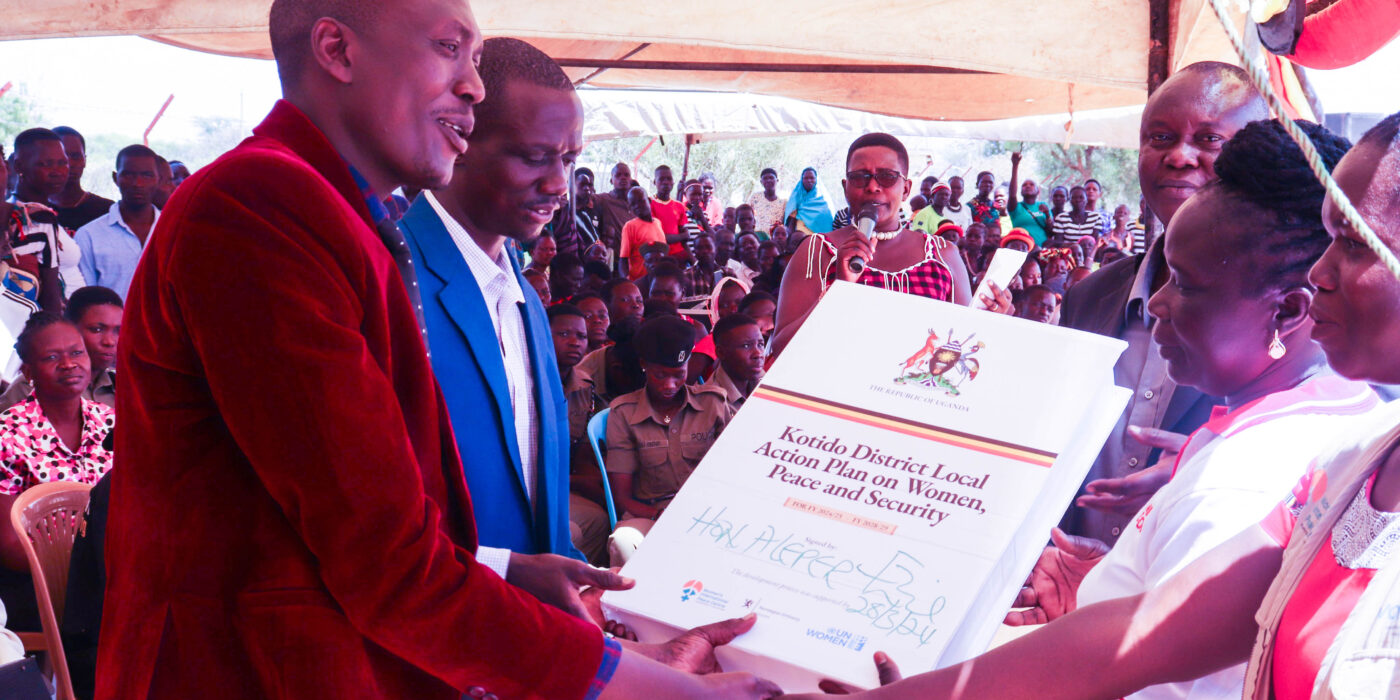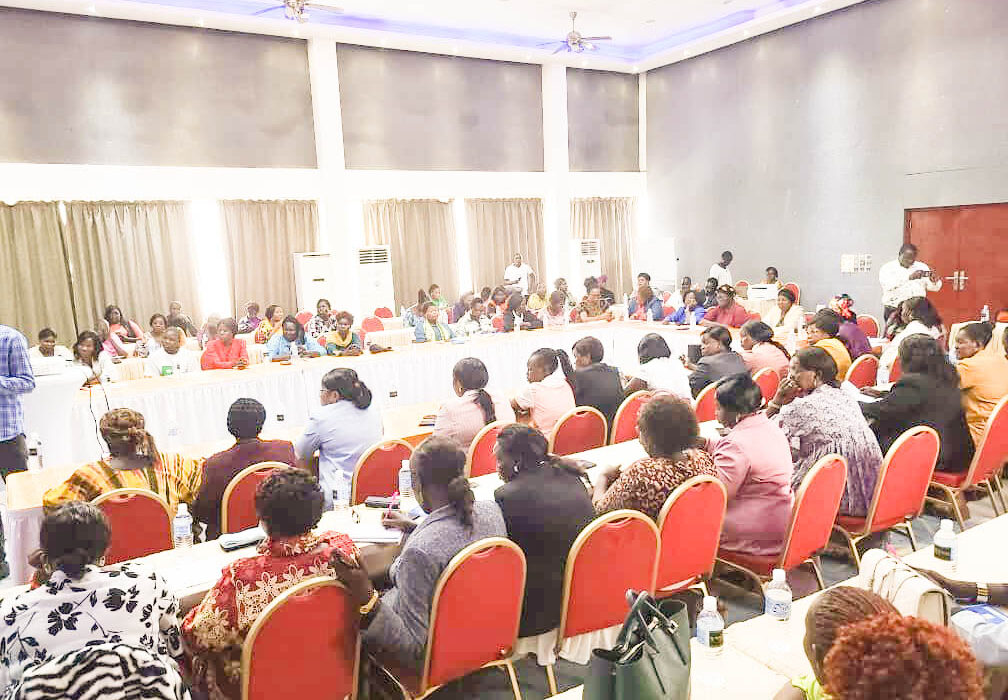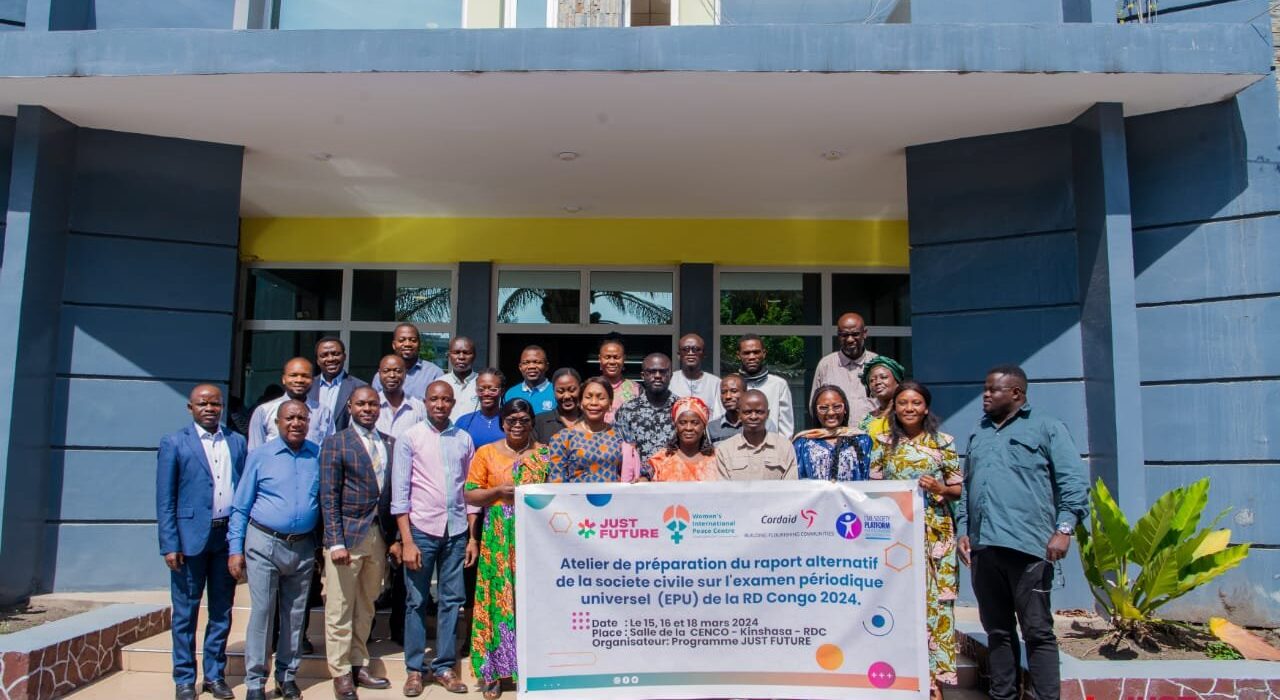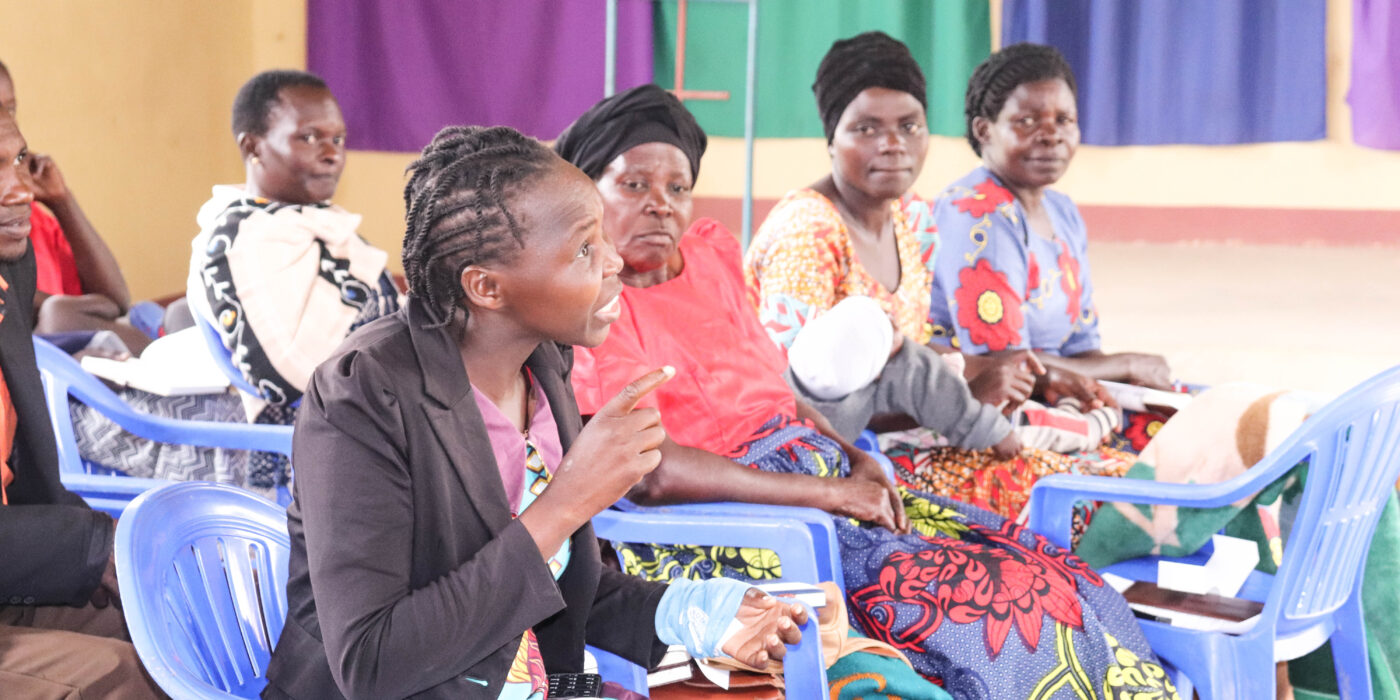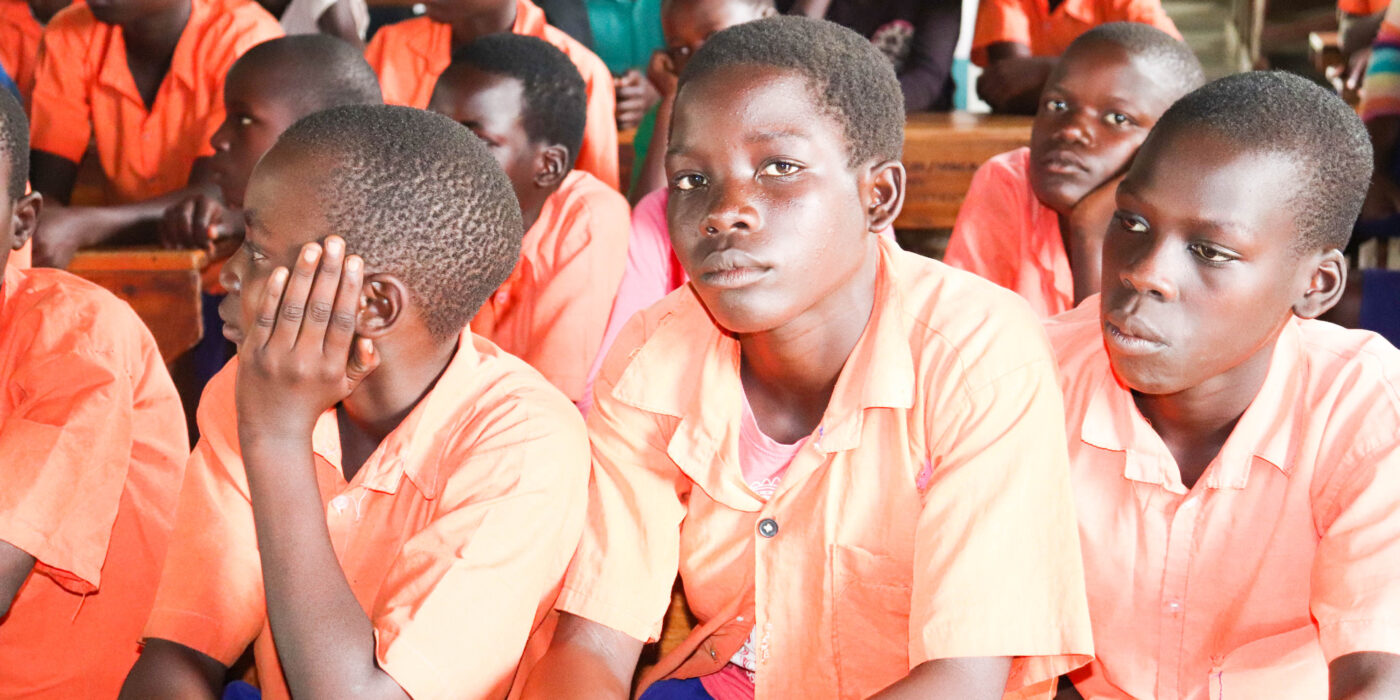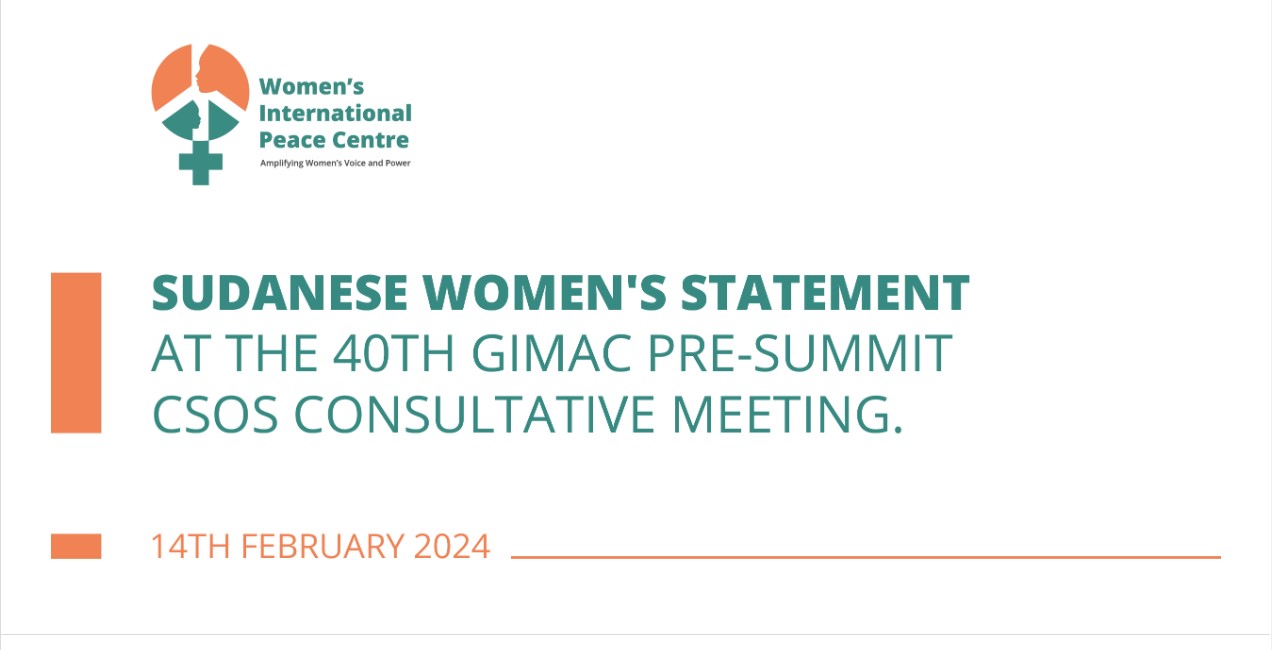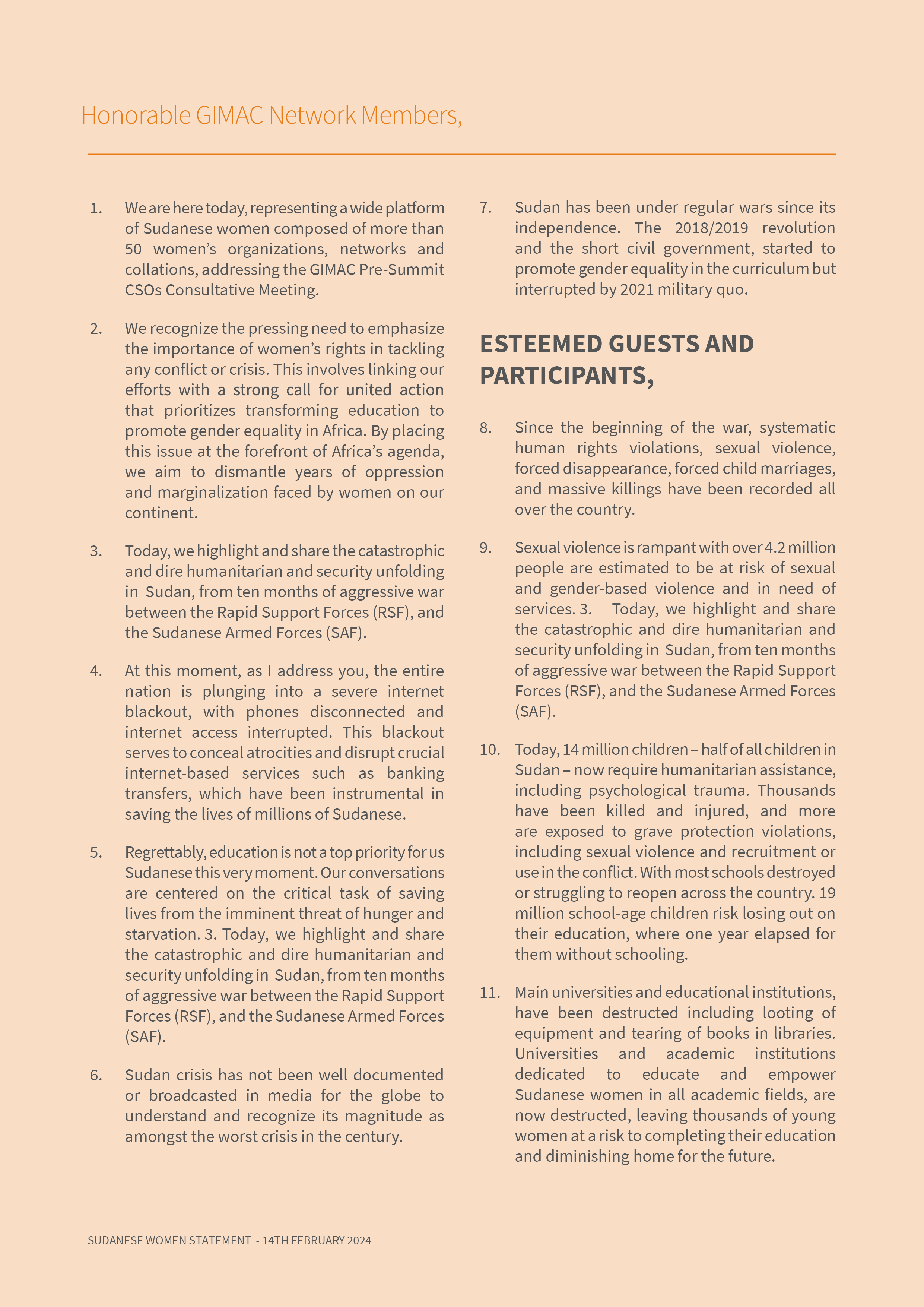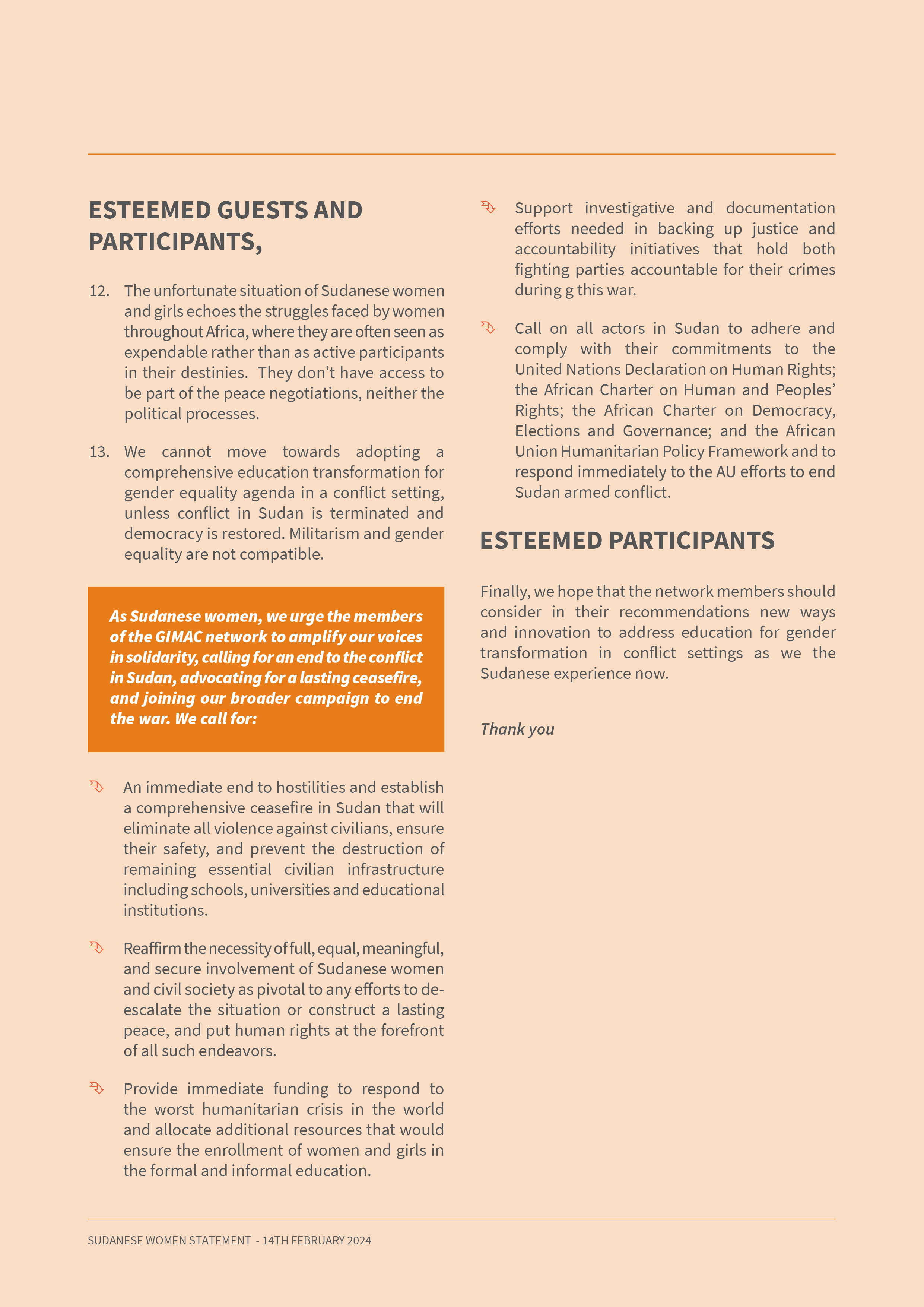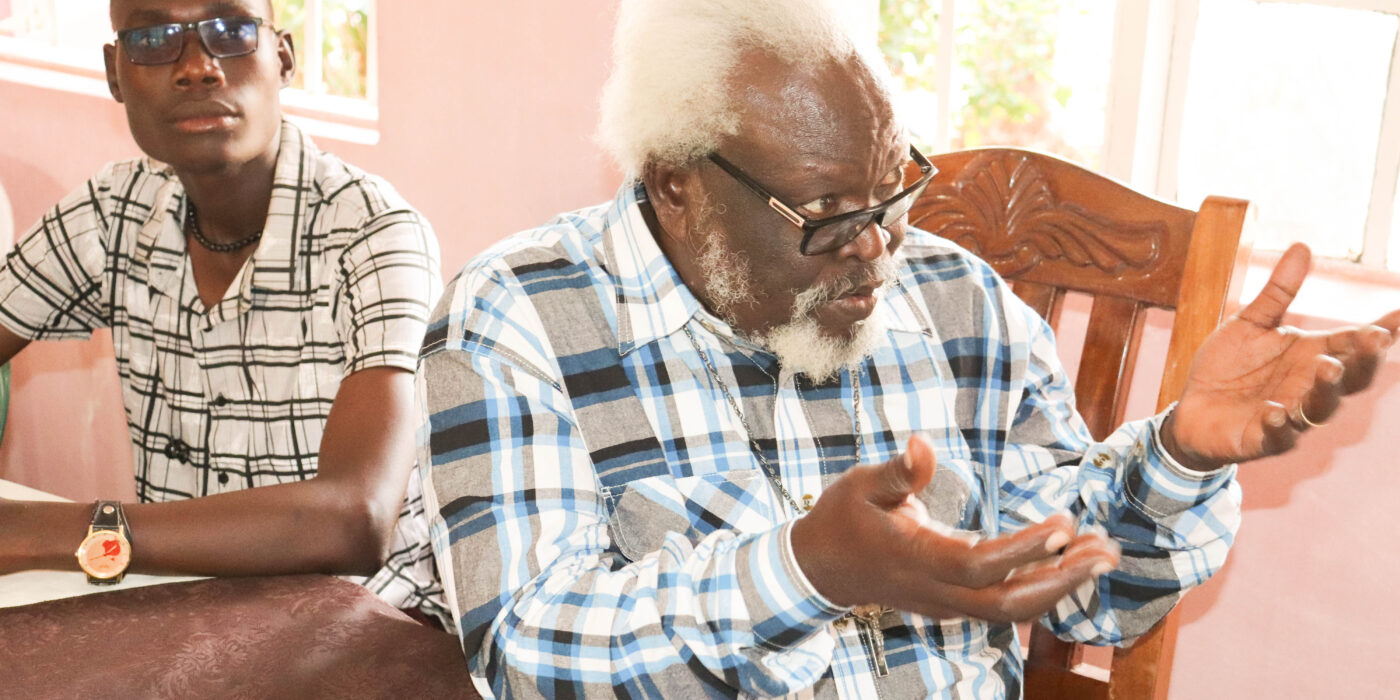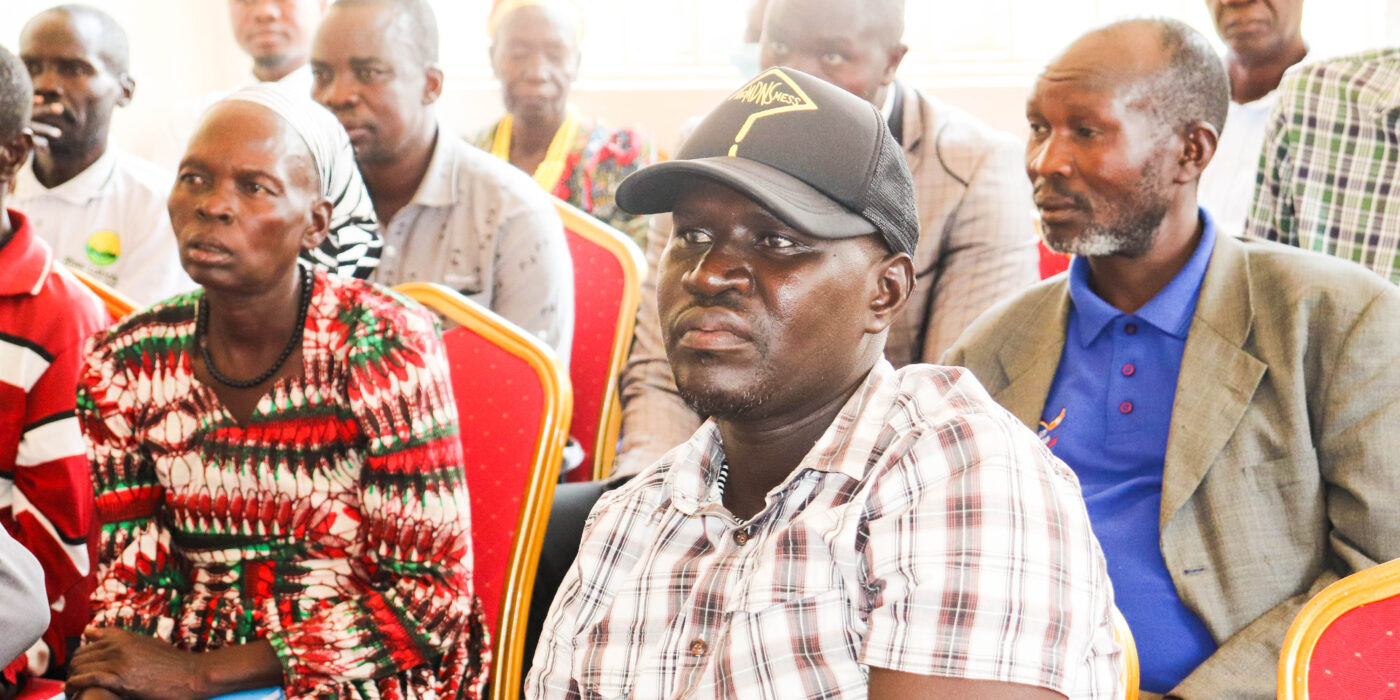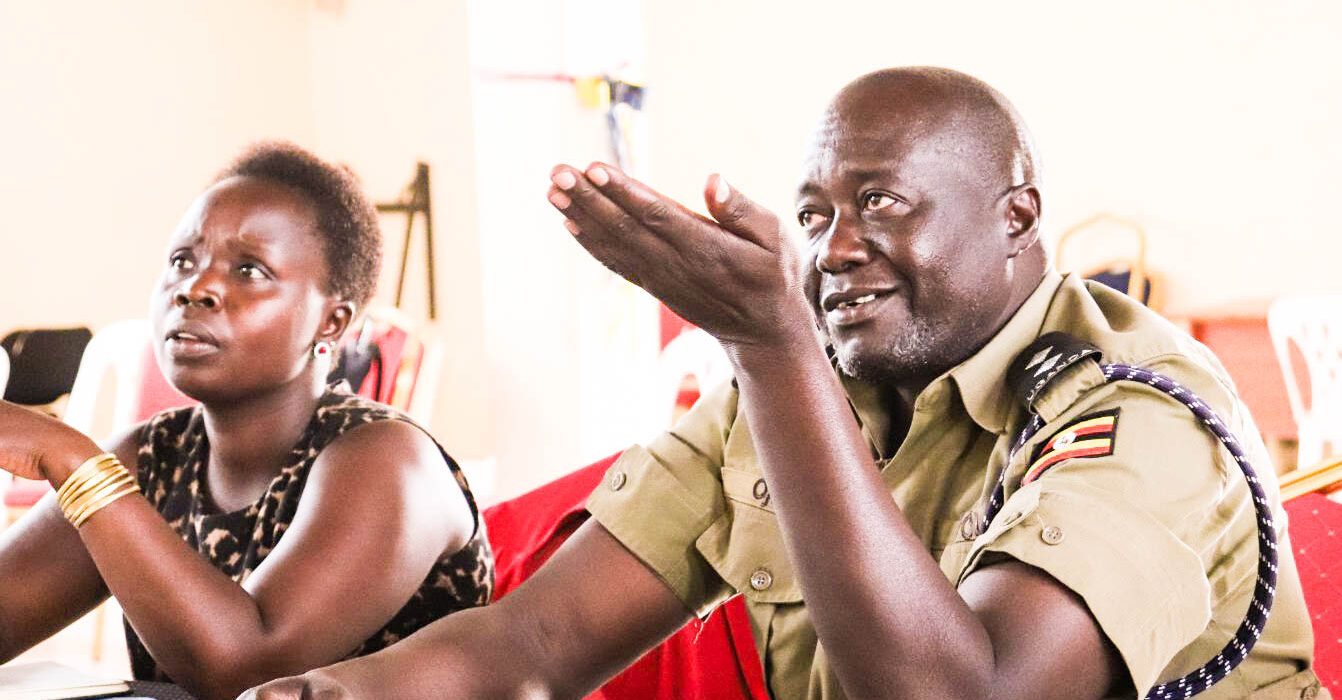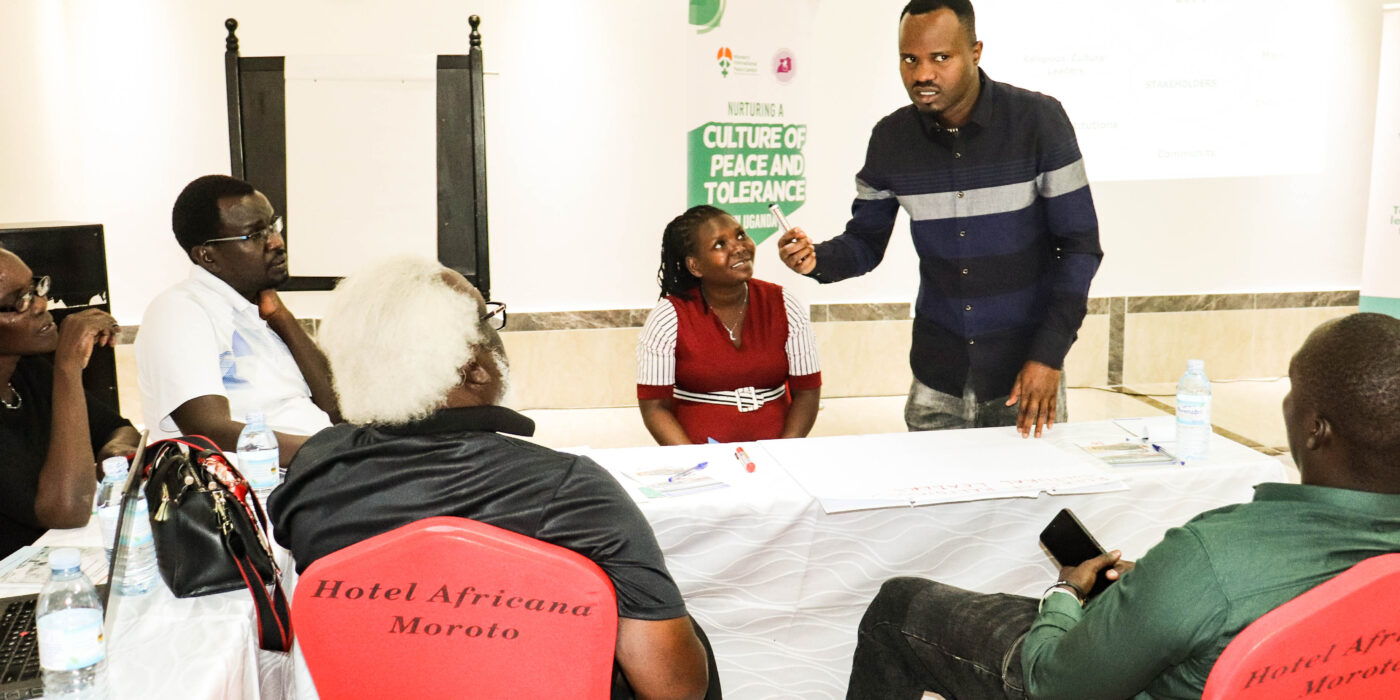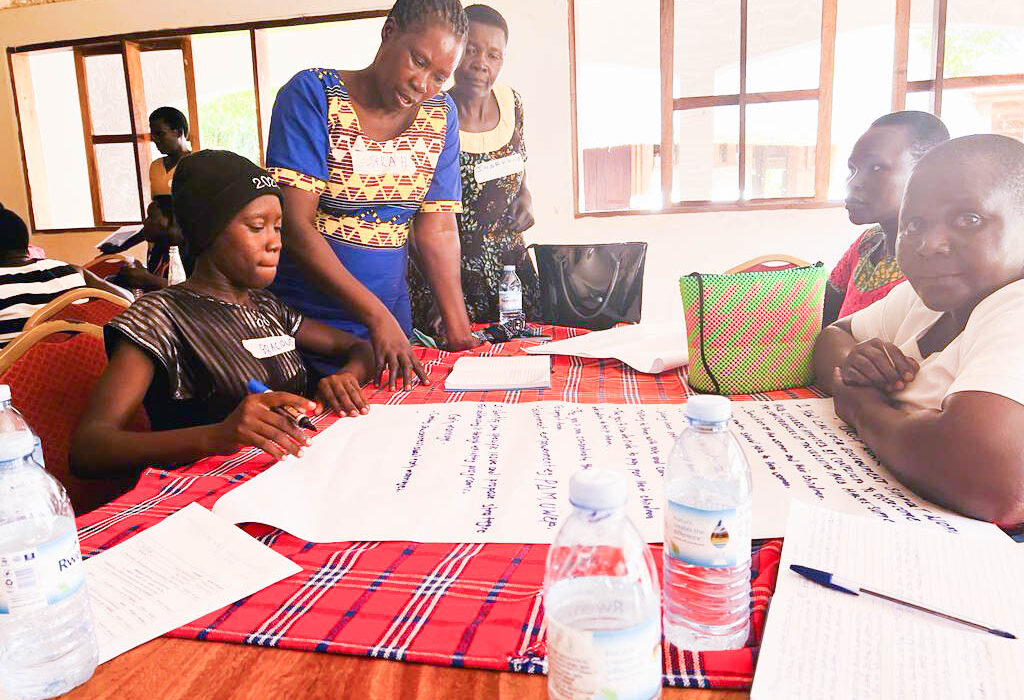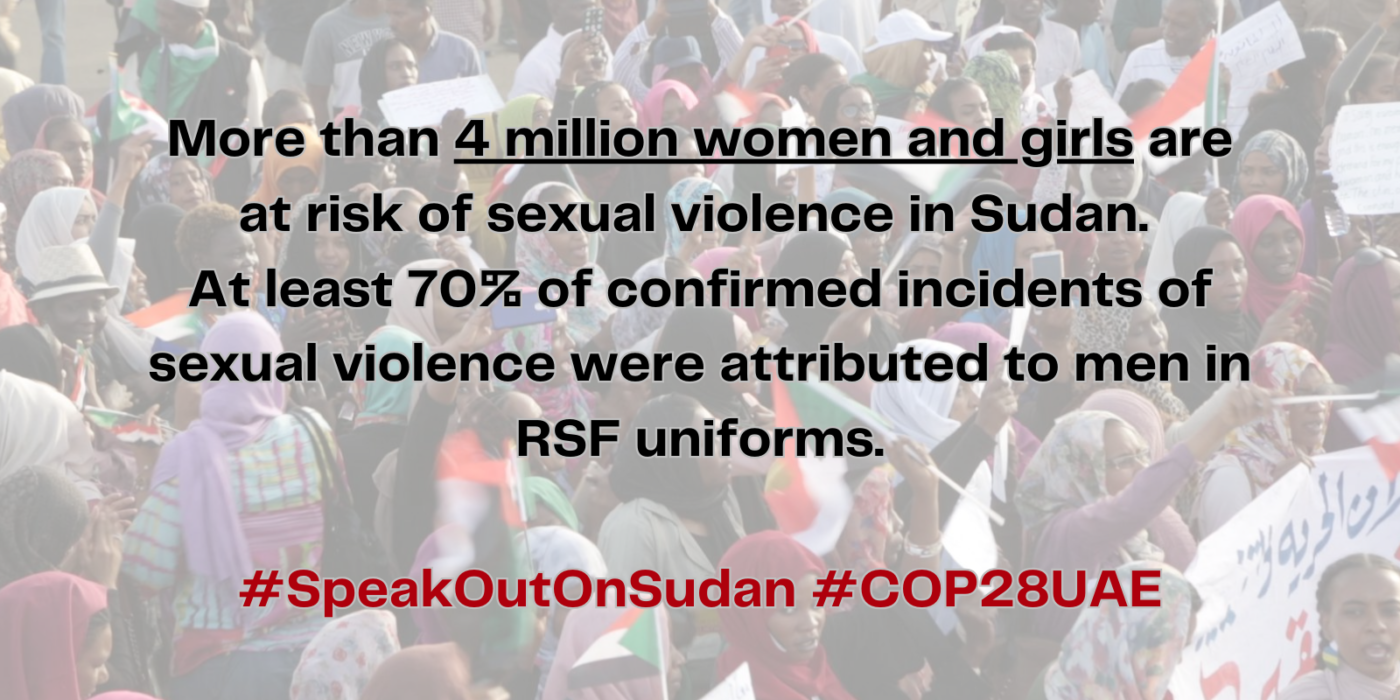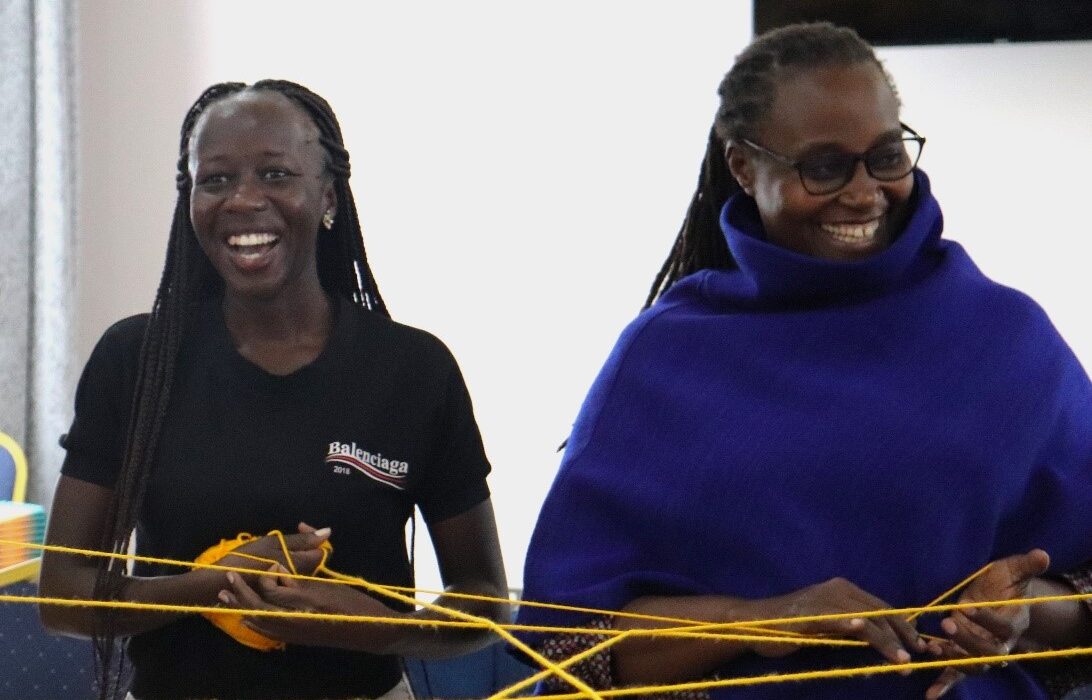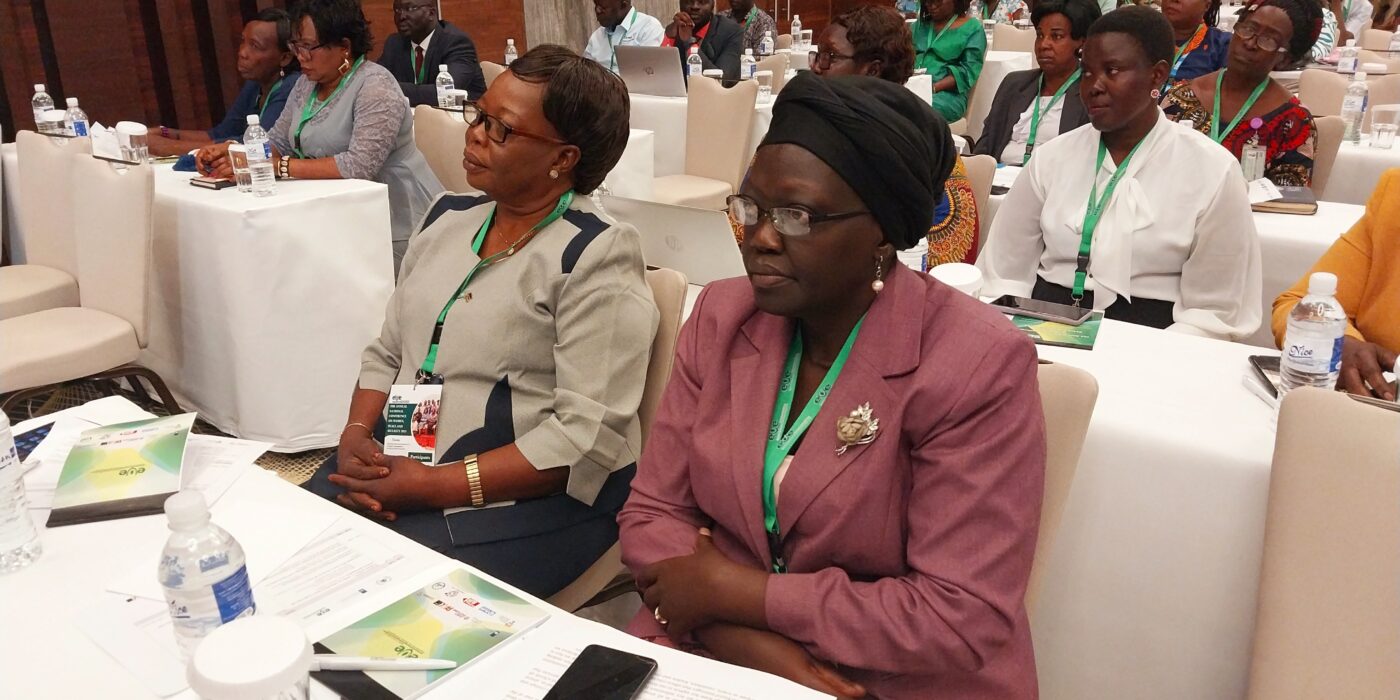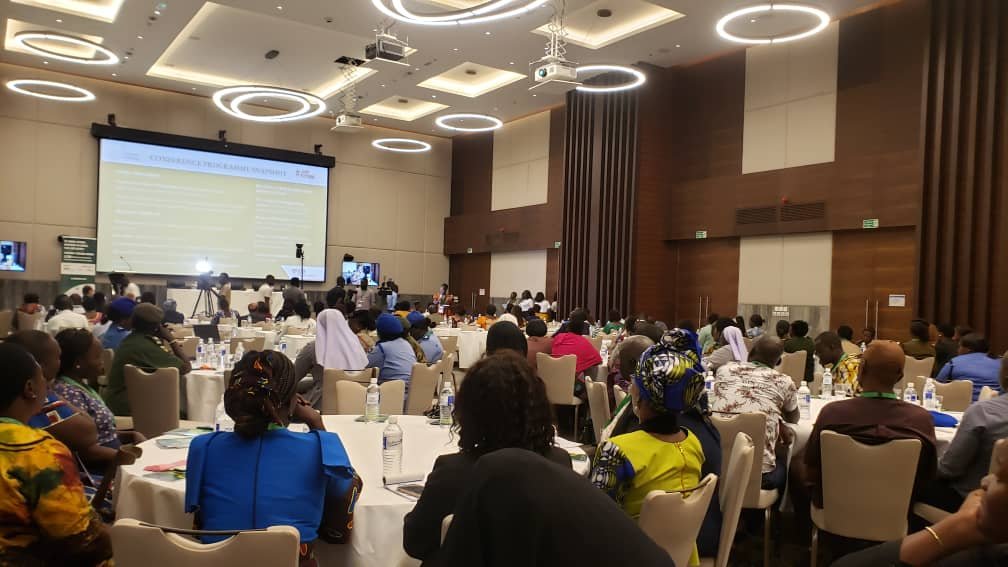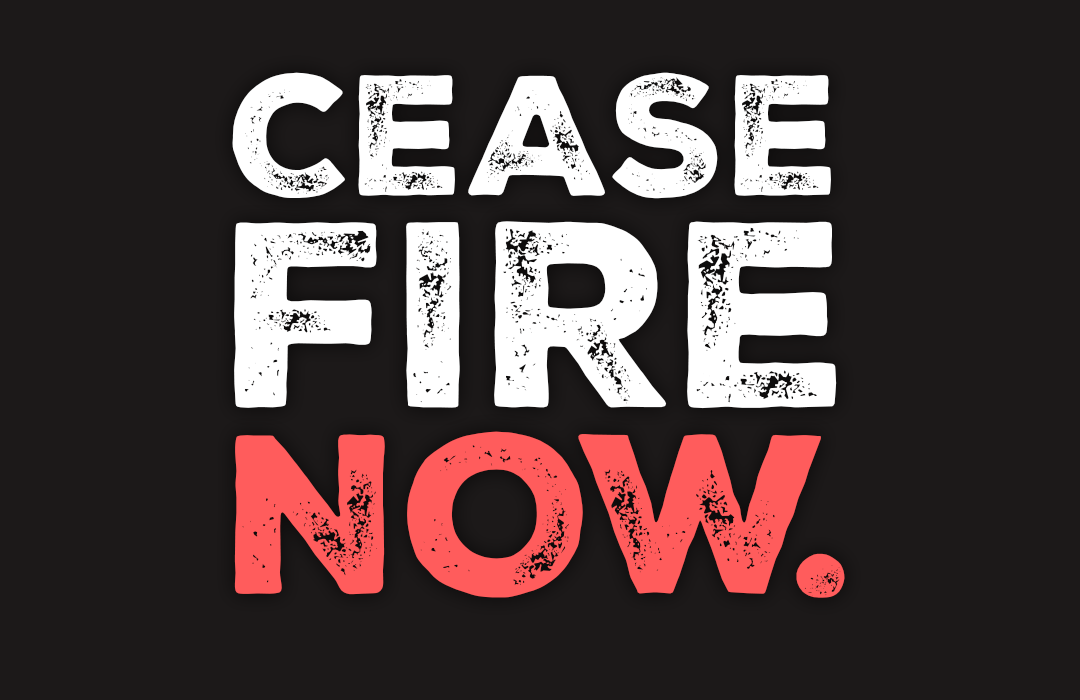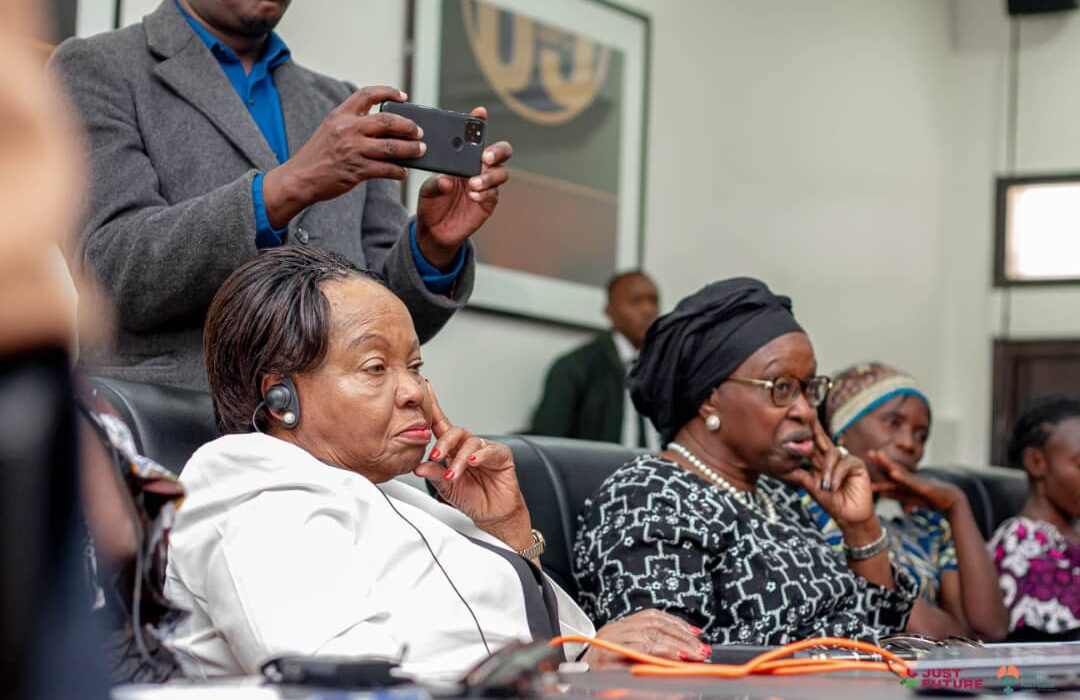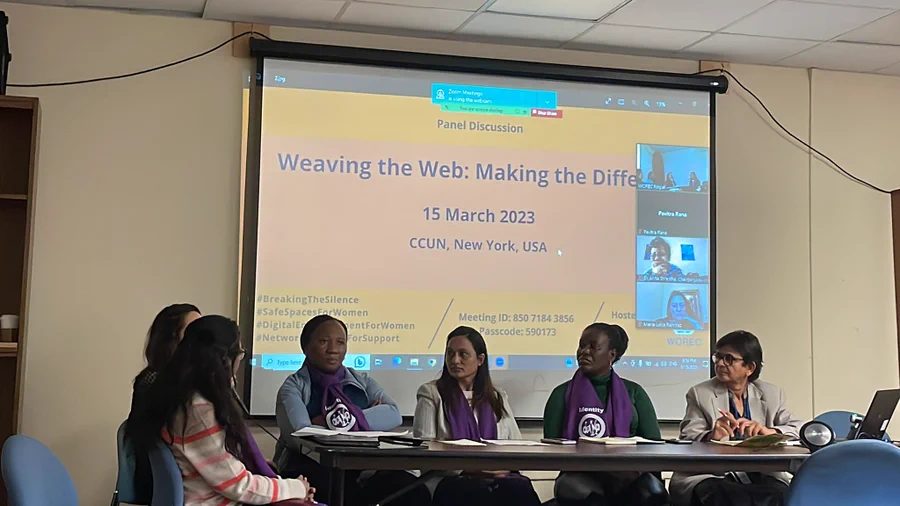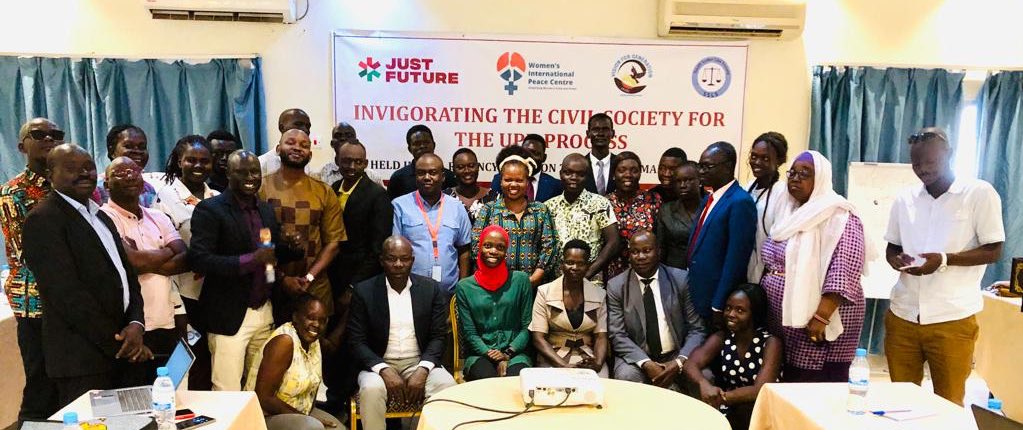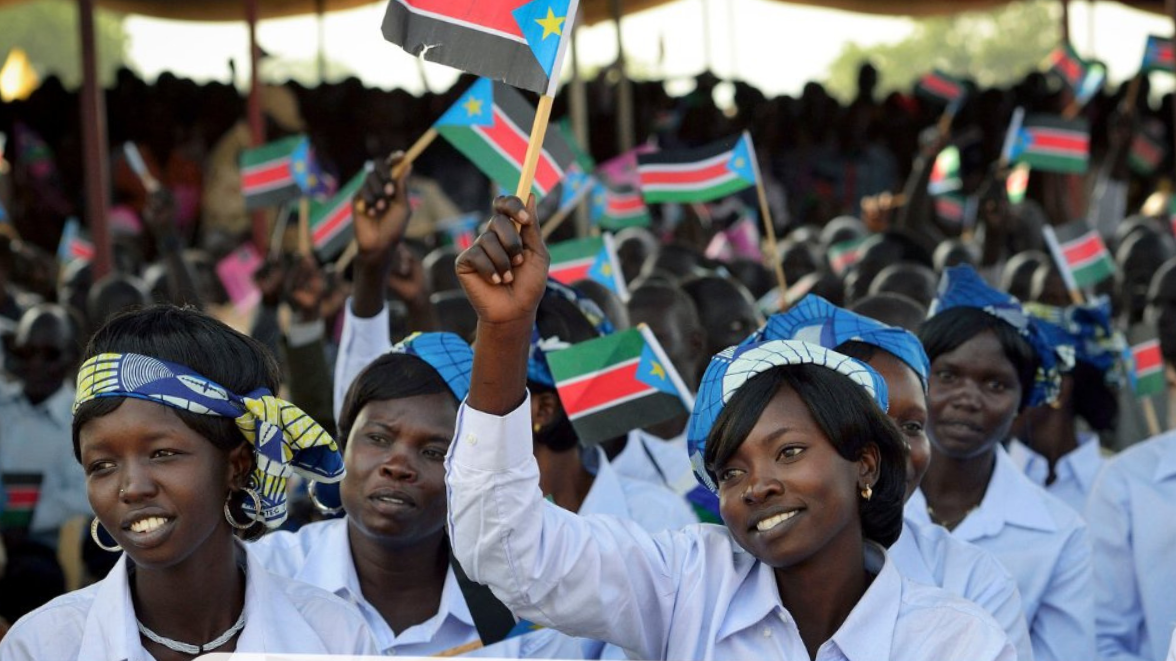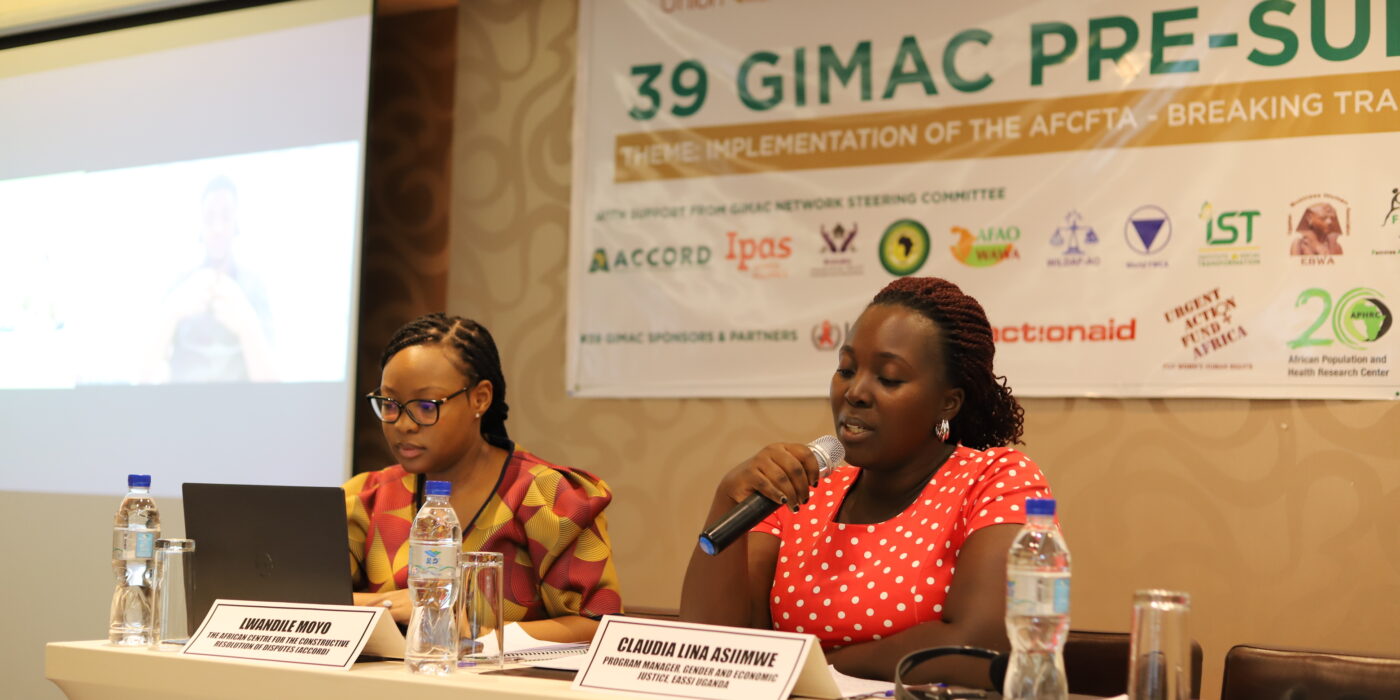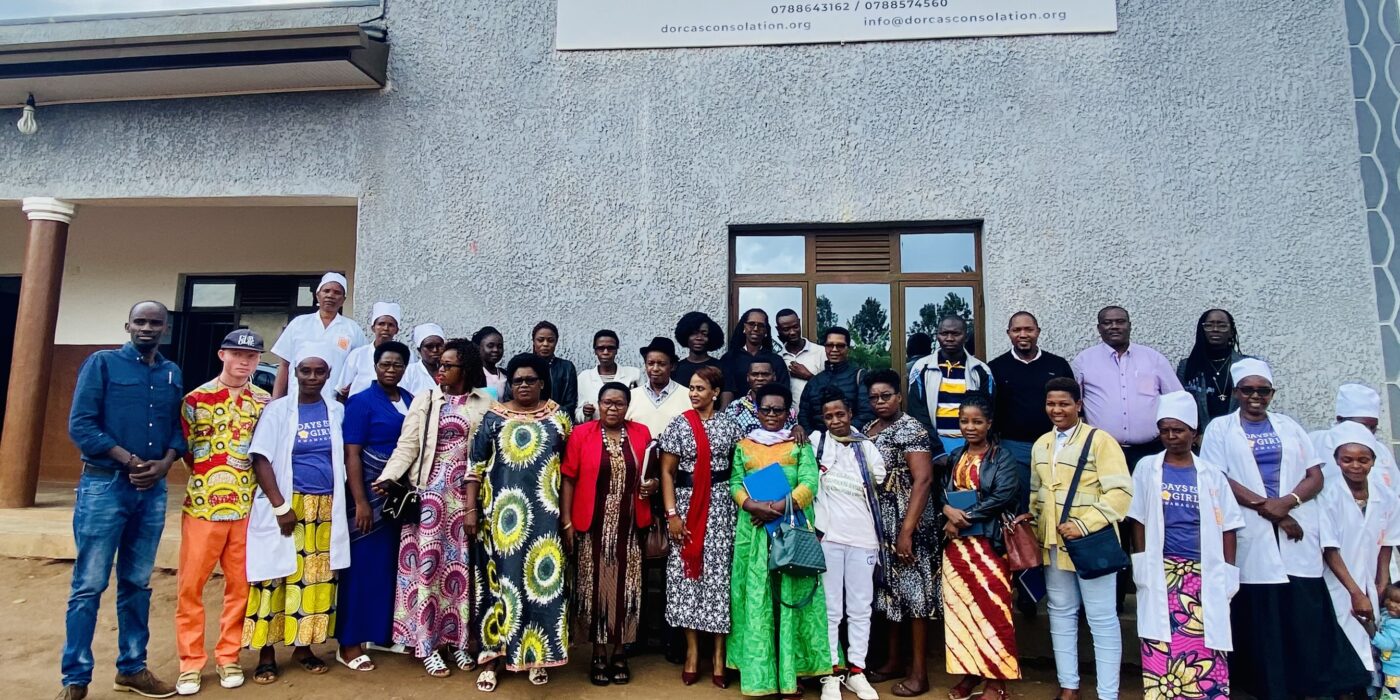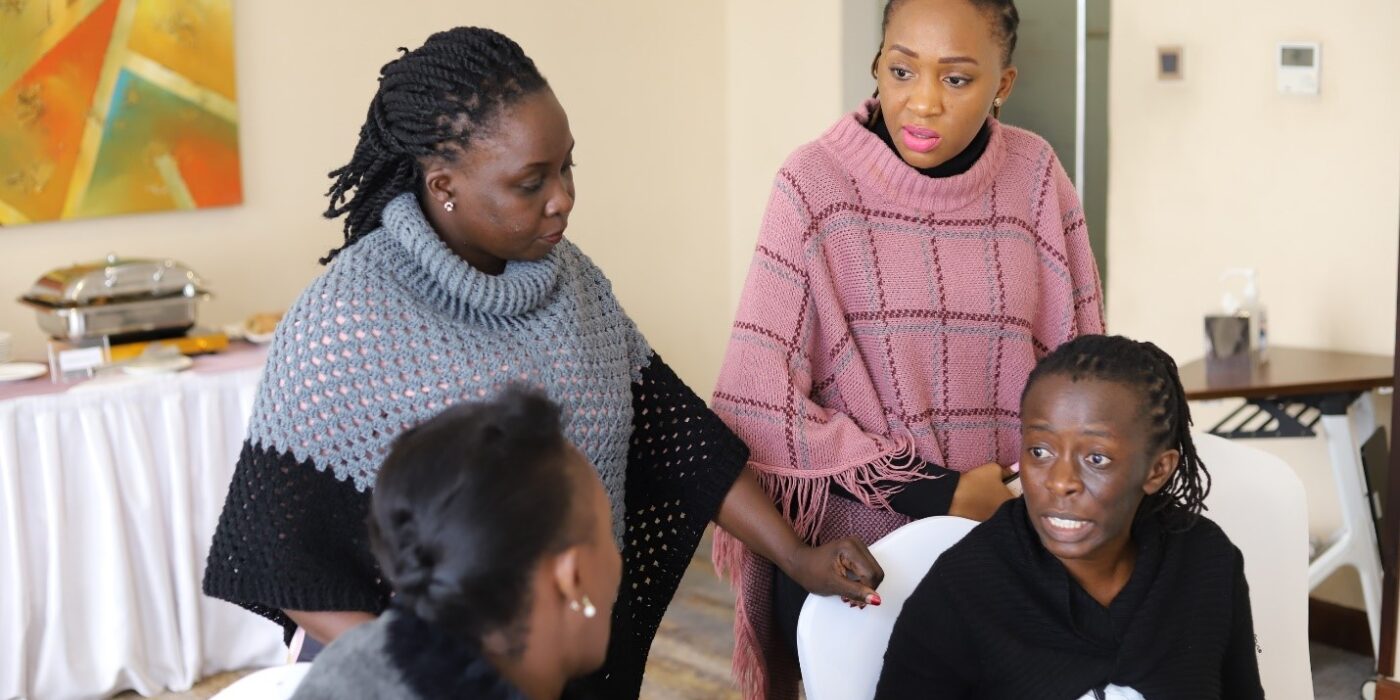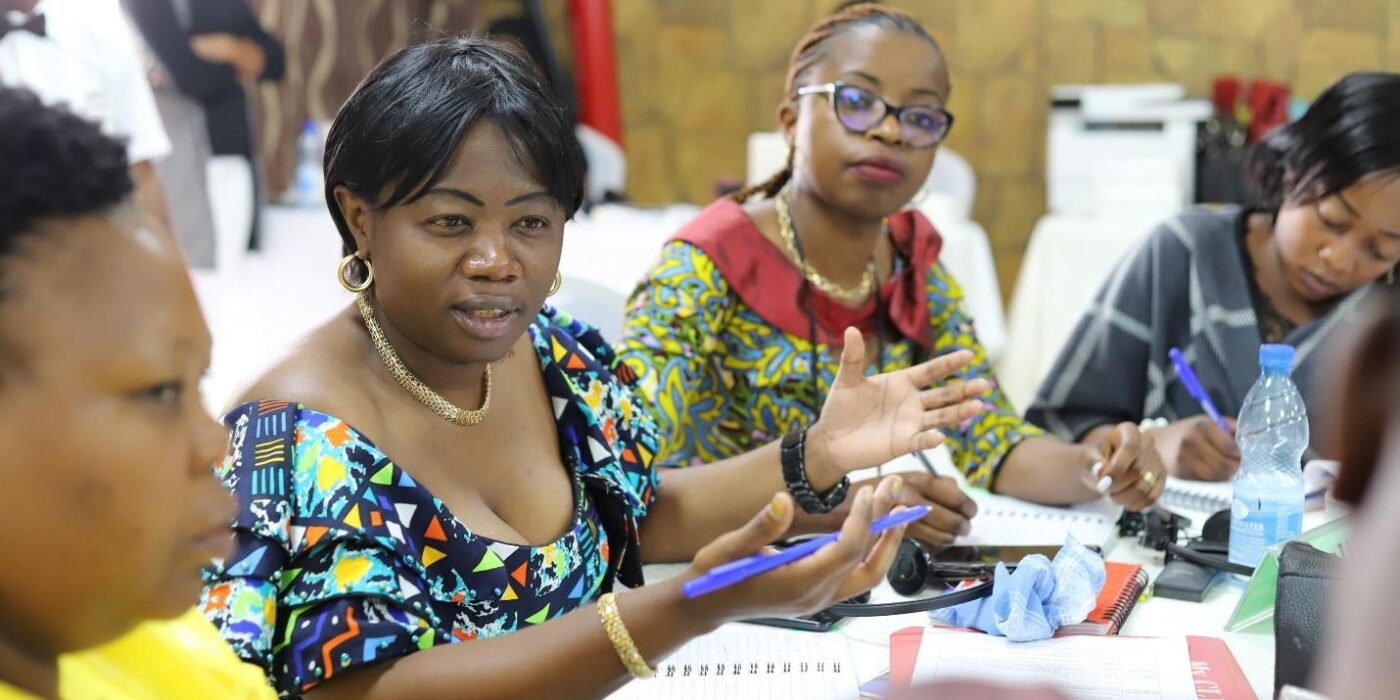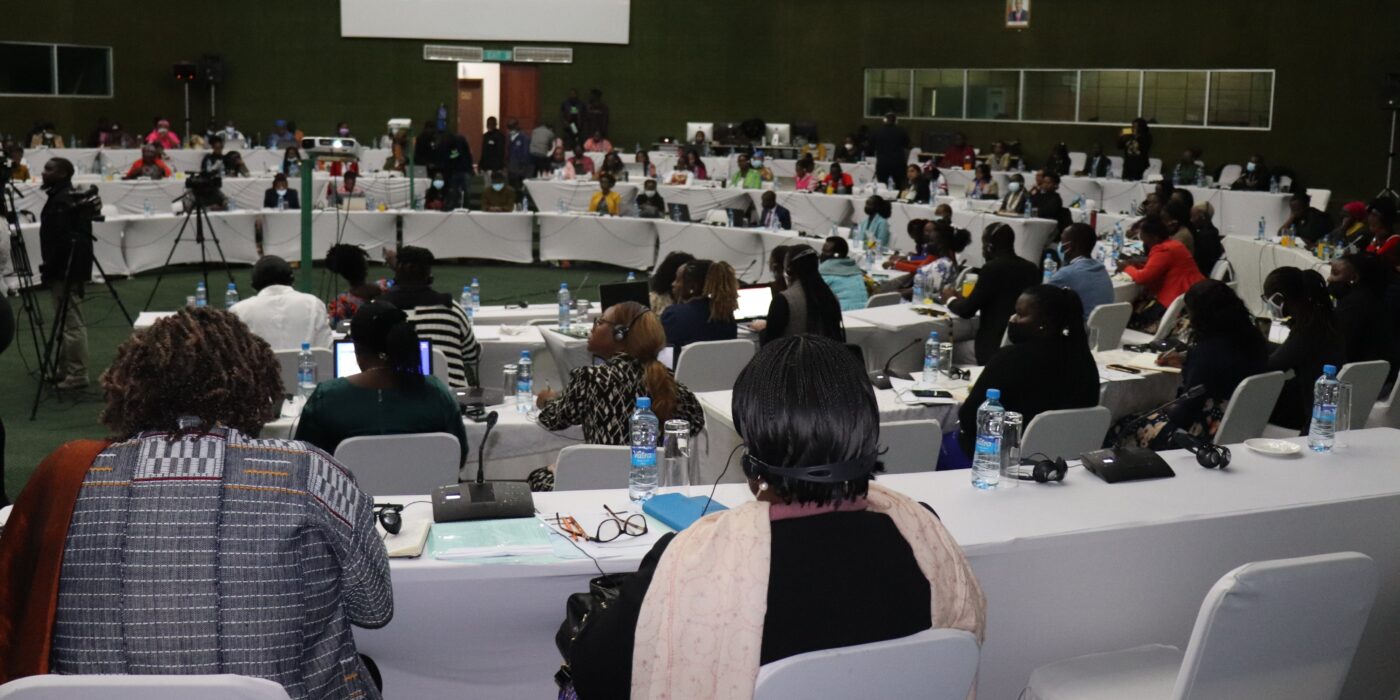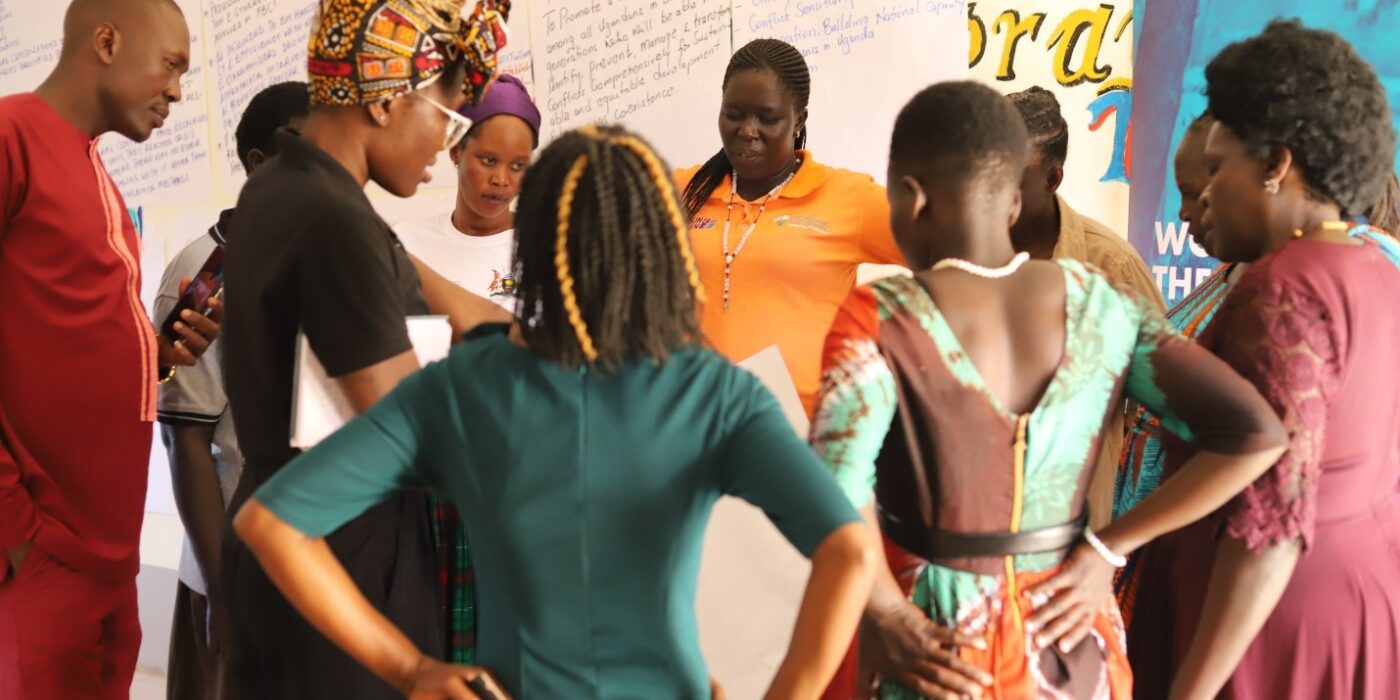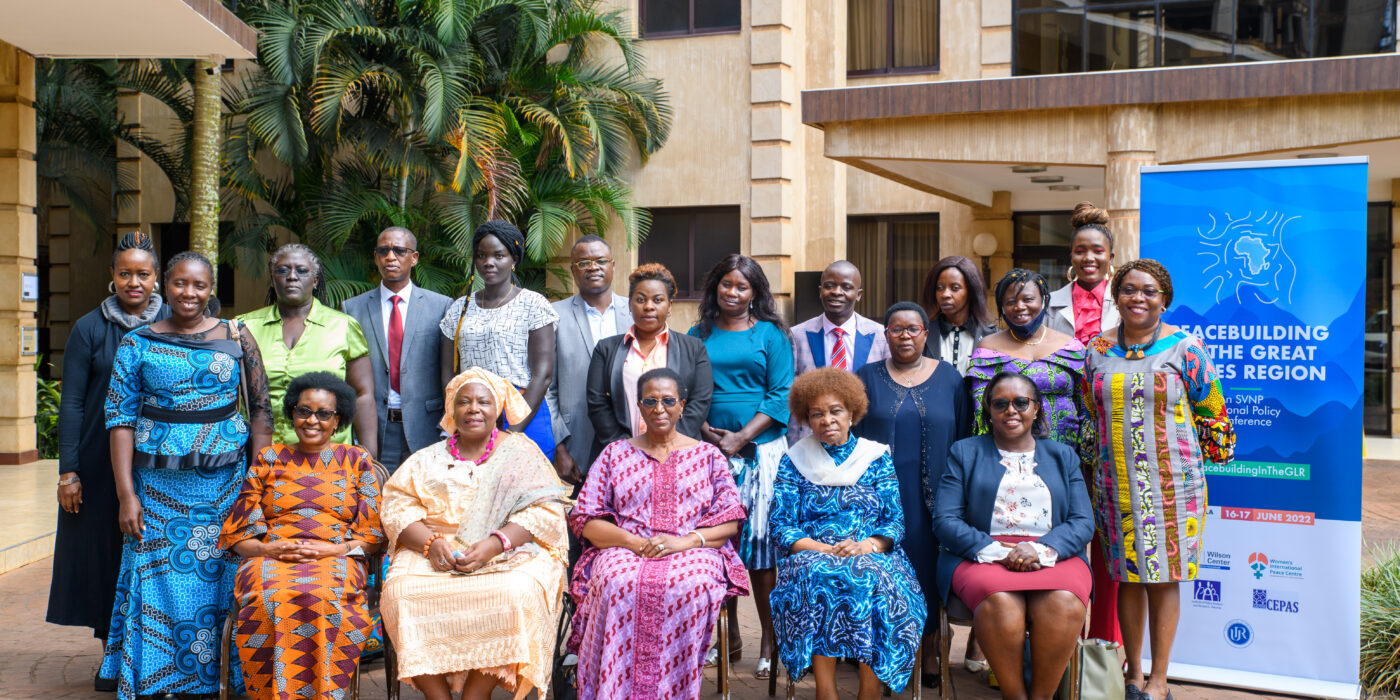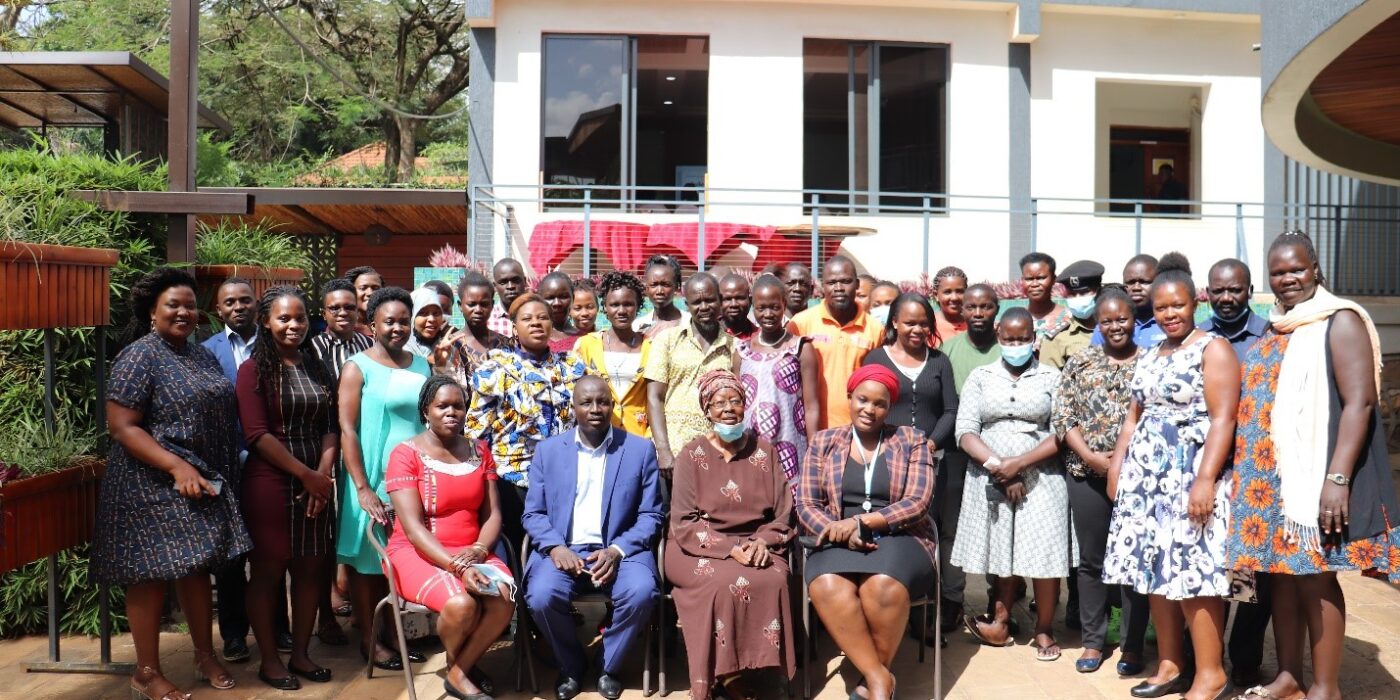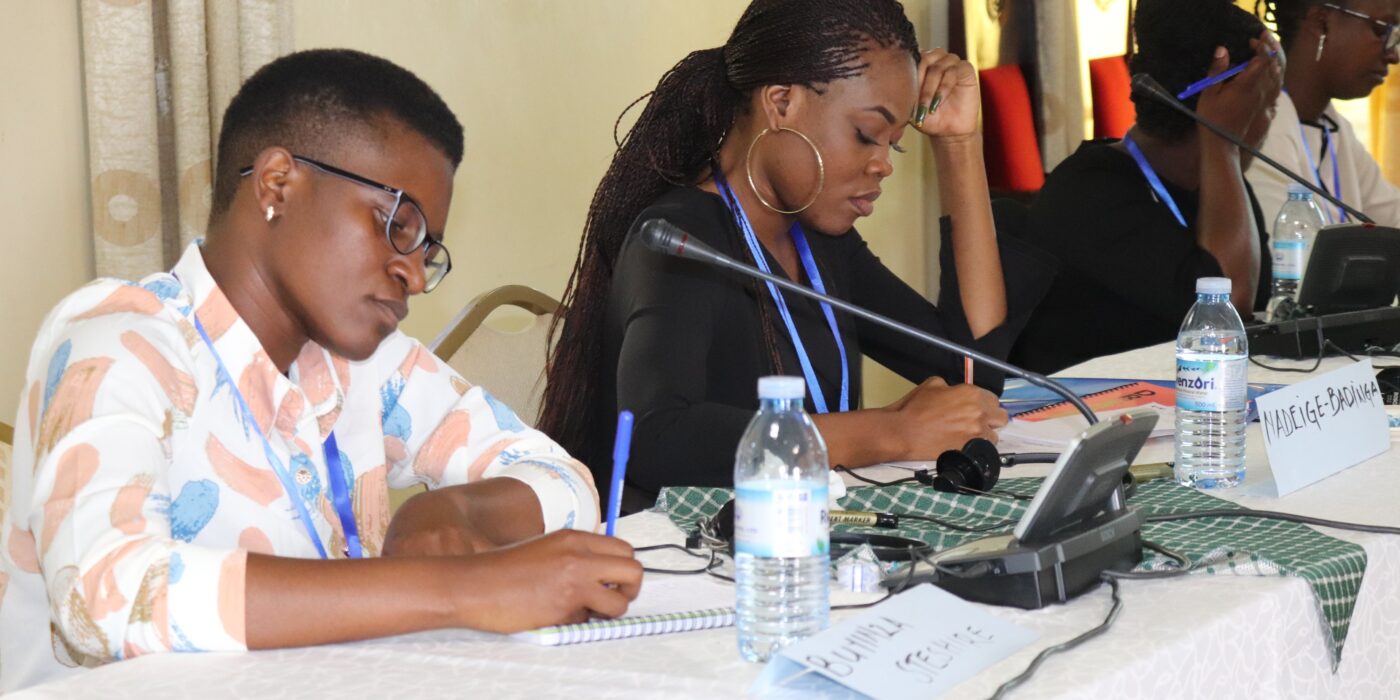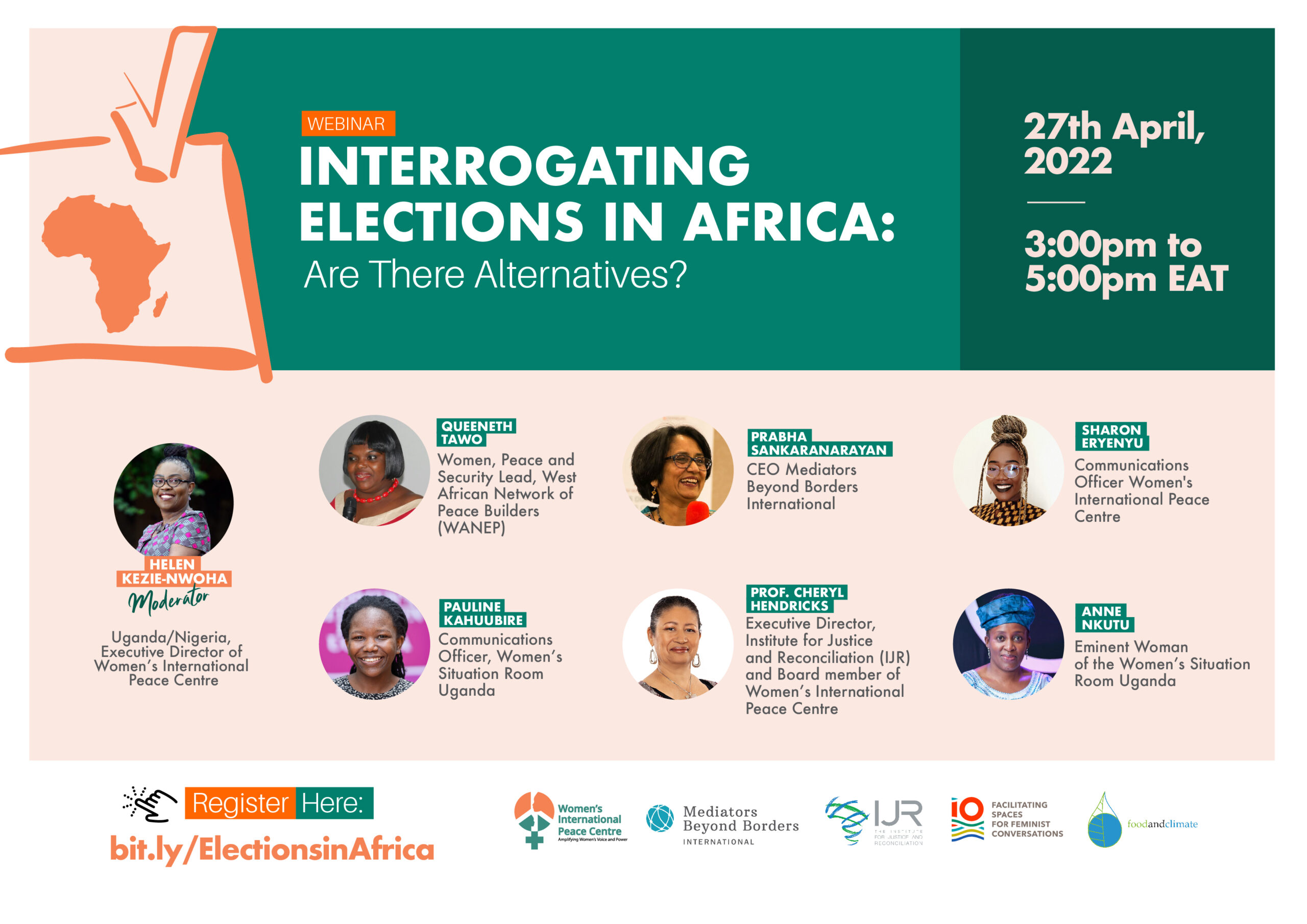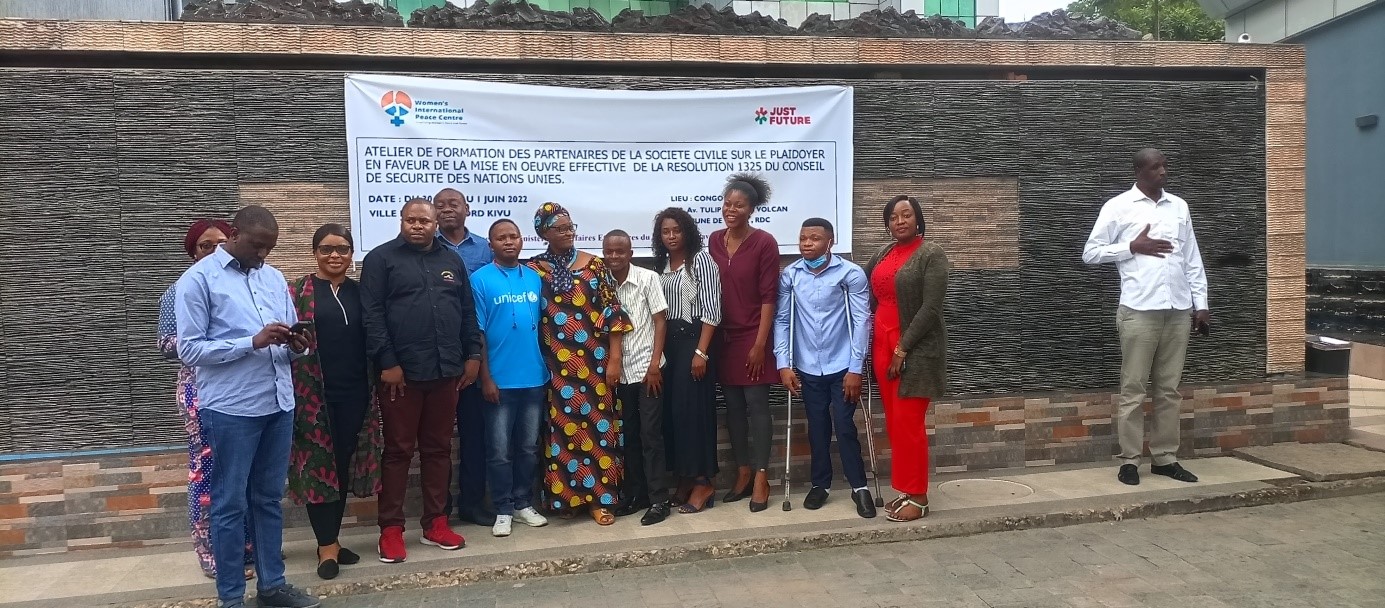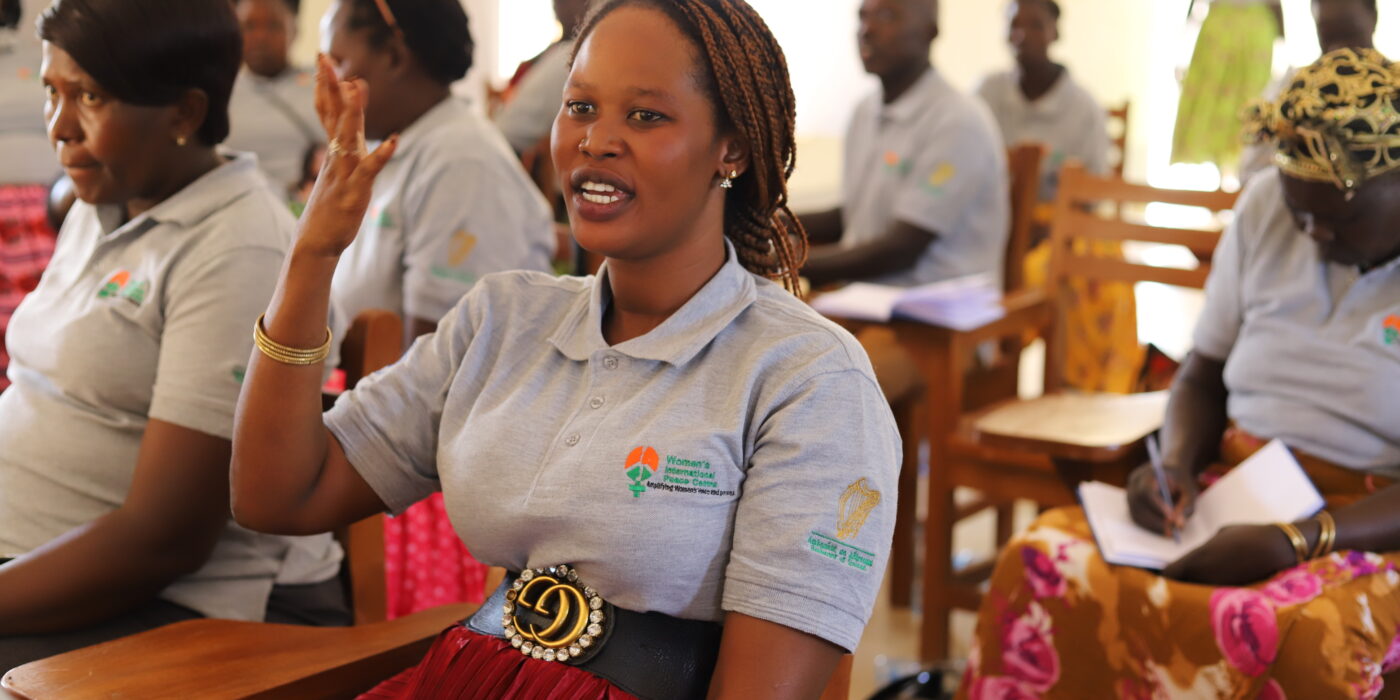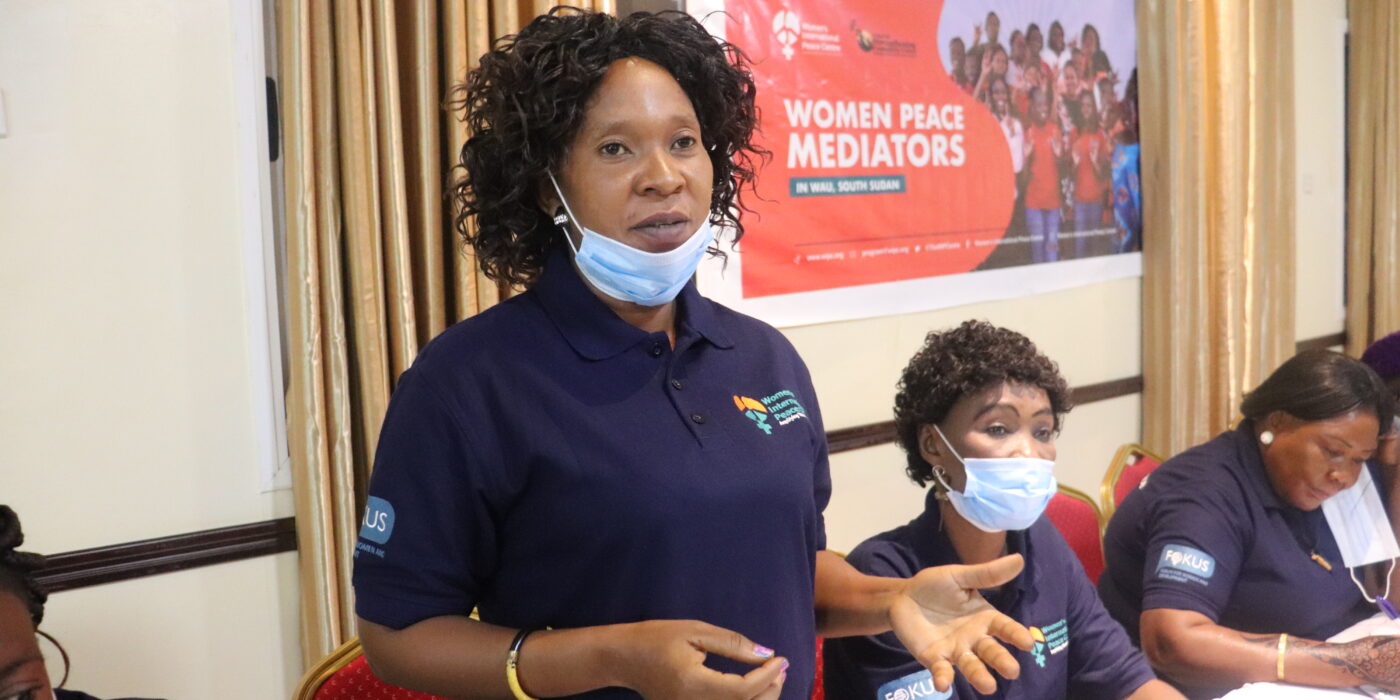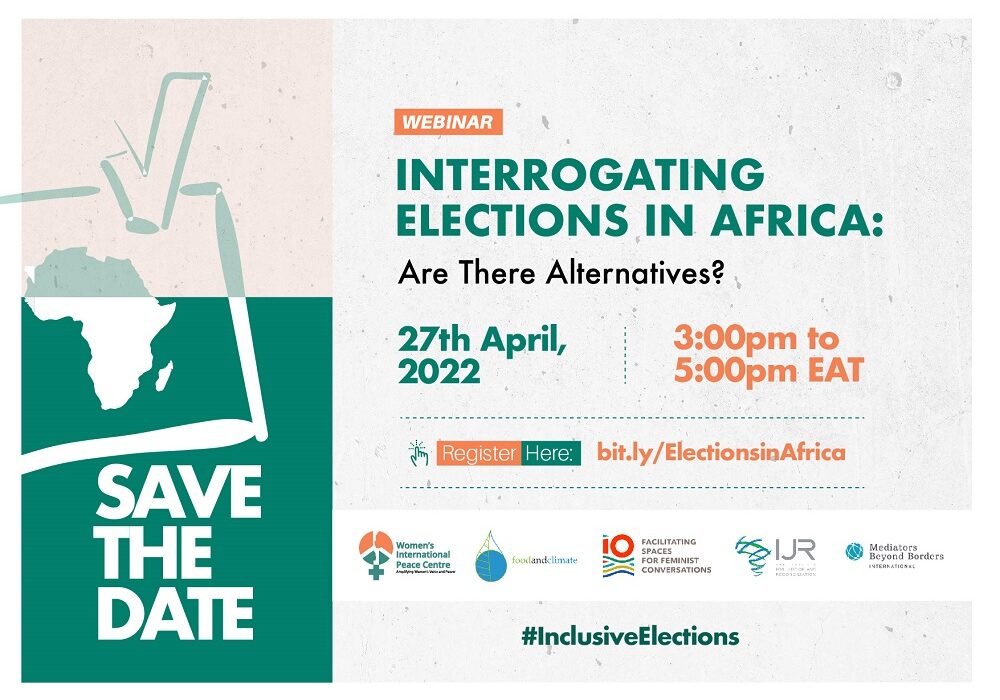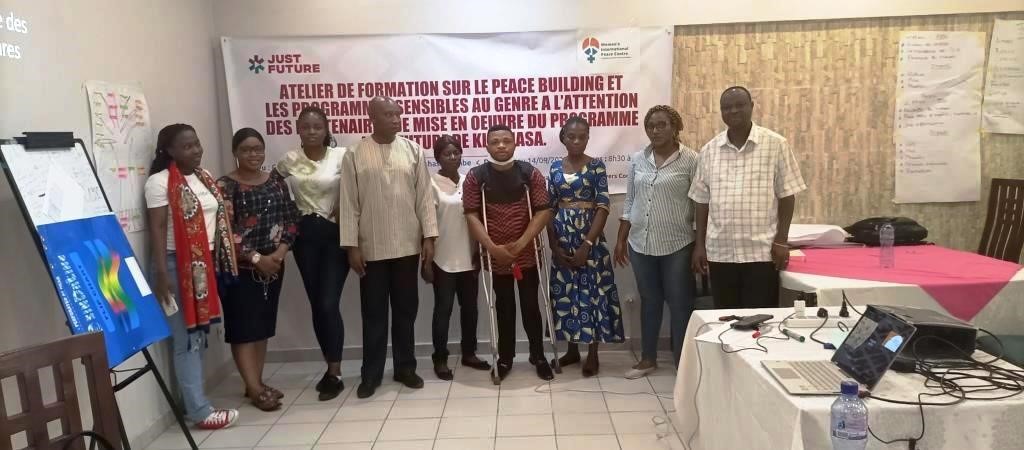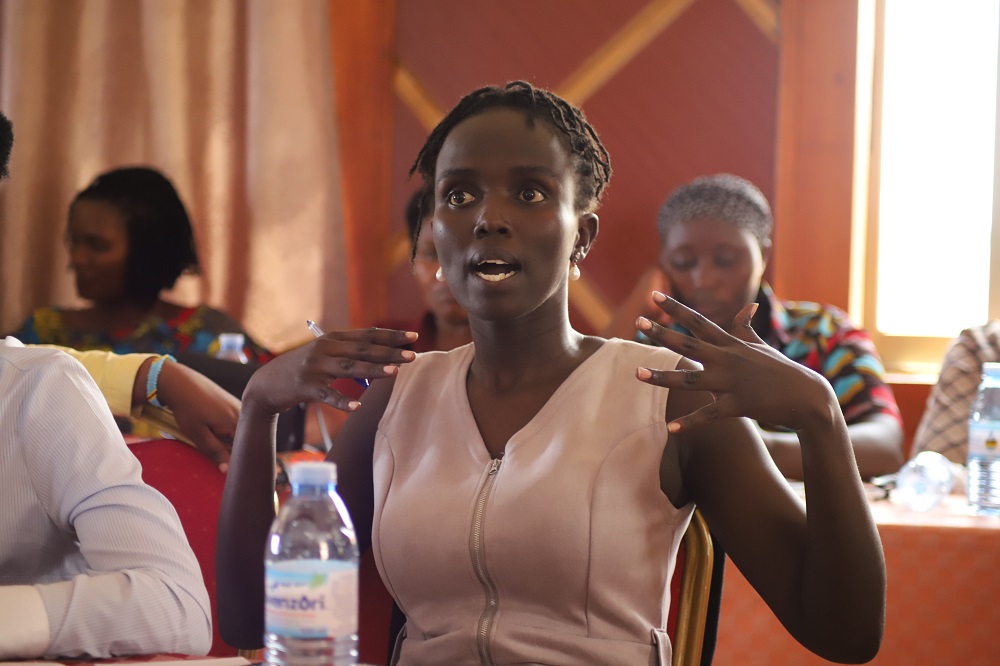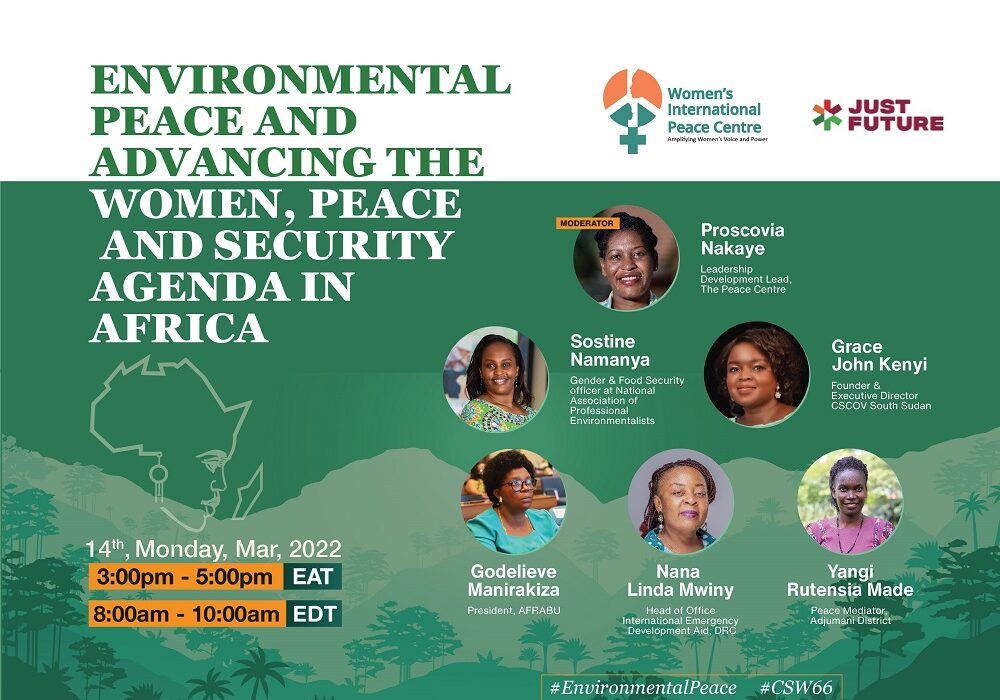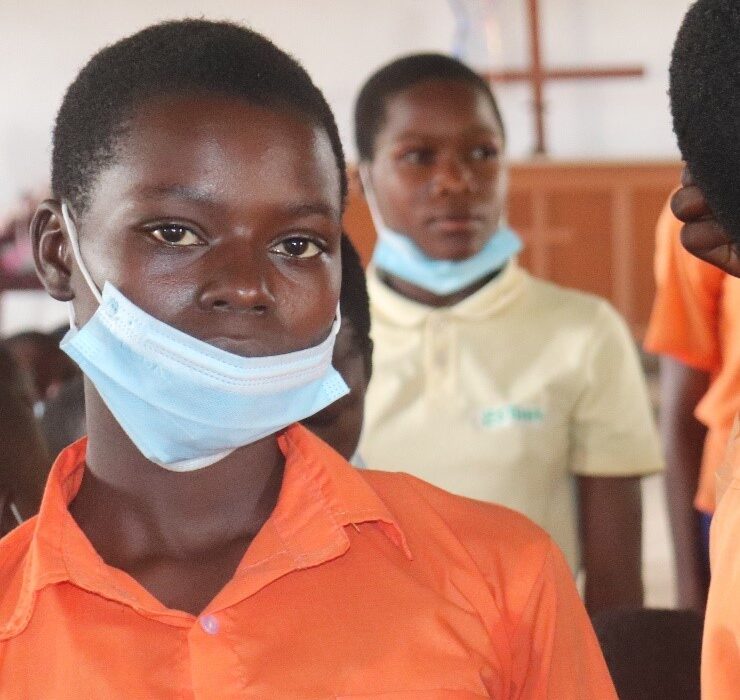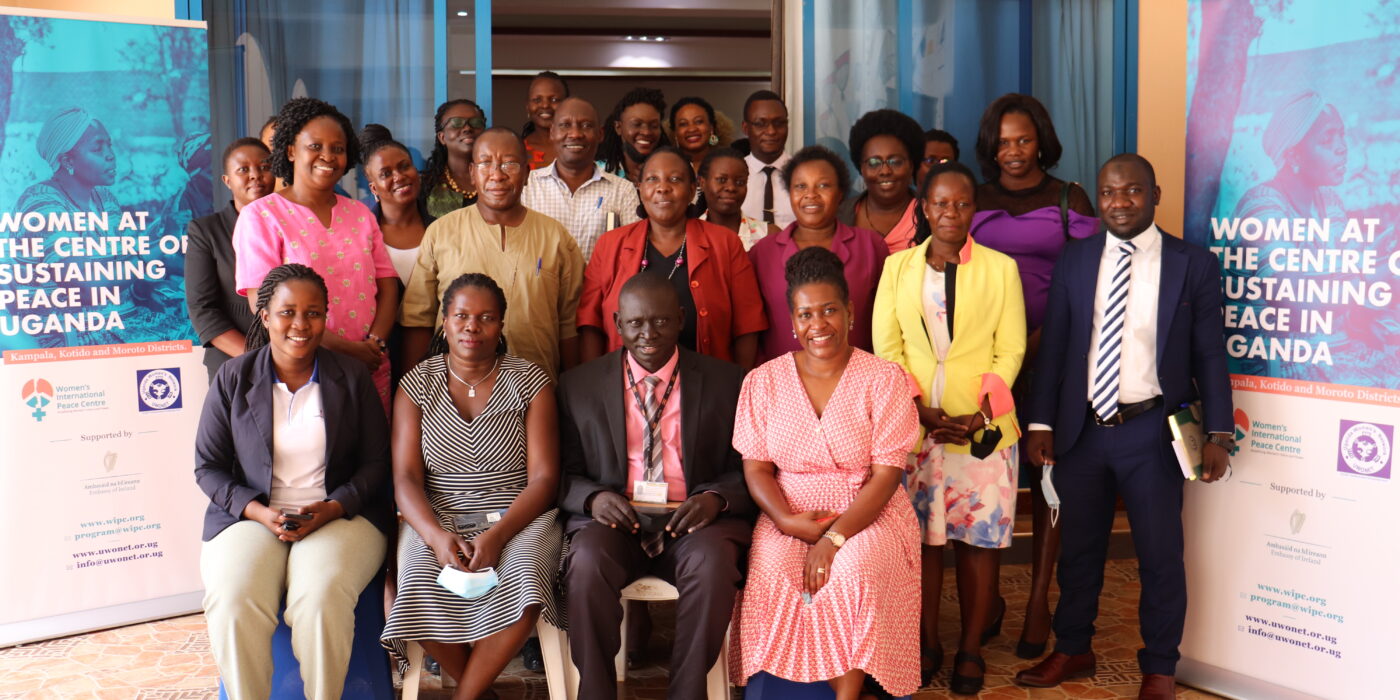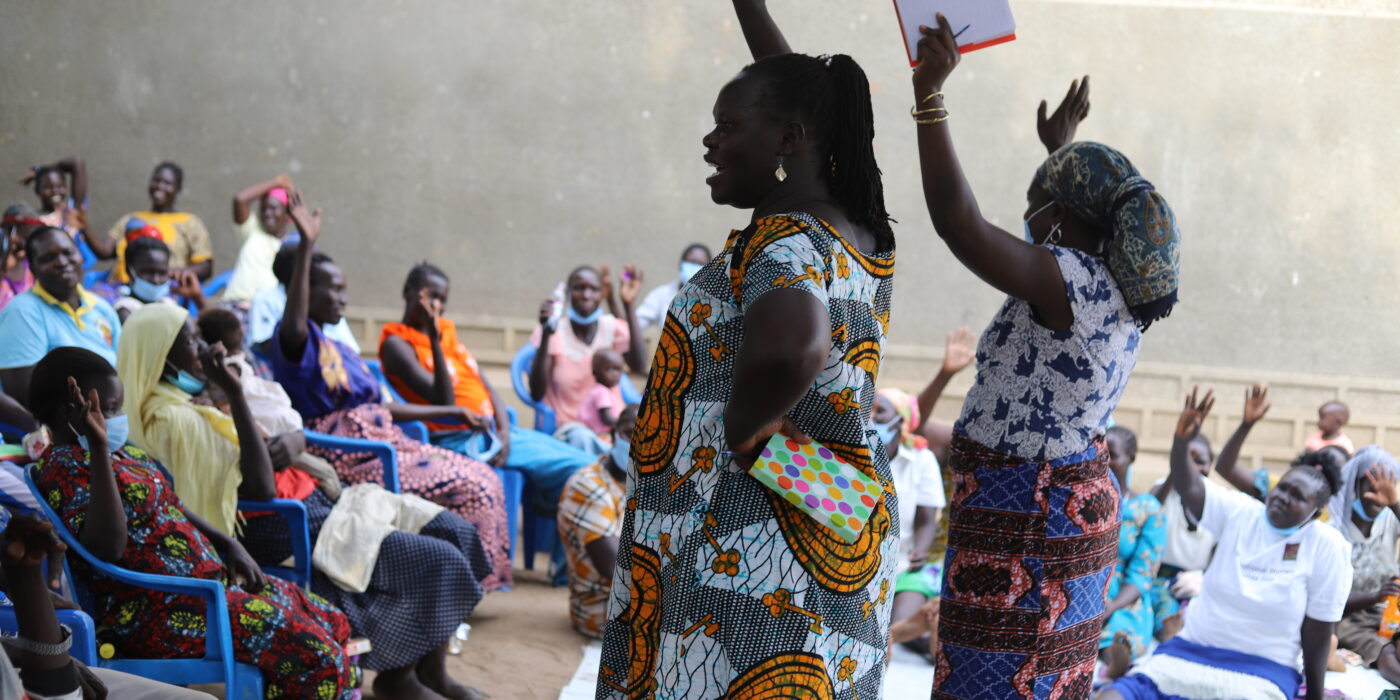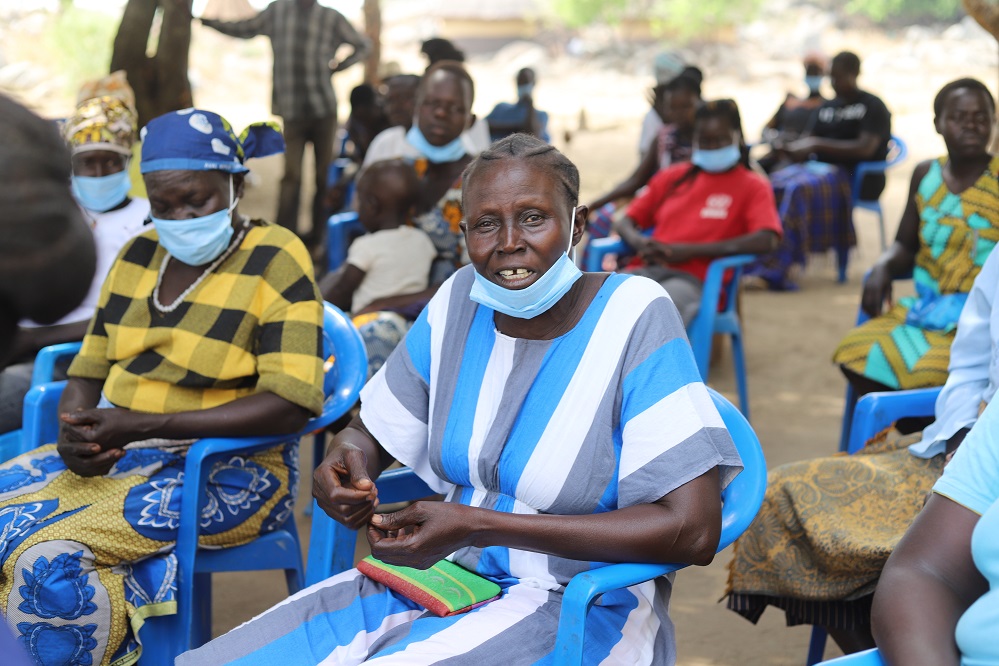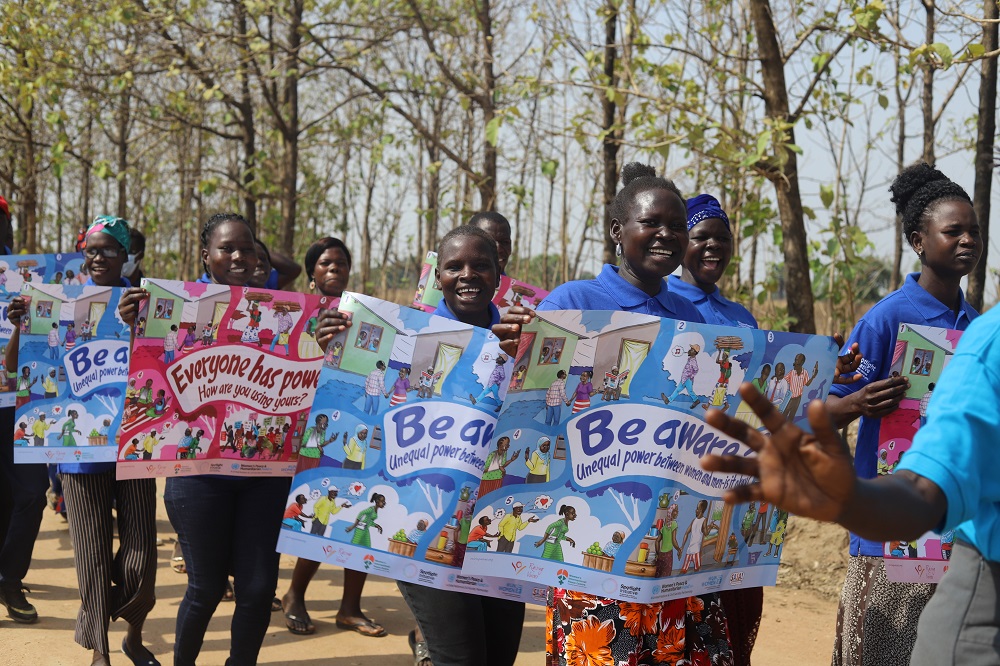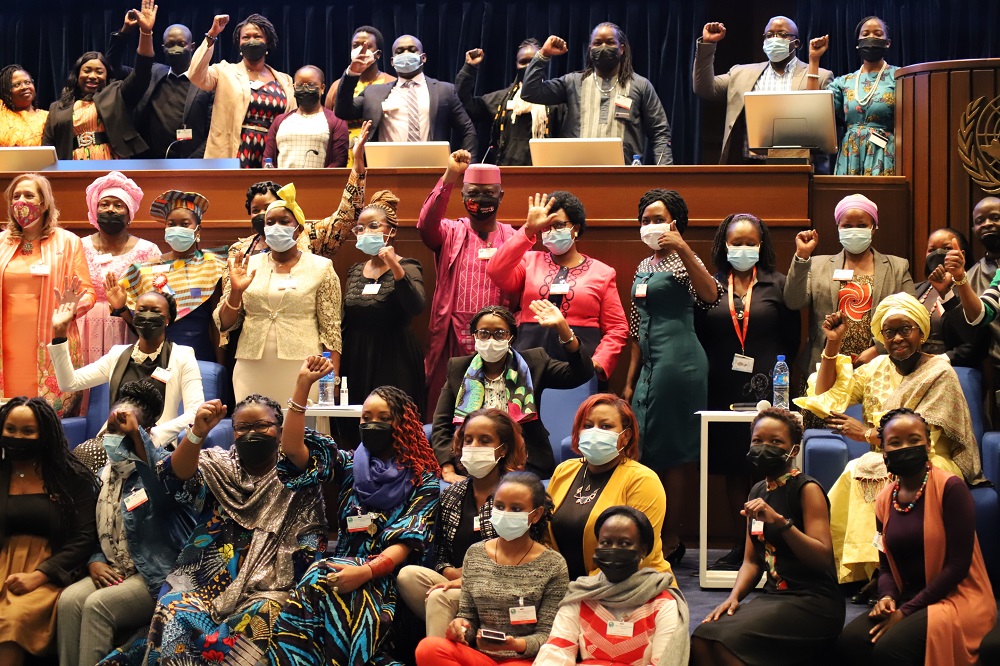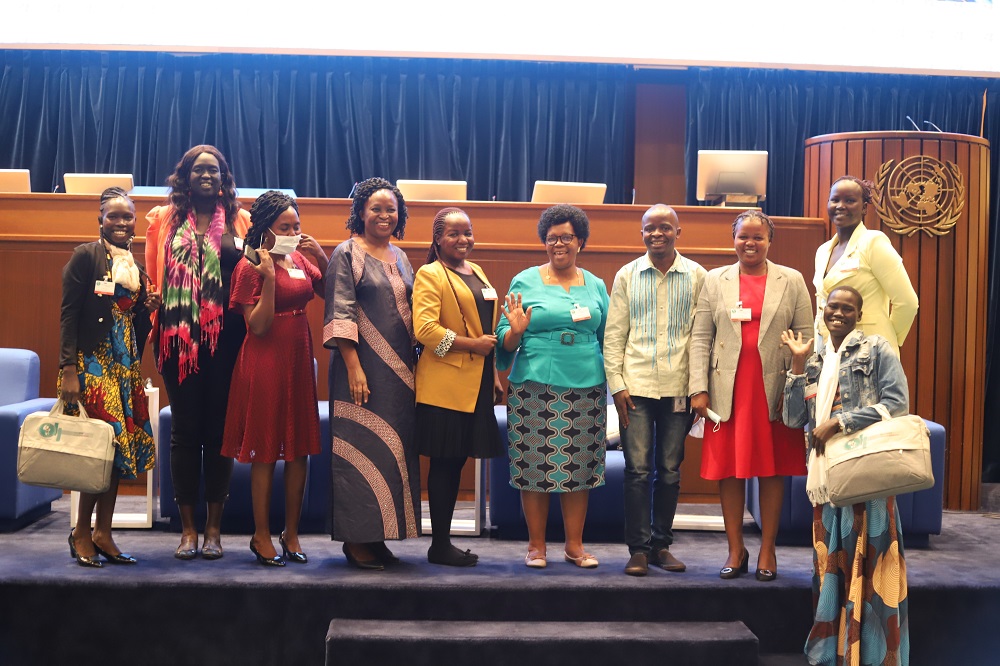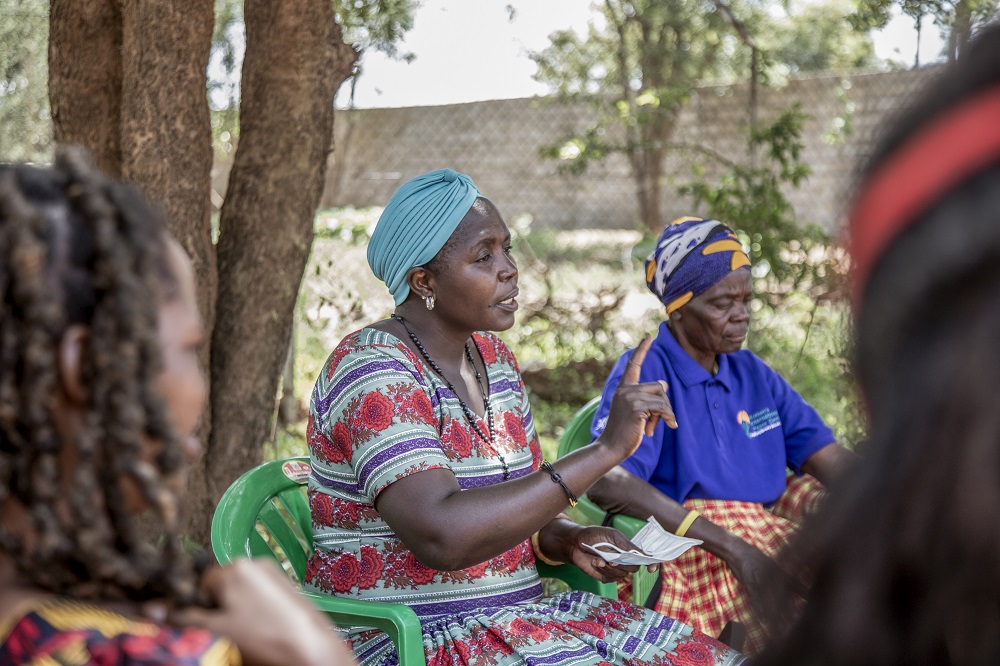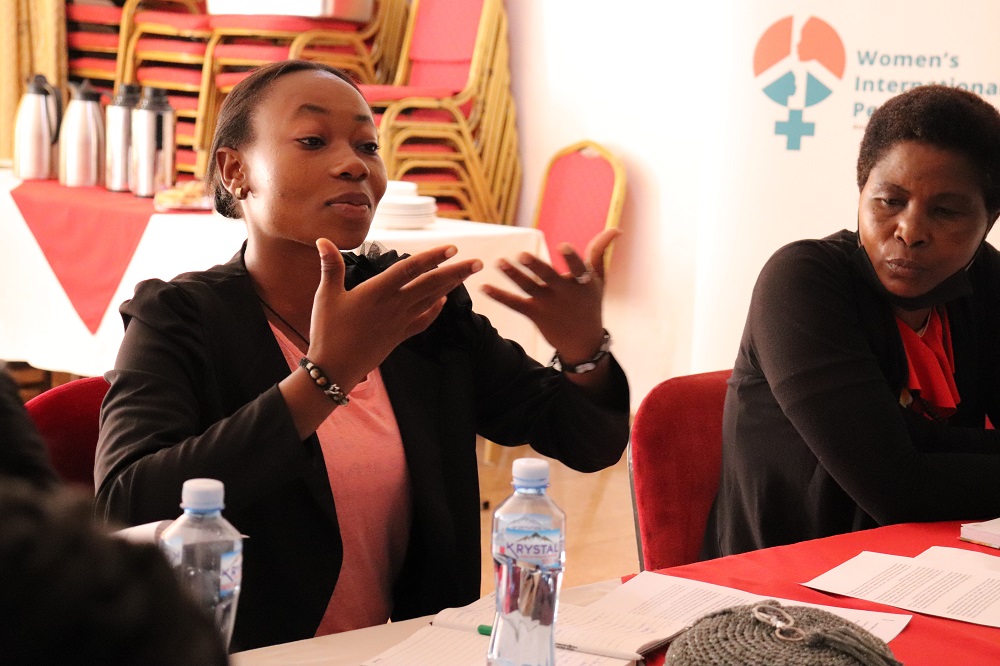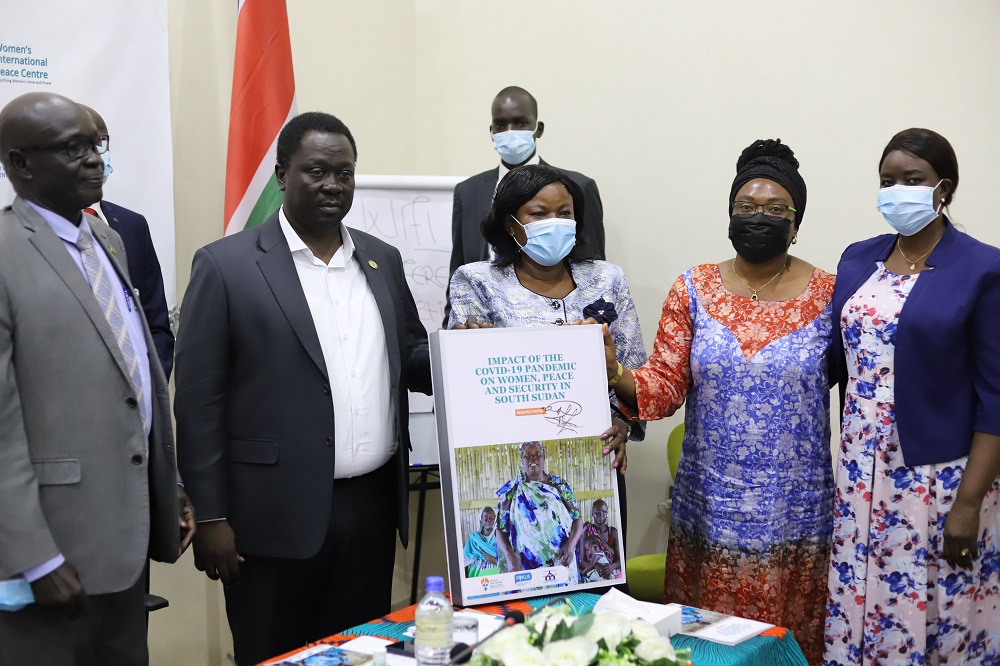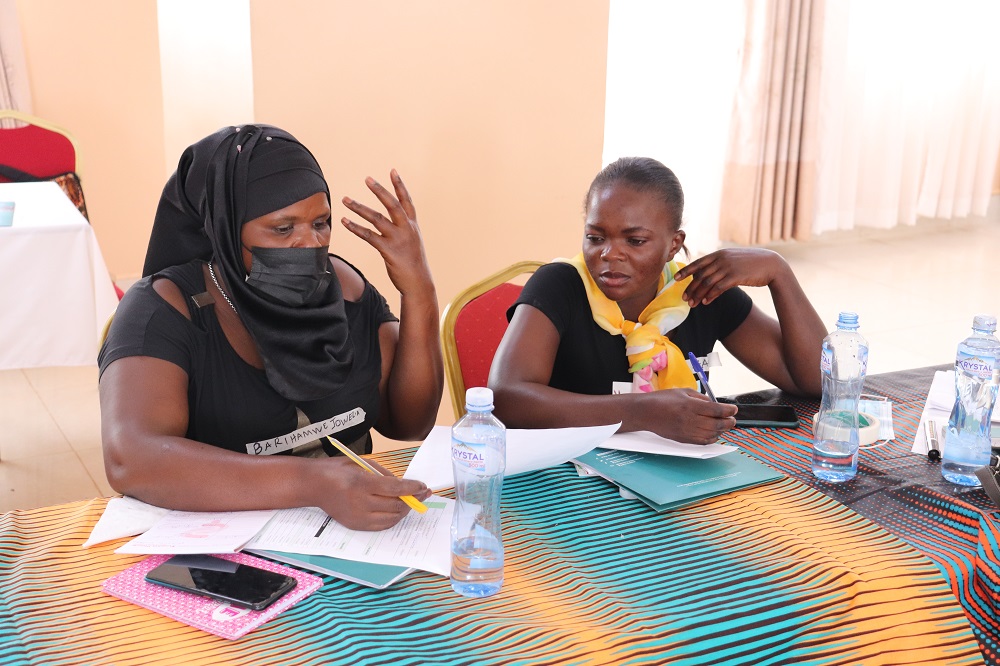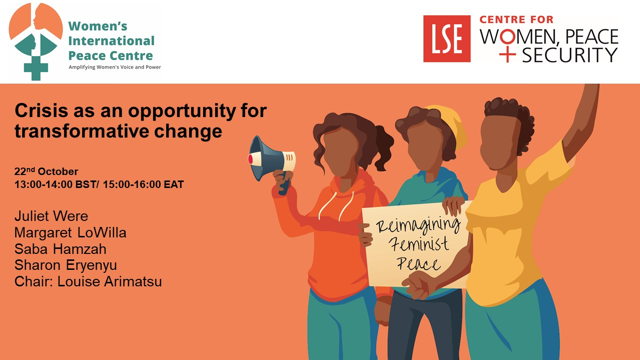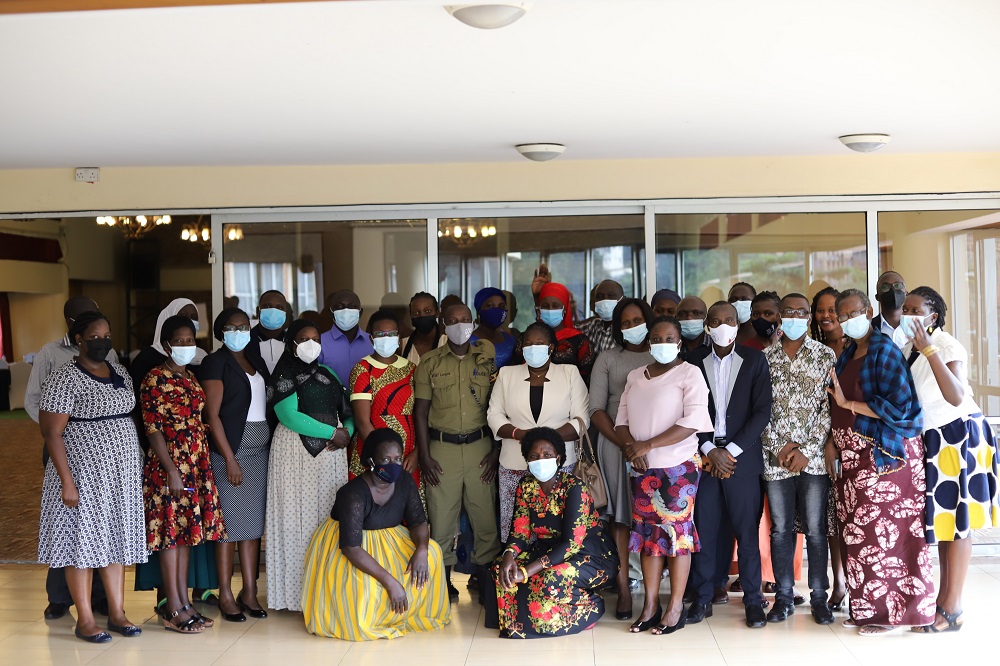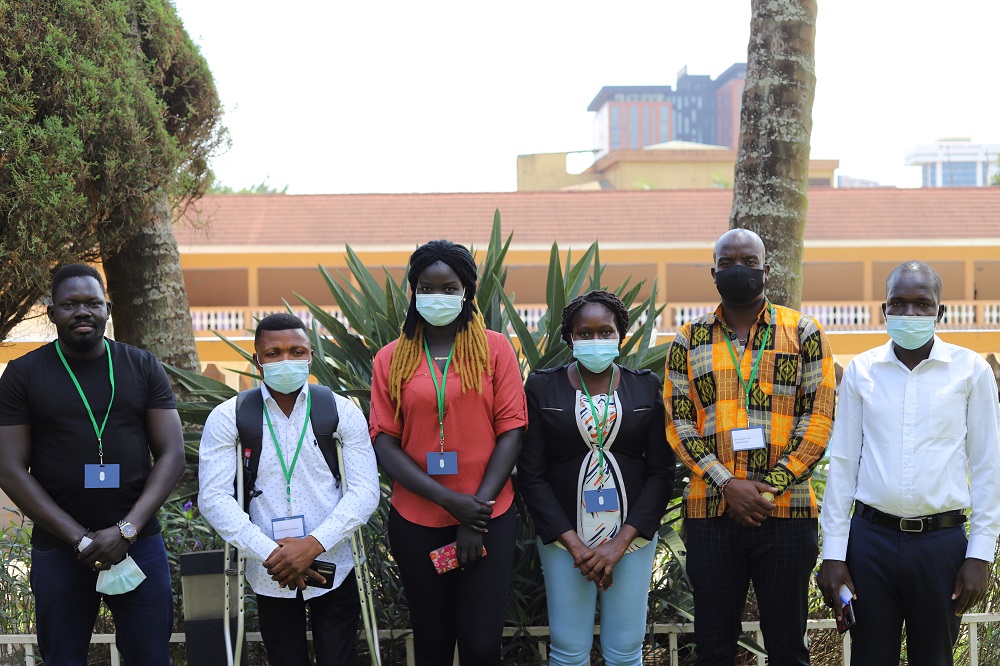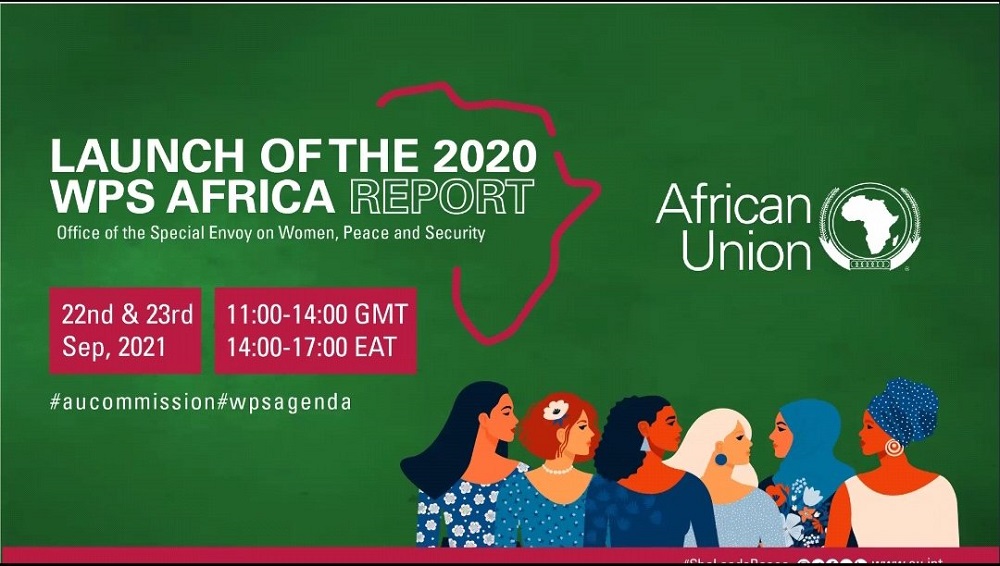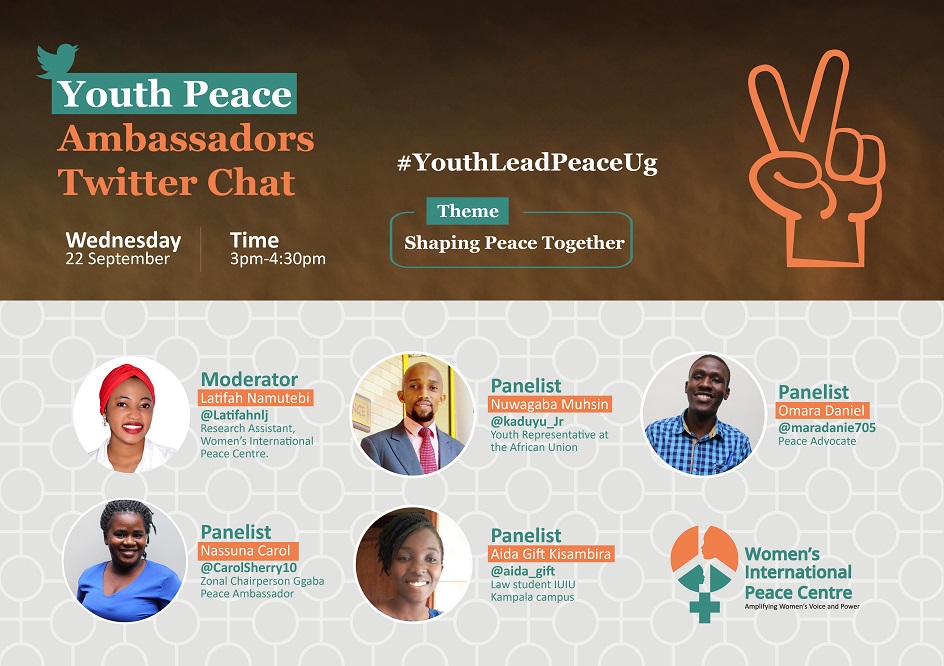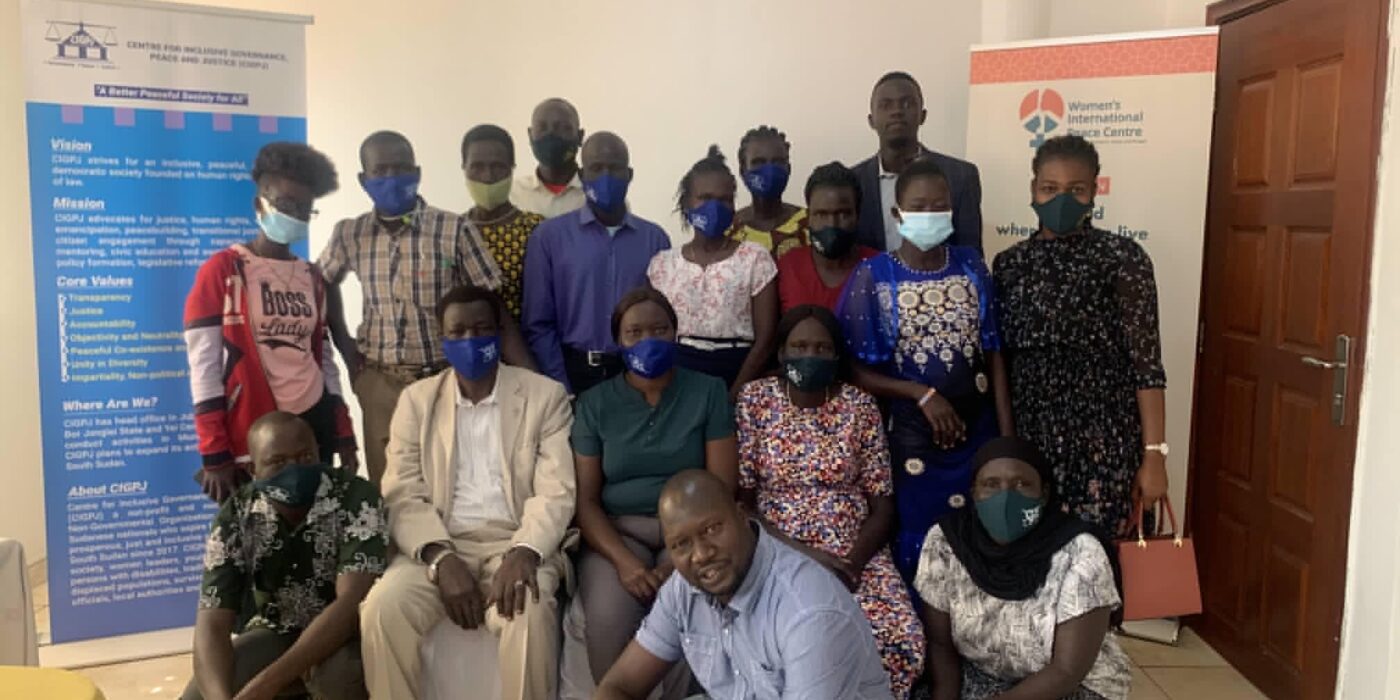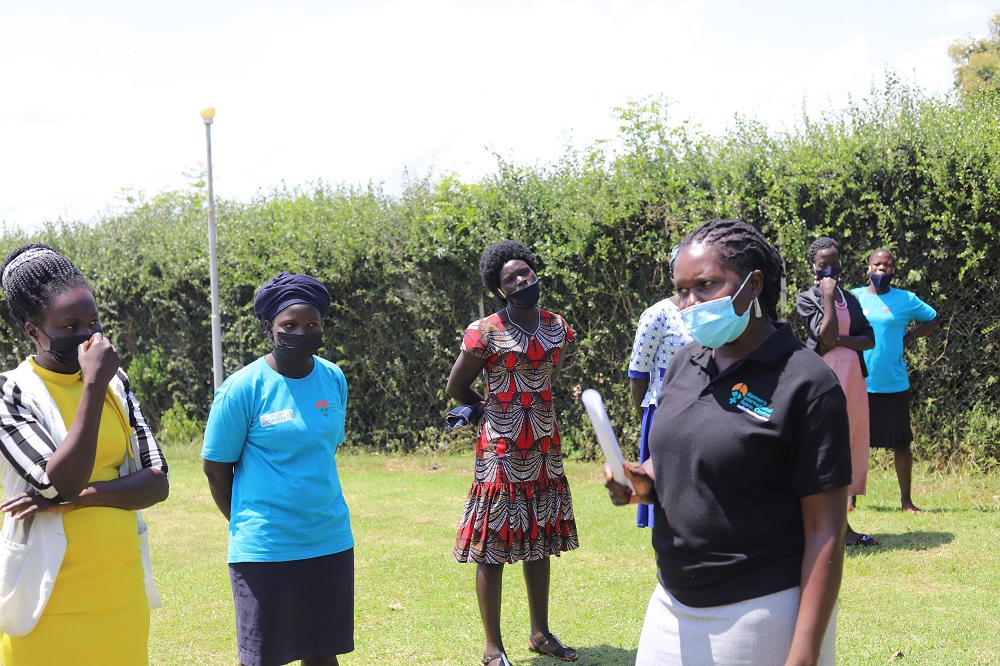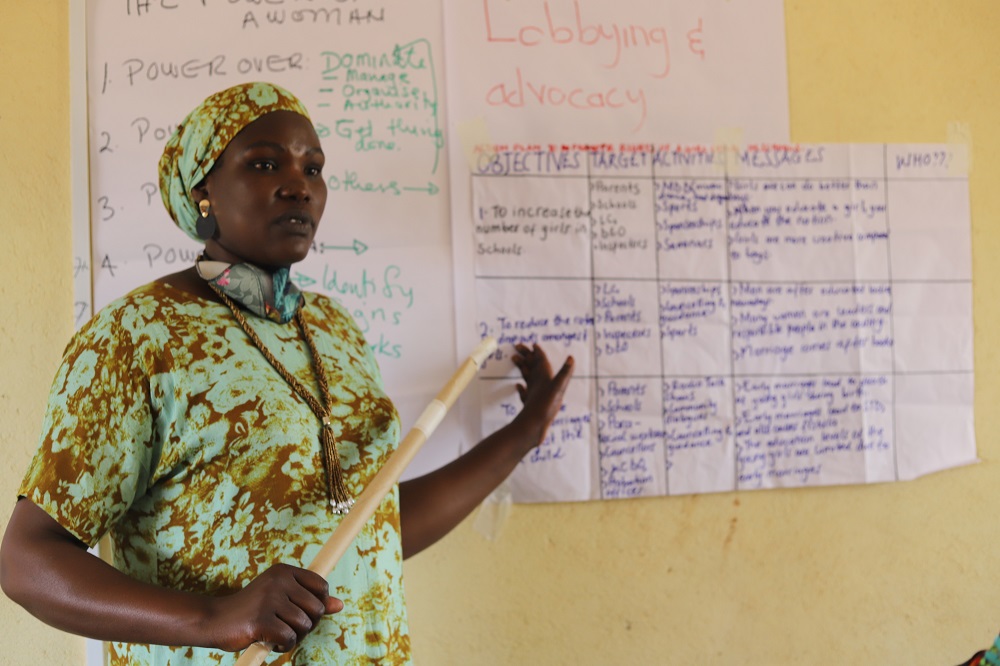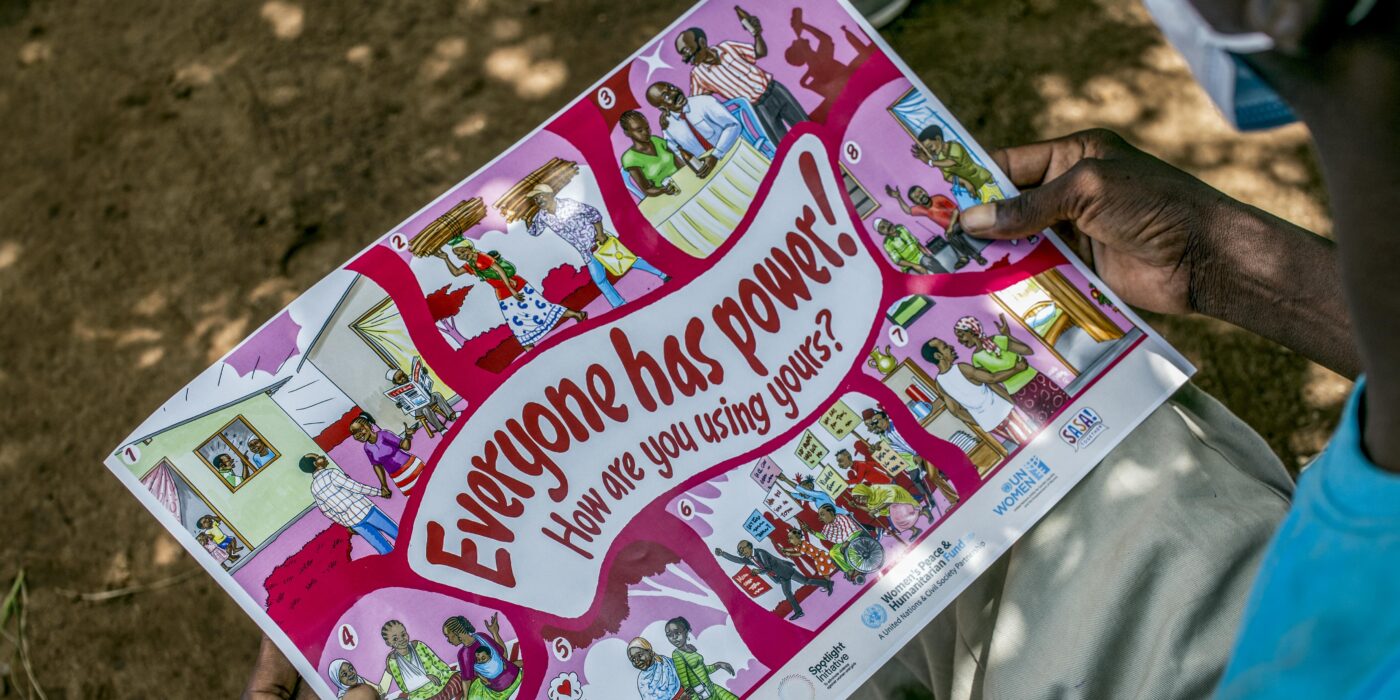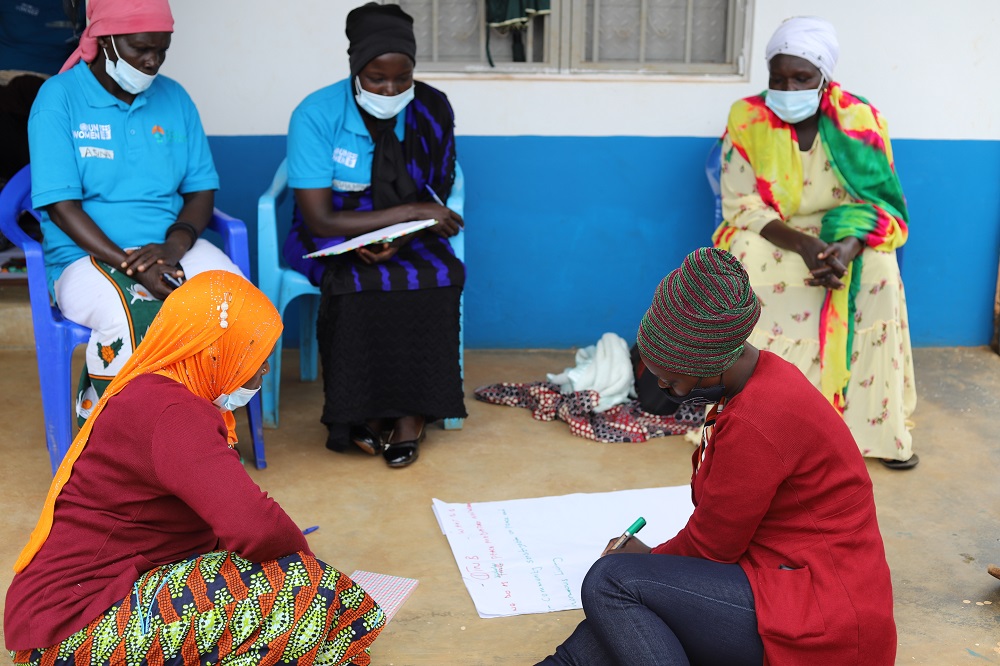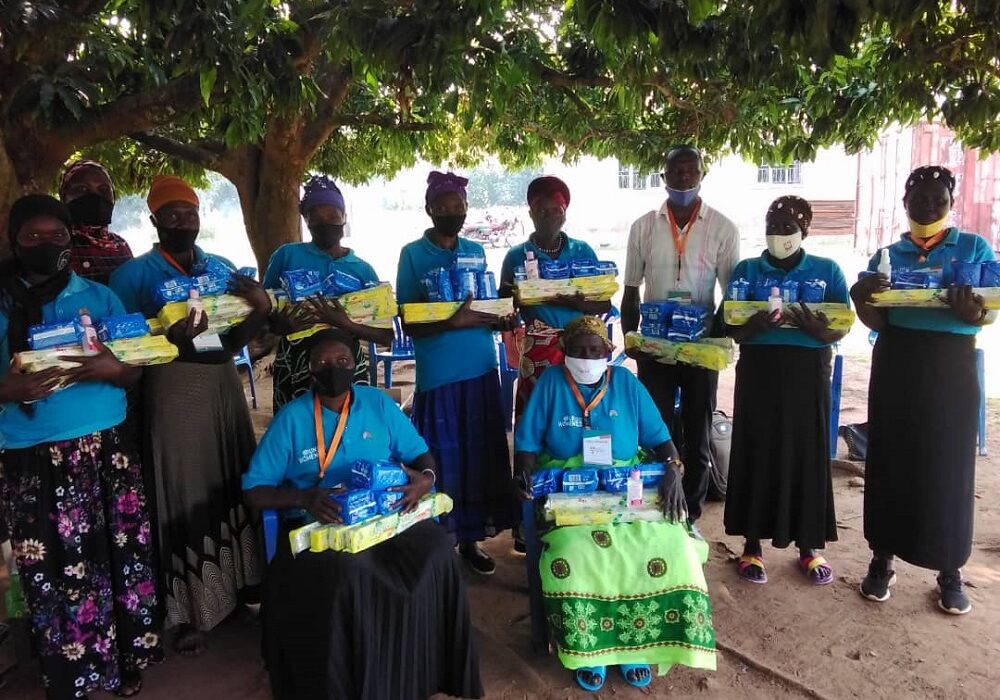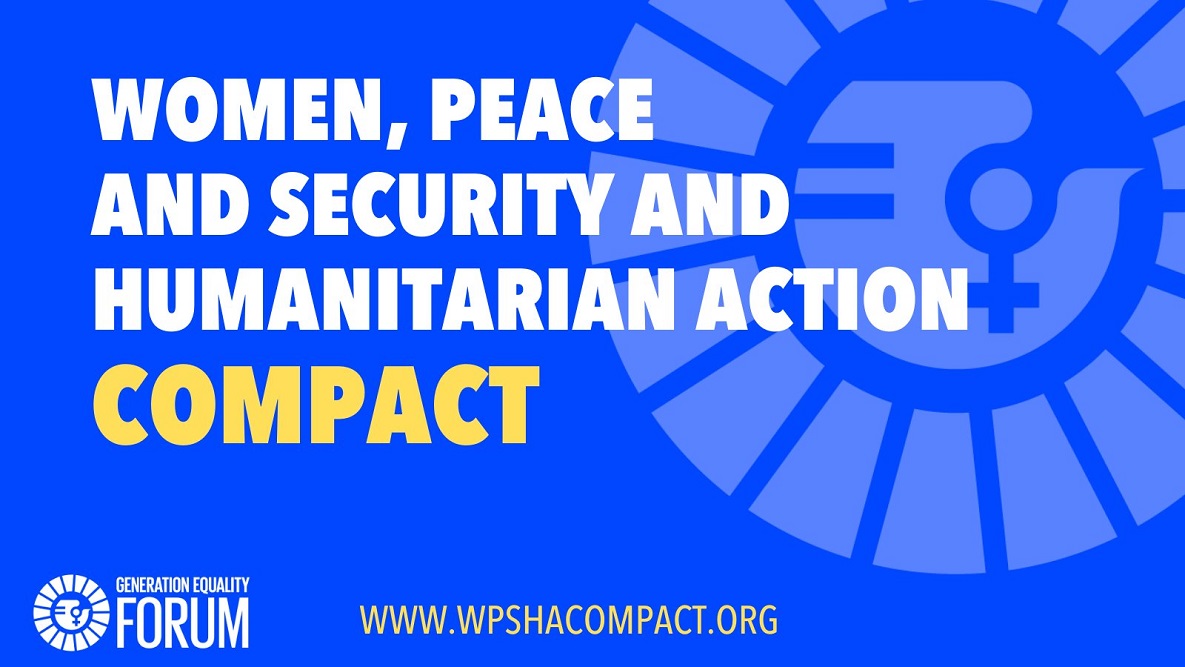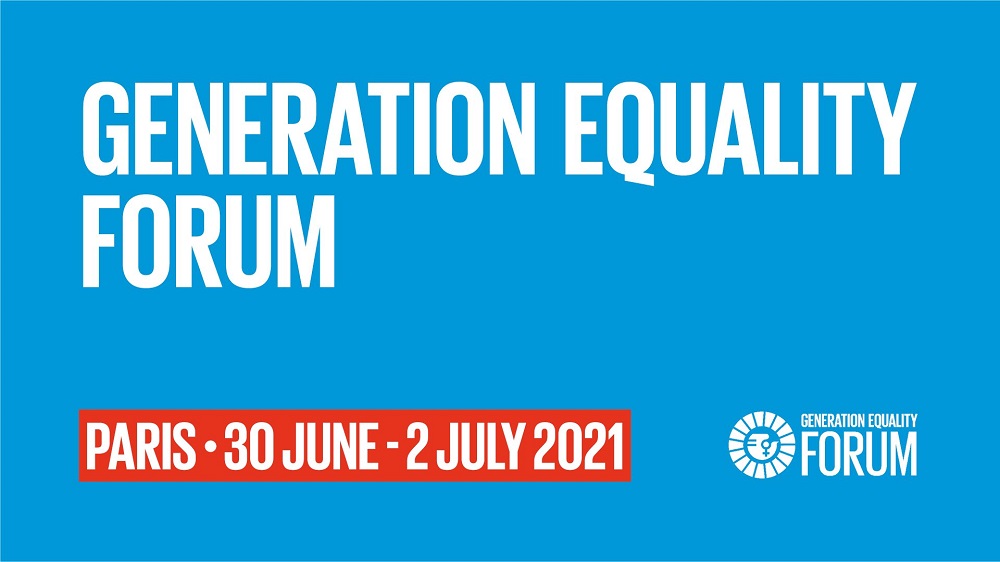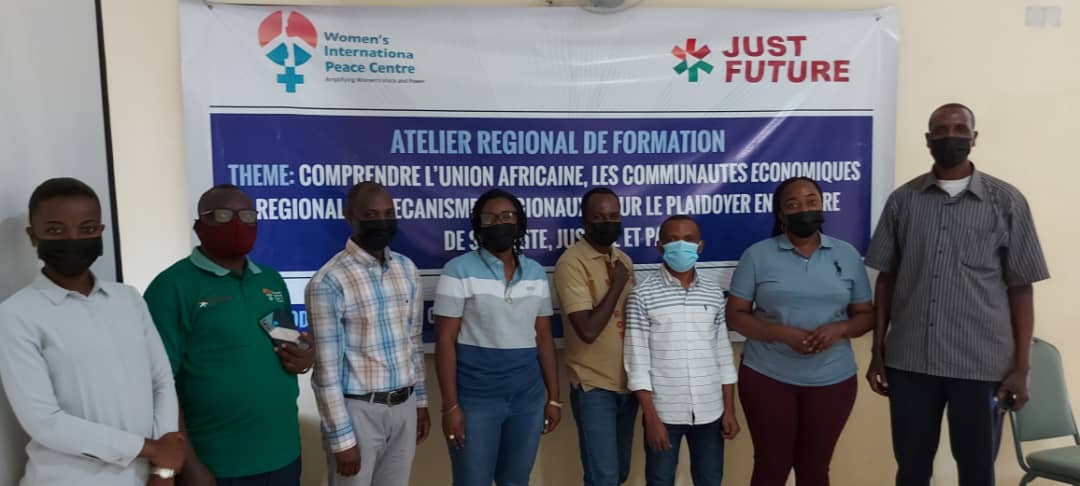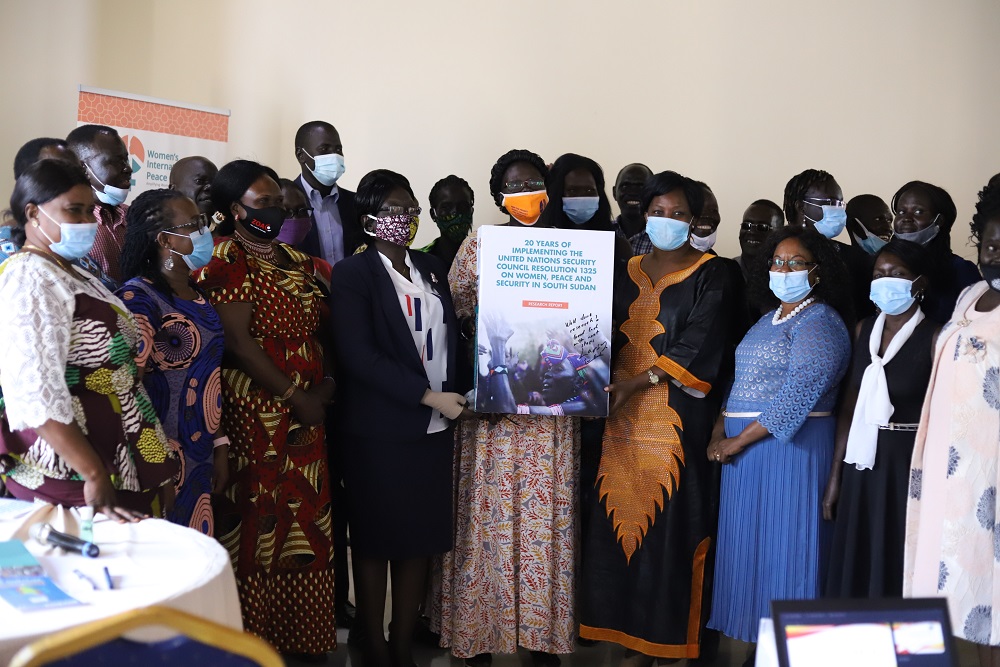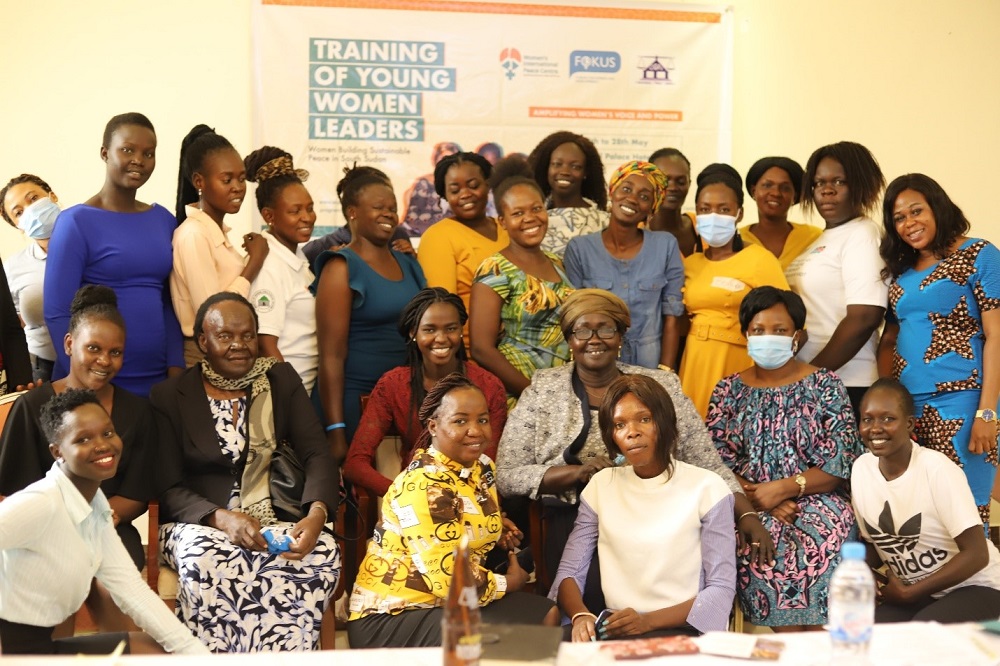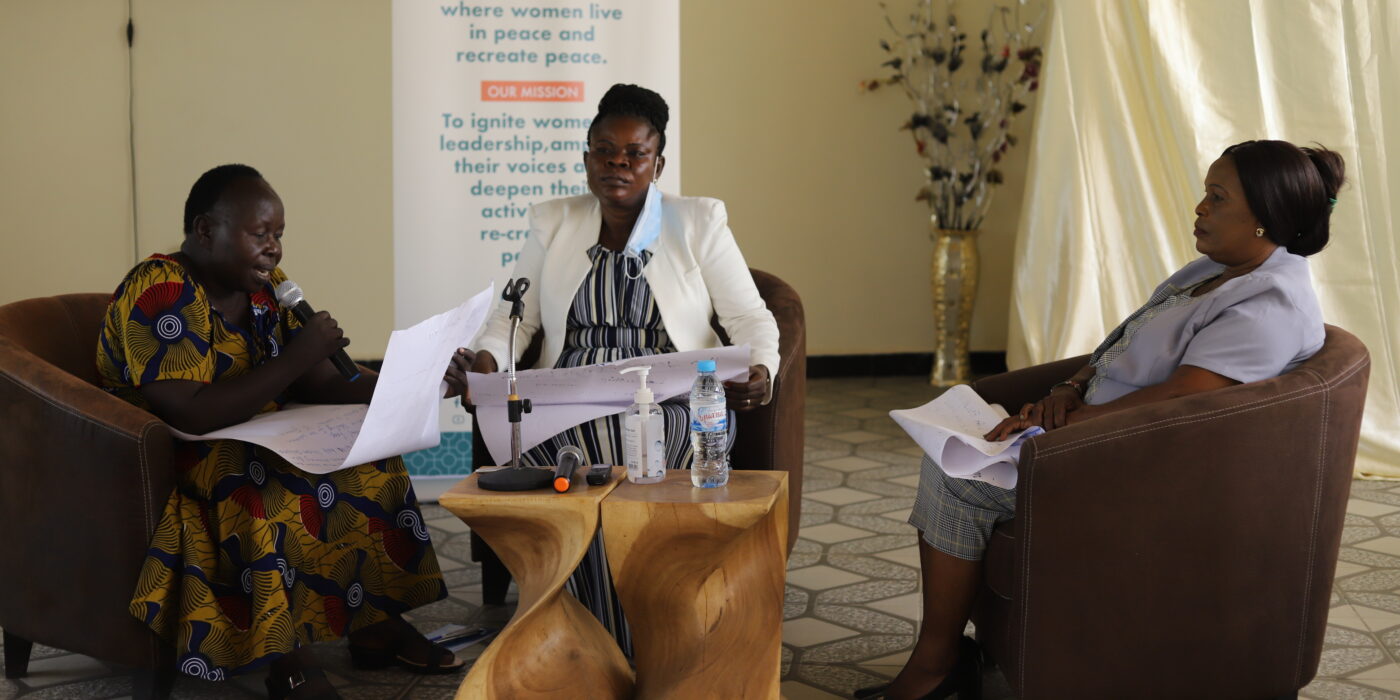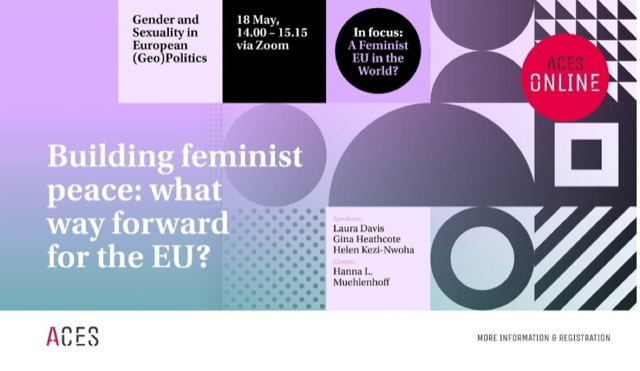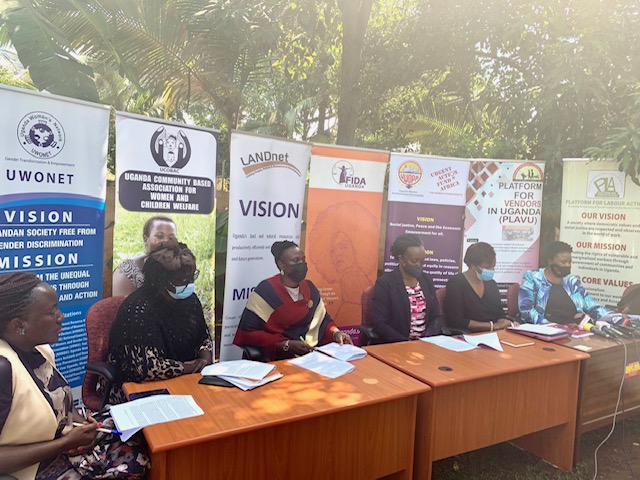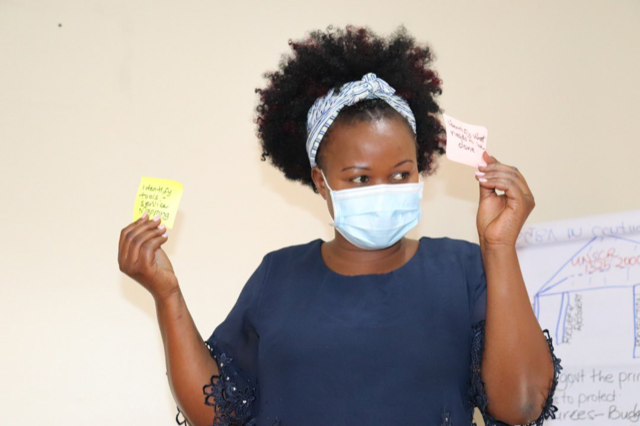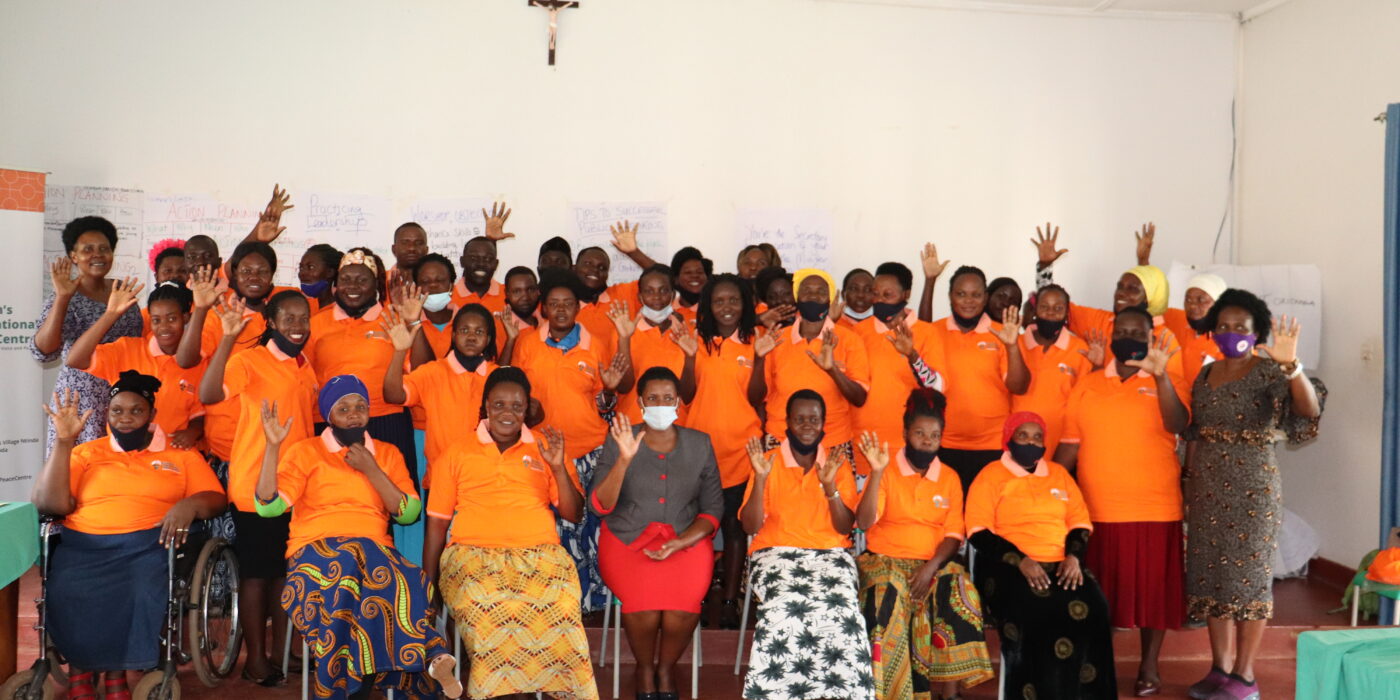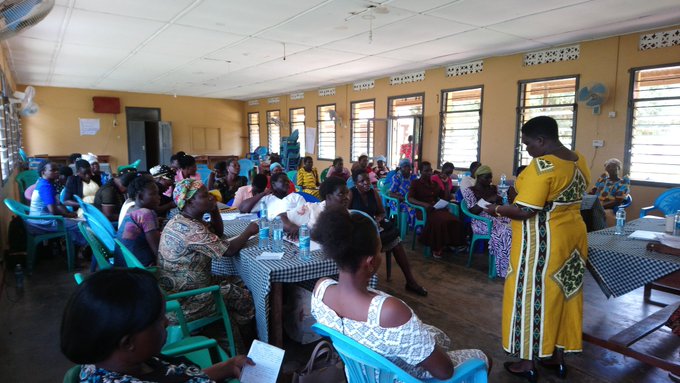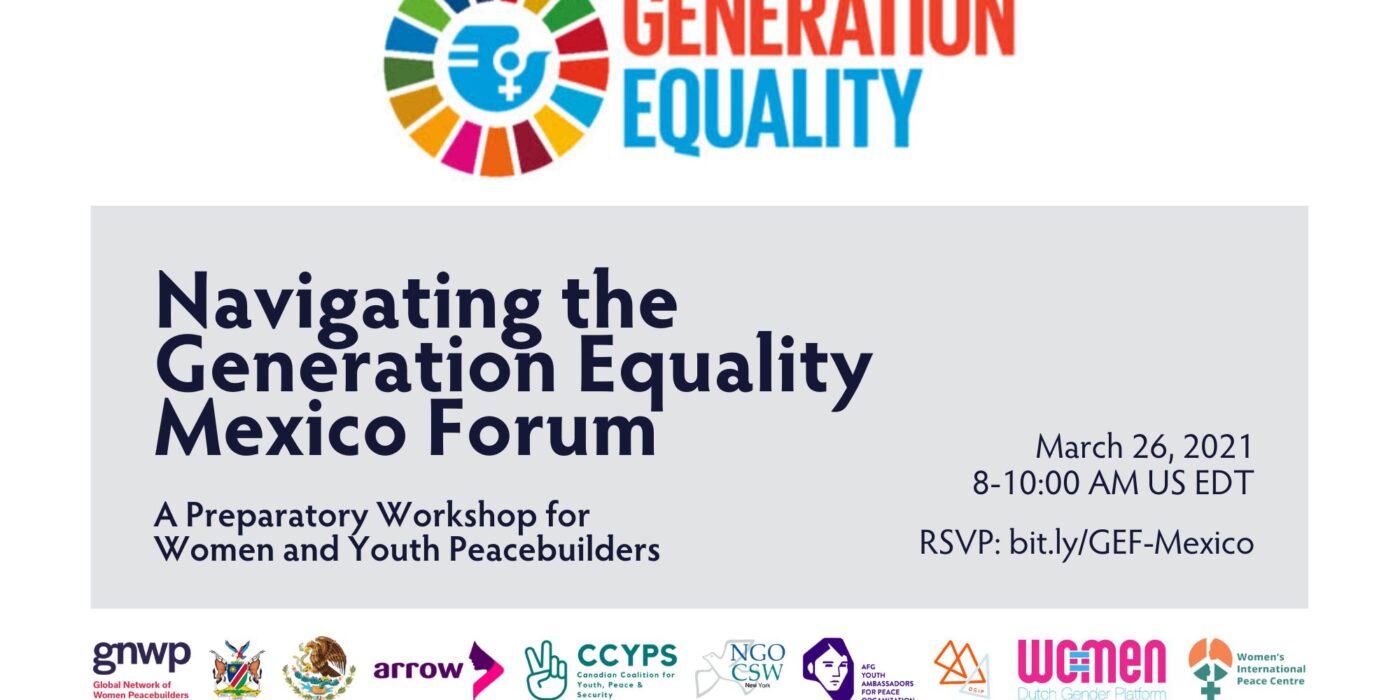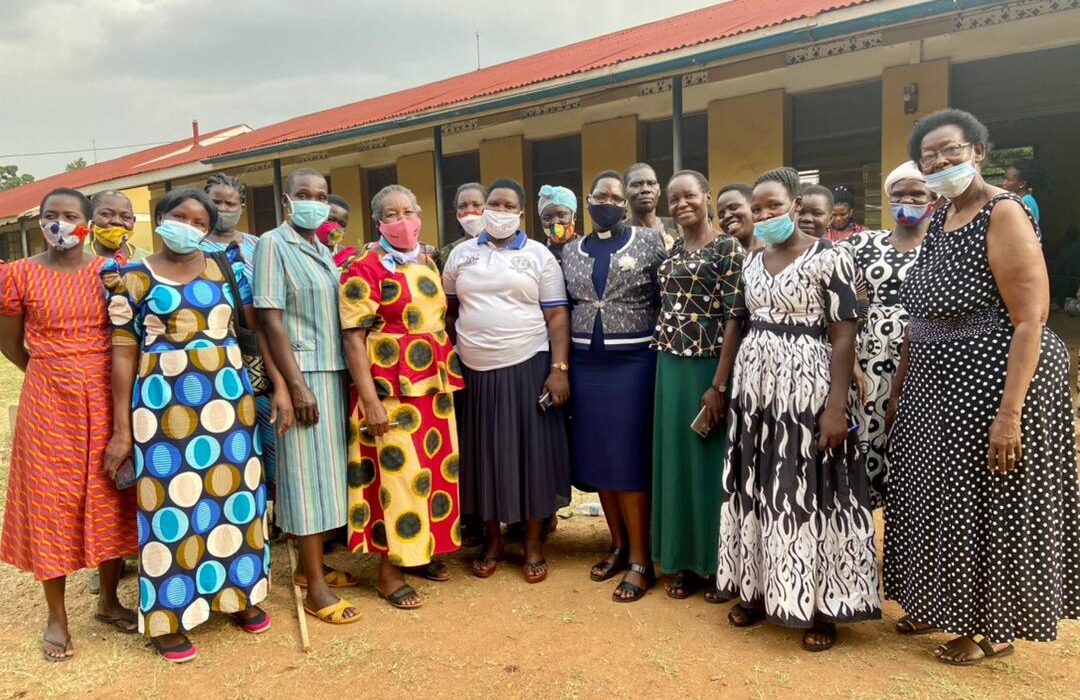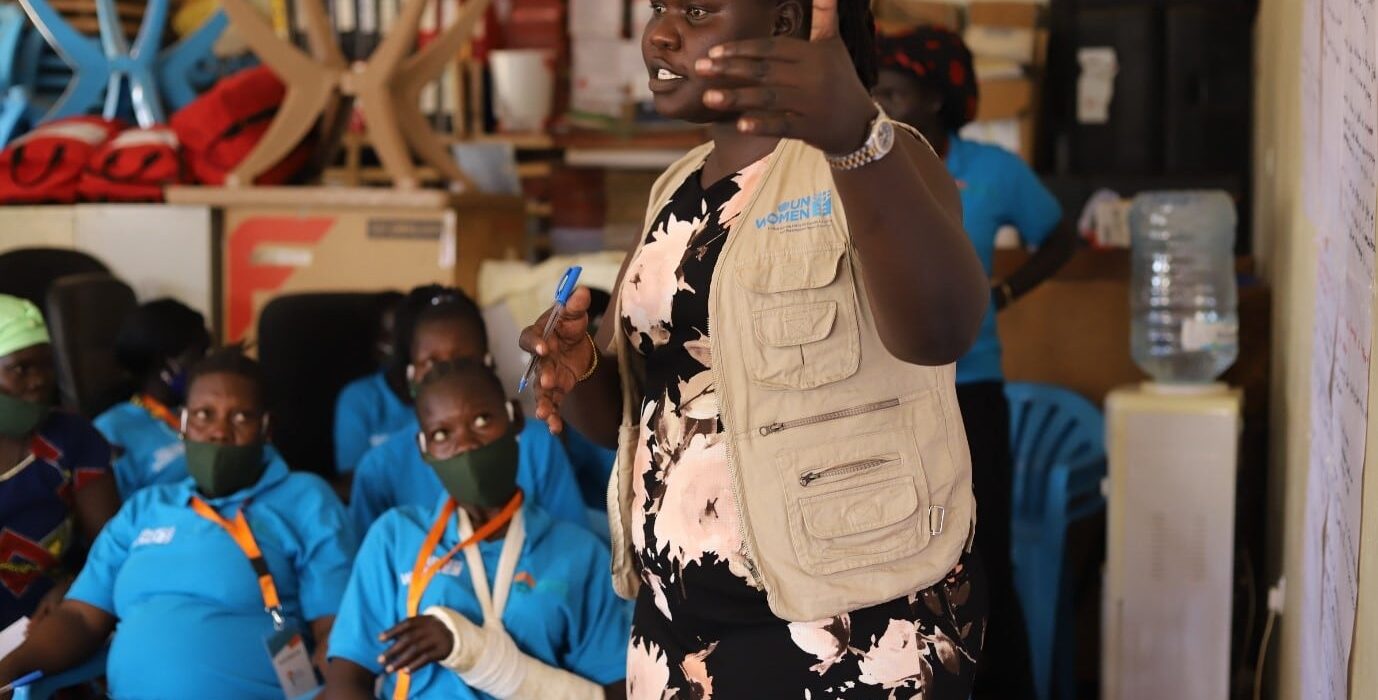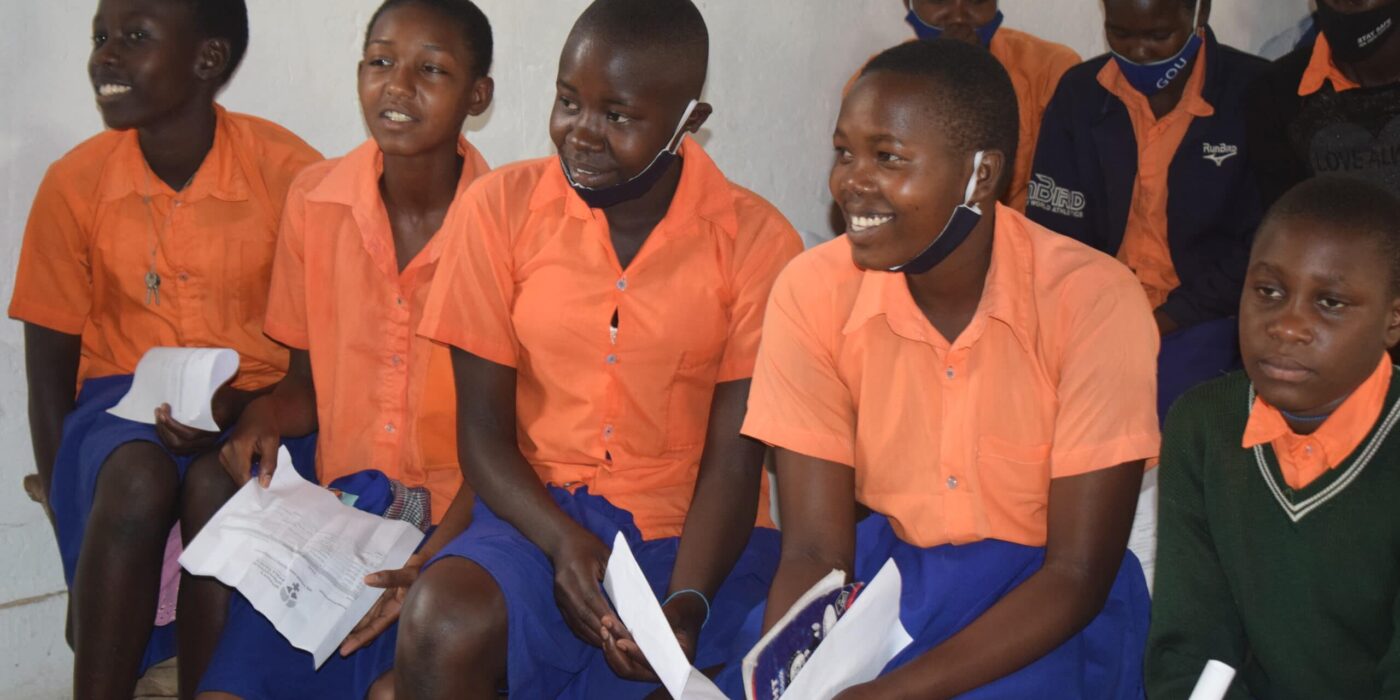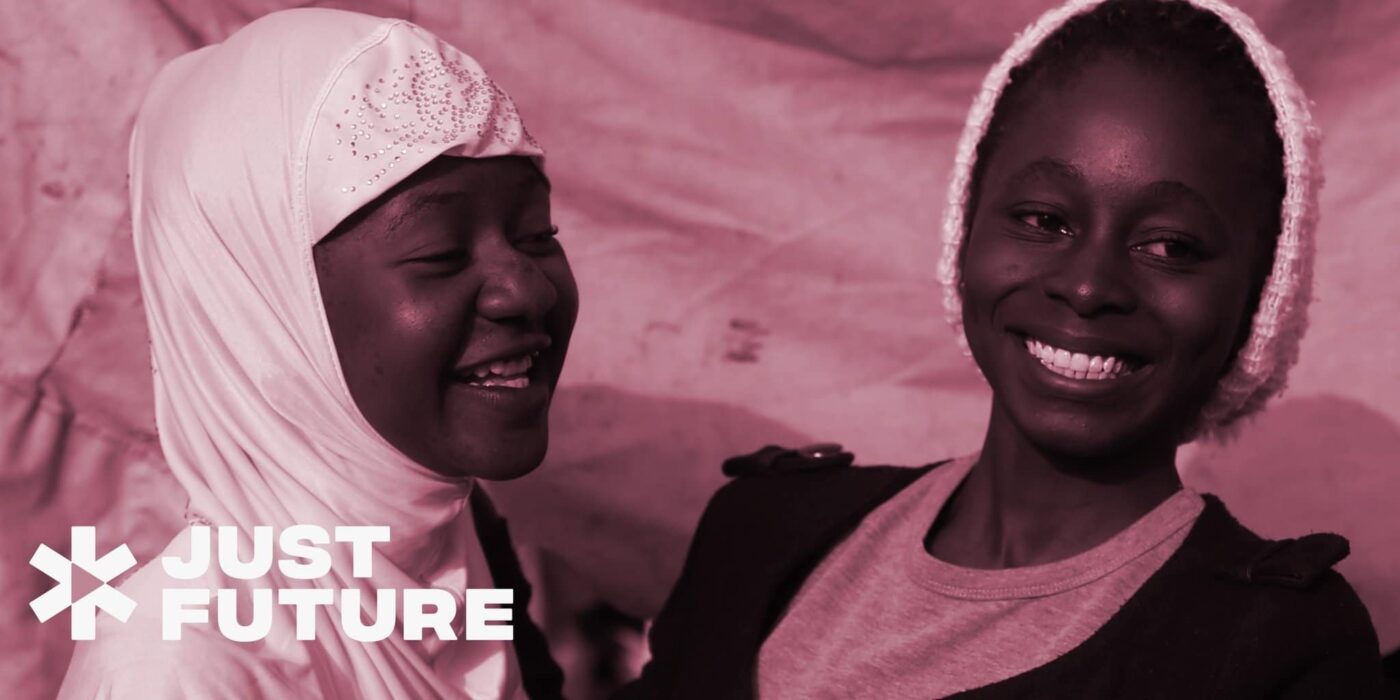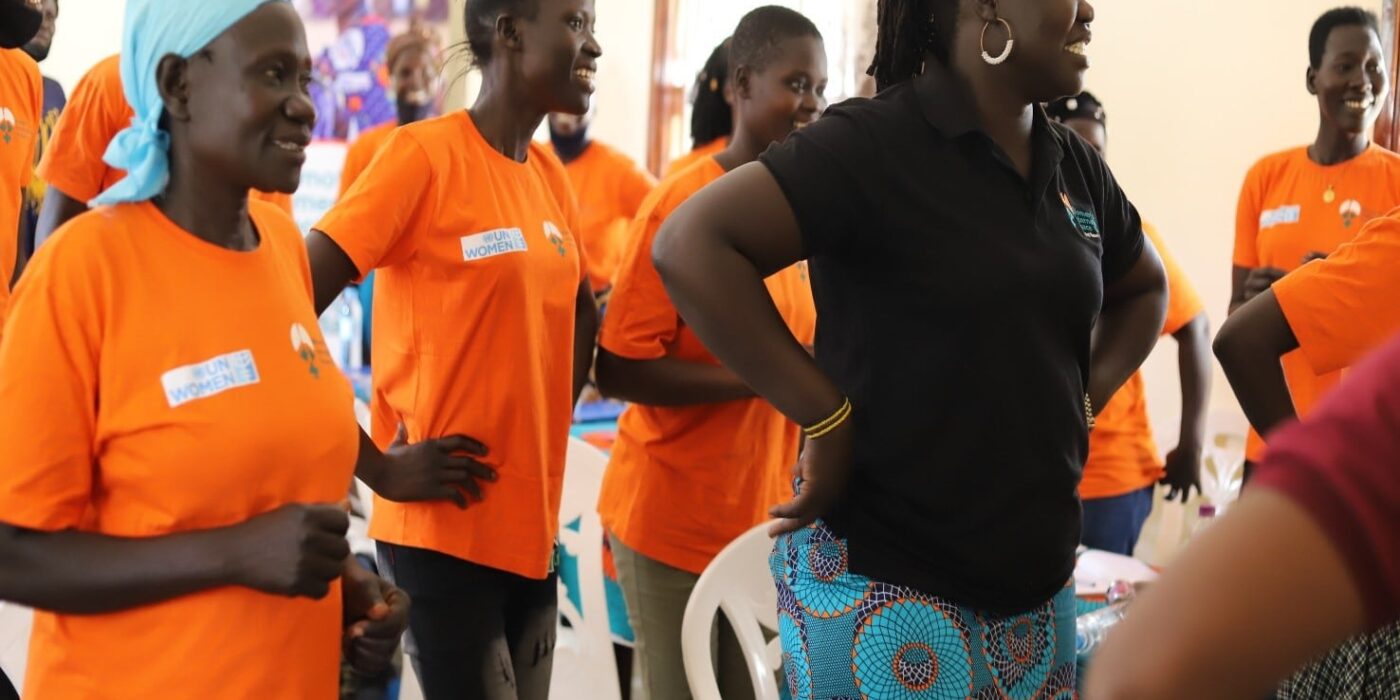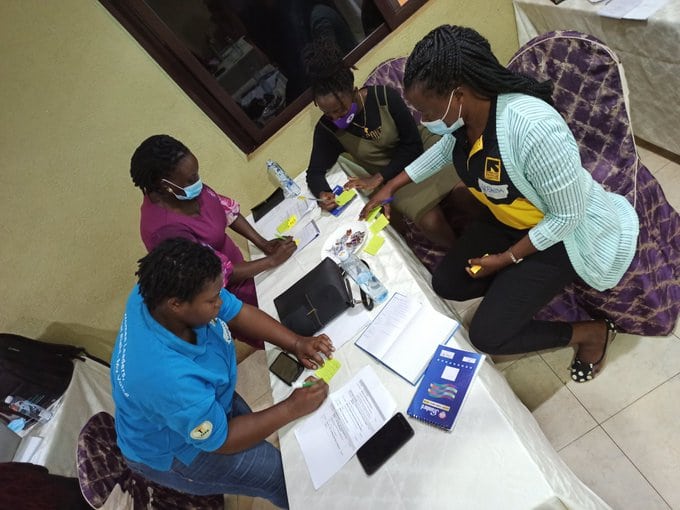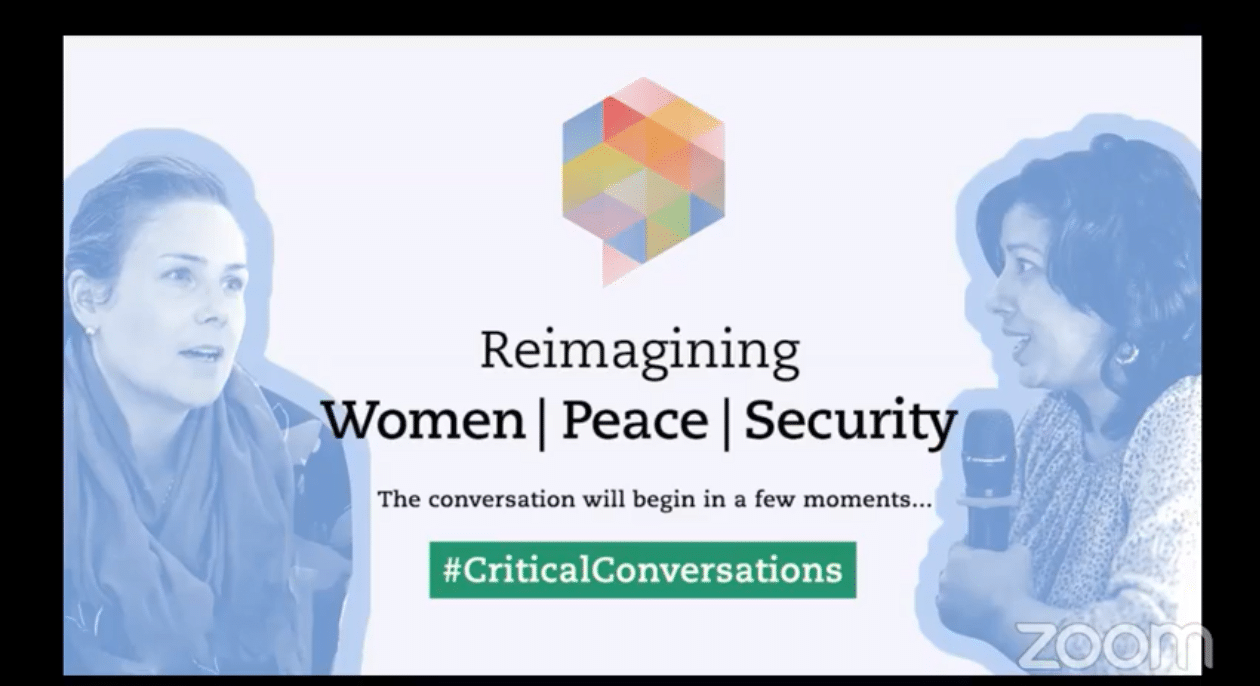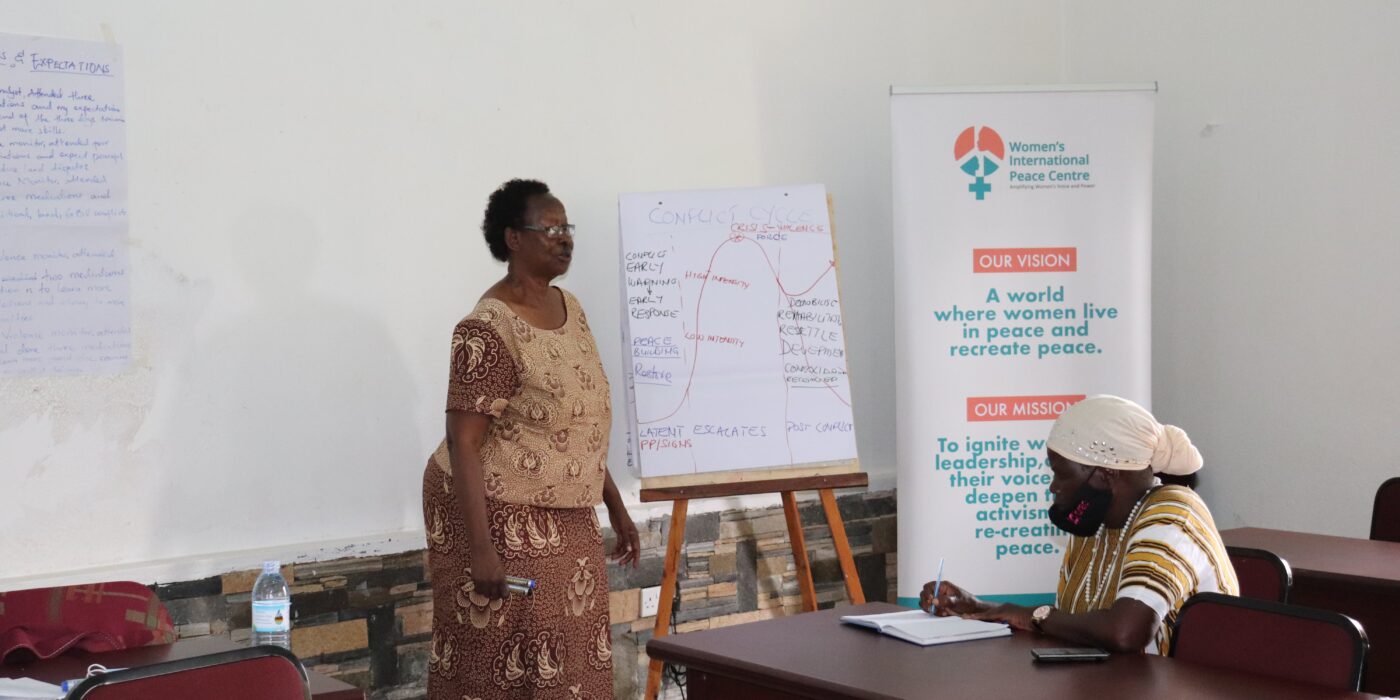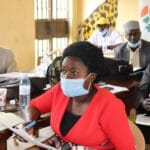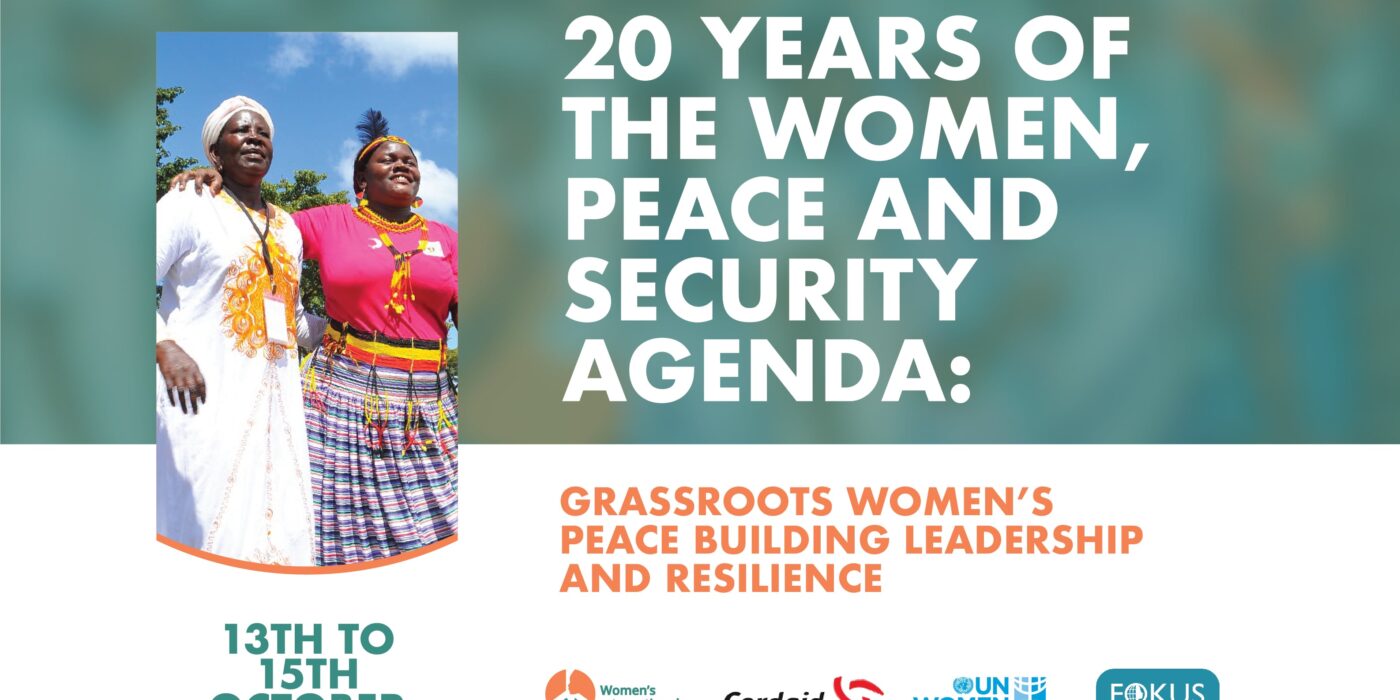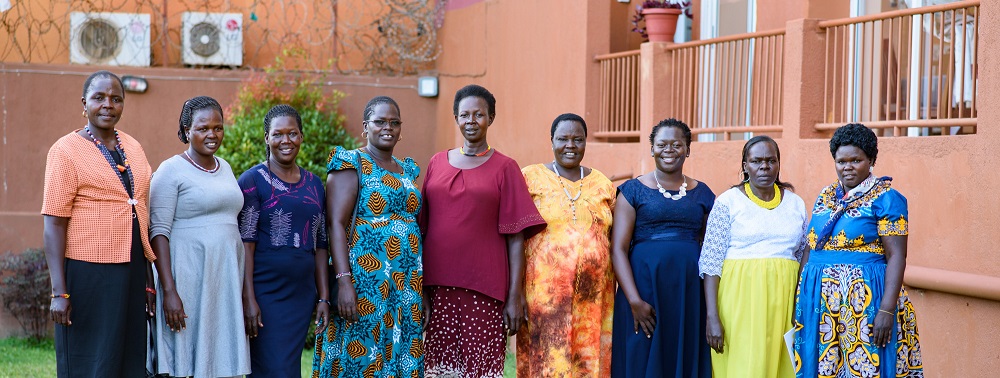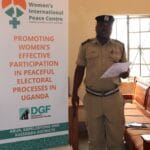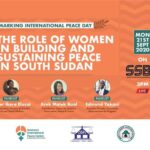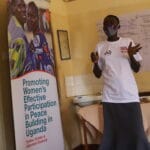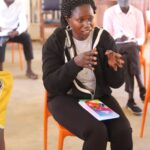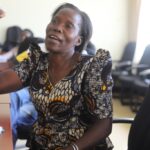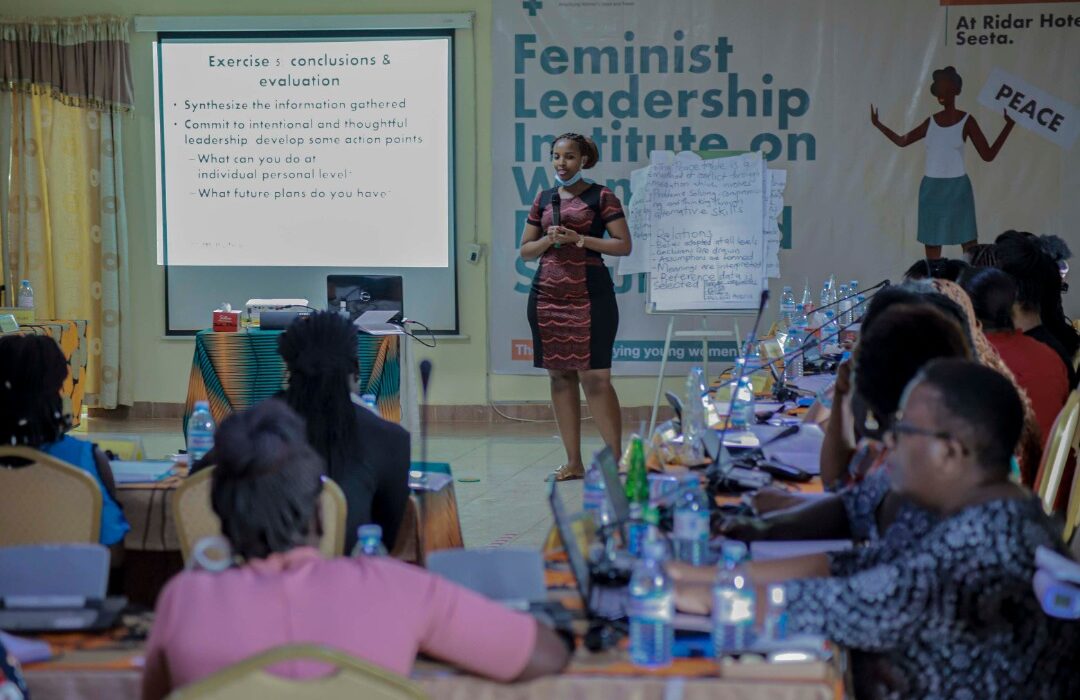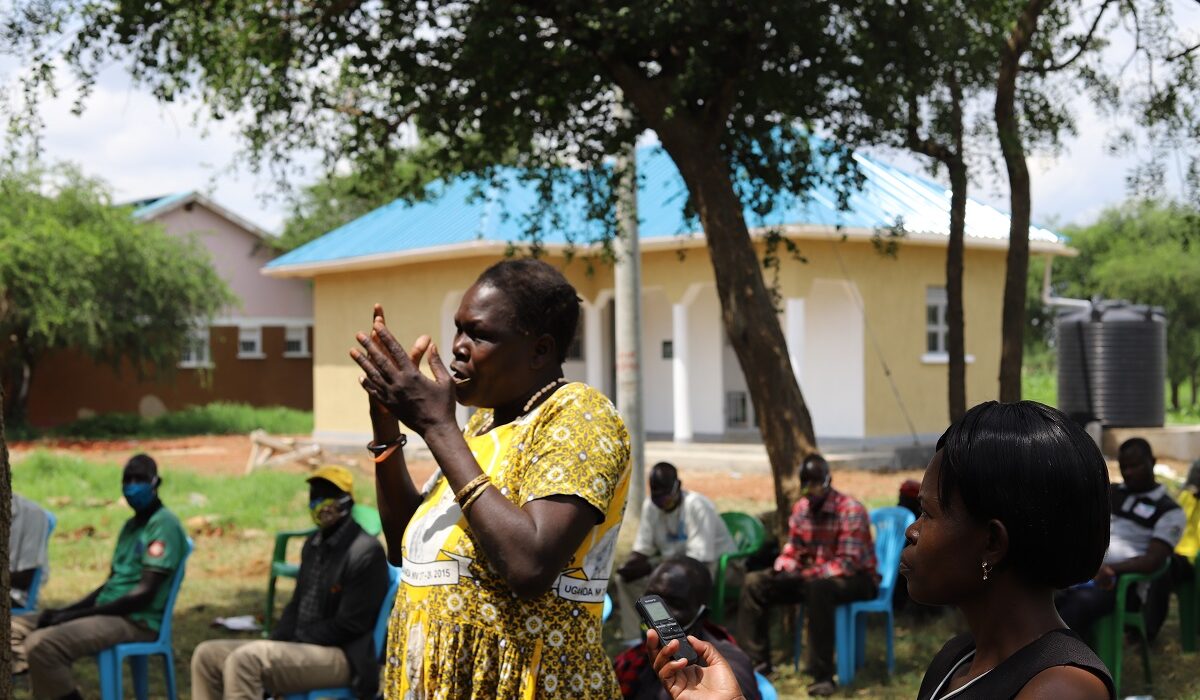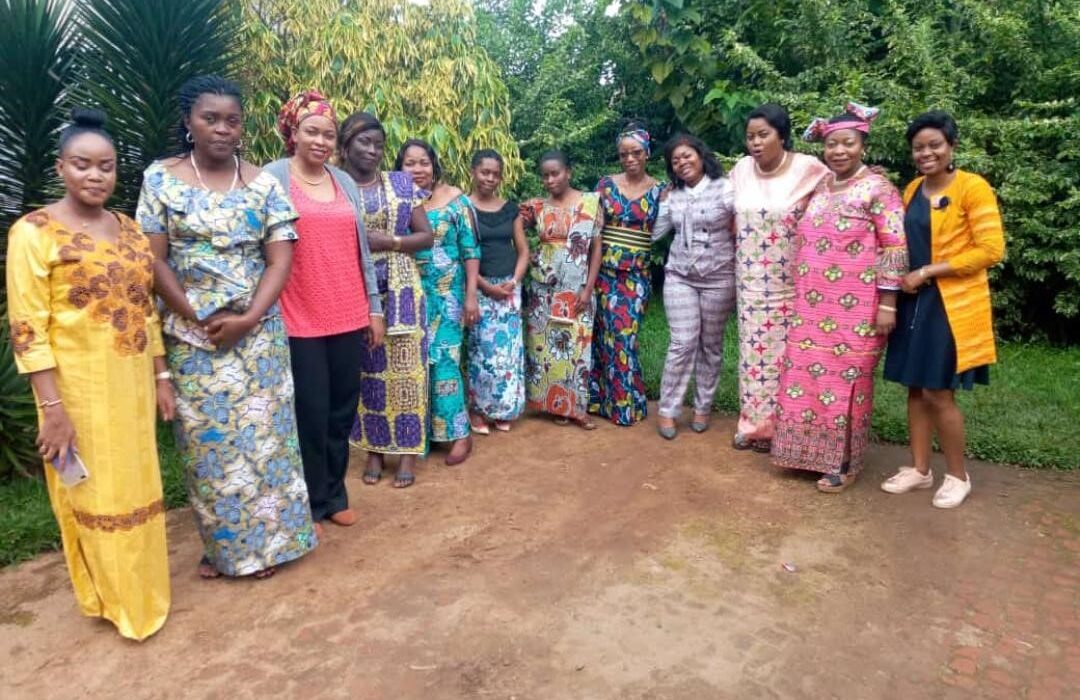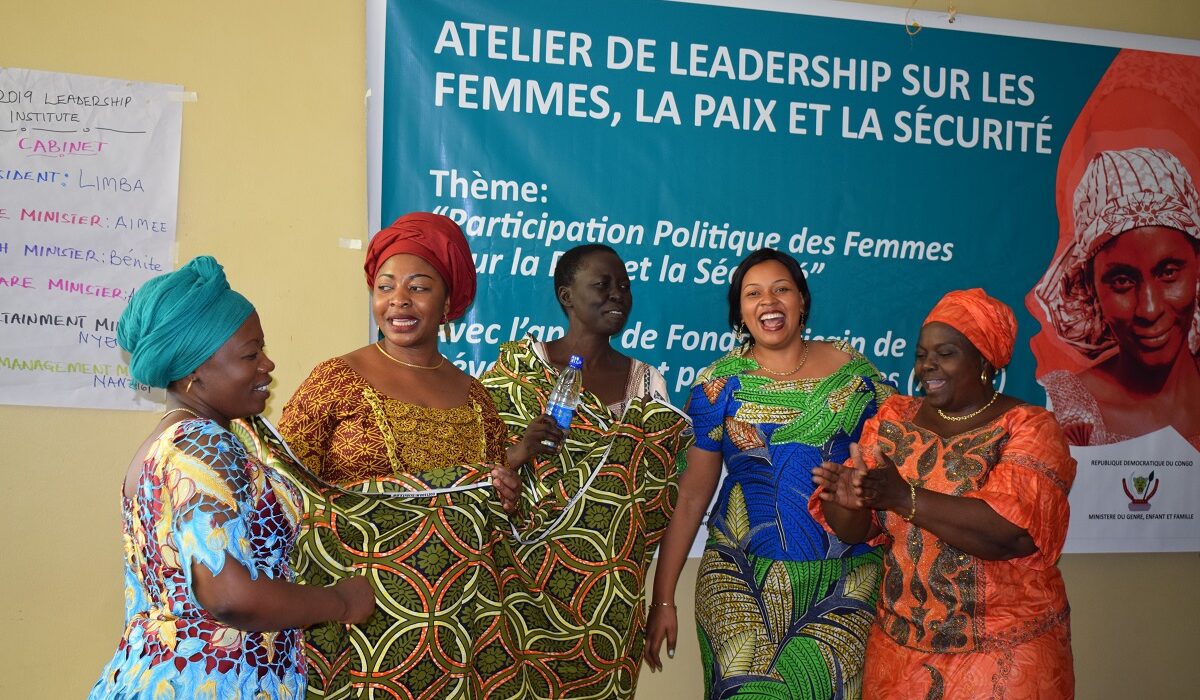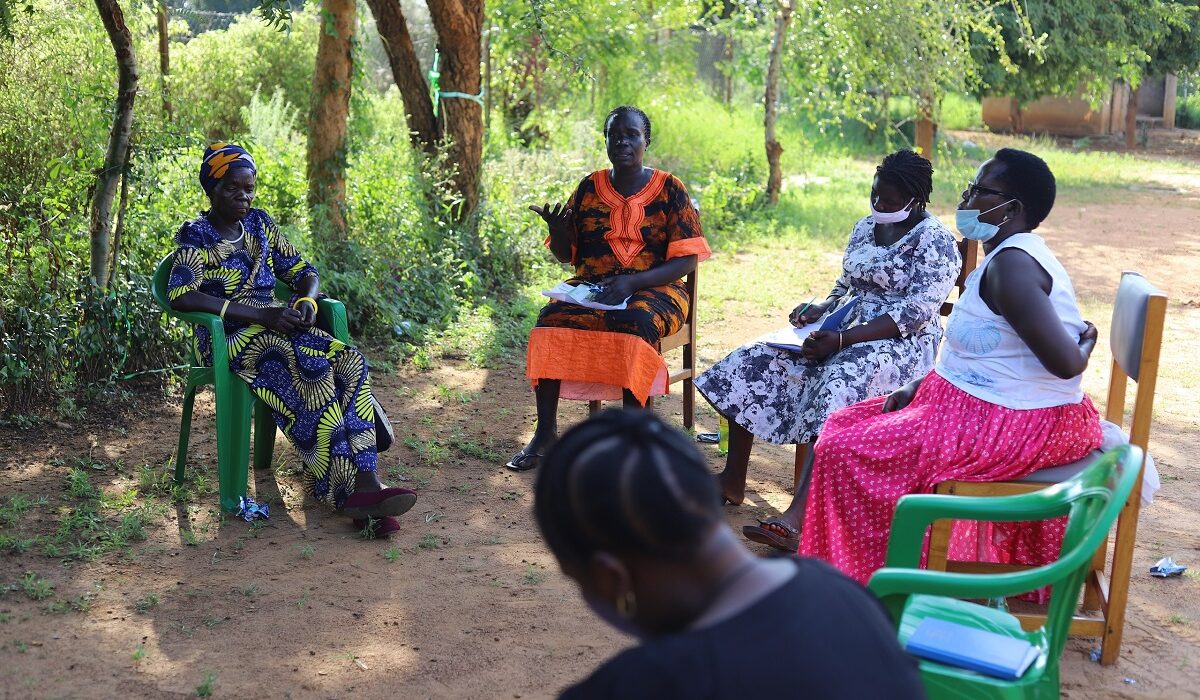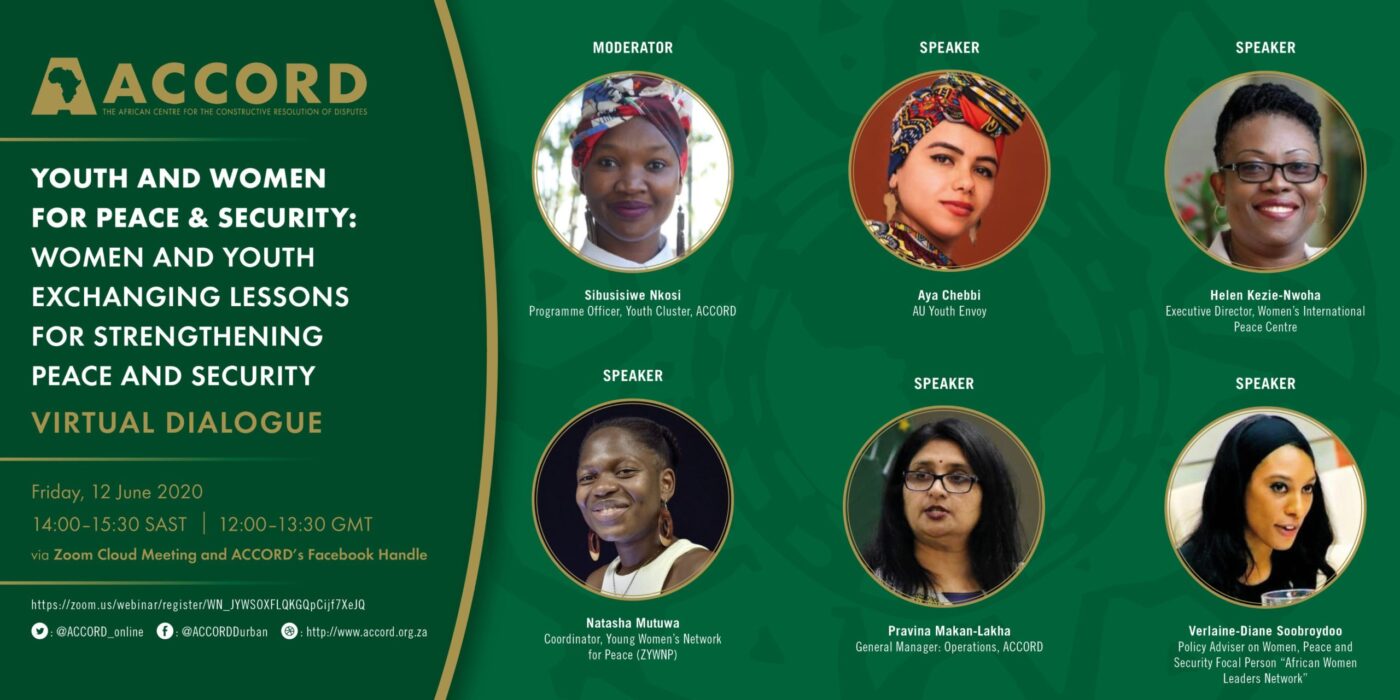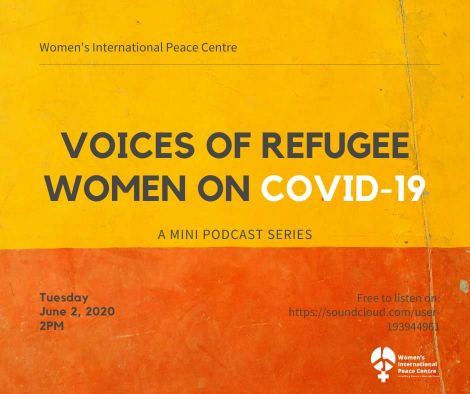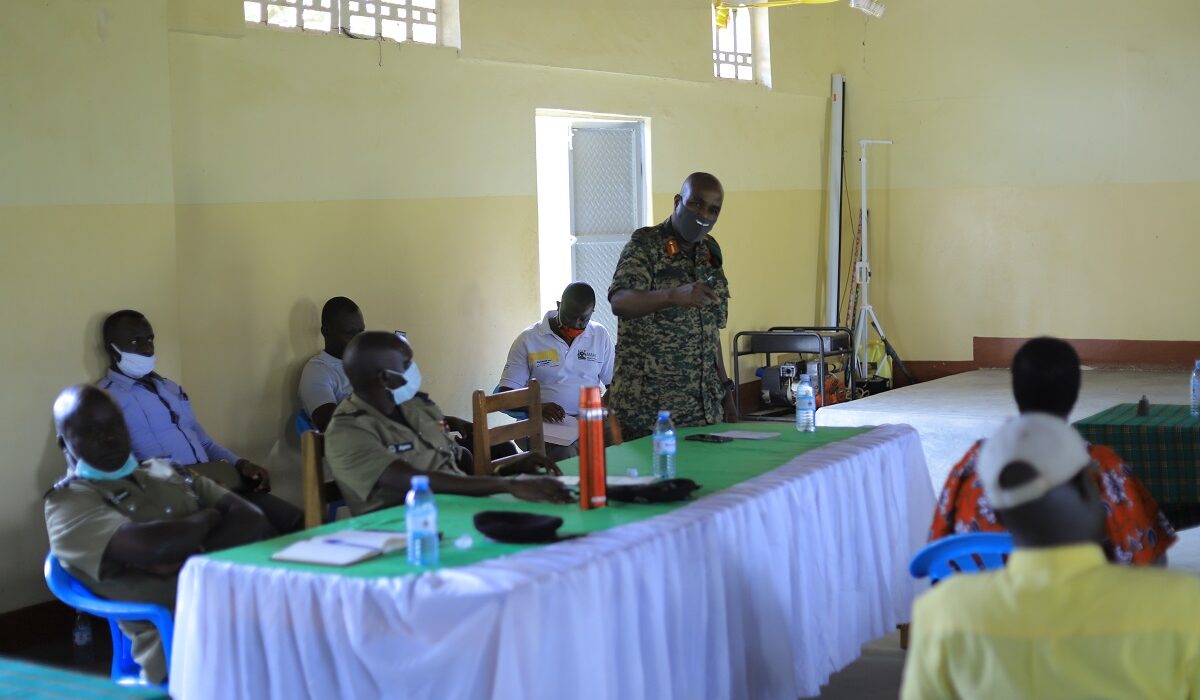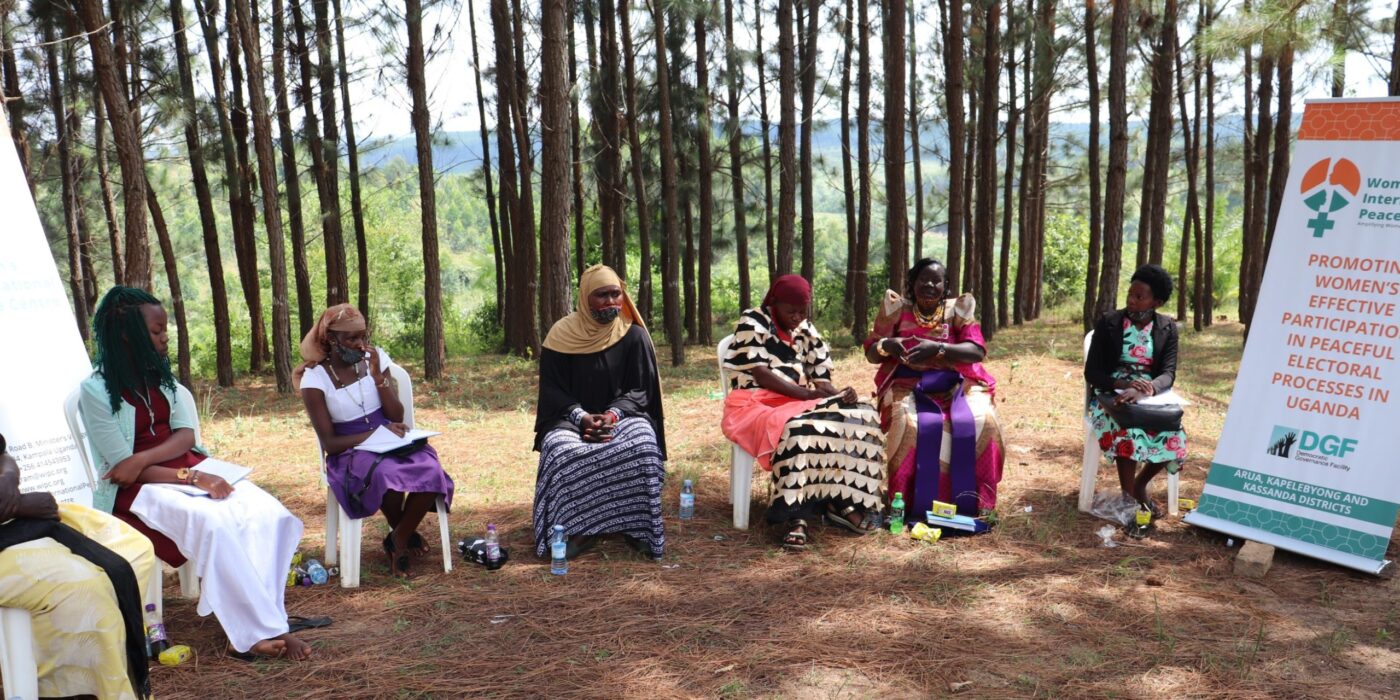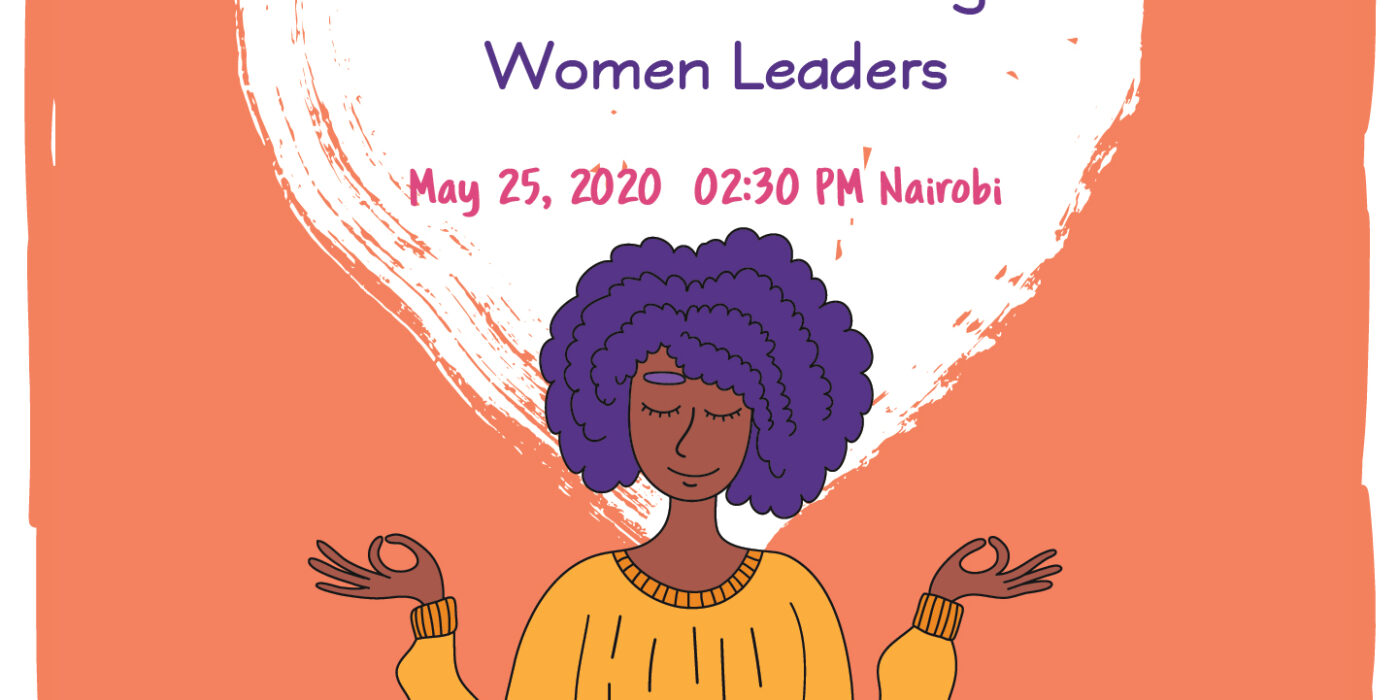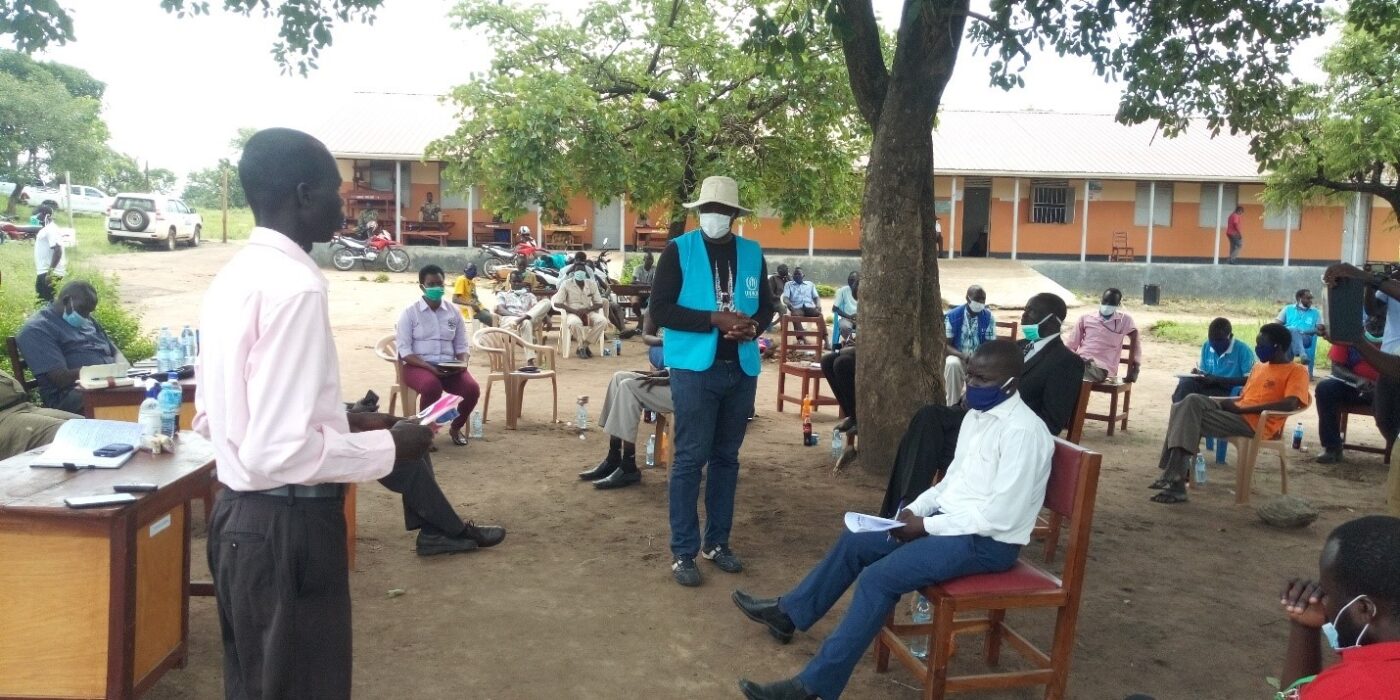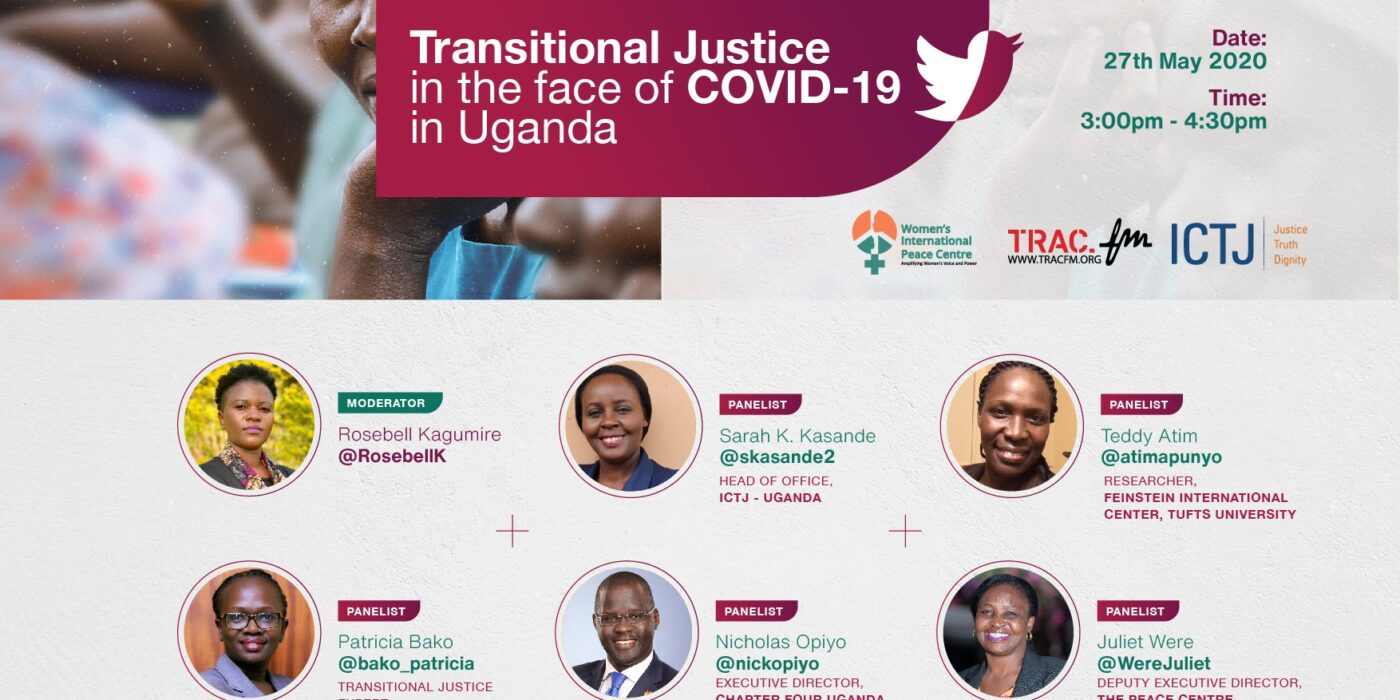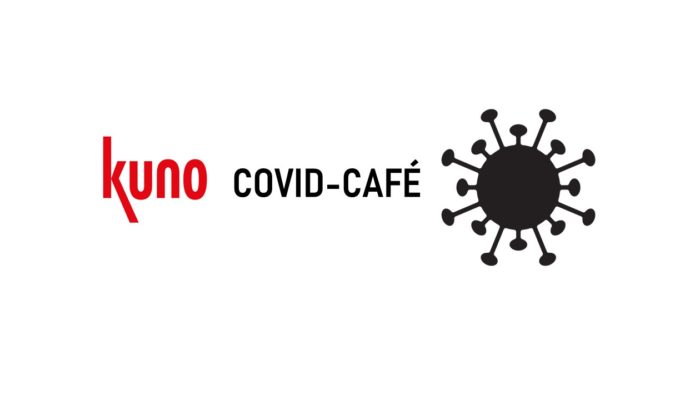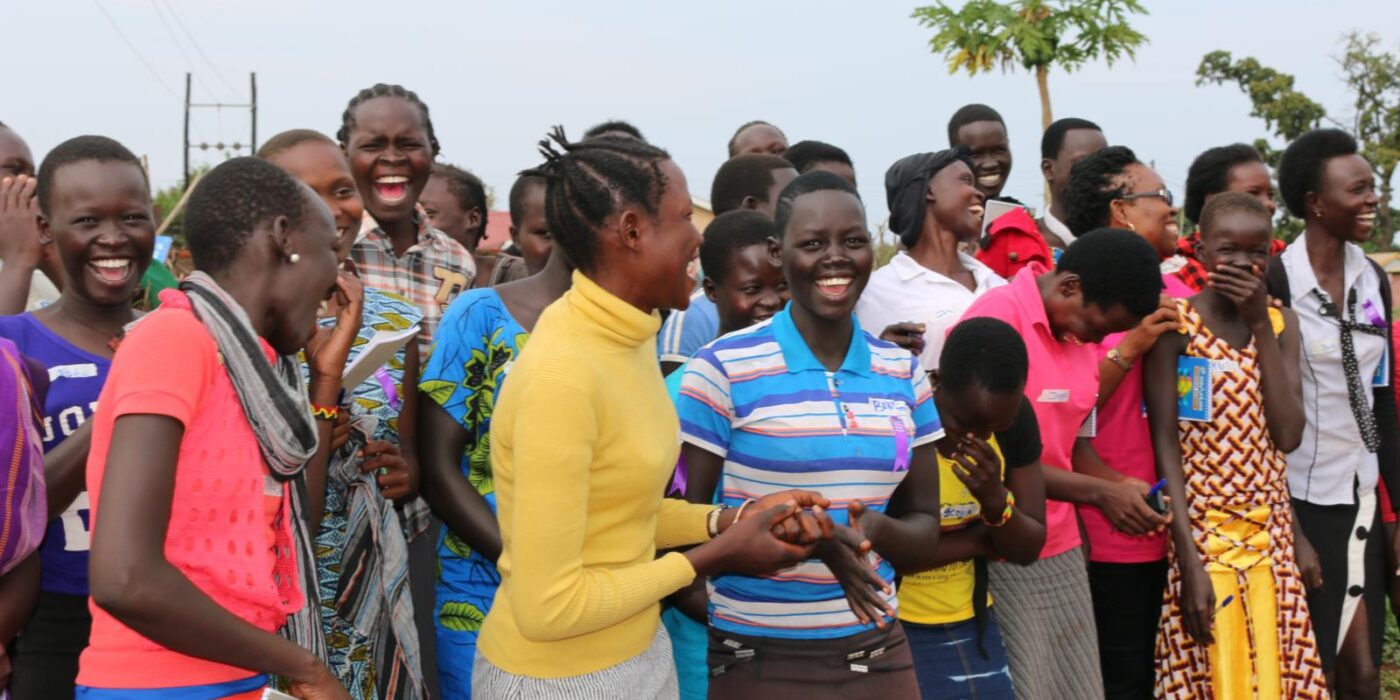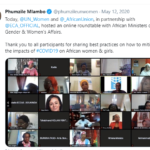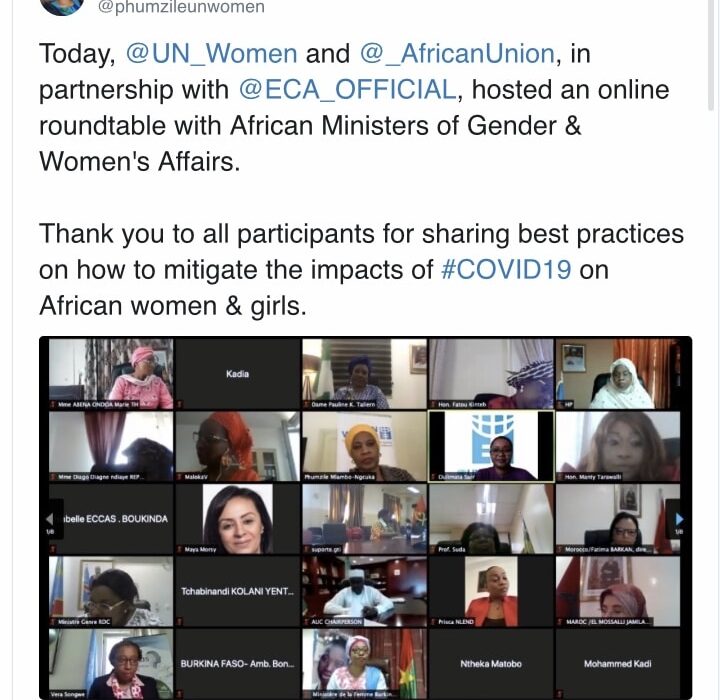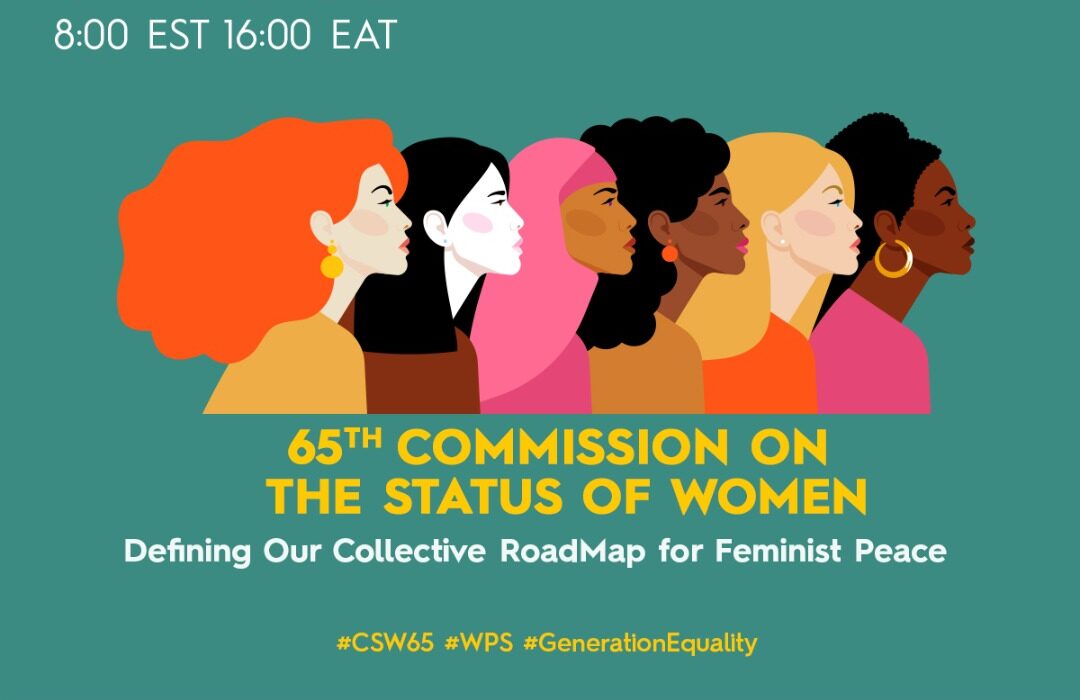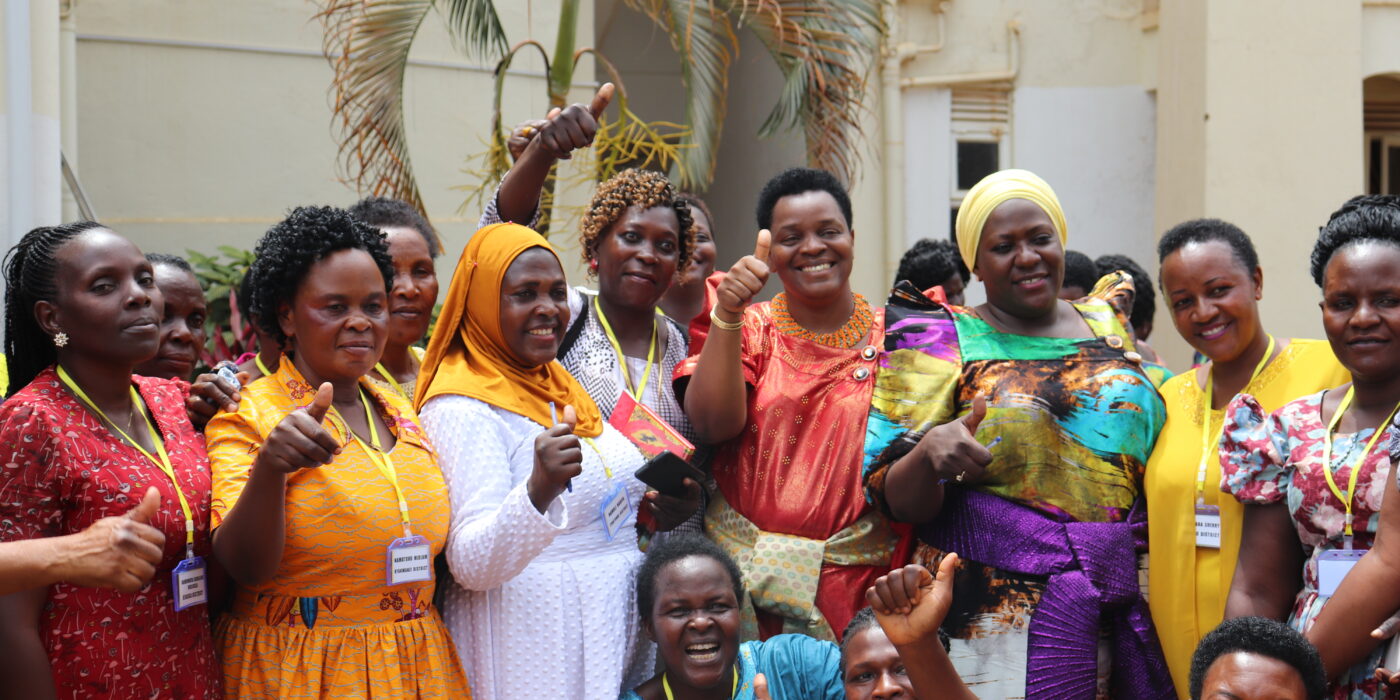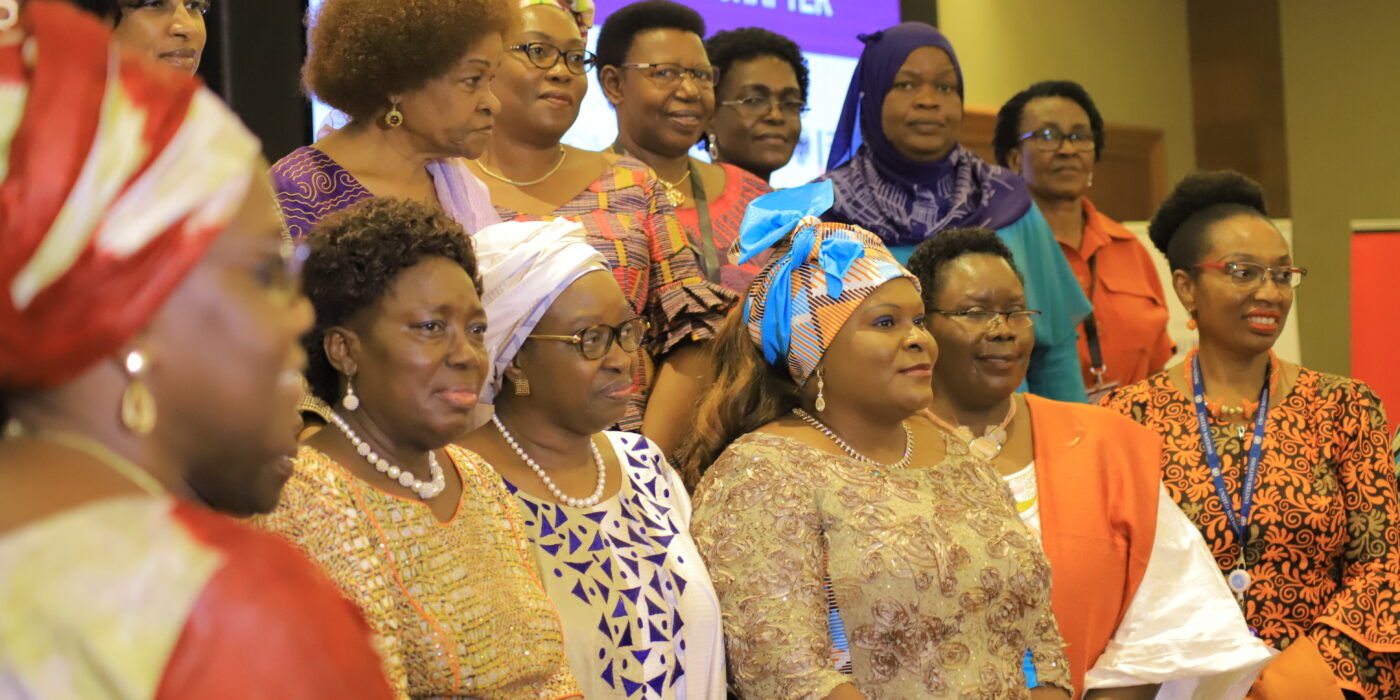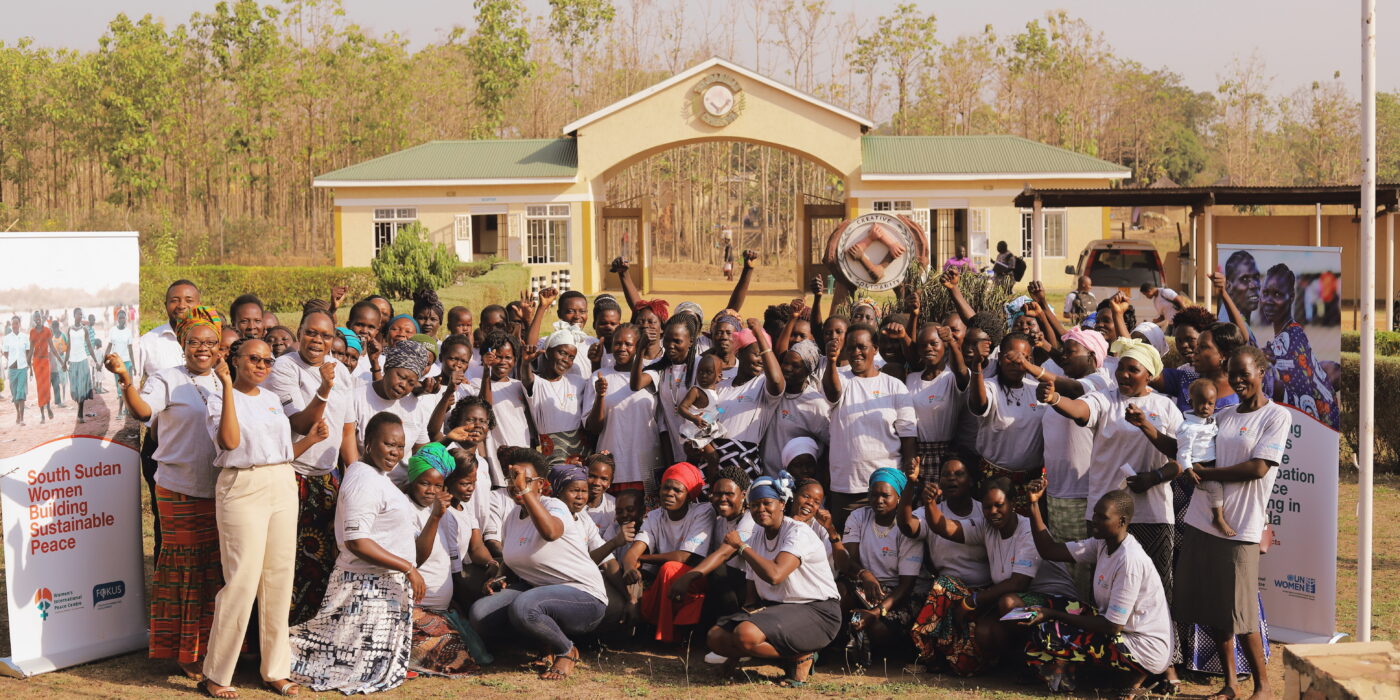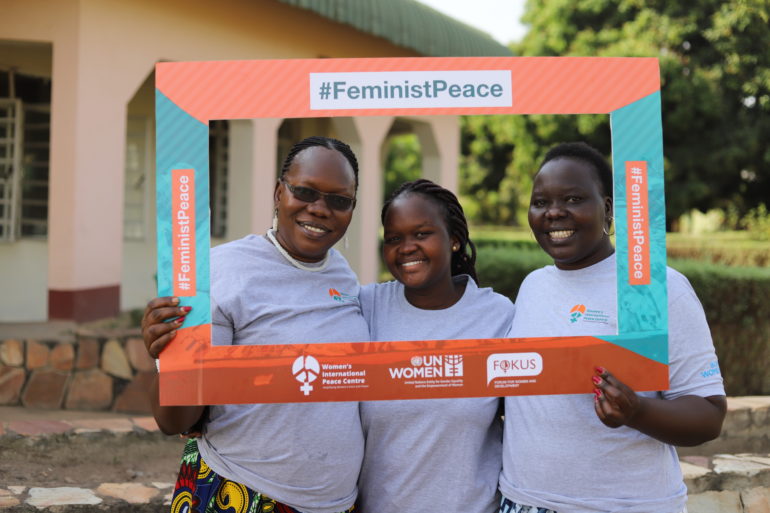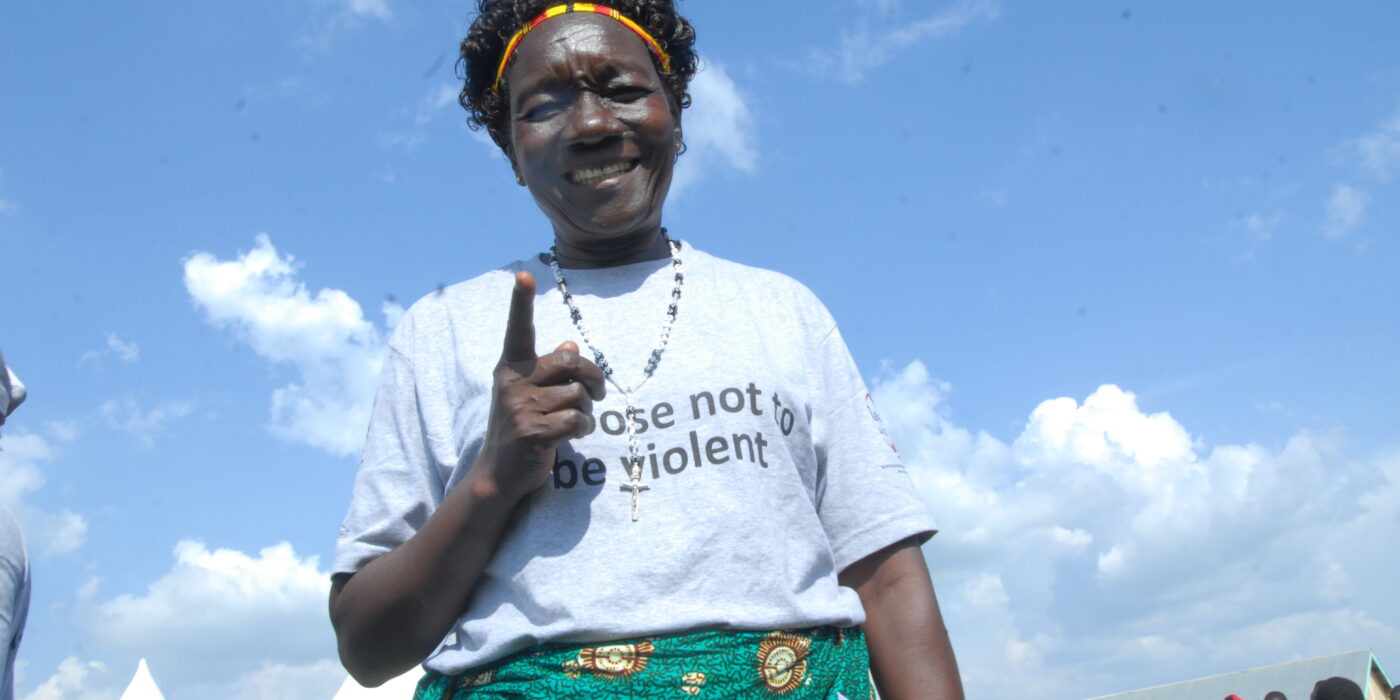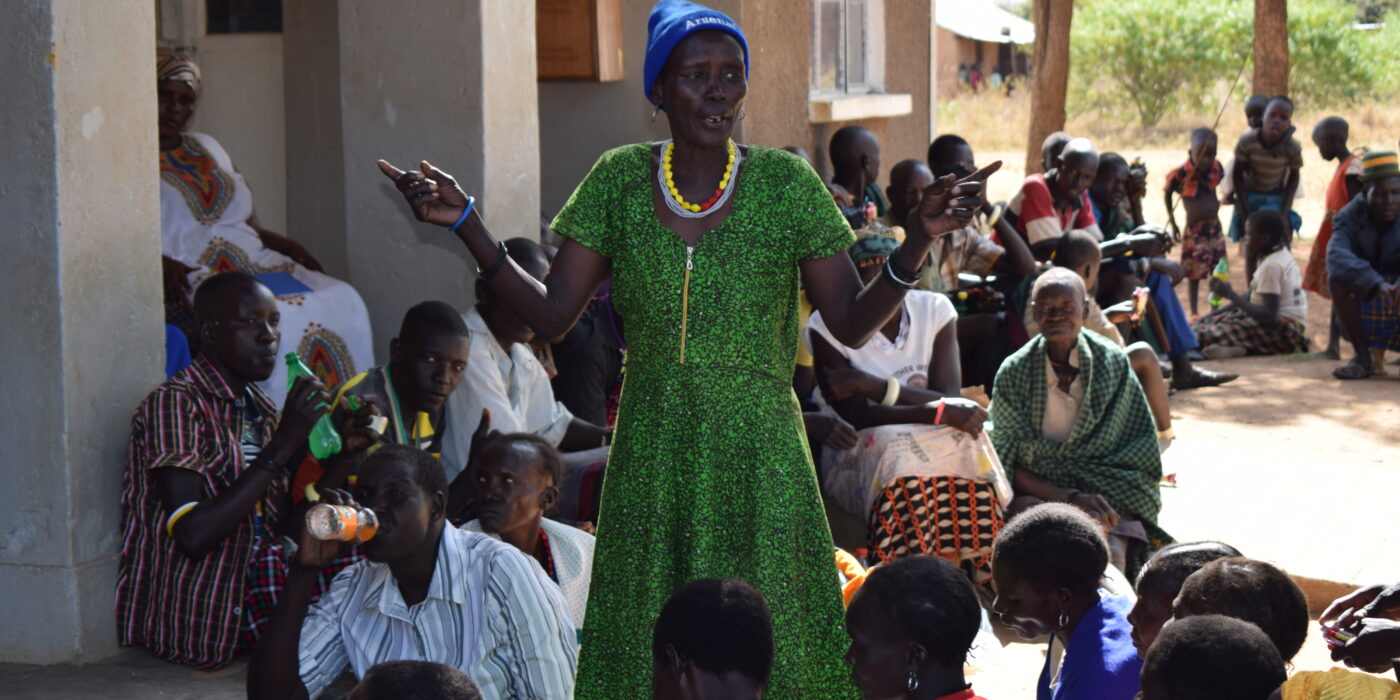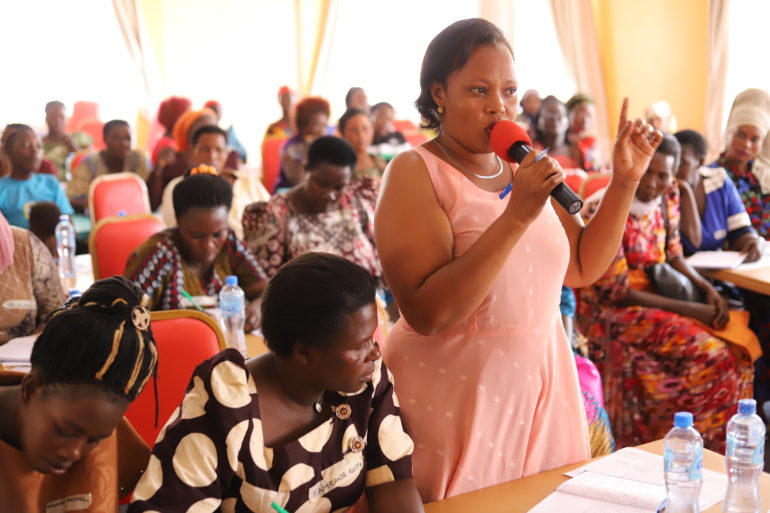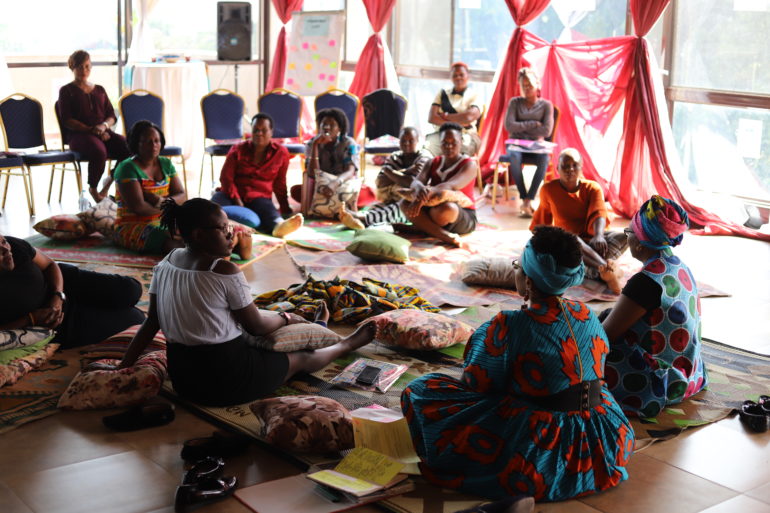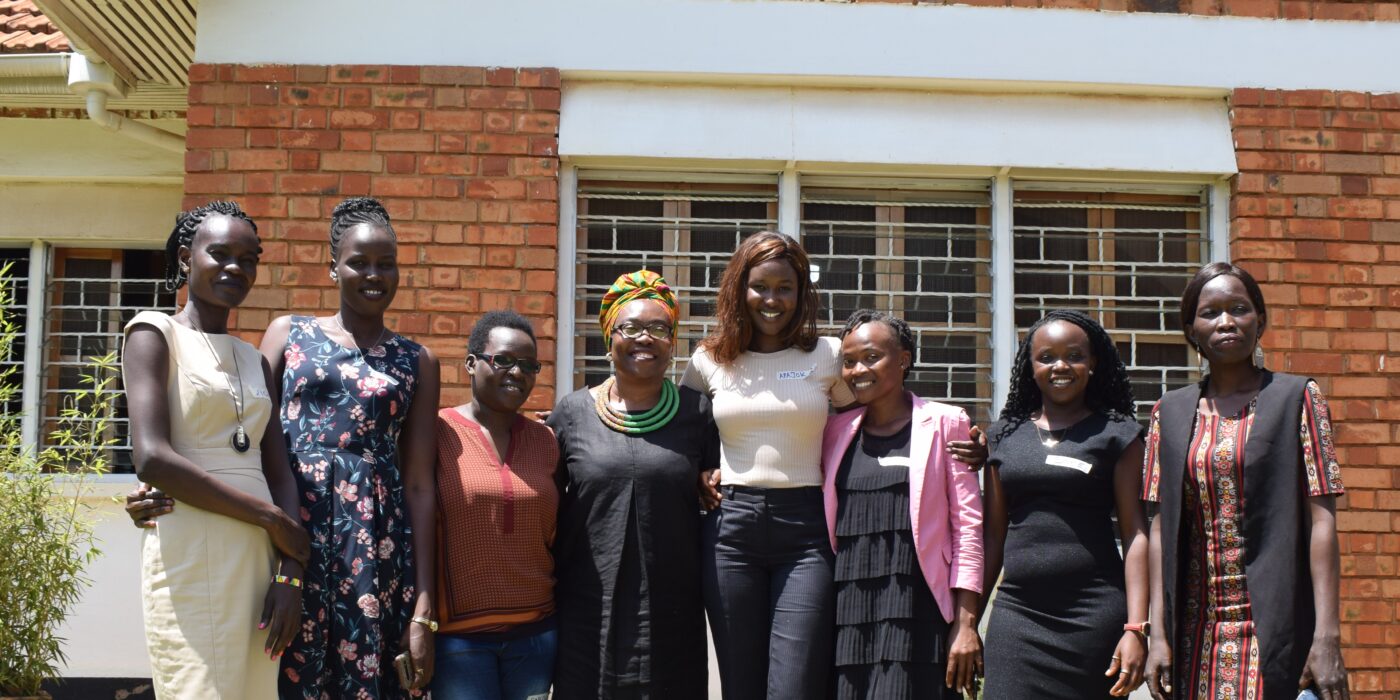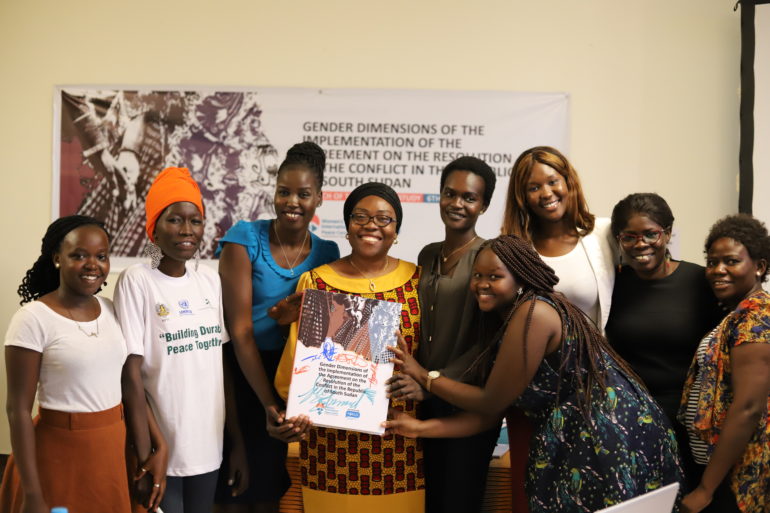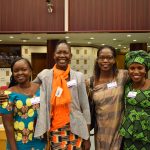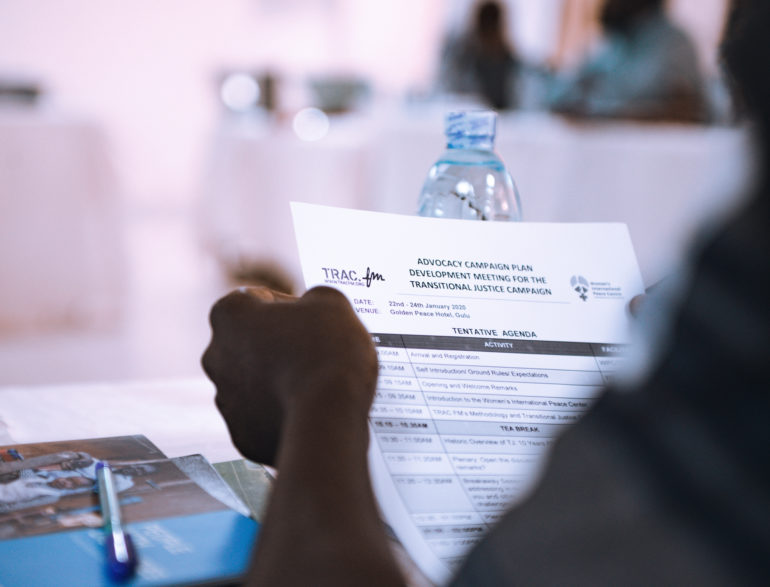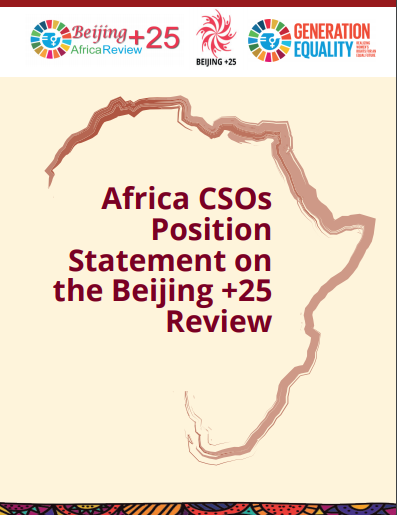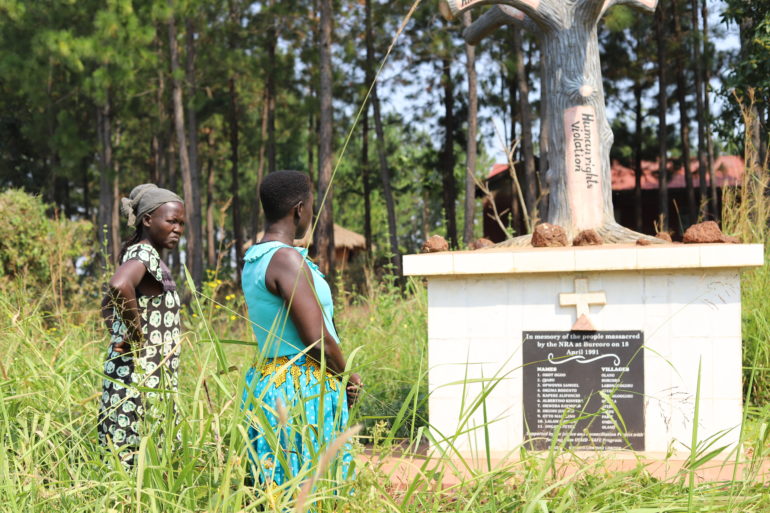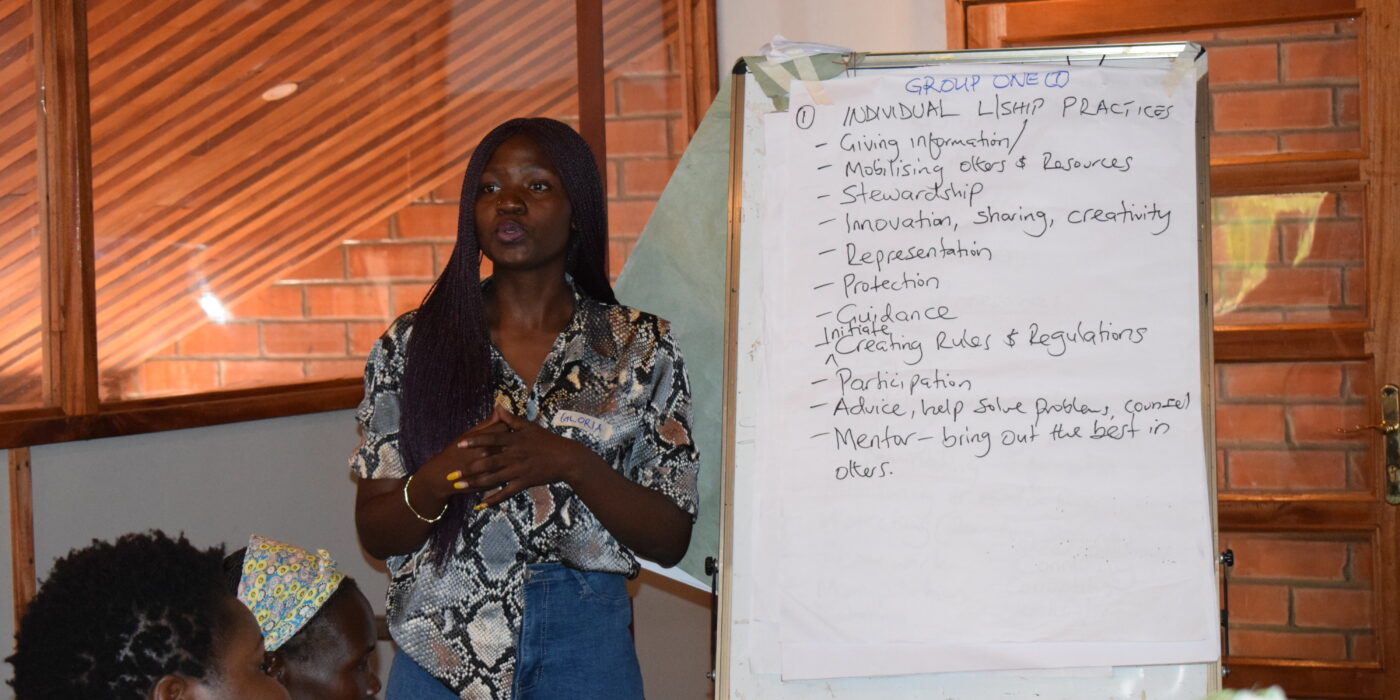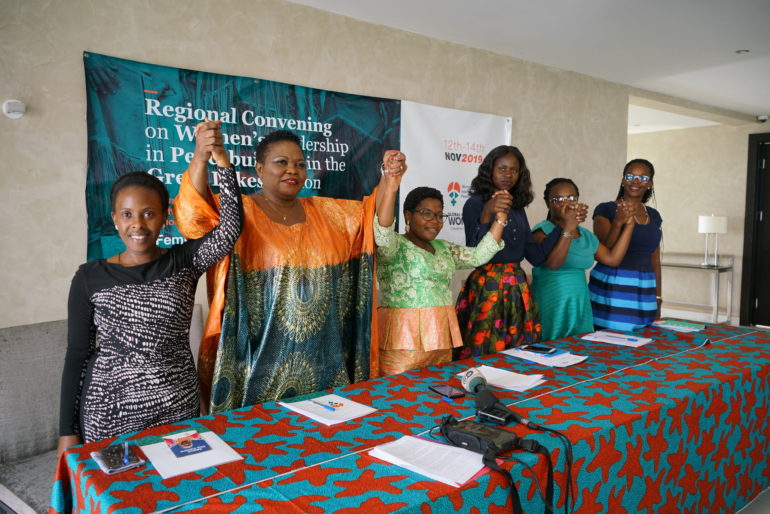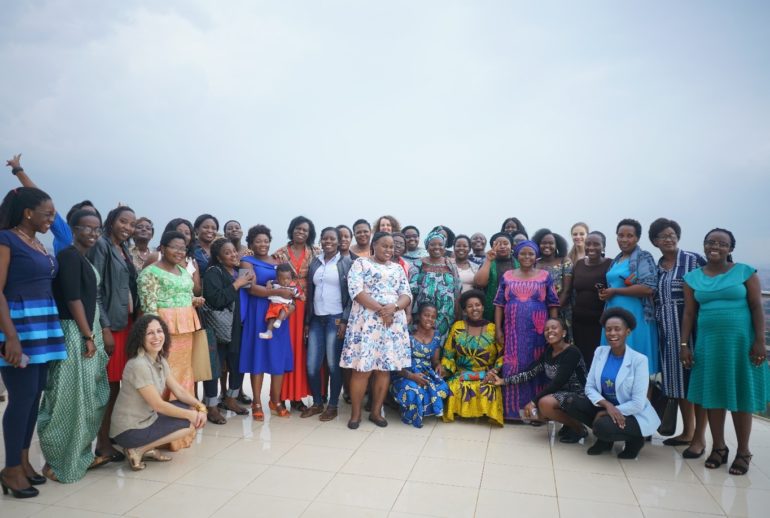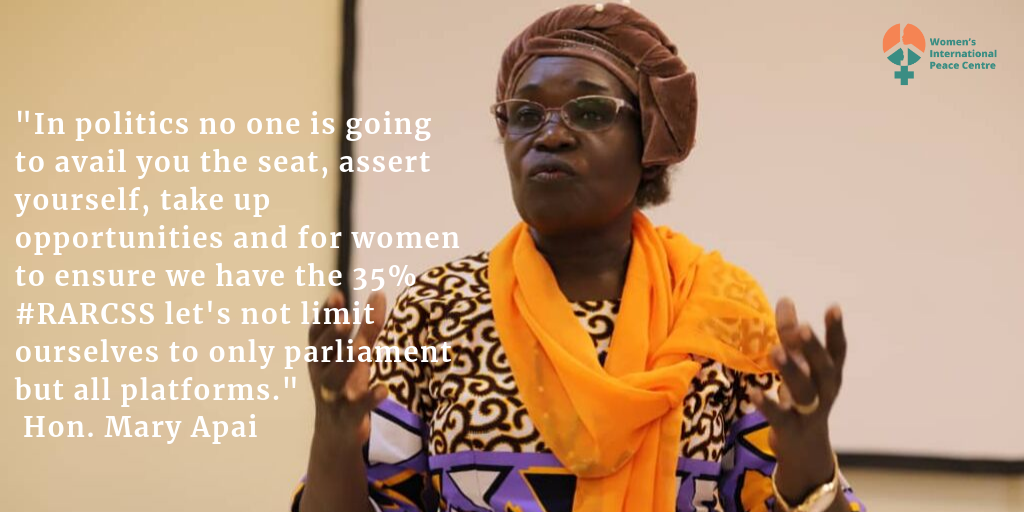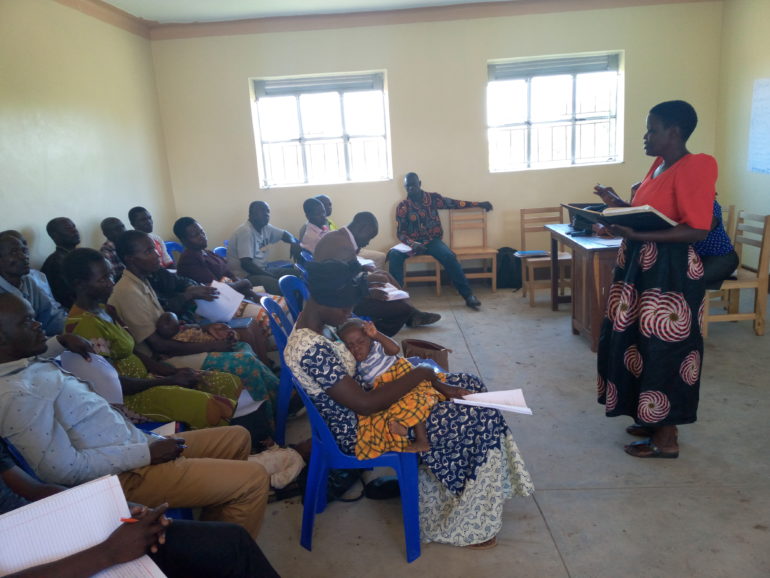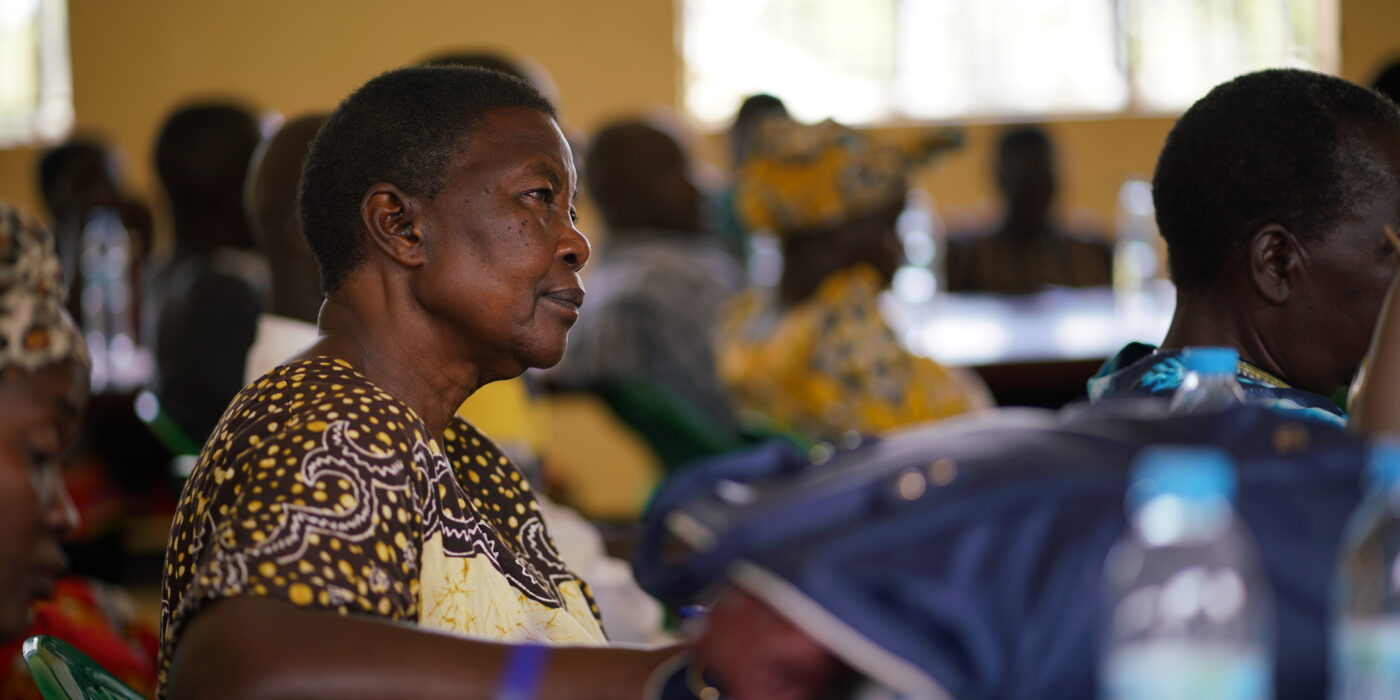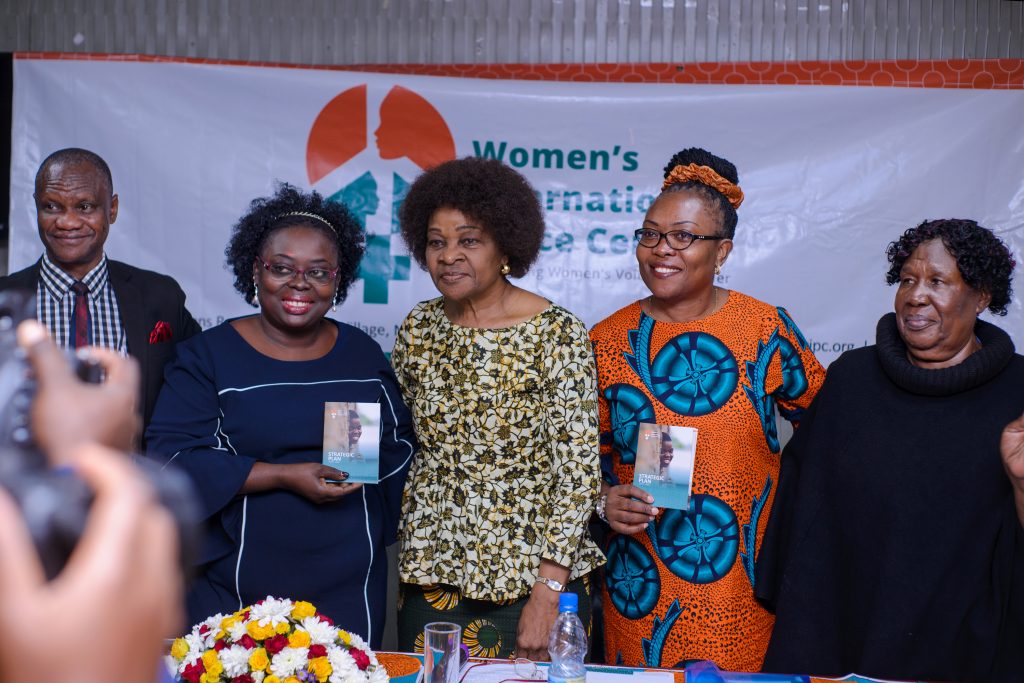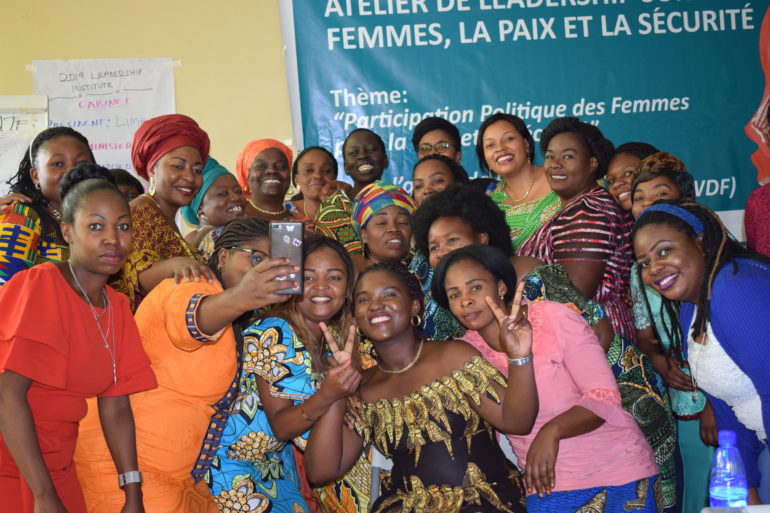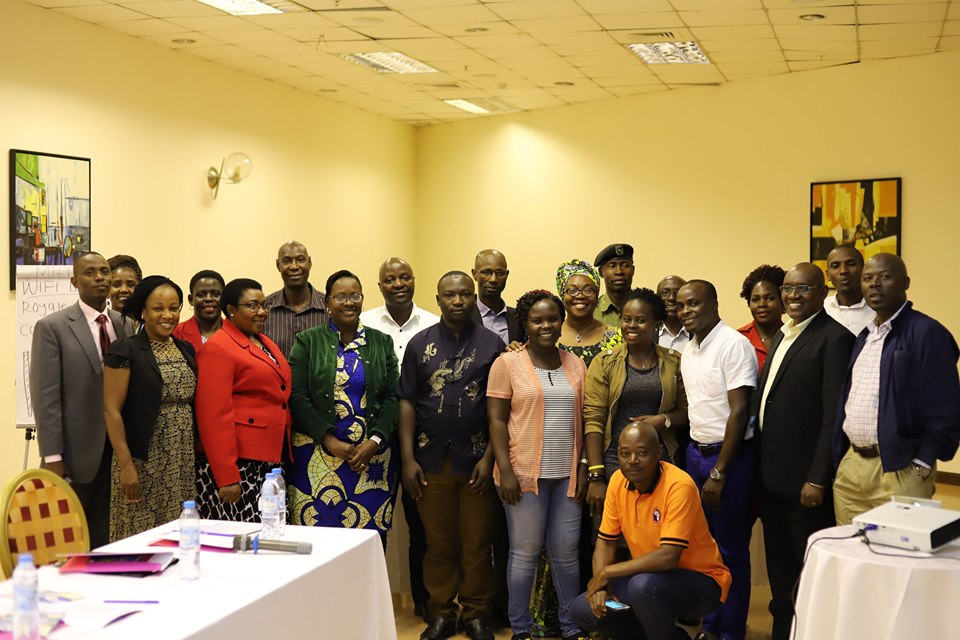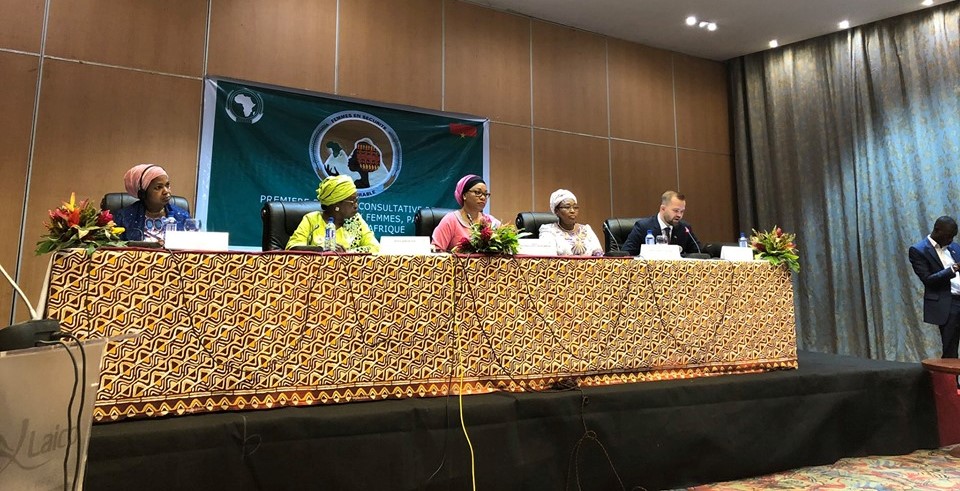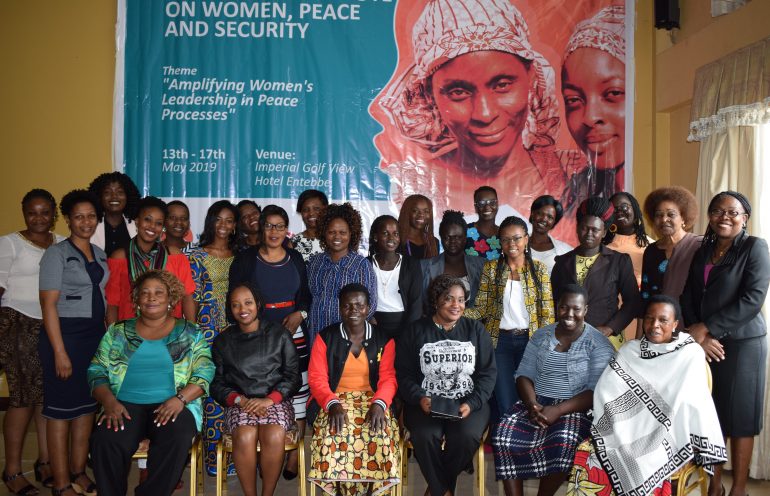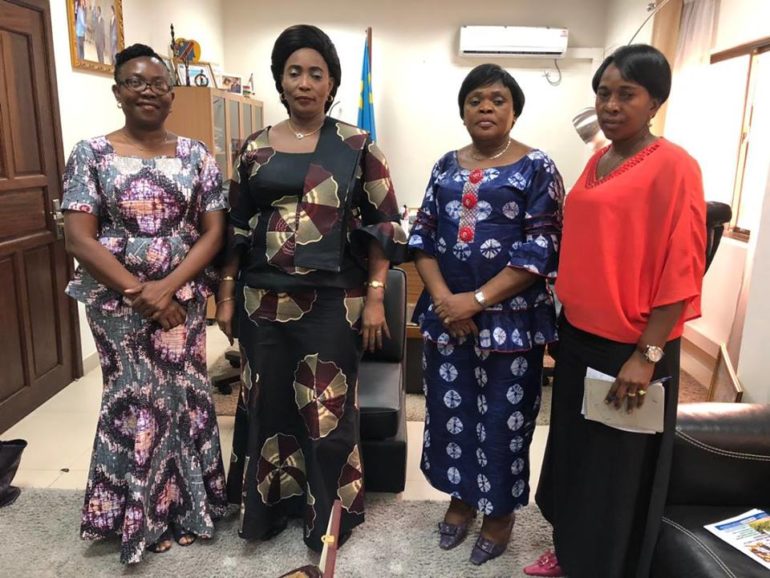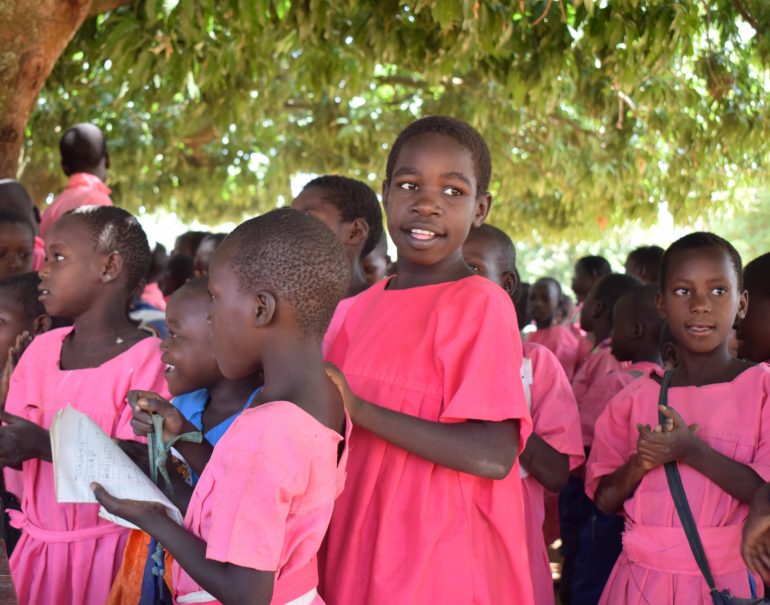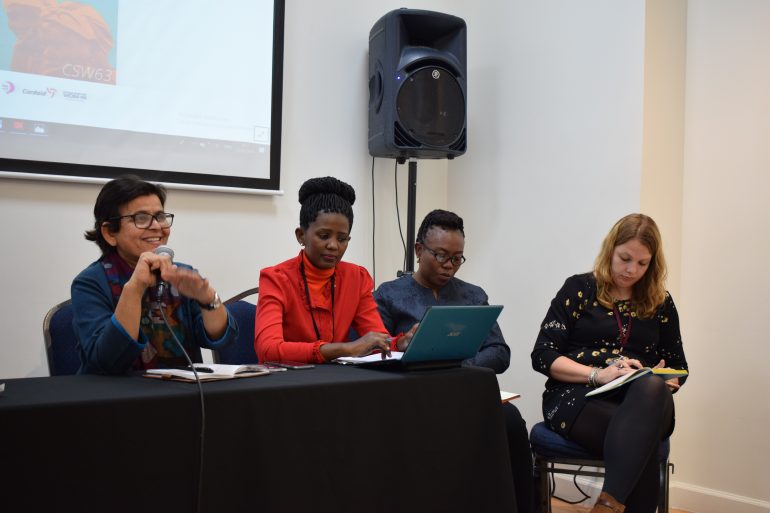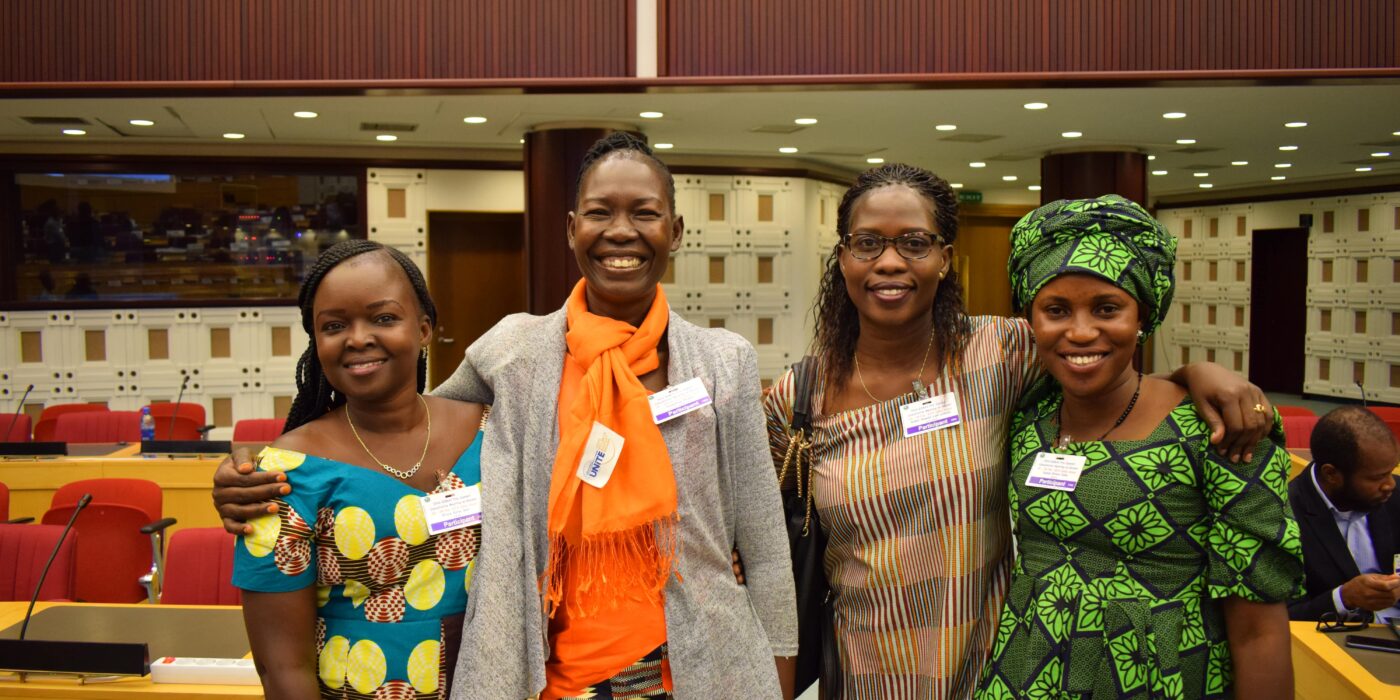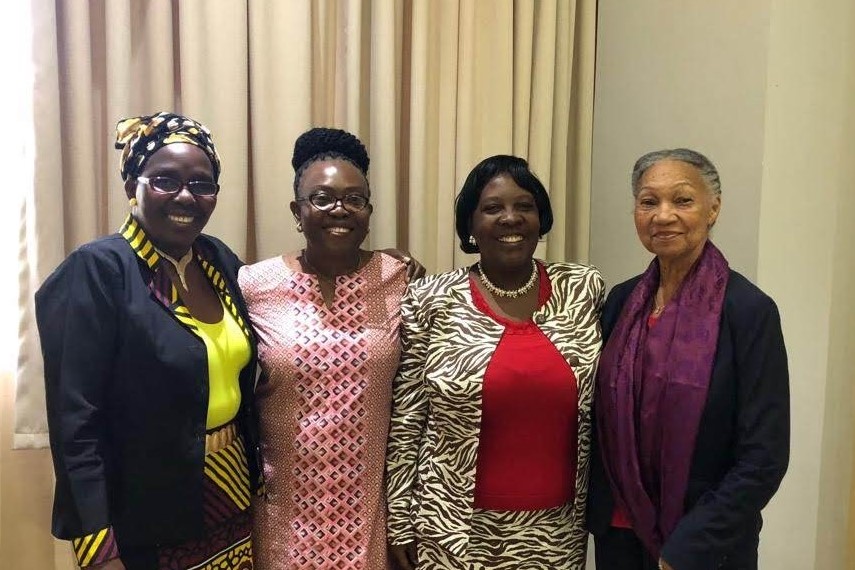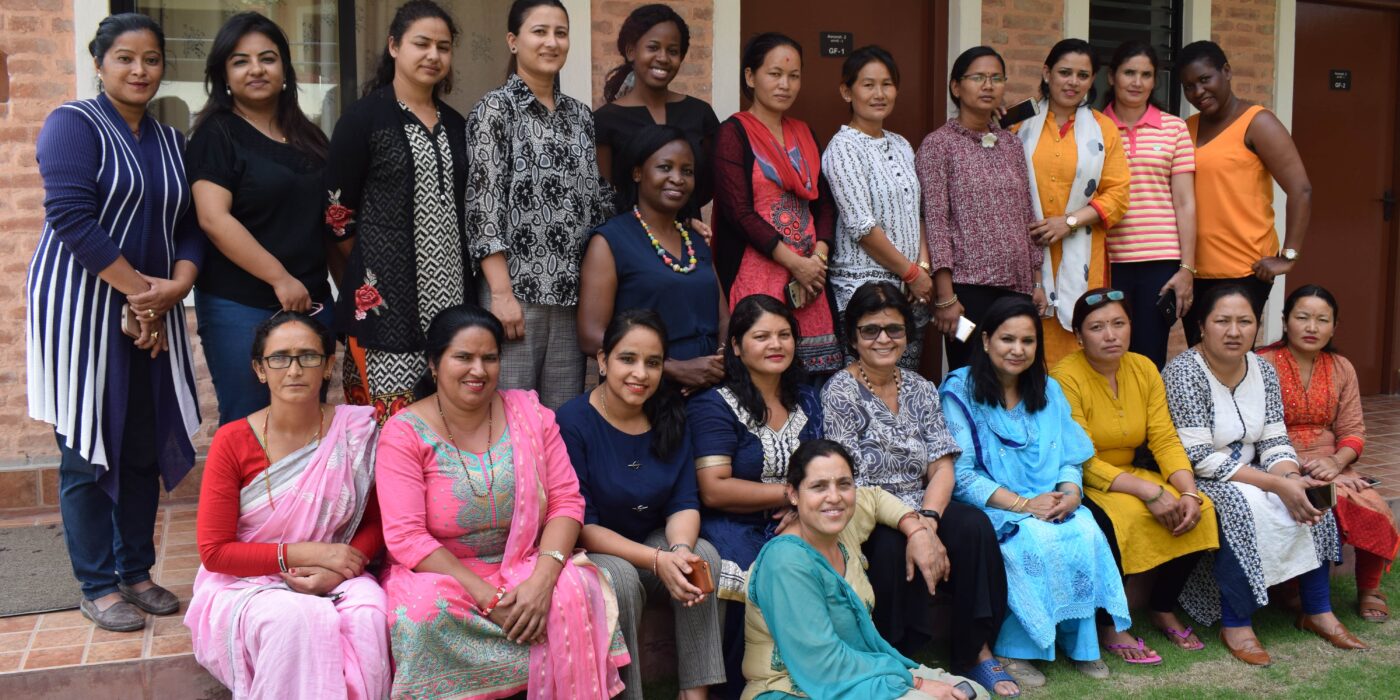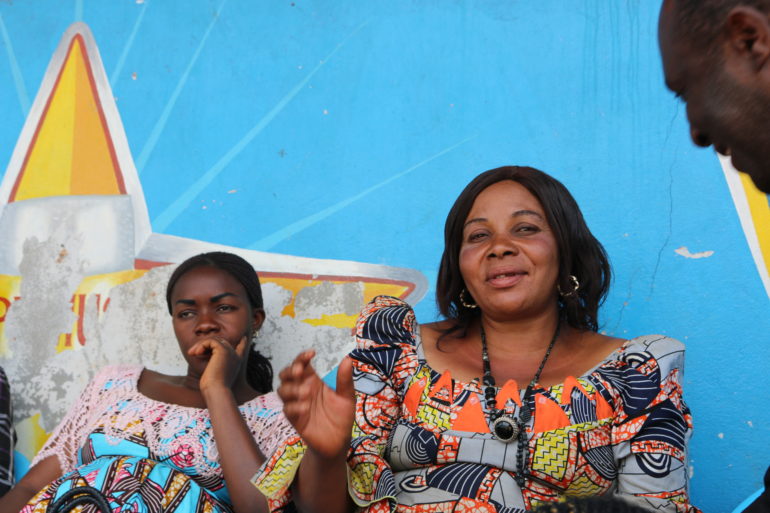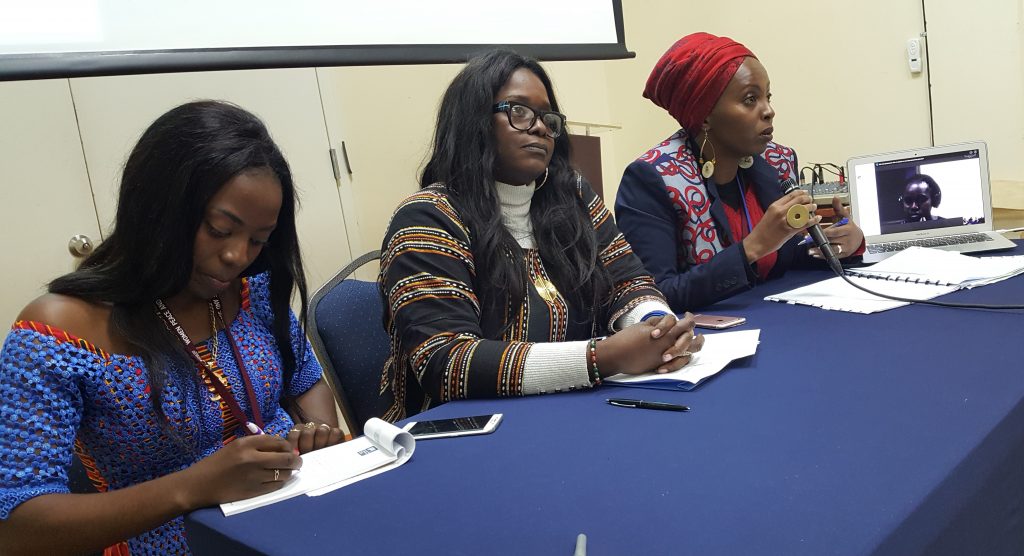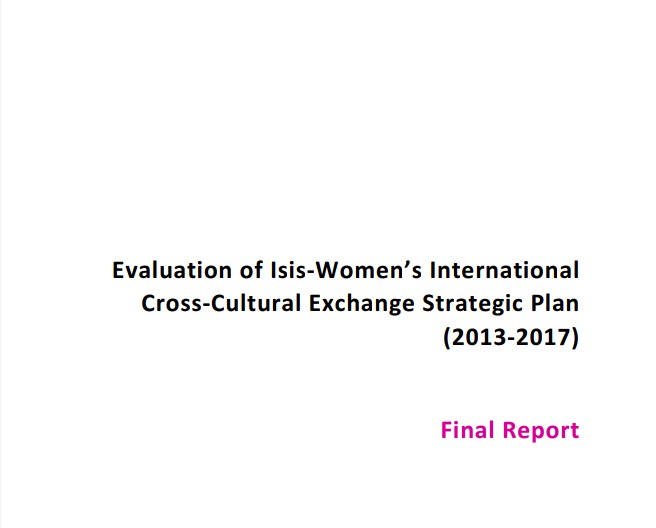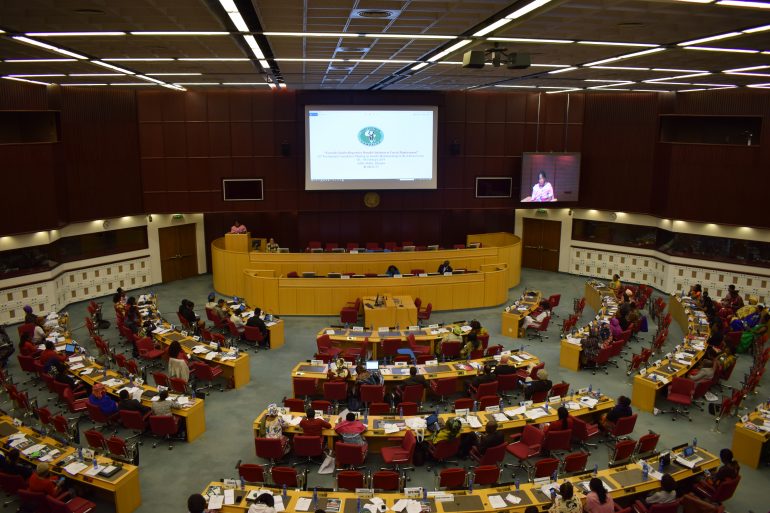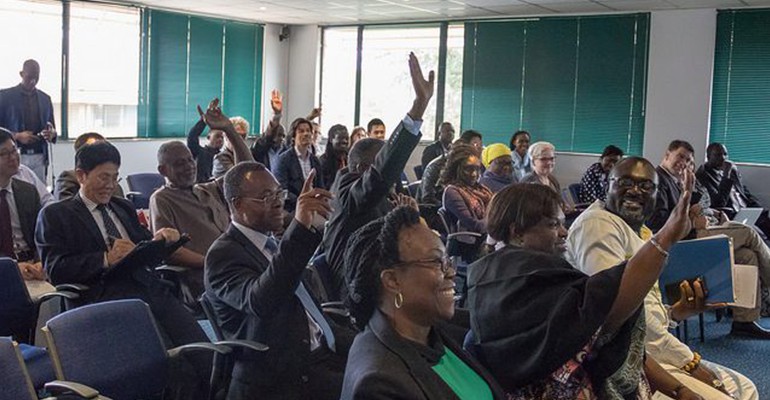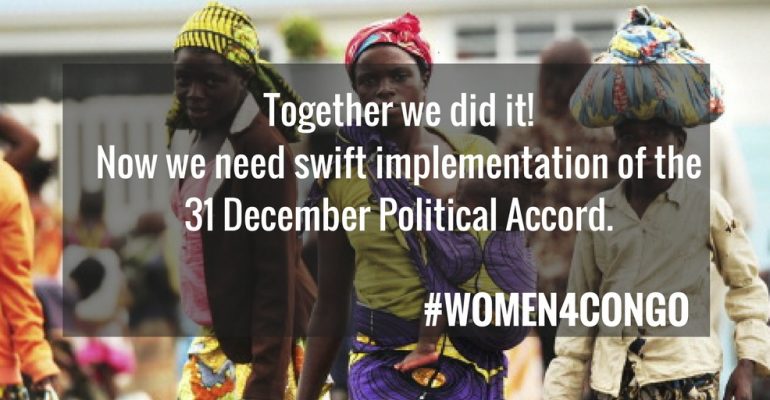Celebration As Kotido District Launches Its Local Action Plan on Women, Peace and Security.
In commemoration of International Women’s Day, celebrated annually on March 8, Kotido District launched its Local Action Plan on Women, Peace and Security on 28 March 2024. The much anticipated day of celebration commenced with a parade match with different members of the local community amounting up to 1500 people, 70% of which were women eagerly matching around the town
Women Leaders Convening to Strategise Inclusion of 35% Quota in Political Party Constitutions and Regulations in South Sudan
During the Women’s Month of MARCH, South Sudanese, women leaders of political parties, civil society coalitions and media houses convened to dialogue on enshrining 35% Quota in the political party constitutions and regulations of their leadership statutes.
The two day meeting took place between the 27th and 28th March 2024, in Juba, the capital of South Sudan.
As a country South Sudan is preparing to hold its first elections since 2011, which are scheduled to be held in December 2024, it enacted the Nation Elections Act 2023 that allocated 35% representation to women.
There have been widespread speculations and doubt as to whether or not South Sudan will be able to hold free and fair elections. Alongside the sceptics, there is enthusiasm for sustainable peace.
One of the meeting objectives was to develop a robust advocacy document for 35% women's inclusion in party manifestos, ensuring sustainable peace and; inclusive governance raising important points such as resource mobilization is essential for women’s success in electoral processes and from grassroots
fundraising to government support.
Sessions included brainstorming innovative strategies to ensure financial backing for women candidates to compete effectively.
Now I pose these questions to you?
How can we strengthen coordination among women in leadership positions?
Form alliances to advance women's interests
Stand in solidarity & support one another
Offer mentorship to women leaders
Develop inclusive programs for women at all levels.
Unite for national agendas
Civil Society Organizations Trained to Develop Shadow Report on DRC’s Adherence to UPR Recommendations
As the DRC prepares to report on its third phase of the Universal Periodic Review (UPR) process, The Peace Centre, in collaboration with Cordaid and the Civil Society Platform for Peacebuilding and Statebuilding (CSPPS), recently conducted training sessions for Civil Society Organizations (CSOs) across four provinces in the Democratic Republic of Congo (DRC). The objective was to collect date data and prepare a CSO shadow report on the country’s adherence to previous Universal Periodic Review (UPR) recommendations.
The training covered four key themes, focusing on issues such as civil space, human rights protection, peace processes, assistance to internally displaced persons, and mechanisms of transitional justice. Over the course of the three-day workshops in Kinshasa, Goma, Bunia, and Bukavu, representatives from at least thirty organizations engaged in discussions and data collection related to these topics.
Through consultations and online sessions, the collected data was further analyzed and enriched by experts. An Adhoc Committee comprising five experts was then tasked with compiling the data into a comprehensive report to be submitted to the United Nations Council for Human Rights.
Find Report Here: UNIVERSAL PERIODIC REVIEW
Training Local Leaders on GBV Prevention and Response in Amuria District
In Amuria District, Uganda, we conducted two-day training on Gender-Based Violence Prevention and Response for 33 participants from 28th to 29th February.
Aimed at school teachers and local authorities, the training sought to equip participants with the knowledge and skills necessary to identify, prevent, and effectively respond to GBV cases within their communities and educational institutions
The training delved into understanding the various forms and impact of GBV, ranging from sexual harassment to corporal punishment and verbal abuse, which often plague the educational environment. Through interactive sessions and practical workshops, participants explored strategies for developing robust response mechanisms and policies, as well as fostering collaboration with parents and guardians to create safer and more inclusive spaces for children.
Attended by (25) schoolteachers, administrators, and a diverse array of local leaders, including government officials, religious and traditional leaders, health-care professionals, and community-based organizations’ representatives, the program served as a rallying point for collective action against GBV in Amuria District.
In a region where cultural norms, poverty, and a lack of awareness exacerbate the prevalence of GBV, initiatives like this training program are crucial steps towards safeguarding the rights and well-being of children. By aligning local policies with national and international standards on GBV prevention and response, Amuria District is forging a path towards a safer and more equitable future for its young generation.
Empowering Girls: Girls’ Power Camp in Amuria District, Uganda
The Peace Centre hosted a Girls’ Power Camp at Orungo Primary School in Amuria district, with over 300 girls aged 9-13 from 26th to 27th February. Over the course of several days, the camp provided a transformative experience for girls between primary 1 and primary 7, focusing on empowering them with knowledge, skills, and support.
The camp included sessions on essential topics such as menstrual hygiene, mental health, and puberty, aiming to enhance awareness and understanding among the girls. Through interactive activities and discussions, they learned about their bodies and minds, gaining confidence to make informed decisions about their health and well-being.
A highlight of the camp was the emphasis on decision-making and life skills. Through scenario building and group exercises, the girls explored different choices and their potential outcomes, equipping them with valuable skills for navigating life’s challenges.
Another empowering aspect was the creation of personal action plans. Guided by mentors and peers, the girls set goals and outlined steps to achieve them, fostering a sense of purpose and agency among the participants.
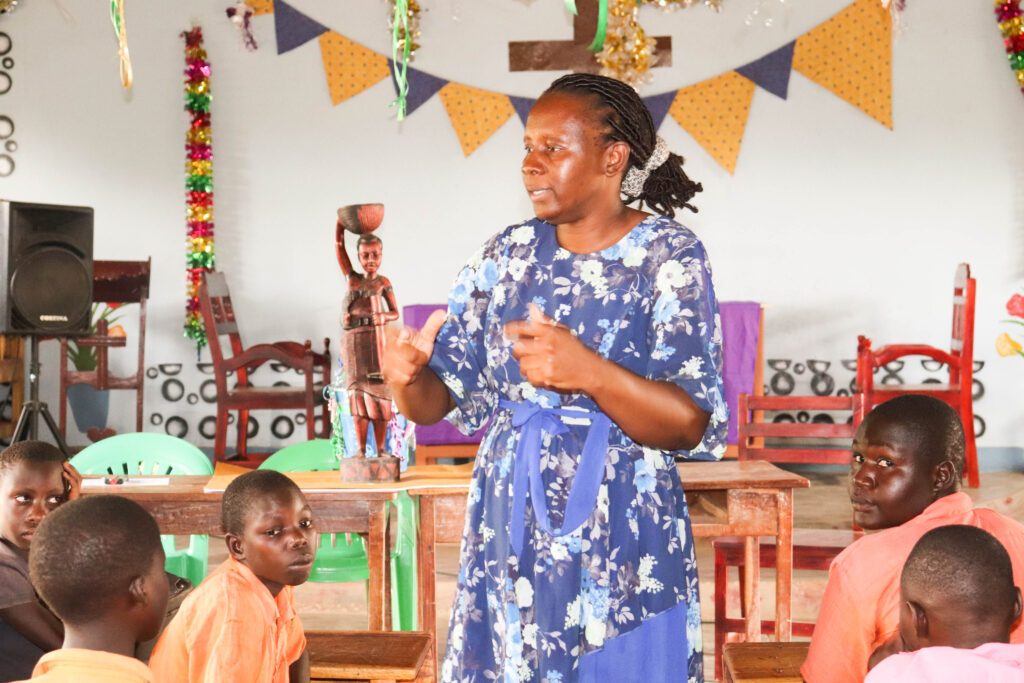
The camp also addressed the girls’ sexual and reproductive health and rights (SRHR) needs, emphasizing the importance of community support. Discussions highlighted the role of parents, teachers, and community leaders in providing guidance, support, and advocacy for girls’ rights and well-being.
As part of our commitment to girls’ empowerment, the Peace Centre distributed exercise books and pens and other scholastic materials to the girls at the end of the camp, contributing to their educational journey and basic needs.
Overall, the Girls Power Camp in Amuria proved to be a powerful catalyst for positive change, empowering young girls with the knowledge, skills, and support they need to thrive.
Moroto District Stakeholders Validate Local Action Plan on Women, Peace and Security
The validation meeting, held on January 25th, 2024, brought together a diverse array of stakeholders to critically review and refine the LAP, marking a pivotal moment in the district’s journey towards sustainable peace and prosperity.
Attended by religious leaders, cultural representatives, civil society organizations, and key government officials, the validation meeting aimed to incorporate feedback from a broad spectrum of voices, ensuring that the LAP accurately reflected the aspirations and priorities of the Moroto community.
Central to the validation process was the refinement of the LAP’s goal and strategic objectives, which were tailored to address the specific challenges faced by women, youth, and vulnerable populations in Moroto District. The LAP’s strategic objectives were meticulously defined, emphasizing the district’s commitment to reducing livestock theft, cases of gender-based violence (GBV), conflict over natural resources, and enhancing food security at the household level by 2029.
Furthermore, stakeholders proposed strategic interventions aimed at strengthening peace initiatives, GBV systems, resource conflict prevention, and early warning mechanisms. These interventions were carefully crafted to align with the district’s priorities and resources, ensuring their feasibility and effectiveness in addressing key challenges.
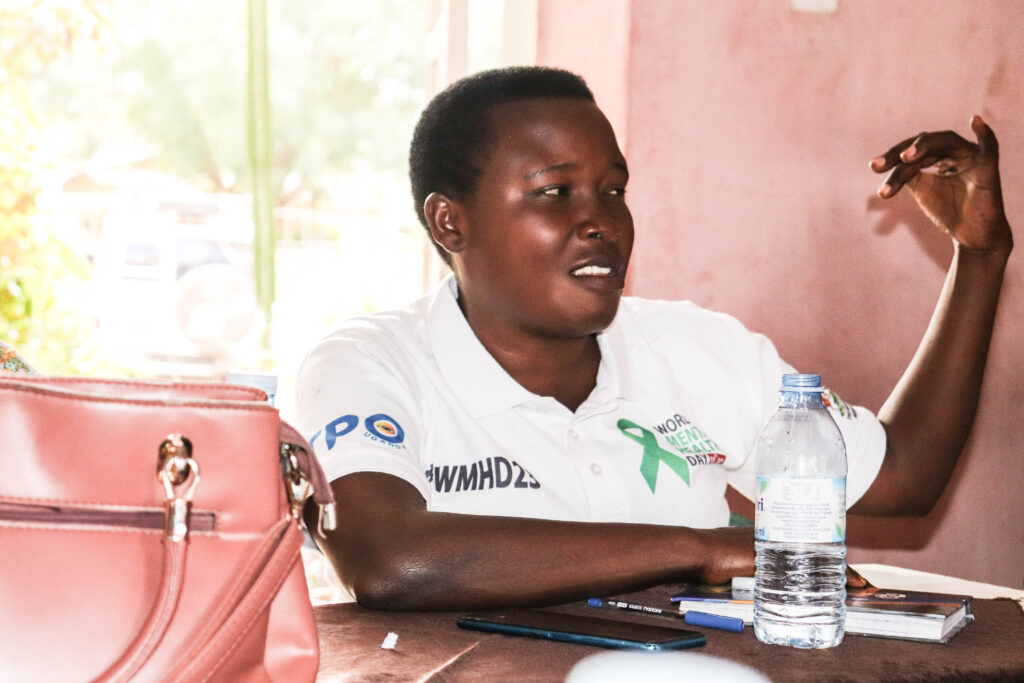
The validation meeting also provided an opportunity for stakeholders to make valuable recommendations for enhancing the LAP’s impact and implementation. From mainstreaming messages on the dangers of livestock theft to advocating for compulsory formal education for all children, stakeholders underscored the importance of holistic approaches to peacebuilding and community development.
Looking ahead, the validated LAP will undergo further review by the District Technical Planning Committee (DTPC) and the District Executive Committee (DEC) before being presented to the District Council for final approval. Once adopted, the LAP will serve as a guiding framework for promoting gender equality, peace, and sustainable development in Moroto District.
Stakeholders Validate Napak District’s Local Action Plan on Women, Peace, and Security
Napak District on 19th January 2024, conducted a validation meeting to review and refine its Local Action Plan (LAP) on Women, Peace, and Security. The meeting saw active participation from a diverse array of stakeholders, underscoring the community’s collective commitment to promoting gender equality and sustainable development.
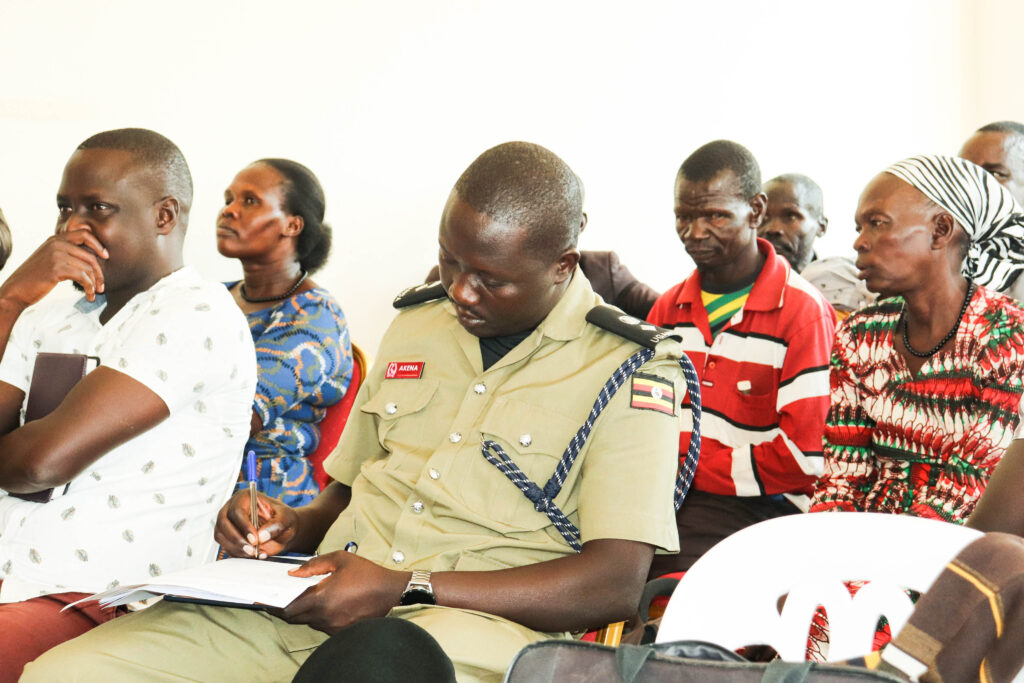
The validation meeting, attended by 35 participants, aimed to critically assess the initial draft of the LAP, ensuring that it accurately reflected the needs and aspirations of the Napak community. Participants in the meeting, included religious leaders, cultural representatives, civil society organizations, and women’s rights advocates, who facilitated a comprehensive review process that incorporated a wide range of perspectives and insights.
Throughout the session, participants meticulously examined the LAP document, scrutinizing each element to ensure clarity, accuracy, and relevance. From refining the LAP’s vision, mission, and goal to fine-tuning strategic objectives and interventions, stakeholders actively engaged in shaping a robust and actionable plan for advancing women’s empowerment and peacebuilding initiatives in Napak District.
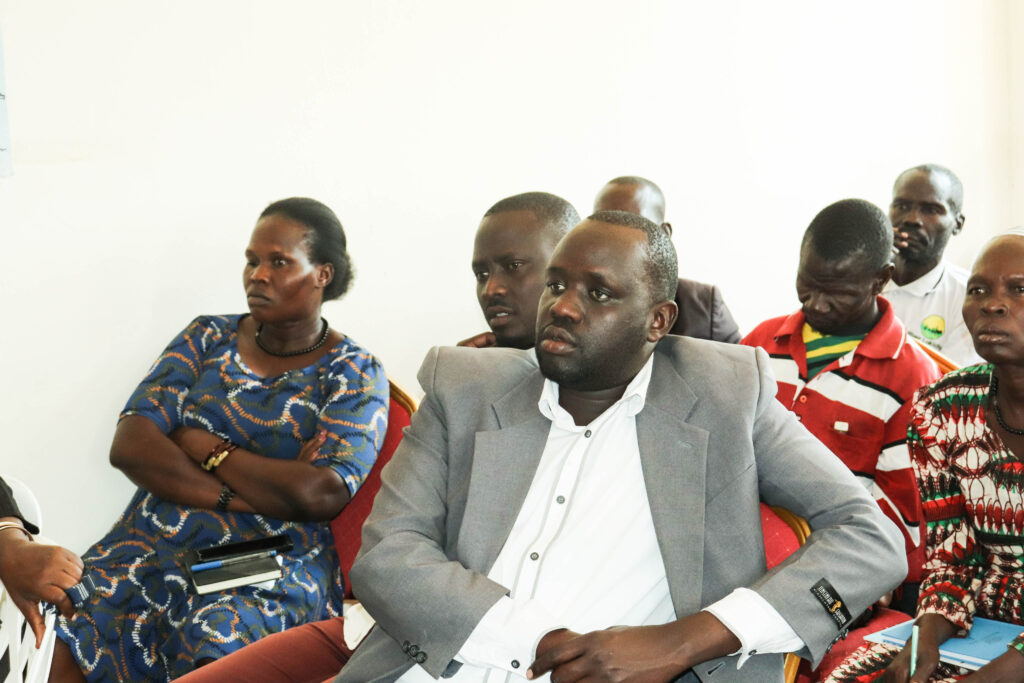
Modifications were made to various sections of the LAP, including strategic objectives and interventions, reflecting stakeholders’ commitment to crafting a comprehensive and effective action plan. Key revisions included setting more realistic targets, refining strategic interventions, and aligning activities with the district’s priorities and resources.
The validation meeting also provided a platform for stakeholders to share valuable insights and recommendations for enhancing the LAP’s efficacy and impact. From emphasizing the importance of traditional leadership structures in promoting peace to highlighting the interconnectedness of food security and gender-based violence, participants offered invaluable perspectives that will inform the LAP’s implementation and monitoring framework.
Following rigorous deliberations and amendments, the validated LAP document was endorsed for presentation to the District Technical Planning Committee and subsequently forwarded to the District Executive Committee for further review. The culmination of these efforts will see the formal approval and adoption of the Napak LAP, marking a significant milestone in the district’s journey towards creating a peaceful, inclusive, and prosperous community.
Napak District Advances Women, Peace, and Security Agenda Through Developing Local Action Plan
In January, 2024, Napak District in Uganda embarked on a transformative journey towards advancing the Women, Peace, and Security (WPS) agenda through the localization and drafting of a Local Action Plan (LAP). Spearheaded by key district stakeholders, this initiative aimed to amplify awareness, foster collaboration, and drive meaningful change within the community.
Moroto District Strengthens Commitment to Women, Peace, and Security with Local Action Plan
From December 18th to 19th, 2023, key district stakeholders of Moroto district underwent intensive training sessions aimed at enhancing their understanding of the Women, Peace, and Security (WPS) Agenda and the Uganda National Action Plan III.
The training sessions served as a catalyst for increasing awareness and building capacity in the development and implementation of a Local Action Plans (LAP) tailored to the district’s unique context. Through interactive workshops and discussions, participants, including representatives from various sectors such as community development, law enforcement, governance, and civil society, gained valuable insights and skills to spearhead the localization process.
Following the training, a dedicated district task force was established to drive the development and implementation of the Moroto LAP . Comprising esteemed members such as the District Community Development Officer, District Police Commander, Senior Community Development Officer, and Religious and Cultural Leaders, the task force was entrusted with the crucial responsibility of translating aspirations into concrete actions.
From December 20th to 22nd, 2023, the district technical task force underwent a 3-day drafting workshop where they were trained on developing the LAP. Guided by the district’s vision for peace and prosperity, task force members diligently delineated the LAP’s goal, defined strategic objectives, and outlined targeted interventions to address pressing issues affecting women, peace, and security in the region.
The drafting process saw task force members immerse themselves in deep discussions, carefully scrutinizing each section of the LAP to ensure alignment with the district’s priorities and aspirations. Through collaborative efforts and shared expertise, the task force developed a comprehensive LAP that encapsulated the collective vision and aspirations of Moroto District.
As the drafting process concluded, the task force members shared progress on the draft LAP, outlined action plans, and delineated next steps for implementation. Their dedication and commitment underscored Moroto District’s unwavering resolve to promote gender equality, peace, and inclusive development.
The localization and drafting process of the Moroto Local Action Plan signify a significant milestone in the district’s journey towards creating a safer, more inclusive, and prosperous community.
Empowering Communities: Transitional Justice Training in Dokolo District
In December 2023, we conducted a transitional justice training in Dokolo District, Uganda. The two-day training session, held at the Dokolo Tourist Hotel, aimed to fortify women’s participation in transitional justice processes, a crucial step towards nurturing a culture of peace and tolerance in the region.
The training sought to equip women and young women with the skills and knowledge necessary to engage meaningfully in transitional justice platforms. With 32 participants in attendance, including community leaders, women councilors, and representatives from various organizations, the event fostered an environment of learning and collaboration.
The training delved into Uganda’s history of conflict, particularly in Northern Uganda, exploring the impact of prolonged strife on communities. Participants examined the importance of transitional justice mechanisms in addressing past abuses and fostering reconciliation.
Other sessions focused on gender justice in development where discussions revolved around the intersection of gender and transitional justice, highlighting the unique challenges faced by women and young women affected by conflict. Participants explored strategies to promote gender-sensitive approaches in peacebuilding and development programs.

Additionally, the training addressed victims’ rights and reparations, emphasizing the importance of upholding victims’ rights and integrating them into reparative processes. Through case studies and group discussions, participants identified practical measures to support victims of war and conflict in accessing justice and rebuilding their lives.
The training culminated in the development of a comprehensive action plan, outlining tangible steps for community engagement and advocacy. From community dialogues to awareness campaigns and the formation of local task forces, participants committed to driving positive change at the grassroots level.
Reflecting on the training, participants expressed gratitude for the opportunity to deepen their understanding of transitional justice and its relevance to their communities.
Joint letter to Emirati women leaders participating in COP28, requesting their public support for Sudanese women bearing the brunt of war, climate change and gender-based violence, ahead of and during the upcoming climate conference.
November 23, 2023
In recognition of your stature as women leaders and climate defenders* seeking to inspire generations to come, we are writing this letter to you to request your solidarity with the women of conflict-ridden Sudan who are bearing the heaviest brunt of the war, including kidnapping, enforced disappearance and subjugation to sexual violence and rape.
Publicly expressing your support for the women and girls in Sudan would send a strong message that this unfathomable violence is not justifiable, nor should be tolerated.
Embracing Transformation: The Journey of the Care Hub Retreat
In November 2023, a unique gathering unfolded by the serene backdrop of nature, marking a pivotal moment for a diverse group of individuals. The Care Hub Retreat, a meticulously designed experience, was more than an event; it was a transformational journey that delved deep into the realms of personal growth, emotional intelligence, and holistic well-being.
Read More “Embracing Transformation: The Journey of the Care Hub Retreat”
Communique for the Annual Women’s Conference on Women Peace and Security
In a significant stride towards fostering inclusivity and democracy in South Sudan, the 3rd Annual National Conference on Women, Peace, and Security was recently concluded at the Radisson Blu Hotel in Juba. The conference, held from October 25-26, 2023, brought together South Sudanese women leaders from all ten states and various partners. Under the theme “Building Inclusive Democracy: Women’s Leadership and Political Participation,”
The event yielded a joint communiqué outlining pivotal recommendations and initiatives aimed at empowering women in the political sphere.
Acknowledging Collaborative Efforts: The conference recognized the collaborative efforts of organizations such as Eve Organization, the National Ministry of Gender, Child and Social Welfare, Cordaid, Plan International, Christian Aid, HealthNet TPO, PAX and the Women’s International Peace Centre. Their successful organization of the event facilitated dialogue among over 200 delegates from South Sudan’s ten states.
Key Recommendations:
- Political Participation: Urging for expedited implementation of transitional security arrangements, the communiqué emphasizes the deployment of unified forces and payment of their salaries to ensure a safe environment for elections. Additionally, the reconstitution and operationalization of key bodies like the Political Parties Council and the National Constitutional Review Commission are stressed to ensure women’s inclusion.
- Legislative Support: The document highlights the importance of passing key bills, including the Women Enterprise Fund Bill and the Anti Gender Based Violence Bill, to protect women’s rights. It also calls for the Ministry of Interior to facilitate national ID acquisition for women and support their political participation through resources and initiatives.
- International Collaboration: Donors, UN agencies, and INGOs are urged to support women’s organizations financially, specifically during the constitution-making and electoral processes. Establishing funds for civic education, monitoring elections, and responding to gender-based violence incidents were emphasized.
- Civil Society Initiatives: Civil society organizations are encouraged to intensify civic education, advocate for the passing of crucial bills, organize conferences to reconcile women from different political backgrounds, and bridge the gap between senior and young women leaders through dialogues and mentorship programs.
Looking Ahead: The communiqué reflects a collective commitment to closing the gender gap in South Sudan’s political landscape. By empowering women, fostering inclusivity, and addressing systemic challenges, the nation takes a significant step towards building a democratic society where every voice matters. Through collaborative efforts and targeted initiatives, South Sudanese women are poised to play a pivotal role in shaping the country’s future.
Download Full Communique : Final-Communique-Annual Women’s Conference-Oct-2023
National Conference of Women leaders on Women, Peace and Security – South Sudan
In a resounding display of unity and determination, over 200 South Sudanese women leaders, alongside representatives from diverse sectors, gathered on October 25-26, 2023 in Juba for the 3rd Annual National Conference on Women, Peace, and Security. Against the backdrop of the conference’s theme, “Building Inclusive Democracy: Women’s Leadership and Political Participation,” the women articulated a powerful vision for a more democratic and inclusive South Sudan.
Read More “National Conference of Women leaders on Women, Peace and Security – South Sudan”
#CeasefireNow: Open Call for an Immediate Ceasefire in the Gaza Strip and Israel to Prevent a Humanitarian Catastrophe and Further Loss of Innocent Lives
#CeasefireNow: Open Call for an Immediate Ceasefire in the Gaza Strip and Israel to Prevent a Humanitarian Catastrophe and Further Loss of Innocent Lives
We have witnessed unfathomable death and destruction in the Gaza Strip and Israel. Thousands of people have been killed, injured, displaced, and nearly two hundred remain held hostage, including children and elderly.
In Gaza, the UN has said that water, food, fuel, medical supplies, and even body bags, are running out due to the siege. The UN warned that people – particularly young children – will soon start dying of severe dehydration. Neighbourhoods have been destroyed and turned into complete rubble. Palestinians in search of safety have nowhere to go. Many of those who relocated from northern Gaza to the south after the relocation order by the Israeli army were reportedly bombed as they attempted to flee or once they arrived in southern Gaza.
The events of the last week have led us to the precipice of a humanitarian catastrophe and the world can no longer wait to act. It is our collective responsibility.
On Sunday, October 15th, the United Nations Humanitarian Coordinator to the Occupied Palestinian Territory appealed to all parties to the conflict, and to Member States with influence, to urgently agree to a humanitarian ceasefire.
Today, we put our voices together and call on all Heads of State, the UN Security Council, and actors on the ground, to prioritize the preservation of human life above all else. During this ceasefire, we call on all parties to unconditionally:
- Facilitate the delivery of lifesaving assistance, including food, medical supplies, fuel, and the resumption of electricity and internet to Gaza, in addition to safe passage of humanitarian and medical staff
- Free all civilian hostages, especially children and elderly
- Allow humanitarian convoys to reach UN facilities, schools, hospitals, and health facilities in northern Gaza and commit to protecting them along with the civilians and staff inside them at all times
- Rescind orders by the Government of Israel for civilians to depart northern Gaza
- Allow patients in critical condition to be medically evacuated for urgent care
The UN Security Council, the UN Secretary General and all world leaders with influence must take immediate action to ensure a ceasefire comes into effect. It remains our only option to avert further loss of civilian life and humanitarian catastrophe. Anything less will forever be a stain on our collective conscience.
Civilians are not bargaining chips. Families need a chance to bury and mourn their dead. The cycle of violence against innocent civilians needs to stop.
International Peace Day – Actions for Women’s Peace: Prioritising Good Governance, Inclusivity and Non-violence
Women’s International Peace Centre joins the rest of the world in commemorating International Peace Day under this year’s theme, “Actions for Peace: Our Ambition for the #GlobalGoals.” The theme is a call to action that underscores our individual and collective roles in fostering a world where the Sustainable Development Goals (SDGs) are not just aspirations but realities—a world where the achievement of these goals paves the way for a culture of peace for all. We recognise that SDG16+[1] on peaceful, just and inclusive societies directly addresses the challenge of fragility and is a vital accelerator of Agenda 2030. However, progress on SDG16+ is poorer[2] than on almost any other SDG. Present global trends are discouraging as violence targeting civilians is becoming increasingly more common and deadly[3].
The Russia-Ukraine war has overshadowed all other conflicts, both in the sheer scale of violence and its deadliness, thus concealing a significant overall deterioration of the security situation in most other regions worldwide. The war, coupled with Russian military influence in Africa including the use of private military contractors like the Wagner Group in Mozambique and the Sahelian States of Mali, Burkina Faso, and Niger, has exacerbated conflicts in these regions, leading to increased instability on the continent. The proliferation of military bases, weapons and ammunitions as witnessed in Sudan has transformed[4] violent acts into more complex war-like scenarios.
In such conflicts, women often bear the brunt of violence and insecurity. For instance, as the war in Sudan rages on, gender-based violence (including conflict-related sexual violence) is a major concern, with an estimated 2.7 million women and girls at risk[5] due to the disruption of services and lawlessness as a result of the conflict. In Ethiopia’s Tigray region, 2,204[6] women and girls reported sexual violence to health facilities between November 2020 and June 2021. One of the one-stop centres reported that the victims in over 90% of cases were underage girls and estimated that visits to the centre had quadrupled since the conflict erupted in 2020.
Women in Africa continue to be relegated to the margins and their participation in peace negotiations is starkly hindered by the militarisation of peace processes. During the Luanda and Nairobi peace consultations on the situation in the Democratic Republic of Congo (DRC), women were significantly absent. Likewise, in the Chad peace talks in Doha in 2022, there was only one woman among the over 50 participants[7] present. In the current Sudan crisis, women have been significantly excluded from the formal ceasefire negotiations despite glaring evidence that they are effective in driving political transition and advocating for sustainable peace and stability.
The sobering reality in the DRC and South Sudan as the two countries prepare for elections serves as a stark testament to the persistent and deeply troubling trend of women’s ongoing exclusion from vital political processes. There are reports of rising violence against women, political leaders and activists in the DRC. Women also face barriers to vote, such as the lack of voter documentation required for registration and the general lack of information on electoral procedures, especially in the more isolated rural areas in North Kivu, Ituri and Mai-Ndombe which are currently under the control of armed groups. Women voters in rural and remote areas in South Sudan still lack access to credible information about the electoral process. Refugees and internally displaced women face challenges of restricted mobility and the lack of necessary identification documents to register and participate in the election process.
As the world celebrates this day of non-violence and cessation of hostilities, we re-echo the ideals envisioned by the United Nations Security Council Resolution 1325 on Women, Peace and Security. We emphasize that Actions for Women’s Peace include: advocating for women’s safe, meaningful and effective participation in peace processes as a fundamental component of sustainable peace; supporting efforts that prioritize non-violent conflict resolution and mediation, with a gender-sensitive approach that acknowledges the distinct experiences and needs of women in conflict zones; and standing against all forms of gender-based violence, including conflict-related sexual violence, which often escalates during conflicts, we therefore:
- Call for a shift towards promoting credible elections and good governance in Africa, including comprehensive electoral reforms, encompassing transparent voter registration and robust mechanisms to prevent electoral fraud which will strengthen the integrity of elections to increase public trust in democratic process. Strong institutions, the rule of law, and respect for human rights should also be promoted as fundamental components of good governance.
- Urge the prioritisation of inclusive and non-violent approaches to peacebuilding, with a central focus on dialogue as a means to achieve stable and sustainable ceasefires. These approaches should also aim to prevent the escalation of conflict and ensure the protection of civilians.
- Encourage governments to reduce military expenditures and redirect resources away from excessive military spending towards social services. This reallocation of resources should address the immediate needs of communities, rectify governance deficits, improve quality of life, and contribute to global stability.
[1] “SDG16+” refers here to the targets established under SDG16 as well as 36 targets from 7 other goals that directly measure an aspect of peace, justice or inclusion
[2] https://www.odi.org/sites/odi.org.uk/files/resource-documents/12424.pdf
[4]https://onpolicy.org/the-ukraine-russia-war-on-peace-and-security-challenges-in-africa/#:~:text=The%20Russia%2DUkraine%20war%20has,between%20Africa%20and%20the%20West.
[5] Sudan. 2022 HNO: IM Global GBV Country | Gender-Based Violence Area of Responsibility (gbvaor.net)
[6] Assessing the State of SRHR in Fragile and Conflict-Affected Countries in Africa
[7] 2022 Women and peace and security Report of the Secretary-General
Voices from South Kivu: Associations of Victims of Mass Crimes, Conflict Related Sexual Violence and Children born Out of Rape Meet AU Special Envoy on WPS to Advocate for Peace and Justice
Democratic Republic of Congo (DRC) has been a land marred by decades of conflict, instability, and the devastating consequences of war. Among the countless stories of resilience and hope emerging from this region, one group stands out – the associations of victims of serious crimes and conflicts, along with the children born of rape, in someites of South Kivu.
Why Is the Maputo Protocol Important to women of South Sudan?
Photo by : African Union
South Sudan’s President, H.E. Salva Kiir, signed the Protocol to the African Charter on Human and Peoples’ Rights on the Rights of Women in Africa (Maputo Protocol), one of the most advanced treaties on the protection of women’s and girls’ rights anywhere in the world into law on 24th February 2023 which was later launched on 16 July 2023 in the country.
Read More “Why Is the Maputo Protocol Important to women of South Sudan?”
Feminist Peace & Movement Building in the Digital Age
The 67th UN Commission on the Status of Women (CSW67) took place from the 6th to 17th March , 2023 under the theme “Innovation and technological change, and education in the digital age for achieving gender equality and the empowerment of all women and girls”
Women’s International Peace Centre Peace hosted a parallel event on feminist peace & movement building in the digital age on 10th March.
The event brought together Women Human Rights Defenders (WHRDs) and peacebuilders from Burundi, South Sudan, Uganda and Nepal to share their experiences with access to and use of digital technologies to advance women’s leadership and feminist peace.
Discussions highlighted the specific cases of young women, refugee women, women in rural areas and women in advocating for peace in contexts with shrinking civic space, limited digital infrastructure and challenges of access to and safe use of digital platforms.
For instance, in South Sudan, women used digital platforms to advocate for inclusive peace processes. They organized and held virtual meetings, discussed transitional justice issues, drafted statements and shared them using social media to decision makers for action.
Digital technologies also enhanced women’s power to share their experiences on social media, to discuss violations and call for action in real life
For many women and girls, the prospects/opportunities of digitalization are limitless with so many benefits which include access to information and knowledge sharing, the ability to build movements and fostering connections with others. However, the same is true for the dangers associated with it.
Women peacebuilders and vocal women are oftentimes threatened, face online trolls, backlash and are forced to endure character assassinations and online sneak campaigns. These pose great challenges that hinder women’s empowerment in digital skills.
By end of the meeting, women’s innovations, good practices and recommendations for ensuring diverse conflict-affected women are included in efforts to advance gender equality and women’s empowerment in the context of innovation and technological change in the digital age were spotlighted.
Find more videos of women peace builders here;
https://studio.youtube.com/video/-7fLebrAxEw/edit
https://studio.youtube.com/video/IpgvDdIIvL4/edit
https://studio.youtube.com/video/xSrgeOccx8I/edit
Strengthening Civil Society Engagement on the implementation of the 2023 Universal Periodic Review(UPR) recommendations
The Universal Periodic Review (UPR) is a mechanism of the Human Rights Council (HRC) designed to prompt, support, and expand the promotion and protection of human rights in all countries.
South Sudan had its 3rd cycle of the review in January 2022 and recommendations of the outcome report were adopted in July 2022 by the Human Rights Council for implementation.
Recommendations of the report to be implemented included; activities linked to the Road Map for implementation of the Revitalised Agreement on the Resolution of the Conflict in the Republic of South Sudan, 2018 mainly focusing on Transitional Justice, judicial reforms, elections and accountability for conflict related sexual violence and sexual and gender based violence. However, implementation of these recommendations has been slow.
With this background therefore, the Peace Centre in partnership with CORDAID supported South Sudan Law Society and Vision for Generation Organisation in organising a two day workshop, attended by 42 people on strengthening civil society engagement in the Universal Review Process on 28th and 29th March, 2023 in Juba.
The meeting aimed at strengthening civil society engagement in the process of holding key actors accountable to the implementation of the UPR .It also created an opportunity for building strong networks, coalitions and partnerships among members that can make constructive engagement and advocacy for recommendations
Specific objectives were then to;- Develop a clear action plan for monitoring and influencing the implementation of the recommendations of the third cycle of the UPR; Strengthening coordination mechanisms for civil society engagement in the process as well as developing a clear plan for fundraising and coordination with Donors
From the meeting, participants identified key areas for advocacy and lobbying which included ; Review of the Election Act, Political Party Act, NGO Act and reforms such as ; Justice reforms, economic reforms and security sector reforms that need collective effort for them to be put in place
The meeting resulted in:
1) Prioritisation of implementation of UPR recommendations linked to the Road map for implementation of the Revitalized Agreement on the Resolution of the Conflict in South Sudan
2) Immediate actions for engagement in the UPR identified: (1) wider civil society briefing on the UPR recommendations for South Sudan, (2) Stakeholders briefing on the UPR recommendations for South Sudan at national and states levels, (3) Dialogue with Duty Bearers to follow-up on their commitments and first track progress.
3) Agreed coordination synergies between the UPR coalition and the Just Future Partners2 as CSPPS South Sudan Country Focal person will be the linkage between the UPR coalition and the Just Future Partners.
4) Clear Fund Raising Plan Developed: The workshop mapped key opportunities for fundraising; including the Just Future Partners, UNDP, UNMISS, LWF and formed a Team of Five members to meet these potential supporting partners to discuss the need for support for the immediate actions for the UPR engagement.
Engagement of the African Union (AU) Peace and Security Council with the Civil Society in South Sudan
The Peace and Security Council (PSC) of the African Union conducted its seventh field mission to South Sudan from 22nd to 25th February 2023 as part of its mandate to promote peace, security and stability in Africa.
The field mission was undertaken as a follow-up to the Council’s decisions and those of the African Union (AU) Assembly on the situation in South Sudan, particularly the transition process involving the commencement of the 24-month extension of the Transition period for the implementation of the Revitalised Agreement on the Resolution of Conflict in the Republic of South Sudan (R-ARCSS) .
To determine the progress made in the implementation of the Revitalised Peace Agreement , the AU PSC on February met with various stakeholders including representatives from government, civil society, faith based organisations, think tanks and the media to discuss the socio-political, economic and security situation in the country.
Prior to this meeting, the Peace Centre on February 22, supported 15 women leaders to identify key issues of concern to women and develop a submission to the delegation.
The women’s submission highlighted several unaddressed issues and emphasized the role of women in the implementation of the newly announced Roadmap to a Peaceful and Democratic end of the Transitional Period for peace. They called for:
- Fast-tracking of the establishment of transitional justice mechanisms such as the Commission for Truth, Reconciliation and Healing (CTRH) and the Compensation and Reparation Authority (CRA
- Strict adherence to the 35% quota for women’s participation by all parties at all levels of the peace process, including in the permanent constitution-making process
- Popularisation of the National Action Plan II for Women, Peace, and Security which will contribute significantly to the overall success of the Roadmap for Peace
- Fast-tracking of the disarmament process since the ownership of guns by civilians poses a great threat to the safety and wellbeing of women and children who are most affected by armed violence
- The establishment of mobile GBV courts outside of Juba to ensure that perpetrators of gender-based violence are held accountable for their actions
Several issues were adopted in the AU communique of the Ministerial Special Session on Sudan which the government of South Sudan is mandated to implement as part of its commitment.
The African Continental Free Trade Area as a driver of Continental Peace and Security
In line with the 2023 AU theme of the year “Acceleration of the African Continental Free Trade Area (AfCFTA),” GIMAC hosted its 39th pre-consultative meeting from February 12th to 14th, 2023 in Addis Ababa, Ethiopia.
Read More “The African Continental Free Trade Area as a driver of Continental Peace and Security”
Study and Learning Exchange of Women Civil Society Organisations working on the Implementation of United Nations Security Council Resolution 1325 in Rwanda and Burundi
In partnership with the Association of Women Repatriated from Burundi (AFRABU), Women’s International Peace Center together with CORDAID, organized a 3-day mission of study and exchange of experience with Rwandan non-governmental organizations under the leadership of the “Réseau des Femmes Oeuvrant pour le Développement Rural (Réseau des Femmes)”. They were joined by representatives of the Umuhivu w’Imboneza platform in Burundi, which is a collaborative framework for elected women and young people as well as women and young leaders of Civil Society Organizations for the promotion of leadership and the inclusive participation of women and young people at the community level.
This mission aimed to strengthen the Umuhivu w’Imboneza platform through the exchange of experiences between the members of the Platform from the 7 pilot provinces of Bubanza, Bujumburan, Bujumbura Mairies, Bururi, Cibitoke, Mwaro and Rumonge under the Just Future project and the Rwandan non-governmental organizations working on the implementation of resolutions 1325 and 22 50 at the community level.
Starting October 19th, the team visited DORCAS Consolation Family and Urugo Women Opportunity Center in the Eastern Province in Rwamagana and Kayonza. They then proceeded to Duhozanye Organization in the South Province and finally had a meeting with women leaders of public and private institutions in Kigali.
The aim of the exchange visit was to strengthen the Umuhivu alliance on the basis of the exchange of experiences, initiatives, successes, challenges, opportunities, and strategies, between the members of the platform and Rwandan CSOs.
Following the presentations of different organizations’ initiatives and activities, discussions focused on some of the poverty-related challenges that girls and women face including sexual abuse, teenage pregnancy, early motherhood as well as school dropouts among others, and how they are combating the issue of poverty among their communities.
It was emphasized therefore that in order to achieve inclusive development, it is necessary to empower women to emerge from poverty which makes them more vulnerable than men.
Kabanyana Ketsia, the founder of the Dorcas Consolation family, explained to participants how the organization works with different stakeholders like schools, local authorities to promote their projects which contribute to poverty alleviation in societies. An example of the projects is the production of sanitary serviette/reusable pads for girls during menstruation which has created employment for marginalized women who are paid every month.
She further highlighted that based on its community approach, Dorcas Consolation Family has also established a health post that receives about 700 people per month, especially women and girls.
At Urugo Women’s Opportunity Center (WOC), participants were introduced to the different income-generating activities the organization runs to fund its education and training activities. These included; accommodation facilities, restaurant and bar, cafe, handicrafts shop, a dairy production unit, and rental space for meetings and events..
Viviane Kayitesi Kayihura, the Executive Director of the organization explained that the organization also provides training in numeracy, business management basics, planning, selling produce in the market, bookkeeping, and management of cooperatives in order to help women earn and save money. She also encouraged participants to work together and support each other to achieve their goals if they want to move ahead in their lives.
“We believe that when a woman is supported by her peers and provided with the right resources and opportunities, even those most affected by conflict, the woman can develop her confidence and necessary skills. to transform his life, his family, and his community.” Mrs Kayihura said.
The final visit was made to Duhozanye Organization, which was launched by 330 widows who decided to collectively address the consequences of the 1994 genocide such as the death of their husbands, children, and family members; physical and moral injuries; loss of property, exclusion and lack of shelter, isolation, fear, poverty and loss of hope to live.
Murungi Jackline, the in charge of programs within DUHOZANYE, presented the current programs and activities which are based on the socio-economic rehabilitation of the widows and orphans of the genocide in order to integrate them into daily life so that they can in particular strive towards autonomy and participate more generally in the development of the countryThe organization also organizes dialogues to help widows and orphans break out of isolation, help widows find housing, provide the means to exploit opportunities for autonomy, promote gender equality and fight against gender-based violence.
In this study visit, it was realized that the problems that hinder the development of girls and women are almost the same in Rwanda as in Burundi.
Therefore, a number of recommendations were suggested to address challenges that women and girls encounter in everyday life. These recommendations included;
- Mobilize girls and women to participate in decision-making, peace and justice;
- Advocate for the installation of safe rooms in primary and secondary schools, equipped with menstrual hygiene facilities for girls;
- Develop and include messages on sexual health and rights education in community dialogues in order to reduce unwanted pregnancies among young girls;
- Develop income-generating initiatives for women and youth with the aim of reducing poverty within the community;
- Advocate for unpaid work currently done by women and girls to be sharedwithin families;
- Develop mobilization programs to fight against gender-based violence.
Capacity Building Training for Youth on Peacebuilding, Mediation and Leadership
Youth inclusion in peacebuilding processes is critical for ensuring sustainable and inclusive peace, as recognised by the United Nations (UN) Security Council Resolution (SCR) 2250 on Youth, Peace and Security.
To achieve an increased number of youth peace advocates with strengthened capacity who are effectively participating and influencing the formal and informal peace building processes, Women’s International Peace Centre conducted a training for twenty (20) youth peace advocates from 21st to 23rd September.
The training aimed at strengthening participants’ capacity in peacebuilding and conflict transformation, increasing their understanding of gender in conflict as well as enabling them to acquire knowledge and skills in mediation, reporting and leadership.
The training model which was based on adult learning approaches included sessions delivered through; in-person workshops, lectures, role play, storytelling and reflection, group work and presentations, brainstorming, and illustrations among others. Topics of discussion focused on transformational leadership skills, feminist digital activism, reporting and communication, gender, conflict and peacebuilding.
Gender was defined as the social construction of economic, social, political, and cultural attributes and opportunities associated with being women and men.Participants shared some of the gender roles associated with being a woman or man in society today. The roles mentioned for women included; cleaning, washing clothes, cooking food, being submissive, rearing children while men on the other hand were mentioned to be the managers whose responsibility is to provide for their families.
It was noted that gender roles are influenced by various factors such as society, experience, culture, environment, history, ethnicity, politics and race to mention but a few. As a result, gender roles have pushed women into the informal sector which has led to lack of power to influence, lack of access to opportunities and resources giving more power to men than women.
The facilitator emphasized that peacebuilding helps in preventing outbreak, recurrence and continual armed conflict, violence or social tension. It was defined as the employment of measures to consolidate peaceful relations and create an environment which deters the emergence or escalation of tensions which may lead to conflict.
Participants were also introduced to UNSCR 2250 (2015) on Youth, Peace and Security, a resolution that recognises young people’s role in promoting international peace and security which identifies five key pillars for action: Participation, Protection, Prevention, Partnership and Disengagement and Reintegration.
It was highlighted that youth inclusion in peacebuilding processes is critical for ensuring sustainable and inclusive peace and participants were encouraged to participate in peace processes.
As a major tool of advocacy, participants were introduced to feminist digital activism, a communication form that involves the use of social media tools to put out advocacy messages and advocate for issues affecting their communities.
In conclusion, participants suggested different roles of leadership they could participate in once they got back to their communities. These included; advocacy work, influencing media dialogues for attitude change, stopping youth from participating in violent conflict, organising peace dialogues across lines of conflict and facilitating community dialogues on issues affecting youth in their communities.
Technical Review Meetings of the Draft National Peacebuilding and Conflict Transformatin Policy to Expedite Its Passing by Government
The lack of policy guidelines to coordinate peacebuilding and conflict transformation approaches remains a fundamental problem in Uganda. As a result, most actors engage in peacebuilding on an ad hoc basis and in a reactionary manner, duplicating interventions which often results in unhealthy competition and wastage of resources with minimal impact whenever conflicts arise.
The draft Uganda National Peacebuilding and Conflict Transformation Policy was developed to address gaps as it is intended to provide a mechanism for coordination and synergy among stakeholders involved in peacebuilding and conflict transformation (PBCT). The policy draft has unfortunately not progressed through the approval process since 2015 despite the fact that a number of policy frameworks relevant to peacebuilding have been passed by the government, and the conflict dynamics in Uganda have gone through a series of changes.
It is against this background that the Women’s International Peace Centre and Safer World convened two review meetings to discuss the 2015 draft National Peacebuilding and Conflict Transformation Policy and a validation meeting with stakeholders drawn from national and selected local governments where the two partners operate. The meetings were convened in two phases as follows;
Phase one: 1st Technical Review Workshop of the draft peace building and conflict transformation policy.
The review process started with an independent peace /policy expert who reviewed, made recommendations and presented findings in a comprehensive technical review workshop from 12th to 13th July 2022 with a total of 38 participants.
The technical review panel consisted of key government entities such as; the Office of the Prime Minister, Office of the Attorney General, Ministry of Defence and Veteran Affairs, Ministry of Internal Affairs (policy and planning office, and small arms and light weapons), Ministry of Justice, The Uganda Law Reform Commission, Uganda Human Rights Commission, Uganda Prisons, Uganda Police Force, and Local Government representatives from across Uganda and individuals from Civil Society.
The review panel identified gaps in the NPBCTP and ensured that the policy is representative of the most recent national conflict analysis, the changing dynamics and trends of conflict in the country, as well as evolving government policies. The panel also built consensus on the vision, objectives, and priority action areas for the policy; appraised the adequacy and suitability of the interventions and response mechanisms set out in the policy; and finally, guided on an action plan for strategic advocacy and lobby for the speedy passing of the policy.
On 14th July 2022, the findings from the technical review workshop were presented to a wider stakeholder audience for validation and further scrutiny. The validation forum provided a platform for 107 survivors and members from marginalized communities and civil society, religious and cultural leaders to discuss whether the draft policy satisfactorily addresses their needs and concerns.
Phase Two: 2nd review of the Draft National Peace policy.
For ownership, a concretized outcome, and faster drive, a government expert Commissioner, Policy and Planning, Ministry of Internal Affairs based on his technical expertise in policy and planning conducted the second in-depth technical review of the NPBCT policy. He developed intervention areas that were still missing in the document, checked its conformity with other existing government frameworks, and made a presentation in the second review workshop held from 17th to 19th August 2022 that brought together 16 participants. They included representatives from Civil Society, Uganda Human Rights Commission, Ministry of Internal Affairs Policy and Planning Department, Uganda Joint Christian Council and the Refugee Law Project. The group thoroughly reviewed and polished the 2nd 2022 Peace policy document which has since been shared with the Ministry of Internal Affairs for review.
The review findings were to inform engagements of the women peace champions with other relevant stakeholders e.g., ministries/departments/agencies, Parliament, and traditional institutions to influence the passing of the policy.
The Regional Learning and Networking Exchange for Just Future Partners on Best Practices For the Implementation of the Women, Peace and Security Agenda.
It is the vision of Just Future partners to attain more inclusive policy outcomes with a focus on the youth and Women, Peace, and Security agendas that emphasises political decision making especially in peace processes which is more inclusive of and accountable to the most excluded constituencies.
Against this background, Women’s International Peace Centre in partnership with Cordaid organised a Learning and Networking Exchange for thirty partners from Afghanistan, Burundi, the Democratic Republic of Congo (DRC), Mali, Niger, and South Sudan from 8th to 11th August in Kampala.
Through mutual learning and capacity strengthening on lobbying and advocacy among civil society partners and other stakeholders, the practical learning space provided participants with a first-hand account from similar organisations on the Women Peace and Security agenda. It also provided a forum for knowledge exchange and learning of best practices that can be replicated in their home countries.
Presentations were made by a diverse group of experts, scholars and practitioners from the national and international peace and security arena on the localisation, funding, lobbying, emerging trends and other issues regarding the implementation of WPS agenda.
In the keynote’s address from Professor Cheryl Hendricks, the Executive Director of the Institute for Justice and Reconciliation (IJR) and a Board Member of the Peace Centre, it was noted that while there has been good progress in integrating the WPS agenda into the peace and security infrastructure which was formerly dominated by patriarchal attitudes, there are still a number of areas where there are deficits including targets for women in peacekeeping units and police forces which remain unattained.
She highlighted the increase in conflicts and the associated gender based violence, the rise in conservatism, militia conflicts, conflict connected to climate change, and rise in the militarisation of societies which continue to cripple the progress of the agenda. In her conclusion, she urged partners to think of more innovative solutions and a rethinking of approaches for implementing the agenda that will get their governments involved and participating.
The meeting also facilitated sessions of engaging regional institutions such as FemWise and Intergovernmental Authority on Development (IGAD) and their role in advancing the Women Peace and Security Agenda. Remarks from Canon Joyce Nima, emphasised that FemWise collaborates with networks in the other regions of the world, especially South to South networks to institutionalise inclusion of women in peace and mediation processes, build the capacity of professional women mediators at all levels, join panels, and facilitate the deployment of women-only mediators in cases where it is called for.
IGAD on the other hand is working in partnership with its eight member states to develop National Action Plans for UNSCR 1325 to fit individual country needs, Rabab Baldo, a panellist from IGAD shared.
Other discussions of the meeting focused on sharing experiences and success stories of implementing WPS at country level, strengthening women’s representation and participation in peace processes and post conflict peace building, trends and emerging needs for new security issues to which the WPS framework should be applied and wellness and wellbeing for development practitioners.
The workshop culminated in the country groups developing lobby and advocacy plans based on what insights they had gleaned from the discussions and experience sharing. They were tasked with taking these drafts back to their countries and making concrete action steps that are feasible to implement.
4th GIMAC Strategic Engagement with AU, RECs and Partners on the AU
Gender equality and the empowerment of women and girls matter for nutrition because they have an important bearing on the three underlying determinants of nutrition which include food security, care practices and health. Women play a critical role as producers and enhancing productivity with an implication on food consumption and monitory return at national and household level.
Read More “4th GIMAC Strategic Engagement with AU, RECs and Partners on the AU”
Training National Women Peace Champions On the Uganda National Action PLan(III) and the Draft National Peacebuilding and Conflict Transformation Policy
Since independence, Uganda has witnessed tyrannical and dictatorial rule and hand over of power through the gun. The situation has not been helped by emerging conflicts around resources often due to influence from international actors that exacerbate the divide between different national, religious and ethnic groups in the country. Uganda has also experienced conflict as a result of events in the Great Lakes Region as its geographical position places it at a crossroads of armed conflicts in Sudan, Somalia, Democratic Republic of Congo (DRC) and other countries within the region. As a result, women and girls continue to suffer the effects of armed conflict in much of fragile Uganda.
Currently, Uganda is implementing its third National Action Plan (NAP III) on Women, Peace and Security (WPS) (2020-2025) under the leadership of the Ministry of Gender, Labor and Social Development. NAP IIIseeks to drive impact in addressing key persisting and new WPS issues such as the influx of refugees, socio-economic and demographic concerns, conflicts over natural resources, climate change and environmental stressors and disasters, transnational threats, organized criminal activities, cultural disputes and many more and despite its existence, awareness on the mechanism has been remarkably low at different levels.
In a similar manner, Uganda started the process of developing a National Peace Building and Conflict Transformation Policy in 2000; which seeks to create a national peace building framework, mainstream gender concerns into peacebuilding efforts, and establish a gender sensitive conflict early warning system. The framework will also guide the development of conflict transformation approaches and systems that will address social, economic, political, cultural and gender related injustices that lead to internal and cross border conflicts. However, since the development of the first draft in 2015, the policy is still in draft form yet conflicts which affect women disproportionately continue to happen.
It is upon this background that the Women’s International Peace Centre in partnership with Uganda Women’s Network (UWONET) conducted a two days’ training in Kampala from 5th to 6th July 2022 for 30 national women peace champions. The aim of the training was to increase awareness of the NAP III on the Women, Peace and Security agenda and the National Peacebuilding and Conflict Transformation Policy while influencing efforts with local and national actors.
The women peace champions selected from a broad spectrum included; women from Civil Society Organizations, private sector, religious and cultural leadership, and young women from media.
Sessions of the trainings emphasized women, peace and security with a specific focus on the United Nations Security Council Resolution 1325, its background, provisions and what it recognizes such as the inclusion of a gender perspective at all levels of decision-making, protection of and respect for human rights of women and girls, protection from Sexual and Gender-Based Violence (SGBV), gender perspective in peacekeeping including post-conflict processes, and in the reports of the Secretary General as well as the Security Council., The training also highlighted some of the resolutions related to UNSCR 1325 such as UNSCR1820, UNSCR 1888, UNSCR 1889, UNSCR 1960, UNSCR 2106, and UNSCR 2122.
Our Executive Director, Helen Kezie-Nwoha, facilitated a session on Women, Peace and Security and highlighted that the agenda emphasizes that women are not only victims of conflict and instability but are also active agents in both formal and informal peace-building and recovery processes.
In relation to that, Doreen Bakeiha, the focal person on NAP III at the Ministry of Gender Labor and Social Development unpacked the National Action Plan with emphasis on its background, relevance, and key components. She also delved into the history of conflicts in Uganda, how women shape peace and security, laws that support participation of women in peace and security, and the role of women and other stakeholders in the implementation of the NAP. She highlighted that for the implementation of the NAP III to be successful, different actors must work together to support and invest in participatory processes, social accountability tools and localization initiatives.
The NAP III priority outcomes were stated as: All forms of violence prevented and conflicts resolved; good governance enhanced at all levels which includes increasing the participation of women in the security sector; natural and human made disasters are prevented and mitigated;and systems and structures for implementation and coordination of NAP III strengthened.
The session on the draft National Peace Building and Conflict Transformational policy was facilitated by Elizabeth Katusiime from the Conflict Early Warning and Early Response Unit, Ministry on Internal Affairs. She unpacked the policy highlighting its history, overall and specific objectives and its relevance.
Other sessions of the training included peacebuilding which enabled participants to; understand conflicts and conflict analysis tools which involved examining conflict dynamics, governance systems and conflict triggers, symptoms and root causes of conflicts; conflict early warning and early response; peacebuilding; as well as negotiation and mediation.
In conclusion, with a focus on strategic advocacy for the National Peace Building and Conflict Transformation Policy, participants collectively strategized on possible ways to prioritise the policy and push for its passing. The following were agreed upon;
- Hold national level influential workshops, that is, strategic lobby and advocacy meetings with different stakeholders for example state and non-state actors including (prime minister, technical staff, CSOs and donors).
- Scale up awareness on the draft national peacebuilding and conflict transformation policy through multi media campaigns, policy briefs for the wider audience to understand.
- Popularizing the peace policy among Civil Society Organisations
- Technical review and engagements on the draft national peace policy with key stakeholders reviewing and engaging on the national peace policy.
- Conduct validation of the peace policy with the wider stakeholders from across the regions for inclusive drafting.
- Engagement with the parliamentary committee on disaster involving UWOPA and Greater North Parliamentary Association.
Young Women Leader’s Training; Building Sustainable Peace in South Sudan
Currently, the Women’s International Peace Centre is implementing a project “Building Sustainable Peace: Women, Peace, and Security (2019-2022)” in South Sudan. The project seeks to strengthen the capacity of women in South Sudan to mitigate conflict and sustain peace by enhancing their peace-building skills with a focus on mediation, conflict early warning, monitoring, analysis, and reporting from an engendered perspective.
From 20th to 25th June 2022, The Peace Centre conducted a training for 41 young women leaders from Wau, Yei, and Juba in South Sudan under the theme: “Young Women as Champions of Peace Building”, including youth leaders in the informal sector, young women leaders with disabilities, Civil Society youth leaders, political parties, academia, and female journalists.
Major topics of discussion included; Understanding peace and security in South Sudan, climate change and its dimensions in S.Sudan, documenting, reporting from a gender and women, peace and security lens, sexual reproductive health, and understanding feminist digital activism as an advocacy action plan.
During the training, participants were guided to share on the status of WPS in their communities. Key issues raised included increased gang violence, rape that is perpetuated by soldiers, weak laws on Gender Based Violence and the economic situation causing frustration in people among others.
Participants were also introduced to UN Security Council Resolution 1325 which emphasises the important role of women in the prevention and resolution of conflicts and in peace-building initiatives
It was noted that South Sudan is subject to International, continental and domestic frameworks such as; the African Charter on Human and People’s Rights on Rights of women in Africa (MAPUTO Protocol), AU Solemn Declaration on Gender Equality in Africa, Intergovernmental Authority of Development to mention but a few whose commitments she needed to respect. This however has not been the case as evidenced by the level of insecurity in the country.
The training also highlighted climate change and its impacts such as food insecurity and famine, displacements, excercabation of poverty as major causes of instability in the country thus solutions had to be found to combat the escalating problem.
Other topics of discussion included leadership skills, financial literacy skills, wellness and self-care sessions.
From the training, the young women developed action plans focusing on addressing issues of early child pregnancies/marriages; Child labor and street children, and inaccessibility of Sexual Reproductive Health Rights for women living with disabilities which were to be implemented in their various communities based on the knowledge acquired.
Regional Policy Conference on Peacebuilding in the Great Lakes
Countries in the Great Lakes Region (GLR) such as DRC, Rwanda, Uganda, Burundi, Central African Republic and South Sudan have been prone to conflict for several decades, and have witnessed some of the worst conflicts on the African continent. Among these are the genocide in Rwanda, civil war in Burundi and South Sudan, conflict in Sudan (Darfur), cross-border conflict in the Democratic Republic of the Congo (DRC), and, more recently, sectarian conflict in Central African Republic (CAR).
Based on the recognition that political instability and conflicts in these countries have a considerable regional dimension and thus require a concerted effort in order to promote sustainable peace and development, the International Conference on the Great Lakes Region was established. Read More “Regional Policy Conference on Peacebuilding in the Great Lakes”
National Multi Stakeholder’s Advocacy Dialogue on Peacebuilding in Refugee and host communities
Women’s International Peace Centre has been implementing a project Leading voices; strengthening capacities for Sexual and Gender-Based Violence prevention and peace building in Uganda with funding from the Women Peace and Humanitarian Fund (WPHF) in partnership with the EU-funded Spotlight Initiative and received technical support from the United Nations Entity for Gender Equality and the Empowerment of Women (UN Women).
The project strengthened the leadership capacity and influence of local women leaders and women groups across refugee settlements and host communities at Sub County level in Adjumani district. It aimed at bringing them to work together to address gender-based violence, women’s specific peace and security concerns as well as effectively influence peace building and decision-making processes to advance gender equality in humanitarian settings using SASA Together methodology.
As the programme comes to an end, the Peace Centre convened a one-day multi-stakeholders dialogue under the theme “Refugee women at the forefront of peacebuilding” on 2nd June 2022 with a total of 47 stakeholders (35 females and 12 males) in Kampala.
The dialogue sought to share insights on best practices, discuss emerging priorities, and take stock of achievements in the previous years as well as highlight key Women Peace and Security issues from the host communities and refugee/humanitarian contexts.
The meeting facilitated learning among the Community Activistsas they shared experiences of handling GBV and identified areas of synergy & partnership among key actors including; representatives from Adjumani refugees and host communities; Adjumani District Local Government, urban refugees from Kampala national level stakeholders, Office of the Prime Minister and CSOs working in humanitarian settings.
According to Ms Isabella Bwire from the Women’s Peace & Humanitarian Fund, women also strengthen the economy when they play an active role in the resolution of conflicts.
“Women enhance the impact of humanitarian support and reduce extremism and its spread,” She said, “However even when their role in peace processes is recognised, they receive very little recognition and financial resources for their work.” Bwire added.
She, therefore, encouraged the formation of partnerships that support programmes which ensure commitments to Women, Peace and Security; advocate for gender equality, and influence peace and security processes through multi-stakeholder coordination, monitoring and accountability frameworks. This way, there will be increased meaningful participation, leadership and protection of women in peace and security as well as strengthened gender-responsive institutional capacity in peacebuilding, peace-making, peacekeeping, and prevention of conflict.
By the close of the meeting, policy recommendations were put forward for follow-up/adoption by different stakeholders. These included the expansion and support of policy programmes and strategies that promote gender equality and social norms to address the root causes of Gender Based Violence by all stakeholders.
Amplifying Young Women’s Voice and Power in Peacebuilding Processes through Feminist Leadership Institute 2022
Recognising the importance of having women in positions of leadership and the critical role they play in efforts to promote stable and lasting peace, the Peace Centre conducted its Feminist Leadership Institute for 21 young women leaders from Burundi, Democratic Republic of Congo (DRC), South Sudan and Uganda.
The training was organised as a refresher training following an initial one that had been held in August 2022.
Conducted from 6th to 9th June 2022 under the theme; “Amplifying Young Women’s Voice and Power in Peace Building”, the training aimed at enhancing
capacities of young women leaders as change agents in peace building and social transformation.
Participants noted that since the training in 2020, they had used the knowledge and skills they acquired to establish organisations, contest for political leadership and published articles about their leadership journeys, among others.
The Leadership Institute therefore deepened the young women’s understanding of the Women, Peace and Security agenda including National Action Plans; Peace and Conflict Management; Early Warning and Early Response; as well as their ability to organise collectively for instance on social media through feminist digital activism.
The training enhanced the capacities of the young women leaders to promote and protect their rights, and to use resolutions to hold duty bearers accountable and find peaceful solutions to conflicts in their communities.
Interrogating Elections in Africa: Are there alternatives?
Elections are a key ingredient of democratic governance and women’s political participation is seen as a prerequisite for any truly democratic process. The discipline of acquiring power through an election is assumed to make governments accountable to citizens and confer legitimacy. However, in the absence of women’s full and equal participation as voters, political candidates, critical actors in the electoral processes and, elected office, governments cannot claim to be fully accountable to citizens. Women’s leadership and participation are expected to not only determine the dynamics and distribution of political power but to be active participants in all activities of political parties thereby shaping the nature of institutions that wield political and economic power.
Read More “Interrogating Elections in Africa: Are there alternatives?”
Advocacy Training for The Implementation of United Nations Security Council Resolution 1325 On Women, Peace and Security, In Goma, Democratic Republic of Congo
From May 30 to June 01, 2022, Women’s International Peace Centre conducted a 3-day training for civil society organizations involved in the implementation of the Just Future program under the theme “Advocacy for the implementation of United Nations Security Council Resolution 1325 on women, peace and security”.
The training which was attended by 14 people aimed at strengthening the knowledge of the participants on Resolution 1325 and its intersectionality in their programs; improve the capacities of Just Future partner organizations in lobbying and advocacy techniques; and enable them to develop a collaborative approach with regional mechanisms around the Women, Peace and Security agenda.
During the meeting, participants carried out an analysis of the context of the implementation of the resolution in the DRC according to the pillars of participation, protection, prevention and community recovery. The trainees also participated in follow-up of exchanges of practical experiences on the implementation of the resolution by local partner organizations and a simulation exercise. These were later grouped into 3 classes according to the 3 trajectories of the program who presented strategies on how they intended to do lobbying and advocacy in the respective areas of intervention.
The training encouraged alliance building as an advocacy strategy at the community, national and regional levels. Participants were encouraged to form alliances with other organisations that share the same challenges or that can be influenced to support their planned action so as to have successful advocacy. At the end of the training, participants developed action plans for implementing UNSCR 1325 in their respective areas of work.
Training Women Peace Mediators in Kotido and Moroto
Women’s International Peace Centre (The Peace Centre) and the Uganda Women’s Network (UWONET) with support from The Embassy of Ireland are partnering in an 8-month project “Women at the Centre of Sustaining Peace in Uganda” to promote the implementation of Uganda’s National Action Plan III (2021 – 2025) on Women, Peace and Security (WPS) at the national level and in Karamoja, particularly Kotido and Moroto districts.
From 11th to 13th and 19th to 20th May 2022, The Peace Centre in partnership with Uganda Women’s Network (UWONET) conducted trainings of peace mediators in Kotido and Moroto respectively. The trainings were carried out with the objective of enhancing peace mediators’ capacity with peacebuilding and conflict transformation skills such as mediation, negotiation, safety and security, wellness and advocacy so as to contribute effectively to peace.
In Kotido, 55 peace mediators (47 females and 8 males) from sub-counties of Rengen, Panyagara, Nakapelimolu and Kotido Municipality were trained whereas 51 (32 females and 19 males) from the sub-counties of Tapac, Loputuk/ Nadunget, Katitikekile and Moroto Municipality were trained in Moroto.
Sessions of the trainings focused on building an understanding of the NAP III while unpacking its background, relevance, pillars as well as its key components on Women, Peace and Security Agenda.
Discussions also highlighted the need for all respective actors to work together to support and invest in participatory processes, social accountability tools and localization initiatives in order to ensure the successful implementation of the NAP III.
Similarly, sessions unpacked the draft national peacebuilding and conflict transformation policy while exploring its development process, overall objective, relevance and rationale to the stakeholders.
As a result, the trainings increased knowledge among citizens and popularised the United Nations Security Council Resolution 1325, the Uganda National Action Plan (NAP) III on Women Peace and Security, the 2015 draft national Peace Building and Conflict Transformation Policy as well as enhanced peacebuilding skills among the peace mediators.
This has in turn increased women’s contribution to peace in Karamoja region through awareness sessions, dialogues, peer to peer lobbying as with the campaign towards the disarmament process.
At the end of the training, peace mediators generated community action plans to harness awareness and peacebuilding efforts at the community level. The action plans developed included; community meetings to review peace matters, awareness raising through music, dance & drama and to pass peace messages, conflict monitoring and reporting, peace dialogues, community outreaches for lobby among peers not to engage in conflicts, supporting the ongoing disarmament exercise and disseminating the NAP III to the political and technical planning teams.
Training Women Peace Mediators; Strengthening Capacities for Women’s Effective Participation in Conflict Prevention and Peacebuilding in South Sudan
Through implementing the project “Strengthening Capacities for Women’s effective Participation in Conflict Prevention and Peacebuilding in South Sudan (2022)”, the Women’s International Peace Centre project seeks to strengthen the capacity of women in South Sudan to mitigate conflict and sustain peace through enhancing their peace building skills.
SAVE THE DATE: Interrogating Elections In Africa
The Peace Centre in partnership with Mediators Beyond Borders International (MBBI), Food and Climate, Io: Facilitating Spaces for Feminist Conversations and the Institute for Justice and Reconciliation (IJR) invite you to a discussion interrogating elections in Africa on April 27, 2022, at 3:00 p.m (EAT). Read More “SAVE THE DATE: Interrogating Elections In Africa”
Civil Society Organisations’ Training On Peacebuilding, Gender-Sensitive Programs, and Advocacy for The Effective Implementation of United Nations Security Commission Resolution 1325 in Kinshasa, Democratic Republic of Congo
From 12th to 14th April, civil society organizations in the Democratic Republic of Congo involved in the implementation of the Just Future program were trained on consolidation of peace, gender-sensitive programs, and advocacy for the effective implementation of United Nations Security Council Resolution 1325 on Women, Peace and Security by Women’s International Peace Centre.
The 3-day training took place in Kinshasa and brought together 13 participants including 7 women and 6 men with the main objective of providing knowledge and skills to partner civil society organizations for the integration of gender in their policies and interventions.
The training was based on the andragogical method which allowed the partners to participate in the planning and evaluation of their learning. It was participatory, interactive and involved cross-sectional discussions to allow participants to contribute to their own understanding of the theme.
At the end of the training, the 13 participants had a better understanding of the basic concepts of gender equality in development; had the methodological tools to improve the integration of gender equality in the design, planning, execution, monitoring and evaluation of community-based projects in the internal functioning of their organizations and adopted gender-sensitive behavior including positive masculinity.
Enhancing the Capacity of Young Women Leaders on Physical and Digital Protection
Digital security is of serious concern, especially since people spend more time online than ever. COVID-19 pandemic led to isolation and social distancing measures which meant that everyday activities like work and schooling were shifted online. The presence in digital spaces increases exposure to digital threats, which in turn creates the need for greater awareness of how to safely navigate the online world. From 23rd to 25th March 2022, the Peace Centre organised a physical and digital protection training.
Read More “Enhancing the Capacity of Young Women Leaders on Physical and Digital Protection”
Women Peace and Security Reflection Workshop on NAP III Implementation, Progress, Gaps and Opportunities.
The Government of Uganda through the Ministry of Gender Labour and Social Development (MGLSD) launched the third National Action Plan (NAP) III on Women, Peace, and Security on 8th March 2021 amidst COVID- 19 restrictions which was hugely consultative.
It is in this regard that the Women’s International Peace Centre in collaboration with Coalition for Action on 1325, and its partners convened a National Women, Peace and Security Forum on 22nd April 2022 in Kampala to achieve the following objectives;
- Increase knowledge and understanding of the M&E framework for NAP III
- Document what has been achieved and lessons learnt in the first year of the NAP implementation
- Cross-learning with women peacebuilders from other East African countries for more effective WPS implementation.
The forum brought together 96 participants (75female and 21 male) from different sectors including Ministries Departments and Agencies, UN Agencies, Embassies, NAP III Steering committee members, Security institutions, Local Government, Civil Society Organisations (CSOs) at the national level and grass root level, the academia, the media, youth peace ambassadors and international WPS players from Kenya, Democratic Republic of Congo and South Sudan.
It also facilitated a review and discussed progress, challenges, emerging issues and recommendations to improve the NAP III implementation process after one year of its launch in 2021. This increased knowledge and understanding of the monitoring and evaluation framework for NAP III, documented key achievements and lessons learnt and facilitated cross-learning with women peacebuilders from other East African countries for more effective Women Peace and Security implementation.
Discussions from the meeting provided a platform for different players from Kenya, South Sudan and Uganda to share experiences in terms of best practices, progress made, challenges and recommendations to best implement National Action Plans on Women Peace and Security agenda. This aimed at inspiring and increasing understanding of what is being done by different stakeholders and countries to best implement the WPS agenda.
By closure of the forum, commitments were made by different partners including leaders of CSOs, UN Women, Austrian Development Agency, Ministry of Gender, Labour and Social Development with each committing to play a significant and unique role in the implementation of the NAP III. These commitments included; continuously working with international agencies, CSOs, and local governments to find lasting solutions to the increasing number of refugees in Uganda, working with the government of Uganda through MGLSD and CSOs to increase funding for effective implementation of NAP III through localization and other strategies, increasing efforts through CSOs and government towards addressing crisis including teenage pregnancies in Uganda to mention but a few.
UN Commission on the Status of Women 66: Advancing Feminist Peace in the Context of Climate Change
What does advancing Feminist Peace in the context of climate change look like?
Women’s International Peace Centre hosted a parallel event on 14th March at the 66th United Nations Commission on the Status of Women to further discussions on gender equality as it relates to climate change and environmental risk reduction within conflict-affected settings with a focus on women’s experiences and recommendations for advancing peace in this context.
GIRLS’ POWER CAMP ENHANCING LEADERSHIP SKILLS
By deliberately working towards tracking and supporting the well-being of women and girls through trauma healing and overcoming critical steps to wholesomely recover from war impact, Women’s International Peace Centre from time to time organises camps for adolescent girls from different schools in conflict affected areas.
On 4th and 5th March 2022, the Peace Centre organised a Girls’ Power Camp at Orungo Primary School in Amuria district under the theme ‘Building our leadership’ aimed at raising awareness on sexual and reproductive health rights, leadership, and managing the evolutionary trends of COVID-19.
The two-day camp brought together a total of 171 female students from Primary Five, Six, and Seven.
Sessions facilitated in the camp included; –
Reflection on pupils’ lives.
The session examined the impact of the closure of schools and the new challenges emerging with the new trends in COVID-19. Responses from the students reflected an increase in; orphaned children as a result of parents’ death from COVID-19, forced early marriages, teenage pregnancies, unsafe abortions, child abuse, GBV in form of sexual harassment, and many more.
Understanding our bodies
This session dealt with the physical and physiological changes during the growth and development of adolescent girls and how to understand their bodies. The physiological changes discussed included; Early marriage and childbearing; Contraction of infectious diseases like (AIDS/sexually transmitted infections); Sexual orientation, abuse or violence, and gender discrimination.
With the physical changes, Sr. Safia Ibiara explained that girls in their adolescence stage would start to experience breast enlargement, growth of pubic hair around their vaginal area, and menstruation which was defined as the shedding of the inner lining of the uterus/uterine wall that occurs during the stage of ripeness called ovulation.
The discussion also highlighted the facilitator’s recommendations for young girls to follow. These included;
- Growth and development happens differently for everyone therefore girls were to stop comparing themselves to others. They were discouraged from using creams that had become popular for hip and buttock enhancement.
- Menstruation is a natural occurrence that begins as early as 8/9 years old and therefore those who started menstruating shouldn’t feel embarrassed.
- Students to take extra care of their vaginal health by frequently washing themselves and their private parts. They were encouraged to keep their undergarments clean and ensure personal hygiene was maintained especially during their menstruation period by bathing twice/thrice a day where applicable.
- Pubic hair is natural and therefore they shouldnot be ashamed of it. Young girls were encouraged to shave regularly using a clean razor blade or a shaver.
- Avoid having bad odor from poor hygiene and rather use deodorant or antiperspirant where applicable.
- Brushing teeth twice a day and were taught to brush in a circular motion and ensure they scrubbed their tongues as well.
- Ensuring smartness by keeping nails short and neat, ironing uniforms, keeping uniforms neatly tucked, and clothes clean.
- Abstaining from sex as they were still young. They were informed about HIV/AIDS, an incurable sexually transmitted disease, and other infections like Gonorrhea and Syphilis which caused health complications for young girls.
- Another consequence of what Sr. Safia termed as pre-mature sex was early pregnancy which also posed more complications for young girls like vaginal fistula that would lead to uncontrollable passing of urine.
- Seeking counsel with their senior women teachers or other teachers they felt comfortable with in cases where they had no other adult to rely on; on issues relating to their sexual and reproductive health, as well as their general well-being.
Finally, students were taught step by step practical skilling on making re-usable menstrual pads.
Women at the Centre of Sustaining Peace in Uganda Project Inception Meetings
Evidence shows that women are always affected by war and yet are usually left out of peace processes. With the increasing need to deepen understanding of women’s participation in peacebuilding and the UNSCR 1325 key pillars of participation, prevention, protection and refugee recovery, Women’s International Peace Centre and Uganda Women’s Network (UWONET) with support from the Embassy of Ireland partnered in an 8-month project “Women at the Centre of Sustaining Peace in Uganda” to promote the implementation of Uganda’s National Action Plan III (2021 – 2025) on Women, Peace and Security (WPS) at the national level and in Karamoja, particularly Kotido and Moroto districts.
Read More “Women at the Centre of Sustaining Peace in Uganda Project Inception Meetings”
Monthly Community Meetings to Tackle Violence Against Women in Ciforo Sub County and Agojo Refugee Settlement
By implementing the project; Strengthening Capacities for Gender Based Violence Prevention and Peace Building in Humanitarian Context in Adjumani district, The Peace Centre conducted 4 monthly community meetings to influence people’s attitudes on Sexual Gender Based Violence (SGBV) and Women Peace Security concerns.
The four meetings were held in Ciforo Sub-County and Agojo Refugee settlement respectively between 1st and 7th March 2022 with a total of 444 people (325 females and 119 males) including area local council leaders in the host community and refugee welfare council in the refugee community.
Participants identified key contributing factors to VAW which they shared with culture highlighted as the root cause of VAW causing an imbalance of power between men and women. Other factors included; poor communication, poverty, alcoholism and drug abuse, ignorance, childlessness, and early marriage among other things.
The meetings facilitated in-depth discussion on VAW and enabled participants to identify with some scenarios in their community which helped them to develop recommendations for prevention and attitude change on key violence triggers such as sex in marriage, sex in pregnancy, cleared misconception on women’s emancipation and increased understanding that it’s about women’s participation in decision making, prevention of VAW and protection of women and girls from all forms of violence.
In addition, the meetings also enhanced participants’ understanding of responding to issues of VAW. This mainly addressed people’s perceptions and got them to appreciate that; all children are valuable regardless of their sex, women should be more involved in decision-making and victims of GBV should not be blamed for what has happened to them.
Participants were encouraged to intentionally and continuously challenge beliefs and community silence of VAW because Violence Against one woman is an injustice to all women and is a violation of Human Rights. Therefore, it is everyone’s responsibility to
Mediation Dialogues in the Host and Refugee Communities in Adjumani District
Tensions between refugees and the host communities over natural resources, livelihoods and land have sparked a few violent incidents and if not properly addressed could escalate into a broader conflict. The Peace Centre held 2 peace mediation sessions on 28th February and 5th March in Agojo refugee settlement over resource conflicts between the refugee and host community and a land conflict between the community of Ciforo and the Local Government over compensation of landowners whose land has been encroached by the opening of roads in Ciforo Central.
Read More “Mediation Dialogues in the Host and Refugee Communities in Adjumani District”
Stakeholder’s Advocacy Dialogue at District level to Address Peace and Security Issues
On 3rd March 2022, the Peace Centre convened a Stakeholder’s Advocacy Dialogue in Adjumani for women leaders and duty bearers at the District level to interface on women, peace and security issues. The meeting brought together 40 participants including community activists, village councillors, cultural leaders, local council leaders and district leaders.
The dialogue discussed key advocacy issues such as high bride price alcoholism, drug abuse, teenage pregnancies, poor performance and low education of girls, Land and property rights, polygamy and its associated effects by stakeholders in the course of implementing action against GBV and creating peace within communities.
During the meeting, stakeholders resolved on;
- The need to emphasise family consent in handling land matters.
- Continuous sensitization among refugees
- Documentation of agreements regarding land utilization
- The need to advocate for mindset change since most people’s minds are dominated by cultural norms that perpetuate violence against women.
- Need to profile role model men for men to appreciate violent free relationships.
- Design activities that engage the entire household.
- Partners to consider incorporating gender action learning tools in the GBV prevention methodology.
- Local council 5 office to ensure implementation of the district ordinance on time for taking alcohol and make more copies available to the stakeholders at different levels.
- Emphasize the benefits and enhance awareness for the community to embrace change.
- Need to emphasize on rights-based approach with women and children being considered in all aspects of development
The meeting also clarified on Uganda’s constitution allowance for the free movement of refugees and peaceful coexistence. This implied that refugees cannot be denied access to animals because of limited grazing land considering that some are pastoralists. As a solution to the problem of stray animals, fines were imposed for both refugees and host communities whose animals are caught straying in people’s gardens.
By the end of the meeting, stakeholders resolved that every one of them had a role to play in ensuring peace in the community by taking action to drive the change they desire to see rather than waiting for others to cause the change for them.
“Conflicts start with us and it’s us to cause change because without peace all that we invest in is vanity. We should not wait for parliament to come and cause a change in our community” the Vice-chairperson LC5 emphasised.
Monitoring, Mentorship and Technical Support for Community Activists
On 24th February, The Peace Centre held a monitoring, mentorship and technical support workshop with 30 Community Activists from the host community of Ciforo Sub County and refugee communities ofAgojo settlement. The purpose of the workshop was to document the actions taken by community activists in preventing and responding to violence against women collectively or individually.
Read More “Monitoring, Mentorship and Technical Support for Community Activists”
Recommendations from the 38th GIMAC on Advancing Women’s Access to Economic Resources to Build Our Continent’s Resilience in Nutrition.
The Gender Is My Agenda Campaign (GIMAC) Network virtually convened the 38 GIMAC, in line with the African Union (AU)’s decision to spotlight the critical role of nutrition in facilitating a healthy and prosperous continent. The meeting took place against the backdrop of various normative frameworks adopted by the African Union, in pursuit of a healthy continent, including the 2014 Malabo Declaration on Accelerated Agriculture Growth and Transformation, which committed to ending hunger and reducing child stunting to 10 per cent and the underweight to 5 per cent by the year 2025. The 38 GIMAC further recognized the adoption of several normative instruments and policies such as the Africa Health Strategy 2016 – 2030; the Africa Regional Nutrition Strategy 2015 – 2025 (ARNS); the Declaration on Nutrition Security for Inclusive Economic Growth and Sustainable Development in Africa; and the Resolution on the Establishment of an Organization of African Unity (OAU) Inter-African Centre for Food Science, Technology and Nutrition.
38th GIMAC: Advancing Women’s Access to Economic Resources to Build Our Continent’s Resilience in Nutrition.
From 1st to 4th February 2022, the Gender Is My Agenda Campaign (GIMAC Network) convened its 38thVirtual Pre-summit CSOs Consultative meeting under the theme: Advancing Women’s Access to Economic Resources to Build Our Continent’s Resilience in Nutrition in Addis Ababa.
The 38th GIMAC was co-moderated by Women’s International Peace Centre(The Peace Centre) and the Institute for Social Transformation, with support from the AU Commission for Social Affairs, the Office of the Special Envoy on Women, Peace and Security and the AU Women, Youth, Gender and Development Directorate (AU YWGDD) sought to achieve the following objectives through the Pre-Summit Consultation;
- Consolidate CSOs’ review of the AU legal and strategic framework on food security and nutrition taking a gender-transformative approach, focusing on achievements and critical gaps towards implementation;
- Propose rights-based, inclusive, effective, and efficient strategies that enhance and utilize the agency and role of women and girls in realizing the vision for ending hunger and addressing hunger;
- Strengthen intergenerationally and gender transformative approach towards the transformation of societal norms and institutional structures that guarantee a conducive environment for women’s human and economic rights;
- Celebrate, document, and share best practices on innovations and positive approaches on gender and nutrition that advance gender equality; and
- Provide space for African CSO’s strategic engagement with AU, RECs, UN Agencies, International Organizations, and other stakeholders.
Held in a hybrid and in-person format, the meeting brought together over 200 delegates from more than 20 countries, representing the AU, United Nations officials, Diplomatic missions, development partners, civil society organizations (CSOs), the private sector and other interested groups. Key partners that participated in meetings included the United Nations Entity for Gender Equality and the Empowerment of Women (UN Women), the United Nations Economic Commission for Africa (UNECA), Plan International, MSD for Mothers, Oxfam, the International Planned Parenthood Federation (IPPF), and Action Aid.
The Peace Centre facilitated partners of 3 national partners from Burundi, South Sudan and the Democratic Republic of Congo (DRC) in the pre-summit meeting to inform discussions around the 2022 African Union (AU) Assembly of Heads of Ste and Government.
Partners made presentations and recommendations that were received by the AU Women Gender and Youth Directorate (AUWGYD) Director, AU Special Envoy on Women, Peace and Security, the AU Envoy on Youth and East African Community representative for presentation to technical committees and member states representations.
These focused on the need for the AU, Regional Economic Communities (RECs) and member States to mainstream gender equality in food security responses in fragile states and to strengthen gender inclusiveness in its preventive diplomacy, conflict prevention, peace-making, peacebuilding and post-conflict reconstruction.
Given that 38GIMAC was held against the backdrop of the pandemic seismic shifts triggered by the Covid-19 pandemic, especially disruptions on the continent’s livelihoods and economies, participants noted how the corresponding mitigation measures such as partial lockdowns, border closures and movement restrictions, have been at the expense of reducing malnutrition. The unprecedented Covid-19 prevention protocols not only resulted in constricted business activity, but also disrupted food supply chains, and curtailed small-scale agriculture, which is the main source of food and nutrition security in Africa. Not to talk of the full, and partial closure of schools, which resulted in a loss of access to school-feeding programmes, which has negatively affected the lives of children. Additionally, safety net programmes, including community nutrition programmes for women and children that were temporarily halted, exposed populations to food insecurity.
The recommendations from the 38 GIMAC Pre Summit meeting also emphasized the need to address structural and systemic drivers of poverty, gender inequality and socio-economic vulnerability, discrimination and violence against women and girls, as well as challenges of corruption, poor governance and limited political participation by women and youth.
Women at the Centre of Sustaining Peace in Uganda
Women’s International Peace Centre and the Uganda Women’s Network (UWONET) with support from The Embassy of Ireland are partnering in an 8-month project “Women at the Centre of Sustaining Peace in Uganda” to promote the implementation of Uganda’s National Action Plan III (2021 – 2025) on Women, Peace and Security (WPS) at the national level and in Karamoja, particularly Kotido and Moroto districts from January to August 2022.
Read More “Women at the Centre of Sustaining Peace in Uganda”
Young Urban Refugee Women Leaders Trained on Women Peace and Security
The Peace Centre in partnership with the Global Fund for Women is implementing a project Promoting Young Urban Refugee Women’s Leadership in Peacebuilding in Uganda aimed at promoting young urban refugee women and GBV survivors; leadership in peacebuilding processes and mechanisms in Uganda. As part of the project, the Peace Centre conducted a 3 days training of 30 young urban refugee women representatives from refugee-led organizations in Makindye division on advocacy and influencing, on UNSCR 1325, the contents, processes, and mechanisms associated with Uganda’s National Action Plan on UNSCR 1325 from 12th to 14th January 2022.
Read More “Young Urban Refugee Women Leaders Trained on Women Peace and Security”
Launch of the Research on the Impact of the COVID-19 Pandemic on Women Peace and Security in South Sudan
We officially launched our research on the Impact of the COVID-19 Pandemic on Women Peace and Security in South Sudan with support from the Forum for Women and Development (FOKUS) and in partnership with the Centre for Inclusive Governance Peace and Justice on 17th November 2021 in Juba, South Sudan.
The pandemic has intensified the already fragile humanitarian and human rights situation, including by further restricting fundamental rights and freedoms. COVID-19 thus poses a serious threat not only to public health, but also to governance, democracy, and peace and security. Systems characterized by weak constitutional orders, lack of accountability, entrenched impunity, and historical and structural inequalities have struggled to respond effectively to the pandemic in compliance with human rights and the rule of law.
Findings from the research sparked a conversation on the impact of COVID19 on Women Peace and Security in South Sudan.
- Despite women’s involvement in the international frameworks on UNSCR 1325 and the active role that they have played at various levels to bring peace to South Sudan, their role has been underestimated or ignored during political negotiations including in the ongoing COVID-19 situation. For example, the 15-member National Taskforce for COVID-19 reveals women’s under-representation and yet, this is the body that makes policies on COVID-19 in South Sudan that have a direct bearing on the lives of women as caregivers and peacemakers.
- Though women were appointed to the revitalized transitional government, their decision-making powers are limited. It was also noted that there were very few women in the task force when it was first established.
- Reduction of funding of women organizations which has crippled women’s ability to respond effectively.
- COVID-19 Emergency Legislation and Enforcement– In March 2020, The Government introduced restrictions including a partial lockdown. This affected the supply of food and other basic commodities from neighbouring Local markets women suffered the most.
- Access to health services– The lockdown also did not consider health issues that require emergency movement. Some women needed critical medical attention but could not access health services. Furthermore, the process to obtain clearance was long and often required incentives. Several women could not afford the cost of expediting the clearance process to enable travel.
- Violation of curfew– authorities used force to enforce curfews, which in some extreme cases resulted in the death of civilians.
“These research findings should be able to influence the work of the National Taskforce on COVID19 in South Sudan. Issues on healthcare, humanitarian response, unpaid care work, social protection, violence against women and girls, livelihood systems and others are highlighted in the report.”- Helen Kezie-Nwoha, Executive Director, The Peace Centre
- Restriction of movements limited access to livelihoods. Livelihood systems are heavily reliant on mobility and trade. This negatively affected the work of female entrepreneurs and informal sector workers. Additionally, several women who worked in formal employment were laid off to cut back institutional costs.
- Humanitarian Assistance– Flooding in Upper Nile increased the number of displaced persons, who could not access humanitarian assistance.
- Sexual violence against girls– Some girls dropped out of school and got pregnant. Some were forced into early marriage. Boys were also made to start families.
- Vaccinations– negative stereotypes on vaccination especially on the sexual reproductive health of women. It is believed that vaccination will make women barren and alter the genetic composition of children.
- Social protection has been minimized. Women cannot access the courts to report issues of sexual violence and there has been little to no access to justice on land issues ultimately affecting their economic viability.
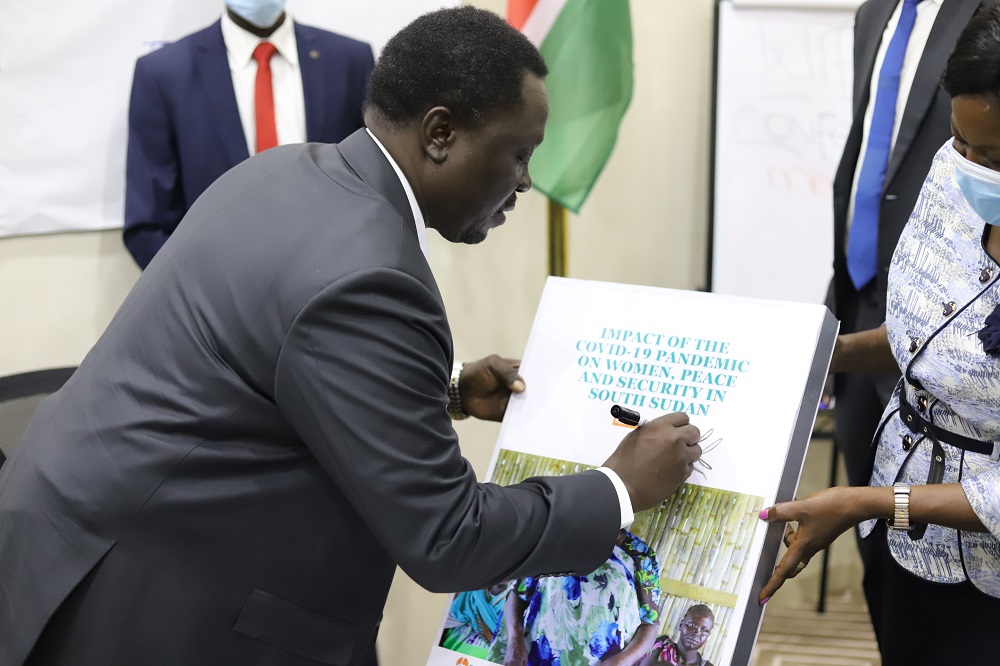
H.E Hussein Abdelbagi Akol, Vice President in charge of the Service Cluster and Chair of the National Taskforce signs and officially launch the research report.
Recommendations from the research emphasized the need to;
- Conduct campaigns to raise awareness on COVID-19 in the rural areas
- More efforts need to be dedicated towards the inclusion of PWDs when it comes to COVID-19 response and the COVID-19 vaccine.
- Experts who have scientific knowledge should be engaged to provide accurate information on the COVID-19 vaccine and its potential side effects.
- Conduct further research on women’s perceptions of the COVID-19 vaccine.
- Vaccinated people need to provide testimonies to encourage others to be vaccinated.
- Government and/or organization should make more information about the vaccine accessible to the public in general and women in particular

“As the Secretary to the National COVID19 taskforce, I’m committed to making sure we learn from this research to improve our programming for SouthSudan and include gender-responsive COVID 19 measures.”- Dr Victoria Arib Majur, Under Secretary, Minister of Health.
Outcome of the First Feminist Peace Convening in Central Equatorial State, Juba, South Sudan
We, participants of the 1st Annual Peace Convening held in Juba, Central Equatorial State meeting in Juba-South Sudan on 16th November 16, 2021, under the ‘Promoting Women’s Needs and their Participation in the South Sudan Constitution-Making Process’ acknowledge our collective vision for sustainable peace in South Sudan and our commitment to promote gender equality and women’s empowerment in Central Equatorial State in particular and South Sudan in general. Read More “Outcome of the First Feminist Peace Convening in Central Equatorial State, Juba, South Sudan”
Training of Trainers on Community Based Facilitation for Peacebuilding
In October 2021, The Peace Centre with support from the Stephen Lewis Foundation ran a three-day Training of Trainers (ToT) of 23 Community-Based Facilitators for Peacebuilding aimed at building a pool of community-based facilitators on peacebuilding, mediation and leadership. Read More “Training of Trainers on Community Based Facilitation for Peacebuilding”
Defend her! Women Human Rights Defenders’ Recommendations for Diplomatic Missions
Women human rights defenders (WHRDs), peacebuilders, advocates for gender equality and other civil society leaders play a critical role in advancing peace, human rights and gender justice. Yet they are under attack for doing so. The Peace Center joined WHRDs in presenting their key recommendations for diplomatic missions to better protect their critical work in a gender responsive and transformative manner and the specific protection needs that WHRDs have. This was to inform Mission leads, staff and policy makers will gain insight in the gap between policy, protocols and practice. From WHRDs first hand, they will receive concrete ideas on how to bridge that gap and how to continue meaningful engagement with WHRDs.Over 180 (W)HRDs, mission staff, representatives of (I)NGOs, Member States and multilateral organizations registered for the event.
The discussion kicked off with a context setting that involved a look at the current situation for WHRDs and why they need specific protection measures This was followed by a Panel conversation by panelists;
Richard Arbeiter, Ambassador and Deputy Permanent Representative of Canada to the United Nations in New York
Caecilia Wijgers, Ambassador of the Netherlands to Afghanistan
Caroline Rucah, Executive Director Lets Be Tested Queens (Western Kenya LGBTQI+ Feminist Forum)
And Sandra Tumwesigye, Communication & Advocacy coordinator Women International Peace Center
The Panel took on discussing key recommendations for gender responsive and transformative protection that addressed; How diplomatic missions support individual WHRDs’ physical, mental, and economic safety. How diplomatic missions strengthen women’s rights organizations’ operational space and their resilience and How diplomatic missions enhance the understanding of, familiarization with, and support for a diversity of women’s voices within the mission?
From this discussion; problems faced by WHRDs were discussed as Lack of physical, mental, and economic safety of individual WHRDs, Limited/restricted travel/mobility options (ao needed to stay out of the hands of opponents), exacerbated by the Covid-19 pandemic and/o additional identification requirements Psychological stress and trauma.
As a way forward, some of the things WHRDs need were discussed as; Supporting physical, mental, and economic safety of individual WHRDs Safe travel facilitations, support to not have to use public transport Short- and mid-term safe houses/ shelters (incl for WHRDs’ children / immediate family members under threat) & support of relocation both in and outside the country or region Providing Mental Health and Psychosocial Support (MHPSS) services, Advocate for establishing legal frameworks to criminalize violations against WHRDs Rapid response funding
The panel also discussed what Currently diplomatic missions are undertaking the following actions
Supporting physical, mental, and economic safety of individual WHRDs, Provision of temporary shelter through the Shelter City Program, as well as accompaniment of international organizations such as PBI Advocating for a victim-centered justice and WHRDs led approach. Partner with (I)NGOs providing gender sensitive MHPSS for WHRDs. Monitoring of attacks and restrictions, Speak up and speak out if WHRDs offices and meetings are restricted or attacked
And last but not least, the panel discussed how missions can address the current gaps through; Supporting physical, mental, and economic safety of individual WHRDs, Strengthen cooperation between EU countries to support (humanitarian) visas for relocation and/or to provide temporary shelter in the region. Collaborate with and assess lessons identified/learned from the Journalists in Distress Network and Protect Defenders
Advocate for establishing legal frameworks to criminalize violations against WHRDs Allocate a rapid response fund and periodically train staff how to respond in emergency cases.
Launch of the 2nd Edition of the Feminist Peace Series: Crisis as an Opportunity for Transformative Change
The Peace Centre launched their 2nd Edition of The Feminist Peace Series Magazine in a virtual event co-hosted by the LSE Centre for Women Peace and Security on 22nd October 2021. The Feminist Peace Series was born out of the continuous inquiry into what Feminist Peace means in practice intending to showcase the different transformative approaches to peacebuilding.
National Feedback Meeting to Draw Actions and Recommendations for Conflict Resolution and Peacebuilding in Uganda
The Peace Centre in partnership with the Ministry of Internal Affairs’ Conflict Early Warning and Early Response system (CEWERU) has been holding routine quarterly feedback meetings with Members of the National Steering Committee to receive and respond to early warning reports from violence monitors, peace mediators and Members of the District Peace Committee and take action. Between 30th September to 1st October 2021, The Peace Centre held a 2-day feedback meeting with the National Steering Committee to review early warning reports compiled from Yumbe, Adjumani, Kotido, Arua, Kassanda, Kapelebyong, Lira, Soroti, Luwero and Kampala.
Regional Learning and Networking Exchange Visit on Peace, Security and Justice
Women’s International Peace Centre as a Just Future partner organized and hosted a 4-day Regional Learning and Networking Exchange for local partners from Burundi, DRC and South Sudan for 22 delegates. The Regional Exchange targeted 20 representatives 4 Burundi (Bujumbura), 7 DRC (Kinshasa, Bukavu and Goma), 5 South Sudan (Juba) CSO partners and 4 Peace Centre staff. The practical learning space provided participants with a first-hand account from similar organisations and interaction with experts on Post Conflict peace building, building strong networks, access to justice through legal clinics as well lessons on Security Sector Reform, Women Peace and Security in the Great lakes region and built relationships with civil society.
Read More “Regional Learning and Networking Exchange Visit on Peace, Security and Justice”
Launch Of The 2020 Report of the Chairperson of the African Union Commission on the Implementation of the Women Peace and Security Agenda In Africa
The Peace Centre joined the launch and dissemination of the 2020 report of the Chairperson of the African Union Commission on the implementation of the Women Peace and Security Agenda in Africa. This was hosted virtually by the Office of the Special Envoy for Women, Peace, and Security and attended by the Member States and other stakeholders on 22nd and 23rd September 2021. This is the second report based on the progress reports from regional economic communities and member states, developed using the Continental Results Framework (CRF). The meeting also launched the process of writing the 2021 Presidency Report on Women, Peace and Security. The two-day launch, which was a follow-up to the December 2019 meeting in Dakar, Senegal, was attended by high-level representatives from the Member States, regional economic communities/mechanisms; the United Nations, civil society organizations, centres of excellence, and gender networks. Read More “Launch Of The 2020 Report of the Chairperson of the African Union Commission on the Implementation of the Women Peace and Security Agenda In Africa”
Youth Peace Ambassadors Shaping Peace Together Tweet-Chat
The Peace Centre’s trained Youth Peace ambassadors in commemoration of 2021’s World Peace Day hosted a Tweet-chat under the theme “Shaping Peace Together” with a belief that shaping peace is everyone’s responsibility. The Tweet chat explored opportunities for youth participation in peacebuilding in their communities and aimed to transform youth perspectives towards shaping peace as we all have a role to play towards shaping and ensuring peace and security.
Read More “Youth Peace Ambassadors Shaping Peace Together Tweet-Chat”
Community Based Peace Advocates and Mediators in Juba, Yei, Bor and Mundri Trained on Conflict Prevention And Resolution
The Peace Centre in partnership with the Centre for Inclusive Governance (CIGPJ), Peace and Justice conducted a three days training from 8th-10th September for women and men in Mundri, Yei, Bor and Juba. The training was conducted to better prepare and equip community-based peace mediators with relevant skills and techniques, to localize conflict resolution skills within the community, to increase knowledge of why integrating a gender perspective is important and how it can strengthen peacebuilding and state building processes. Read More “Community Based Peace Advocates and Mediators in Juba, Yei, Bor and Mundri Trained on Conflict Prevention And Resolution”
Refresher Training on Peacebuilding for Conflict Monitors and Analysts in Adjumani, Yumbe and Kotido
Between 7th August to 2nd September, The Peace Centre conducted a series of three days’ refresher training on peacebuilding and conflict resolution for 92 conflict analysts and conflict monitors from refugee and host communities in Yumbe, Adjumani and Kotido. The Peace Centre is working with District Peace Committees, Women Peace Mediators, Conflict Analysts and Conflict monitors as the peace structures at District and community level and National Steering Committee at the national level to institutionalize gender-sensitive conflict early warning and early response system. The training was supported by UN Women under the project promoting women’s effective participation in peacebuilding in Uganda.
Community Activists Trained to take Action in Preventing Violence Against Women.
To end the culture of violence against women in humanitarian contexts, The Peace Centre trained 30 Community Activists (25 women and 5 men) from Ciforo Sub County and Agojo Refugee Settlement in Adjumani District from 20th to 22nd August 2021. This training engaged the Community Activists on how to use their collective power to create and sustain positive change that prevents Violence Against Women (VAW) through the Action Phase. The Action phase is the fourth and last phase under the SASA Together methodology that aims to address the root cause of VAW and the power imbalance between women and men at both the individual and community levels.
Read More “Community Activists Trained to take Action in Preventing Violence Against Women.”
New Cohort of Women Peace Mediators Trained in Yumbe and Adjumani District.
For peace initiatives to remain sustainable in the long term, women must be included in every level of the process. From 10th to 20th August, the Peace Centre held 4 mediation training workshops for 204 women peace mediators from the refugee and host communities to equip them to mediate and resolve conflicts within and between communities in Yumbe and Adjumani districts.
Read More “New Cohort of Women Peace Mediators Trained in Yumbe and Adjumani District.”
Training Stakeholders at the District level Using the SASA! Together Methodology
From 17th to 18th August, the Peace Centre held a two day’s training of 33 stakeholders in the circle of influence at the district level using the SASA! Together methodology aimed at strengthening their capacities for gender-based violence prevention and peacebuilding in Adjumani District. Participants included local government officials, civil servants, political leaders, police, cultural leaders among others.
Read More “Training Stakeholders at the District level Using the SASA! Together Methodology”
Refresher Training on Conflict Prevention and Conflict Transformation in Yumbe District, Uganda.
The Peace Centre concluded a 5 days refresher training from 5th to 10 August on conflict prevention and conflict transformation for 25 Women Peace Mediators, 30 Conflict Monitors and Analysts in Yumbe District. Since 2019, the Peace Centre has trained over 400 mediators, Conflict analysts and monitors at the local and national levels.
COVID-19 Response in Yumbe, Kotido and Adjumani District.
Read More “COVID-19 Response in Yumbe, Kotido and Adjumani District.”
Women, Peace and Security and Humanitarian Action Compact Launch
As one of the key outcomes of the Generation Equality Forum, the Compact on Women, Peace and Security and Humanitarian Action (WPS-HA Compact) aims to mobilize an inter-generational, inclusive movement for action in the next five years to implement existing commitments on women, peace and security and gender equality in humanitarian action.
Read More “Women, Peace and Security and Humanitarian Action Compact Launch”
Generation Equality Forum Official Opening Ceremony
The Generation Equality Forum (GEF) is a civil society centred, multi-stakeholder, global gathering for gender equality convened by UN Women and co-hosted by the governments of Mexico and France, in partnership with youth and civil society. The Forum brings together feminist advocates from across the globe to foster action and renew movements for gender equality. The Forum kicked off in Paris from 30 June to 2 July 2021, launching a series of concrete, ambitious and transformative actions to achieve immediate and irreversible progress towards gender equality.
Read More “Generation Equality Forum Official Opening Ceremony”
Training Workshop on Understanding the AU, RECs/RM for Advocacy on Security, Justice and Peace
As a member of the Just Future alliance, The Peace Centre hosted a training workshop focused on understanding the African Union and Regional Economic Communities and Regional Mechanisms from 31 May to 4 June 2021 for the Just Future Partners. The Training was planned as an initial activity to contribute to strengthening the local and national CSOs in Burundi, DRC, and South Sudan to better influence security, justice and governance policies and practices in their countries and in the region.
30 representatives of CSO partners from Burundi (Bujumbura), DRC (Kinshasa, Bukavu and Goma), South Sudan (Juba) and Peace Centre staff in each of the countries with minimal exposure to or experience with regional advocacy participated in the training. The training was planned as an initial activity to contribute to strengthening the capacity /meeting the learning needs of local/national CSOs in Burundi, DRC and South Sudan to better influence security, justice and governance policies and practices: Lobby and advocate at regional level in support of the national processes by advocating for more people-centred practices: holding regional partners of state duty-bearers to account, and ensuring accountability towards the most excluded constituencies.
Each day of the training covered particular themes such as understanding the global governance architecture and the space of multilateralism, the AU’s key policy priorities, including the continental blueprint, Agenda 2063, the Regional Economic Communities/ Regional Mechanisms (RECs/ RMs): their history, background, various structures and main legal and policy frameworks. The session on gender and inclusivity in the AU and RECs identified opportunities for strengthening women and youth participation in AU and RECs/ RMs structures and processes, and finally, the impact of the COVID-19 pandemic on CSOs work, particularly their lobbying and advocacy work.
The training also involved country team discussions to deepen sharing, learning, connectedness and work towards developing an advocacy plan and other practical training tools. While the training was conducted online, participants gathered in physical locations in each city (Juba, Bujumbura, Bukavu and Kinshasa) to facilitate exchanges with colleagues from partner CSOs.
By the end of the 5days training, participants were exposed to the entry points and opportunities for policy engagement, lobbying and advocacy, especially structures that they could collaborate with for an effective advocacy strategy including working more closely with the AU Special Envoy on Women, Peace and Security, the AU Youth Envoy, the AU Women, Gender and Development Directorate as well as the AU Youth Division. They also developed draft Joint Advocacy Strategies to address cross-cutting issues in Burundi, DRC and South Sudan.
Additionally, the training workshop provided a platform for peer-to-peer exchange and enabled deeper reflection issues facing CSOs in conflict and post-conflict countries. This creation of platforms and spaces for CSOS to meet, exchange, reflect and strategize, and investment in fostering intergenerational dialogue is important. The Just Future Programme has an opportunity to continue bringing CSOs from select countries to share experiences and realities and discuss agendas and strategies.
Launch of the Research on 20 Years of Implementing UNSCR1325 in South Sudan
The month of June kicked off with the official launch of our research report on 20 years of implementing the United Nations Security Council Resolution 1325 in South Sudan with support from the Forum for Women and Development (FOKUS) and in partnership with the Ministry of Gender, Child and Social Welfare (MoGCSW) in Juba. The launch was attended by 43 participants comprising of representatives from ministries including the Ministry of General Education and Instruction, Ministry of Defence and Veterans Affairs, Ministry of Humanitarian Affairs and Disaster Management, Ministry of mining, MoGCSW, Ministry of East African Community Affairs, Ministry of Finance and Economic Planning, Embassy of Sweden in Juba, development partners and CSOs.
Read More “Launch of the Research on 20 Years of Implementing UNSCR1325 in South Sudan”
Refresher Training of Young Women Peace Builders in South Sudan
The Peace Centre partnered with the Centre for Inclusive Governance, Peace and Justice (CIGPJ) in 2019 and the National Transformational Leadership Institute (NTLI) at the University of Juba in 2020 to train 46 young women leaders (from diverse CSOs, academic institutions and informal networks) in Juba, South Sudan. Building on this training, and addressing the capacity needs and identified limitations to young women’s meaningful participation, the Peace Centre organized a practical skilling session from 24th to 28th May 2021 in Juba to equip young women with skills to; Engage in digital spaces for national-level organizing and in regional and international processes occurring online. Learn and practice documentation and write for publication or influencing. Understand leadership in practice with a focus on subjects such as management of finances. And last but not least to increase knowledge of key women, peace and security thematic areas. Read More “Refresher Training of Young Women Peace Builders in South Sudan”
Support Phase Training of Community Activists using the SASA Together Methodology
The notion that violence against women is cultural for some communities and therefore does not warrant a serious response continues to put women at greater risk. Using the SASA Together methodology, The Peace Centre held 3 days of training from 28th to 31st May 2021, for 30 Community Activists from the host and refugee communities in Adjumani District. This training focused on the 3rd “Support” phase of the SASA Together methodology.
Read More “Support Phase Training of Community Activists using the SASA Together Methodology”
Interdisciplinary Dialogues Fostering Future Women Leaders in South Sudan
In order to bridge the gap between senior women leaders and young women and highlight the role young people play in ensuring sustainable peace and good governance, The Peace Centre held four dialogues with 51 Women peacebuilders, Gender Focal persons, Women Parliamentarians and representatives from CSOs as well as young women leaders from 18th to 20th May 2021 Dembesh Hotel in Juba, South Sudan. The dialogue was convened in collaboration with Community Empowerment for Progress Organization supported by the Forum for Women and Development. Read More “Interdisciplinary Dialogues Fostering Future Women Leaders in South Sudan”
European Studies’ Debate on Feminist Peace
Statement by The Women’s Movement Condemning the Government of Uganda’s Proposal to Merge the Uganda Women Entrepreneurship Programme (UWEP) With Other Wealth Creation Programmes
The Peace Centre as part of the Women’s Movement supports reservations to the merger of the Uganda Women Entrepreneurship Program(UWEP) with other programmes in light of the numerous barriers that women grapple with in accessing and enjoying credit and capital. Uganda is known to have registered strides in gender equality. UWEP which was launched in 2015 is one of the biggest initiatives and has been key in realizing Sustainable Development goals 1 and 5 that speak to ending poverty and gender inequality respectively. Read More “Statement by The Women’s Movement Condemning the Government of Uganda’s Proposal to Merge the Uganda Women Entrepreneurship Programme (UWEP) With Other Wealth Creation Programmes”
Advocacy Training for Inclusive Peace Processes in DRC and South Sudan.
Advocacy is essential in promoting women’s inclusion, equal representation and effective participation in decision making processes to build transitional justice, human security and access to justice. The Peace Centre convened a training on advocacy for the United Nations Security Council Resolution (UNSCR) 1325 on women, peace and security from 21st-23rd April 2021. The training aimed at deepening staff knowledge and skills in preparation for the Just Future project. The 3 days training was guided by an existing training manual and focus on Understanding the Need for Advocacy for UNSCR 1325, Assessing The Policy Environment for UNSCR 1325, Developing a UNSCR 1325 Advocacy Strategy and Implementation Plan, and Monitoring Advocacy.
Read More “Advocacy Training for Inclusive Peace Processes in DRC and South Sudan.”
Luwero District Leaders Trained on Peacebuilding, Mediation and Leadership.
The Peace Centre organized a 5-day training from 19th to 23rd April 2021 for Luwero District Leaders to enhance their skills in peacebuilding, leadership, mediation and understand the different frameworks for women’s participation in leadership and peacebuilding. The training brought together 35 leaders (30 women, 1 woman with a physical disability and 4 men) district and sub-county councilors from the subcounties of Kamira, Kalagala, Bombo, Katikamu, Luwero, Zirobwe, Kikyusa, Ndejje, Wobulenzi Town Council, Nyimbwa, Luwero Town Council and Butuntumula.
Read More “Luwero District Leaders Trained on Peacebuilding, Mediation and Leadership.”
Increasing Women and Youth’s Participation in Peacebuilding and Leadership in Lira and Soroti.
The Peace Centre conducted a six day’s training for 80 cultural leaders and district technical administrative staff from Soroti and Lira district (40 per district) with the main areas of focus being; mediation and negotiation, conflict analysis and leadership among the selected leaders. Cultural leaders play a key role in refining norms to enhance women’s participation in decision making and outlaw negative practices that deter the progress of women. The training contributes to ongoing efforts to strengthen women’s effective and meaningful participation in the formal and informal peace building processes. Read More “Increasing Women and Youth’s Participation in Peacebuilding and Leadership in Lira and Soroti.”
Peacebuilding and Leadership trainings in Soroti and Lira Districts
Women’s participation in decision making, in peacebuilding and post-conflict recovery processes (in disarmament, reintegration, security sector reform, economic recovery programs, humanitarian response, legal, judicial and electoral processes) in Uganda is markedly low, particularly at the local level.
Read More “Peacebuilding and Leadership trainings in Soroti and Lira Districts”
End of Project Learning and Sharing workshop on Promoting Women’s Effective Participation in Peace Building in Uganda
On the 29th of March 2021, The Peace Centre hosted an end of project learning and sharing stakeholder workshop in line with the project “Promoting women’s effective participation in peacebuilding in Uganda”. This project was implemented with the support of UN Women in Yumbe, Adjumani and Kotido districts.
Grassroots Women Peacebuilders Join the Generation Equality Forum
Women Peacebuilders from Yumbe District with support from the Peace Centre, were able to join the Generation Equality Forum and preparatory workshop discussion. This was a part of Commission on the Status of Women (CSW)65 pre–Generation Equality Mexico Forum workshop that highlighted key discussions for the meaningful participation of women and youth peacebuilders in the Generation Equality Forum. Catherine Kwanje, a Peacebuilder from South Sudan living in Bidibidi Refugee settlement used the forum to share highlights on the need to ensure that women who are displaced by conflict are included in peace processes in their country of origin.
Read More “Grassroots Women Peacebuilders Join the Generation Equality Forum”
National Feedback Meeting to Define Strategies For Reduction of Conflict And Violence in Uganda.
The Peace Centre in partnership with the Ministry of Internal Affairs’ Conflict Early Warning and Early Response system (CEWERU) convened a two day feedback meeting from 10th- 11th March with the National Steering Committee to share early warning reports from the Peace Committees in Kotido, Yumbe and Adjumani and discuss effective and early response to prevent and mitigate conflicts in Uganda. The feedback meeting will be used in laying of strategies and actions for reduction of conflict and violence in Uganda.
100 women/youth leaders in Soroti District trained as peace advocates.
Building on the gains from the previous work in conflict and post-conflict situations, The Peace Centre conducted training on Peacebuilding and Leadership for 50 women leaders (political, religious, cultural, CBOs and independent/influential women leaders) and 50 youth leaders (political, religious, cultural and independent/influential youth leaders) in Soroti district. The training which aimed to enhance conflict analysis peacebuilding, governance, leadership and mediation skills was conducted from 22nd to 27th February. Read More “100 women/youth leaders in Soroti District trained as peace advocates.”
SASA Together Conversations on Violence Against Women.
The Peace Centre conducted 4 Community Dialogues on the root cause, impact, prevention and response to Violence Against Women using the SASA Together and Sexual and Gender Based Violence (SGBV) Standard Operating Procedures for 2 host communities in Ciforo Sub County and Agojo Refugee settlement on 16th and 17th February.
The dialogues which were convened to influence attitudes on SGBV targeted community leaders from the cultural, political, religious institutions and were attended by 178 people (77 men and 101 women).
The LC 1, Duba Village in Ciforo sub county shared that about 75% of women experience abuse in her community. SGBV remains a silent epidemic in many humanitarian settings oftentimes associated with a wide range of physical, sexual and psychological health consequences. Studies have also shown negative impacts of SGBV on the social and economic well-being of survivors. These outcomes are particularly exacerbated in humanitarian settings given that crisis-affected populations are more vulnerable to SGBV.
The community dialogues provided opportunity to the community leaders to discuss key Women Peace and Security issues and Violence Against Women (VAW). VAW continues to happen because of the unbalanced power relationship which is deeply rooted in culture as well as the patriarchal nature of our society. Alcoholism, poverty, lack of trust, polygamy, women accessing family planning without spousal consent, reduction in food ration to the refugees, sharing resources like land, food among others contribute to the increasing violence in the communities.
Community leaders identify, settle and refer to a lot of conflict incidences in their communities but they lack the materials and skills in documenting the cases. The fact that the violence continues to happen in the community because the community and its leaders have accepted it enabled the local leaders to acknowledge their role in promoting peace in the communities they lead.
Girl Power Camp Facilitating Dreams in Amuria District
On 18th February 2021, the Peace Centre convened a Girls Power Camp under the theme ‘My Body My Power’ targeting 178 Primary Seven (P.7) pupils from Orungo Primary School of which 34 girls and from Moruinera Primary School of which 47 were girls in Amuria district.
Through conversation circles, we emphasized self-exploration skills, critical thinking and self-awareness. This camp follows a series of conversations under the theme ‘My Body My Power’ with adolescent girls aged 9 to16 years from Ocakai Primary School, Ococia P/S, Otubet P/S Orungo P/S & Moruinera Primary School during which skills girls in leadership, understanding their bodies, discovering their dreams and setting goals
Since June 2018, Women’s International Peace Centre has organized camps for adolescent girls aged between 9 and 16 years from five schools . Building on previous engagement, the camp included a dialogue among the pupils looking at building adolescent’s competencies for the future and providing a platform to discuss the values of girls’ education in the society. The girls were trained in leadership, informed about their bodies, and sensitized on HIV&AIDS to reduce discrimination and stigma.
The Peace Centre also held a talk on conquering fear and confidence building. Under the theme “knowledge is power” young girls were guided on how to conquer fear and build confidence using the word of God by Rev. Canon Lawrence Onyait. This was followed by a session on career development covering: Areas of interest for the girls. The talk also discussed prioritized life values which included courage beyond primary level and self-management during vacation to avoid joining bad groups and early/child pregnancy, forced marriage. This camp aimed to enable learners, take actions that will shape their career path. The P.7 candidates and staff of Orungo primary school appreciated the Peace Centre for their timely intervention of confidence building and career development as they approached PLE.
Women Peace Mediators Curbing Conflict In Uganda
The Peace Centre held a series of meetings with Women Peace Mediators from refugee and host communities meet each month to discuss peace and security concerns they have identified and develop an issues report for action by the respective District Peace Committees in Yumbe, Adjumani and Kotido. This was between 5th and 11th February where the Peace Centre joined 108 women peace mediators as they discussed their experiences, their progress in resolving conflicts, representing women and their priorities which require redress.
The mediators were joined by 90 Conflict Analysts and Conflict Monitors in the three districts who received and reviewed the reports to the District Peace Committees.
The women peace builders discussed key issues likely to cause conflict in the refugees settlements including inadequate land for cultivation since the food ratio has reduced and low water supply during the dry season. The mediators also expressed concern that some water points were not operational, they highlighted insufficient supply insufficient supply of drugs in specific health centers and cases of conflict between the host and refugee communities over resources like firewood and grass especially with stray animals destroying crops. Increased teenage pregnancies since the COVID-19 outbreak remains an important issue to which the peace mediators are seeking immediate solutions.
The meeting is part of wider efforts led by the Peace Centre with support of UN Women to institutionalize gender sensitive conflict early warning and early response system in conflict-affected Adjumani, Yumbe and Kotido districts. This has been carried out as a series of training in mediation and conflict resolution in 2019 and 2020.Women leaders including refugee women and women affected by cross-border conflicts benefited from the initiative. Since then, they have taken lead in peace building within their communities and ensuring that district peace committees address women’s peace and security concerns.
Strengthening The Capacity of Civil Society, Just Future the Alliance
The Peace Centre is excited to be a part of Just Future, an Alliance that will over the next 5years, work towards fair, equitable & inclusive justice, security and peace in Afghanistan, Burundi, DRC, Mali, Niger and South Sudan. The alliance has been formed in response to the challenges of a fragile world. Consisting of 6 established CSOs and networks, from the Global North and South, our work will strengthen the capacity of CSOs and enable their collective action to bring about more inclusive, constructive and legitimate power relations.
Just Future’s vision is of a world in which all people in fragile states benefit from more accessible, responsive and accountable security and justice institutions, and more inclusive arrangements for political governance and peace-making. Just- future is seeking to change the current state of life because conflict and violence are the most significant obstacles to achieving the Sustainable Development Goals (SDGs). Just Future will foreground the needs and demands of women and girls, the commitment of men to achieving gender equality and preventing sexual- and gender-based violence (SGBV), and realizing political power for young women & men—the majority of the population in all 6 countries.
Just Future will be delivered by a consortium including the African Security Sector Network, a pan-African network working to facilitate progress towards the achievement of effective and democratically governed security sectors across Africa. Cordaid; a Dutch humanitarian and development NGO, working in the most fragile and conflict-affected contexts on challenges in the security and justice, health, education, and humanitarian protection sectors, among others. Search for Common Ground which is a US- and EU-based international non-profit operating in 36 countries, with a mission to transform the way the world deals with conflict, away from adversarial approaches toward cooperative solutions. The Liaison Office (TLO) is an independent Afghan non-governmental organization seeking to improve local governance, stability and security through engagement with customary structures, local communities, and CSOs. In the Alliance, TLO represents the SALAH Consortium of CSOs. West African Network for Peacebuilding is a leading regional peacebuilding organization with strong national networks in every West African state, focusing on collaborative approaches to conflict prevention and peacebuilding and Women’s International Peace Centre is a transnational feminist organization working to empower women from different countries in Africa and Asia by supporting their active participation in peacebuilding processes.
The Just Future Alliance also includes The Civil Society Platform for Peacebuilding and State-building as its network partner. The Rift Valley Institute, the Stockholm International Peace Research Institute and the Van Vollenhoven Institute at Leiden University as research partners. As Just Future will be funded through a Power of Voices Strategic Partnership with the Ministry of Foreign Affairs of The Netherlands, the Ministry will also contribute to program implementation.
Meeting with Conflict Analysts and Monitors in Adjumani District.
On 12th February, The Peace Centre held a meeting with Conflict monitors and conflict analysts in Adjumani. This was to analyse and harmonise the report shared by the Women Peace Mediators on women peace and security concerns to be presented to the District Peace Committee for immediate action. Key issues identified during the training included; bush burning, resource sharing conflicts, stray animals from both the refugees and host communities destroying crops, need for more land to be apportioned to the refugees and host for cultivation, night disco halls playing loud music till late and access to police form 3. The meeting also provided an opportunity for the monitors and analysts to share individual stories of change. Read More “Meeting with Conflict Analysts and Monitors in Adjumani District.”
Catalyzing Systems to Keep Refugees and Host Communities Safe from Violence.
The Women’s International Peace Centre (The Peace Centre) and International Rescue Committee (IRC) conducted a case management training for 14 participants from IRC and the Peace Centre. The five-day training which was held from 25th to 29th January 2021 was to enable participants to handle gender-based violence cases amongst urban refugees in Kampala.
This is in line with the Peace Centre and the IRC partnership on a project to reimagine, support, and reshape nationally driven and locally-led protection systems. The project titled, Scale-Up: Catalyzing Systems to Keep Refugees and Host Communities Safe from Violence (Safety and Power) will rapidly map and analyze how gender-based violence and child protection humanitarian interventions in the urban context, should link up to and be integrated into existing social protection, social welfare, child protection, and justice law and order sector systems. It will also feature engagement of the Centre’s alumni as some have been refugees themselves.
The training was facilitated by the IRC team who took participants through a couple of modules on GBV case management which included; understanding power and GBV and the theoretical foundation for a survivor-centered approach context, and causes of GBV among many others.
.
Focus on The Gendered Impact of Climate Change and Women and Girls’ Right to Peace.
The Peace Centre in partnership with Gender Action for Peace and Security (GAP) and the Women Peace and Security Centre of the London School of Economics (LSE) studied the intersection between environmental conflict, peace and gender. This was to provide recommendations for the international community for how it can better ensure that women and girls’ human rights can be delivered despite the challenges of environmental degradation and climate change.
Read More “Focus on The Gendered Impact of Climate Change and Women and Girls’ Right to Peace.”
The Peace Centre Trains 540 Election Observers in Uganda
In preparation for the 2021 presidential election, the Peace Centre conducted fourteen(14) election observer training in different districts in Uganda which were concluded on a final training held from 9th– 13th January 2021 in Kampala. The Peace Centre recruited a total of 540 election observers selected from sub-counties in Arua, Kassanda and Kapelebyong in addition to other districts of Soroti, Lira, Amuria, Kampala, Sembabule, Luwero, Ntugamo, Rukungiri, Yumbe, Kotido and Adjumani.
The training was successful in ensuring that each district had 40 trained election observers with election observation materials deployed to observe elections from 14th to January to 22nd January.
Election observation is a valuable tool for improving the quality of elections and creates confidence in elections that can help promote sound democratic practices. This is vital as Uganda has not experienced peaceful, violent free democratic electoral processes since the introduction of multi-party politics in 1988. The political environment in the build-up to, during, and after elections has over the years become increasingly charged with reports of harassment, intimidation, acts of corruption, human rights abuses perpetrated by different political opponents.
To ensure a difference this year, the election observers were trained on Electoral Commission election observation guidelines, laws related to election observation, do’s and don’ts of an election observer, and provided tools for data collection. This enabled them to monitor elections and document electoral violence incidences in the eleven districts.
Reimagining Women Peace and Security
‘The UN Resolution 1325 has succeed in raising awareness of the women peace and security agenda.’ shared Helen Kezie Nwoha representing the Peace Centre shared in a conversation with joined leading women peace advocates from across the Commonwealth as they reimagined what ‘women, peace and security’ might mean for our future.
The conversation comes two decades after the Resolution 1325 on Women, Peace and Security, part of a global effort to highlight the impact of conflict on women and the need to bring the voice of women into peace processes., it is clear that much remains to be done.
In this second event in the Commonwealth Foundation’s Critical Conversations series, the peace advocates asked; how Resolution 1325 can be reimagined to better serve the needs and aspirations of women and communities across the Commonwealth. If mainstream approaches to women’s leadership in conflict resolution were actually working? How can women’s participation in peace processes be made more meaningful? How can women peace advocates secure better access to the forums and institutions where decisions are being made?
Speakers drew on their front-line experience to tackle these questions; sharing concrete examples of what has worked well and their perspectives on what needs to be done differently.
Watch this conversation here
Training for District Peace Committee members, Monitors and Analysts
We are in Arua conducting a 3 days training for District Peace Committee members, monitors and analysts targeting Electoral Commission officers, Police, District Community Development Officer, National Women Council, youth, Persons with disability representative, district information officer, CSOs and Religious institutional representatives supported by DGF Uganda. The training aims to enhance capacity of peace committee’s members to detect early warning conflict, respond and mediate conflict that may arise before, during and after election.
Read More “Training for District Peace Committee members, Monitors and Analysts”
Adaption of Early Warning Tools for District Monitors in Arua, Kapelebyong, and Kasanda
Fifteen participants from Arua, Kapelebyong and Kasanda inclusive of data analysts, district leadership and the women monitors were part of trainings on adaption of early warning tools from 7th – 12th September, 2020. This was facilitated by a consultant who developed the gender-sensitive early warning data collection tools to aid in collection conflict/violence early warning signs in the electoral process and general conflict in communities. Read More “Adaption of Early Warning Tools for District Monitors in Arua, Kapelebyong, and Kasanda”
Exchange visit With Refugee Women Peace Builders
The Peace Centre was excited to be hosting a 3-day exchange visit with 40 women peacebuilders from Burundi, the Democratic Republic of Congo, South Sudan & Uganda, living as refugees in Uganda to reflect on the past 20 years of implementing the Women Peace Security agenda.
This was in line with the 20th anniversary of UN Security Council Resolution 1325 on women, peace and security, it is widely acknowledged as a significant year for driving progress and pushing for gains in implementing the women, peace and security (WPS) agenda. 2020 is also the 25th anniversary of the Beijing Declaration and Platform for Action, which is significant for the WPS agenda with its prioritisation of women and armed conflict as a critical area of concern for gender
equality and women’s empowerment. It is a critical year to reflect on progress, setbacks, challenges and opportunities to advance the women, peace and security agenda, and to leverage the anniversary to accelerate the implementation of key commitments and WPS frameworks.
The exchange visit ensured that the peacebuilders had a recap on UNSCR resolution 1325 and the Uganda National Action Plan(NAP). We discussed the desired outcomes of the NAP and how women can participate in monitoring UNSCR 1325 at different levels. The exchange visit also entailed group presentations discussing challenges faced by women in conflict-affected areas and what recommendations they have to address the gaps.
On the status of implementation of the #UNSCR1325 in refugee settlements and within host communities the challenges have been highlighted as;
– High levels of physical and psychological gender-based violence, and limited access to reproductive health services.
-Refugee women and girls within settlements are continually excluded from formal peace processes and are under-represented within peace or security committee structures
Despite making tangible changes in the communities, the contributions of refugee women and grassroots women peacebuilders are not recognized or made visible. The 3-day visit also included the peacebuilders sharing their reflections on the Implementation of UNSCR 1325; Participation, Prevention, Protection relief and recovery with the African Union Special Envoy Bineta Diop. The women peacebuilders, therefore, urged Madam Bineta Diop to consider and amplify their recommendations as; a need to call for all governments and development partners to create a protective environment for women and girls affected by conflict.
You can access the full report on the exchange visit here: 20 Years of Grassroots Women Building Peace
Launch of the 2020/2021 Women’s Situation Room Uganda
The Uganda Women’s Network host of the Women’s Situation Room
(WSR) in Uganda in 2021; and the Women’s International Peace Centre, the Secretariat of the WSR launched the 2021 WSR. The Women’s Situation Room is a process that mobilizes women and youth to ensure their active participation in promoting peaceful electoral processes.
The process promotes women’s leadership in conflict resolution and peace building in accordance with United Nations Security Council Resolution 1325. The WSR is an early warning and rapid response mechanism to election related conflict and violence in African countries. First implemented by the Angie Brooks International Centre (ABIC) during the Presidential and Legislative Elections in Liberia in 2011, the WSR was adopted as a Best Practice by the Gender is My Agenda Campaign (GIMAC) of the African Union, and President Ellen Johnson Sirleaf of Liberia was designated as the Champion for the WSR.
Read More “Launch of the 2020/2021 Women’s Situation Room Uganda”
Recommendations Presented to the Special Envoy of the Chairperson of the African Union Commission on Women, Peace and Security by Grassroots Women Peace Builders
THANK the Government of Uganda for its generosity in hosting us and guaranteeing the rights of refugee women to access land, education, health services, employment, free movement and to live in Uganda with dignity.
COMMEND the Ministry of Gender, Labour and Social Development of Uganda for incorporating the protection and participation of internally displaced and refugee women in conflict prevention, resolution, relief and recovery as a key emerging issue in the third National Action Plan on UN Security Council Resolution 1325 (2020-2024).
RECOGNISE the on-going review of the South Sudan National Action Plan on UN Security Council Resolution (UNSCR) 1325 and Related Resolutions (2015-2020) by the Ministry of Gender, Child and Social Welfare of South Sudan, which aimed to enable the broad participation of women, including displaced women, in peace negotiations and all mediation processes.
APPRECIATE the solidarity and support of the Special Envoy of the Chairperson of the African Union Commission on Women, Peace and Security in championing the priorities and agency of women and girls affected by conflict, including young, displaced and grassroots women, in continental peace and security efforts.
ACKNOWLEDGE the critical role of the Office of the AUC Special Envoy on Women, Peace and Security in developing the Continental Results Framework on Women, Peace and Security and supporting national and regional actors to monitor and report on implementation of the WPS agenda.
SEIZE the opportunity of the 20th anniversary of UNSCR 1325, the 25th anniversary of the Beijing Platform for Action and the start of the African’s Women’s Decade on Financial and Economic Inclusion for African Women to call for accelerated implementation of the WPS agenda from the perspective of young, grassroots and displaced women peace builders.
On the status of implementation of UNSCR 1325 in refugee settlements, within host communities, in cross-border and pastoral conflict settings, we
Highlight the following persisting challenges for women and girls
- The situation of women and girls in these settings is affected by high levels of physical and psychological gender based violence including rape, defilement, family and child neglect, physical deformation, stress, divorce and separation, suicide. This is worsened by limited legal and psychosocial support to SGBV survivors; social stigma; high number of male police who are not equipped to handle court cases with sensitivity and confidentiality; delays in processing cases and perpetrators going unpunished.
- Due to COVID-19, food rations for refugee women and children have been reduced, there is a rise in teenage pregnancies, forced or early marriages, domestic violence and new cases of internal displacement. The COVID-19 situation has also caused fewer women and girls to report SGBV cases and has highlighted the continued need for psychosocial and material support to survivors and persons with chronic special needs.
- Other challenges include limited access to reproductive health services, low levels of income and education among refugee women as well as conflicts between refugees and host communities over land and resources such as firewood, water or grass, worsened by language barrier.
- Refugee women and girls within settlements are excluded from formal peace processes and our voices are not considered in post-conflict reconstruction efforts in countries of origin, for instance in the 2018 South Sudan peace in the process and current governance decisions by the revitalised transitional government of national unity.
- Refugee women and grassroots women peace builders who play key conflict prevention and resolution roles at local levels are under-represented in continental peace and security efforts such as the Silencing of the Guns initiative. Weak exchange of information and feedback between local, national and continental policy levels limits the reach of our voices.
- Women are not meaningfully involved or well represented within peace or security committee structures at sub-county and district level, in districts without organised women mediator groups. Cultural norms and practices still limit women’s access to key decision-making spaces like the Elders’ shrines in Karamoja. Urban refugee women are often not consulted or involved in the design and implementation of policies that concern us.
- The contributions of refugee women and grassroots women peace builders are not recognised or made visible. They are depicted as ‘vulnerable’ even when they are making tangible change in the communities. Women leaders in political spaces within and outside the refugee settlements are making significant contributions to peace and security. However they are also intimidated, targeted by men in the community with false accusations; denied permission by husbands to participate in leadership, face sexual harassment from male superiors in their work; are limited by financial constraints and their levels of education.
We urge the Special Envoy of the Chairperson of the African Union Commission on Women, Peace and Security to consider and amplify our recommendations as follows;
- Call for all Governments and Development Partners to create a protective environment for women and girls affected by conflict, to strengthen judicial and medical responses to SGBV, to provide direct psychosocial and material support to survivors, raise awareness among men and tackle the negative norms and practices sustaining this violence.
- Call on Governments and Development Partners to directly support the conflict prevention and peace building work of refugee and grassroots women’s groups, caucuses and community based organisations; to ‘do no harm’ and equip local women to sustain their work and its positive impact.
- Request the AUC Special Envoy on Women, Peace and Security to promote the creation of sage spaces for conflict-affected women at all levels and to support the inclusion of refugee women and grassroots women peace builders at the highest decision-making tables on peace and security in their host countries and countries of origin.
- Call Upon the IGAD Conflict Early Warning and Response Mechanism to drive the restructuring of district and sub-county level peace committees to have 50% of their members as women.
- Request IGAD, the Government of South Sudan and RJMEC to ensure that South Sudanese refugee women participate and their voices are heard in national peace building processes.
- Request the AUC Special Envoy on Women, Peace and Security to facilitate the participation of refugee women and grassroots women peace builders in continental peace and security efforts, particularly in silencing the guns to which we are victims. We call on other women’s rights organisations, development partners and governments to equip grassroots women to participate in the digital world, with the skills and tools required for our exposure and our voices to be included.
- Call on the African Union Commission and Member States to prioritise the economic empowerment of women and girls affected by conflict, including refugee women, in all the plans of the upcoming African’s Women’s Decade on Financial and Economic Inclusion for African Women. This should address the education.
Dated at Kampala, this 14th day of October 2020
20 Years of African Women’s Participation in Women Peace and Security: Civil Society Perspectives
African women’s experiences in conflict situations and the role of African women’s
peacebuilders were central to the influence for the adoption of United Nations
Security Council Resolution 1325 and the broader Women’s Peace and Security
Agenda. African women have played a formative role in shaping the agenda, raising
awareness of the issues, developing and implementing frameworks as well as
building networks and mobilizing the necessary support for its implementation. Read More “20 Years of African Women’s Participation in Women Peace and Security: Civil Society Perspectives”
Monthly meetings with women leaders and monitors and the District Peace Committee.
The Peace Centre hosted monthly meetings with the District Peace Committee members from 24 th September – 3 rd October, 2020. A total of 15 women leaders, male and female monitors and data analysts were mobilized to attend the meetings in Arua, Kapelybong and Kassanda.
The meetings convened at sub county level aimed at sharing documented early warning incidences and the impact of COVID 19 on women and electoral processes for discussion and action by the Committee.
The District Peace Committees were established as a part of the Conflict Early Warning and Early response mechanism (CEWERU).
International Day of Peace
The Peace Centre partnered with the South Sudan Ministry of Gender, Child and Social Welfare and Centre for Inclusive Governance, Peace and Justice (CIGPJ) to mark International Day of Peace with a talk show on South Sudan Broadcasting Corporation TV on 21st September 2020 reflecting on important roles of women in sustaining peace, the status of and opportunities for women’s (including young women’s) participation in peacebuilding and national development.
The discussion highlighted progress and gaps in government efforts, including in the implementation of the 2015-2020 National Action Plan on UNSCR 1325 and the revitalized peace agreement. It also highlighted the contributions of young women to peace and nation-building; including advocating for the R-ARCSS to be implemented and for their inclusion in decision-making processes, opportunities for ensuring women’s leadership in political parties and public institutions, and closed with calls to action.
.
Training of Refugee Women Leaders as Mediators in Advocacy for Conflict Prevention and Peacebuilding.
The Peace Centre trained 78 refugee women in December 2019 and they have participated in the formal and informal decision making forums for peace. To further strengthen their skills. The trainings enhanced the capacity of 90 peace mediators; 40 in Yumbe from 7th to 9th September 2020 and 35 in Adjumani from 10th to 12th September 2020 and 15 in Kotido from 19th to 21st August 2020.
During the training the 75 women peace mediators discussed what they did with the skills they obtained during the mediation training in December 2019, with demonstrations on how they handled the conflict cases and they were guided. The training also focused more on advocacy for conflict prevention and peace building, OPM community based service department took participants through the referral pathway, new action plans were developed and participants went out to implement. The 15 participants in Kotido included community development officers whose involvement in peace building has been low since they had never been targeted with peace building initiatives yet are key if peace is to be realized.
Training of Analysts to Examine Data and Produce Monthly Reports
The conflict early warning and early response system has been lacking an effective monitoring and reporting of conflict incidences right from the grassroots. To strengthen the early response and reporting system, The Peace Centre trained 46 Conflict Analysts (8 males and 38 females) that is 16 in Kotido from 16th to 18th August 2020, 15 in Adjumani from 24th to 26th August 2020 and 15 in Yumbe from 2nd to 4th September 2020. Participants were equipped with knowledge and skills on Uganda’s conflict early warning and early response mechanism. Read More “Training of Analysts to Examine Data and Produce Monthly Reports”
Training of District Peace Committees
The Peace Centre this week trained 66 District Peace Committee members (46 males and 20 females) to play their peace building role more effectively while mainstreaming gender and embracing conflict early warning and early response mechanisms at District level. This was carried out through three trainings sessions organized by the Peace Centre for 60 District Peace Committee members in Kotido, Adjumani and in Yumbe where 2 days were allocated to each District with 20 participants each.
The Conflict Early Warning and Early Response system that Uganda is using provides for peace structures at National, District, Sub County, Parish and Village level but on ground the committees were not fully functional and lacked understanding on their mandate. The trainings focused on IGAD, Conflict Early Warning and Response Mechanism (CEWARN) background, mandate, activities and role of District peace committee, frameworks and methods of conflict early warning, formation of local peace structures, engendering the conflict early warning and early response system at District level. As the peace structure mandated to coordinate peace initiatives at District level, the committee now have a better understanding on their role, operations, mainstreaming gender in peace building, conflict early warning and early response system and pledged to utilise the skills gained in their peace building work.

Feminist Leadership Institute 2020
Responding to the absence of young women in policy spaces and programming on peace and security, The Peace Centre is this week training young women from Burundi, Democratic Republic of Congo, South Sudan and Uganda to empower them to be leaders and agents of peace in the Feminist leadership Institute in Seeta, Uganda. Read More “Feminist Leadership Institute 2020”
Monthly District Peace Committee Meetings in Kotido, Yumbe and Adjumani
From 19th to 25th June 2020, The Peace Centre facilitated the meeting of District Peace Committee meetings that had a total of 142 (42 females and 100 males) participants. The meetings provided platforms where Women Peace Mediators presented women peace and security concerns including; the impact of COVID 19 on women, increasing conflicts in the project districts that called for the safety of women and girls, spaces for women’s participation in peacebuilding, peace meetings and complete disarmament, protection of the unprotected kraals, tracking and recovery of stolen animals, need to resume peace initiatives since the Warriors took advantage of the lockdown and conflicts escalated.
Read More “Monthly District Peace Committee Meetings in Kotido, Yumbe and Adjumani”
Tracking Trained Women Leaders in Bukavu, DRC
In June, women leaders who were trained by the Peace Centre, Karibu Jeunesse Nouvelle (KJN) and Association des Femmes des Medias (AFEM) on practical strategies to promote women’s participation in post-conflict governance in 2019 were interviewed to track their progress. The training aimed at strengthening the capacity of women leaders to engage in and influence post-conflict decision-making and governance as well as demand accountability from policymakers towards actualizing the meaningful inclusion of women in governance and decision making in the Democratic Republic of Congo.
Since 2019 the trained women leaders, have held community awareness sessions and dialogues on the need for women’s participation at all decision-making levels; the rights and responsibilities for women and girls, and sexual and gender-based violence (SGBV) and also mitigated land conflicts. The awareness sessions also targeted schools and Universities, encouraging young women to join politics, to position themselves in leadership structures and the political system in preparation for the 2023 legislative elections. As a result, 5 young women joined the communication unit of the Union for Democracy and Social Progress Party (UDPS).
Thanks to Bukavu’s training, I feel very equipped and reassured. When my UDPS Party was coming to implant up in my community, I used all the strategies learnt to position myself. I grab a strategic position in this party, I am now the President of the party’s women’s league in my locality. Now it is me who will be identifying and recruiting other women to join and advocate for their interests. Bora – Elysée
Although women constitute the highest statistic demographically compared to men (52%), this has not been influential in terms of their political participation. Several factors justify this including; traditional and cultural barriers with their consequences on women’s perceptions and self-esteem
and gender-based violence; poverty and illiteracy, insufficient resources allocated to women’s leadership structures and weak coordination of
women’s organizations, Persistent discrimination against women in the legal framework and non-compliance, instability, political tensions and the existence of conflict zones (Kasai, Tanganyika, South Kivu, North Kivu, Ituri). In light of this situation, the training contributed to the awareness of women leaders in South Kivu on this situation and build their capacities and skills to improve on their representation.
The women leaders at the June 2019 training institute not only learnt more about transformation leadership, women’s political leadership and UNSCR 1325 but they also shared their experiences as women’s rights activists, the lessons from their work in their communities as well the benefit of their leadership experiences both good and bad. During this institute, they strengthened their network of women leaders in the province.
Planning Meeting for Leadership Development Activities in the Democratic Republic of Congo and Nepal.
The Peace Centre, Karibu Jeunesse Nouvelle (KJN) and Association des Femmes des Medias (AFEM) work in partnership to strengthen women’s capacity as change agents in peace building and post-conflict governance in South Kivu, Eastern D.R.C. On 29th May an online meeting was held for partners to assess the current situation as impacted by COVID-19, understand the implications for planned activities and agree on a way forward. With a steep increase in gender-based violence, women’s exclusion from decision-making on COVID-19 response and limited access to information on preventive measure, the partners agreed to prioritise addressing these issues. As a result, the meeting defined future activities to include, translating key messages on COVD-19 prevention into local languages, radio talk shows and community meetings by women peace builders to sensitise the public on COVID-19. The Peace Centre also committed to conduct a training webinar on wellness and self-care to support the wellbeing and work of women human rights defenders (WHRDs) in Bukavu.
On 16th June, the Peace Centre and National Alliance for Women Human Rights Defenders (NAWHRD) Nepal also held an online meeting to discuss the current COVID-19 dynamics and prepare for the upcoming training of Deputy Mayors and District Vice Chairpersons in Kathmandu on gender budgeting, gender-responsive district planning and wellness under the theme Transformed Leadership for Transformation. The partners agreed on a timeline and methodology for the planned profiling of the work and impact of the institute’s alumnae in Nepal since 2007 including the previously trained Deputy Mayors and District Vice-Chairpersons.
Community Dialogues on Transitional Justice in Northern Uganda
Between 6th and 10th June, The Peace Centre partnered with District Local Governments of Lira, Soroti, Gulu, Arua, Kotido and civil society partners (Teso Women’s Peace Activists (TEWPA) in Tubur, Soroti, Nakere Rural Women Activists (NARWOA) in Panyangar, Kotido, Refugee Law Project in Awach-Paibona, Gulu, African Youth Initiative Network (AYINET) in Ogur, Lira and Uganda Victims Foundation in Dadamu, Arua to conduct 5 community dialogues at sub-county level on Transitional Justice. These gathered 75 local leaders and community members (especially women and victims’ representatives) to raise awareness of the Transitional Justice Policy, reflect on the radio poll questions, discuss key post-conflict concerns and make specific recommendations to leaders.
These community dialogues provided an opportunity for off-air discussions with community members whose voices were typically excluded from radio discussions and responses to polls, which required access to mobile phones, radio, and time away from domestic tasks occurring during radio prime time. Specifically, the dialogues sought to engage, capture and amplify the
voices of victims/survivors at the grassroots level, including typically excluded groups such as women and persons with disability to discuss their post-conflict concerns and engage their leaders to take action.
The Kotido Resident District Commissioner, Chief Accounting Officer and Regional Police Inspector provided an update on compensation cases, acknowledged challenges in the justice system and committed to following up on documented violations such as cattle raids, domestic violence and gender-based violence to ensure action is taken and provide updates. In Lira, the Community Development Officer and LC 3 Chair person committed to engage cultural leaders and Parish Chiefs to follow up on the cases of evicted formerly abducted women and children in Ogur sub-county and ensure their return to the land.
Virtual Consultation: Women and Youth Exchanging Lessons for Peace and Security
The Peace Centre on 12th June joined the African Union Youth Envoy, the African Women Leaders Network (AWLN), Zimbabwe Young Women’s Network for Peace Building and ACCORD South Africa to discuss conflict prevention and mitigation as well as the implications of the COVID-19 pandemic on the strategies and work of women and young women peacebuilders. The online conversation included reflections on how the women, peace and security and youth peace and security frameworks can be used to tackle the impact of COVID-19.
COVID-19 has taught us to rethink the Youth Peace and Security Agenda to the Youth, Peace and Development agenda. Exclusion of youth has not worked and we need to move the narrative from youth as perpetrators of violence to youth as agents of Peace.- Aya Chebbi, AU Youth Envoy
It is time we change the approach to peacebuilding; we need to make sure that there is a deliberate and conscious effort that Women Peace and Security is equal to the Youth Peace and Security agenda. We must not replicate the discrimination against women to young women.- Helen Kezie-Nwoha, Executive Director, Women’s International Peace Centre
The only way that we will be able to deliver on the Youth Peace and Security agenda and the Women Peace and Security agenda is when we come together. But this will require Africa’s Governments to help us overcome divides created by weak infrastructure. – Verlaine-Diane Soobroydoo, Policy Advisor on Women Peace and Security Focal Person, African Women Leaders Network.
We need to be inclusive and understand the unique challenges and opportunities for grassroots organising- Pravina Makan-Lakha,, General Manager Operations, ACCORD.
The need to engage more of the grassroots community youth mediators especially young women to build sustainable peace is the way to go.- Natasha Mutuwa, Coordinator, Young Women’s Network for Peace.
The Peace Centre shared from the experience of on-going work with women peacebuilders and Women Mediators Networks in refugee settlements and hosting districts in Uganda. Participants in the dialogue also discussed the impact of the pandemic on the Women Peace and Security (WPS) agenda and explored opportunities to develop resilience and move the WPS agenda forward.
Voices of Refugee Women on COVID-19 in Uganda.
Uganda currently hosts over 1.4million refugees and asylum seekers under her open-door policy according to Uganda Comprehensive Refugee Portal. 82% of them are women and children and approximately 61.8% of all refugees are from South Sudan. COVID-19 has forced a lot of changes to the world we live in. Refugees already far away from home, are having to cope with lockdown restrictions, food reductions amidst the pandemic. They face immense and unique challenges that make some communities more vulnerable to infectious diseases – from living in close quarters to lack of clean water for handwashing. This pandemic, therefore, presents a worrying situation for the refugees in Uganda as the country is under lockdown; social distancing is almost impossible, food distribution and access to necessities such as health care are curtailed by the movement restrictions resulting from the lockdown and evening curfews hence worsening the pre-existing challenges in settlements.
“Covid 19 lockdowns and quarantines seem to be reducing crime rates outside. But inside- at home- increased rates of domestic abuse are a reminder of another kind of global pandemic; violence against women and children.” – Mona Elthaway
As COVID-19 threatens refugee settlements around the world, it is becoming more urgent to listen to the voices of women to better understand their needs and coping strategies during this period. Listen to our mini-podcast series that gives you a brief look in the world of the refugee women coping and surviving COVID-19 in Nyumanzi and Bidibidi settlements in Uganda here
Contributing to District-level COVID-19 Response in Yumbe, Adjumani and Kotido, Uganda
With more COVID-19 cases being reported in neighbouring South Sudan and DRC, refugees crossing the porous Uganda borders and more conflict incidences reported by Women Mediators Networks, The Peace Centre extended support to the district COVID-19 response taskforces of Yumbe, Adjumani and Kotido to scale up prevention and response measures. Fuel was provided which enabled the task force to coordinate emergency response activities including the provision of health care services, awareness-raising campaign on preventive measures and individual case management of other emergencies. The Peace Centre is now a member of the Districts COVID 19 response taskforces and participates in the decision-making and coordination structures.
Tracking Trained Women Leaders in Arua, Kassanda and Kapelebyong, Uganda
Between 19th and 25th May, The Peace Centre team checked on the progress of women leaders in Arua, Kassanda and Kapelebyong who were trained on participation in decision-making processes, early warning and early response, electoral processes, conflict monitoring and reporting. The exercise also sought to identify any challenges and capacity support needs.
Some of the key achievements reported include;
- Women leaders trained have mobilized and are encouraging other women to contest for different political positions in their communities and continued sensitizing communities on their duty to report any intimidation and violence cases.
- The trained women have also mediated conflict incidents within the communities especially domestic violence cases that have been rampant during the lockdown period. Akol Ketty from Kapelebyong sub-county mediated a case where a child was badly beaten and sent away from home because she told her mother to stop drinking because it puts the lives of family members at risk.
- Christine Aciferu from Katrini sub-county, Arua District has compiled early warning incidences due to election-related violence and cases of aspiring candidates abusing incumbents were common in her sub-county.
- Through attending candidate’s consultative meetings, Christine has continuously shared the message for peaceful elections with the electorates i.e. ‘’I am using the knowledge that I acquired to sensitize people on peaceful electoral processes, that we need a peaceful election and people should not allow being bribed and should avoid excitement but make informed choices of the leaders to elect “She attributes this to the knowledge that she acquired during the training.
- Christine also participated in voter’s register display exercise and mobilized communities to check on their names in the voter’s register and removal of the dead and those who transferred to other places from the registers. Due to the knowledge and skills acquired Christine is now a member of the tribunal committee in a sub-county.
Wellness and Self-care for Young Women Leaders and Women Human Rights Defenders.
Women’s International Peace Centre organized a series of webinars with Women Human Rights Defenders and young women leaders from South Sudan on promoting self-care and healing through rituals. The objective of the webinar was to help women to reconnect with each other and learn how to take care of themselves before they take care of others, especially for those that engage in defending human rights and advocating for young women’s representation and participation in peace processes in South Sudan.
The webinar also shared tips which encompassed both personal and organisational healing practices with the aim of supporting women human rights defenders and the women they support so that they can apprehend wholeness, be whole, and create wholeness.
The webinars were cohosted by Centre for Inclusive Governance, Peace and Justice (CIGPJ) and Crown the Woman both based in Juba, South Sudan and Women Human Rights Defenders Network-Uganda.
The sessions included Self-care and healing tips like;

How do you start your day in such a way that you are rooted, grounded, disciplined and motivated? How do you ensure that the children and other household members know that you are working and respect that? How do you keep to the working routines?
Without grounding, we are unstable; we lose our centre and spend our days day-dreaming when in actual fact we are supposed to be working. Through grounding, we gain nourishment, power, stability, and growth. When we are grounded we enjoy our work, even if we are working at home and on our own. We can embrace stillness, solidity, inner security and clarity. We can also ground out stresses of everyday life and increase our vitality. We are rooted and that which has roots will endure.

Being part of a strong and dependable community strengthens one’s individuality by supporting the expression of enjoyment of one’s unique gifts and talents. An authentic community wants to see all its members flourish and function at optimum potential. Create a community within the workspace that follows rituals. It gives a sense of belonging. Sense of belonging is a form of security, a safety net.

Art is a universal language and what better medicine for global pandemic than a global language? There is no eART without art. Art may involve painting, designing, music, poetry, and dancing.

The increased burden of tasks, often undertaken with reduced access to food, medicines and recreational facilities, can be physically, emotionally and psychologically draining. If individuals are to keep up energy during this difficult time, it is the fire that will liberate you from fixed patterns and create new behaviour.

The nourishment and support of the nature grants us the feeling of belonging that allows us to expand and grow. Our well-being depends on this feeling of belonging; walking barefoot, the fresh smell from the trees, the scenery can be helpful in handling stress and workload.
Other tips include
• Physical exercise to keep body and mind active.
• It is important that we communicate and effectively. Try to listen and learn to say no when need be. Often times we are afraid to reject additional work for fear of being looked as negligent or unserious with work.
“This is all about sisterhood and valuing our wellbeing. this session is to give us tips on how to ground, love and center ourselves as Women Human Rights Defenders who can transform communities but starting with ourselves.” Juliet Were, Deputy Executive Director at The Peace Centre explained why we do this work.
The Executive Director of Crown the Women, Riya Yudaya expressed her joy in having the conversation on self-care and healing and emphasized the importance of its inclusion at both personal and organisational level.
Jackline Nasiwa, Executive Director, CIGPJ also appreciated the presence of the South Sudanese participants in the space. ‘Sisterhood and inclusion in this session of selfcare is critical at this time when we are prone to burn out” She said.
Mediation Dialogue in Maaji II refugee settlement, Adjumani District, Uganda
Following violent conflict between South Sudanese Nuer and Dinka youth, including kidnapping, maiming, death and interruption of government’s distribution of learning materials, The Peace Centre hosted a mediation session on 22nd May, including the Adjumani Women Mediators Network in partnership with UNHCR, Office of the Prime Minister and Adjumani District Local Government. 72 leaders (55 men and 17 women) discussed the conflict situation, identified the triggers and agreed to report conflict indicators to duty bearers before they turn into violence. Both Nuer and Dinka leaders (except for one) were remorseful, pledged to actively prevent violent conflict and to engage the youth to stop fighting. The leaders have since held dialogues with the youth as agreed during the mediation and district leadership reported improved relationship among the leaders of the different South Sudanese refugee communities.
Transitional Justice in the Face of COVID-19
The June 2019 National Transitional Justice Policy provides a framework to guide formal and informal justice processes that address the justice, accountability and reconciliation needs in post-conflict situations with the aim of promoting national reconciliation, peace and justice. Through a 6-month radio campaign, the Peace Centre and partners ICTJ-Uganda, AYINET, RLP, FIDA-Uganda have partnered with TracFM to collect real-time data from citizens using polls on the themes of the Transitional Justice Policy. Through radio talk shows, citizens discussed their conflict experiences, the lingering impact of human rights violations, efforts of different actors and appropriate measures for recovery, reconciliation and redress for victims and war-affected communities moving forward. This was structured to align with the strategic priorities and key cross cutting issues in the policy.
As part of the ongoing campaign, on the 27th of May, 2020, Women’s International Peace Centre working with the ICT J-Uganda and Track FM organized a tweet chat to examine the impact of COVID-19 outbreak, response and containment measures on Transitional Justice efforts as well as how it affects the lives of victims and survivors primarily in Northern Uganda.
The tweetchat was moderated by Rosebell Kagumire, @RosebellK, a Pan African Feminist, and Editor AfricanFeminism.com, a platform that documents narratives and experiences of African women on the continent and in the diaspora.
With a panel of Transitional Justice experts including Teddy Apunyo, a Researcher with more than 15 years’ experience working as a practitioner in humanitarian emergencies and post conflict settings. Bako Patricia, a Lawyer by training who is enthusiastic about criminal justice with an international and national perspective, human rights and international Law. Sarah Kihika Kasande Head of Office -Uganda, International Center for Transitional Justice and an Advocate of Courts of Judicature in Uganda. Nicholas Opiyo a Human Rights Lawyer and the Executive Director of Chapter Four a civil rights organization that provides research, advocacy and outreach services to influence laws, policies and practices in the interest of civil liberties and human rights. And Juliet Were, Deputy Executive Director, The Peace Centre, a Feminist Researcher who has conceptualized and coordinated studies on Governance, Peace and Security; Women’s Health issues in DRC, Liberia, Sierra Leone, Burundi and Nepal.
The tweet chat created awareness about the campaign, shared different views and involved more people in the discussion about Transitional Justice. More than 7,000 social media users were able to interact with the hashtag. Incase you missed this timely discussion you can look it up under #TransitionalJusticeUg
Kuno COVID Cafe
KUNO in cooperation with partners, introduced the KUNO Covid Café. In a bid to discuss Covid-19 crisis and the challenge it is posing to the world in unprecedented ways and how it is influencing our daily lives. The conversation looked at the consequences of the Covid-crisis in the Global South. The speakers in the first episode were:
Helen Kezie-Nwoha, Executive Director of Women’s International Peace Centre, who gave a feminist perspective on the COVID-19 crisis in Sub-Saharan Africa.
Hassiba Hadj-Sahraoui, MSF Amsterdam, gave a view on the impact of COVID-19 on MSF operations in the Mediterranean Sea and in the detention centers for migrants, asylum seekers and refugees in Libya.
Samah Hadid, Oxfam Yemen, discussed the pre-existing humanitarian situation and the COVID-19 crisis in Yemen.
You can read a short report of the cafe or watch the Kuno Covid cafe here
Statement to African Union Member States on the Impact of COVID-19 on Women and Girls
Women’s International Peace Centre joined members of the Gender Is My Agenda Campaign (GIMAC) Network to draft a statement issued on 15th May 2020 in Addis Ababa to the African Union Commission and AU member states, on the national level and regional responses to COVID-19, the need to mitigate increasing consequences on women and girls and prevent amplification of existing vulnerabilities. The Peace Centre included the case of women in conflict and conflict-affected settings and called for prioritization of targeted measures and resources to ensure the participation of refugee and internally displaced women and girls in COVID-19 decision-making structures and post-COVID-19 recovery and resilience programming that includes access to justice following the increased levels of sexual violence.
African Union Gender Ministers’ Meeting on Mainstreaming Gender in COVID-19 Response in Africa
The Peace Centre was excited to join the meeting on 12th May to share work done to ensure gender responsive COVID response and adopt a regional framework for mainstreaming gender in COVID response in Africa. The meeting brought together 195 participants including the African Union Chairperson, the UN Women Executive Director, United Nations Economic Commission for Africa, Africa Center for Disease Control, and the African Union Special Envoy on Women, Peace and Security leaders of the African Union, Gender Ministers, UN Women Country Offices and Women’s Rights Organizations across the continent to. Gender Is My Agenda Campaign (GIMAC) network shared women’s rights organizations response strategies to COVID-19 and The Peace Centre presented lessons from work with refugee women incorporating COVID-19 prevention into their early warning and peace building activities. Read More “African Union Gender Ministers’ Meeting on Mainstreaming Gender in COVID-19 Response in Africa”
African Union WGDD Specialised Technical Committee on Gender Equality and Women’s Empowerment (STC on GEWE) Meeting on the Impact of COVID-19 on Gender Equality
On 29th April, The Peace Centre as a member of the Gender Is My Agenda Campaign (GIMAC) Steering Committee took part in the virtual meeting of the STC on GEWE convened by the AU Women Gender and Development Directorate to define the African Union Guidelines on Gender-Responsive Responses to COVID-19. The webinar brought together 195 participants and leaders of the African Union, Gender Ministers, UN Women Country Offices and Women’s Rights Organizations in the Continent under the theme “COVID 19 Response and Recovery- a Gendered Framework”. The webinar was co-chaired by UN women’s Executive Director Phumzile Mlambo-Ngcuka and Chairperson of the African Union Specialized Technical Committee on Gender Equality and Women’s Empowerment, Beatrice Lomeya Atilite.
The webinar focused on briefing Ministers in charge of Gender and Women Affairs on guidelines being defined by the African Union to ensure national responses to the pandemic are gender-responsive as well as to discuss support required by the Ministers to enhance on-going national responses. The presentation by GIMAC focused on highlighting the responses of women and women’s rights organisations in addition to sharing recommendations including the importance of centering women’s leadership, of gender-responsive resourcing, addressing the crisis of gender-based violence and the need for attention to conflict-affected contexts among others.
“Like any epidemic, COVID-19 accentuates the inequalities and discrimination of vulnerable groups. The confinement and the social distancing can transform the haven of peace, which must be the home, into a place at high risk of violation of human rights and particularly the rights of women. We must, therefore, together ensure that this situation does not become the breeding ground for the propensity of violence against women. The fight against impunity, respect for dignity, equality and solidarity must be the cardinal values in the gender approach against Covid19.”- Beatrice Lomeya Atilite
The Gender Ministers’ also had an opportunity to share how their countries are responding, sharing some of the strategies as;
- Having a gender analysis of COVID-19 impact to inform response,
- Ensuring intersectionality.
- Ensuring COVID-19 data is disaggregated by gender.
- Increasing awareness of the population on COVID-19, ensure the message is in different languages.
- Working with the private and public sector to raise awareness and plan response.
- Paying attention to existing health issues in the population – malaria, infant mortality, and maternal mortality and HIV infection. Among others
A representative of GIMAC during the meeting presented CSOs response strategies to COVID-19. The meeting aimed to share work done, to discuss key lessons learned and good practices in ensuring gender-responsive COVID response and adopt a regional framework for mainstreaming gender in COVID response in Africa. This came to a close with the Gender Ministers adopting a gender transformative framework for response to COVID-19 in Africa to address the various difficulties facing women and girls in Africa in relation to the pandemic.
Defining Our Collective Roadmap to Feminist Peace
Read More “Defining Our Collective Roadmap to Feminist Peace”
National Dissemination workshop for the Women’s Council Strategic Plan 2019 – 2023
In celebration of International Women’s Day 2020 working under the theme – I am Generation Equality: Realizing Women’s Rights- the centre left the capital for Mbale. This was in partnership with The National Women’s Council (NWC) and with support from Democratic Governance Facility (DGF) to launch their strategic Plan 2019-2023. The workshop brought together representatives from the different countries in Uganda . The Chairperson of the Council Hajjati Kiboowa Faridah shared as part of the National Women’s Council’s (NWC) plan to engage all women regardless of their various political parties for development purposes.

Hajjati Kiboowa Faridah and Collins Mwijuka of the National Women’s Council
The workshop kicked off with an update of what the NWC had been able to achieve in the past year. “The NWC has been able to mobilize women to participate in peace and security and partnered with The Peace Centre to develop the strategic plan and investment model, and carry out peer to peer mentoring” Mr. Collins Mwijukka Executive Director of the NWC said.

The meeting was attended by over 140 Participants including; PS Ministry of Gender, Labour and Social Development, National Women Council members from various districts, National Executive Committee members, CSO’s among others.
In her keynote address to the women the Minister of Gender, Labour and Social Development Ms. Peace Mutozo commended the NWC for bridging the gap between the rural women and government.
The women at the workshop were taken through the NWC 5 year Strategic and Investment Plan which seeks to address the following; economically independent women, the enrolment and retention of children in schools and nurture children and young people into responsible and patriotic citizens. The Strategic Plan proposes the 15 households model that will enable the five elected NWC executives at the village level to be in charge of mobilization, sensitization and overseeing ten households to effectively participate and benefit from different development interventions.

‘With the household model, each of the 5 NWC executive members at the village level will be in charge of mobilization, sensitization and overseeing 15 households. This will enable women and households to access development.’ Byaruhanga Innocent a consultant explained
The model has 3 pillars – Nurturing, Education and Socioeconomic empowerment towards achieving the Sustainable Development Goals .
African Women Leaders Network (AWLN) Launches Ugandan Chapter.
The Peace Centre was part of the African Women Leaders Network Ugandan Chapter (AWLN) launch, This event took place on 28th February 2020 at Sheraton Hotel, Kampala under the theme “Widening our Space in Leadership“. The launch brought together over 400 women leaders across the spectrum from government, private sector, academia, civil society and rural areas.
The African Women Leaders Network is a ground breaking movement of African women leaders that seek to enhance the leadership of African women in the transformation of the continent in line with Africa Agenda 2063 and the Global Sustainable Development agenda 2030.
The network will serve as a continental platform to galvanize women’s leadership towards lasting peace and development in all sectors and at all levels, building on and working with existing women networks. It seeks to increase women’s participation in decision making through peer learning and mentoring, enhanced solidarity, advocacy and capacity building among other strategies.

Honorable Rebecca Alitwala Kadaga the Speaker of the Parliament of Uganda launched the Network in Uganda
The Ugandan Chapter was launched by Honorable Rebecca Alitwala Kadaga the Speaker of the Parliament of Uganda who noted her belief that AWLN will help to mobilize women across all sectors to strengthen the reins that women hold for the transformation of our continent. The launch was also supported by various government institutions and women leaders like Ministry of Gender, labour and social development, Dr. Elizabeth Mary Okello Founder and Chair of Kenya Women Finance Trust, Ms Janet Bugembe; Associate Prof Josephine Ahikire of Makerere University and many others.
The event was also a space for various conversations which included panel discussions. One which was moderated by our very own Executive Director, Helen Kezie-Nwoha. The discussion was on women’s leadership; perspective, challenges and way forward in regards to the civil society sector, academia/research, including young women leaders perspectives. The discussion highlighted the need for transformation to be by choice and not by chance and encouraging women to use their sphere of influence to help someone become the best version of themselves. “It could be a small drop in the ocean but it’s the drop that makes the ocean full.”

The Executive Director Uganda Women’s Network, Ms. Rita Hope Aciro, addressed the challenges faced by women including social structure with 80% of people thinking men make better leaders and the negative portrayal of women in the media. Women, children and people with disabilities are still facing discrimination she said. Ms. Aciro reiterated that the platform is a collective action towards addressing the barriers that have affected women in leadership since time immemorial.
“Women around the world have been affected by leadership, economically, politically and socially. This is the reason why we are calling for collective action as opposed to individualism. Together we look up to planet 50/50 as women of Africa,” Rita Hope Aciro.
“Mentorship is a day to day effort and something we are committed to doing; stop nagging, support women and girls in rural areas. We need to hold ourselves accountable and continue engaging to bring about positive change,” Rita added as she concluded her remarks.
The UN Women Deputy Country Representative to Uganda, Ms. Adekemi Ndieli also underscored the significance of the platform, to bring together women from all walks of life who are passionate about leadership. “We are all aware of the challenges facing women in Uganda and globally. As we embark on this great journey, we must pledge that no one will be left behind. This is the time to arise to action and we can only do it together.” With support from the office of the African Union Special Envoy on Women, Peace and Security and the Federal Government of Germany, Adekemi pledged continued support of UN Women in empowering AWLN.
The Role and Prospects of Women Refugees in the South Sudan Peace Process.
25th to 26th FEBRUARY 2020; ADJUMANI – UGANDA
As part of its strategic goal to increase women’s participation in peacebuilding, the Peace Centre held a conference in form of an interdisciplinary dialogue that brought different actors together to engage with South Sudan women and girls refugees in Uganda.
The conference aimed to provide a platform for women refugees and other actors to access information on the progress of the peace processes in South Sudan and design strategies for continued incorporation of their voices and presence. It also provided an opportunity for women to share their experience in peacebuilding, learn from best practices, plan to address Women, Peace and Security concerns such as under-representation of women in defining and delivery of humanitarian-development services, shortage of specific measures and mechanisms to facilitate women’s sustained participation in the peace processes and accountability for gender-responsiveness.
This promoted women’s effective participation in decision making relating to the consolidation of peace and humanitarian assistance as well as contributed to closing real and perceived gaps between often-isolated local women (including refugee women) and larger national level women’s rights organizations engaged in advocacy on key peacebuilding processes hence facilitating connections between the refugee women and other counterparts supporting the engendering of the implementation of the peace agreement and related transitional processes in South Sudan.
The Conference convened 100 Participants including; Women Peace Mediators from Refugee Settlements in Yumbe, Adjumani and Kotido, Civil Society Leaders engaged in peace processes in South Sudan, The Peace Centre Staff, UN Women, Local Governments, Office of the Prime Minister, UNHCR, Implementing partners and aimed to achieve the following objectives:
• To provide a platform for refugee women to understand and receive updates on the peacebuilding processes in South Sudan
• To link the refugee women with other women involved in advocacy towards engendering the peace processes in South Sudan
• To ignite women’s ability to participate in the formal and informal peacebuilding processes right from the refugee settlement for sustainable peace in South Sudan.
The conference was a major success as it had the following outcomes:
- An outcome document that presents the recommendations of the refugee women to the Government of National Unity of South Sudan and the Government of Uganda was developed.
- During the conference, even though our focus was on informing the refugees of the ongoing peace process(es), there was a lot of conversation on their return back home, the conference received a report from the Office of the Prime Minister on the number of refugees arriving in Uganda currently, and this was explained as fear of the outcome of the recently sworn-in Transitional Government in South Sudan. Based on this the women demanded for specific actions relating to their return including a ceasefire and disarmament.
- Improved Relationship between refugees from Yumbe and Adjumani through networking. Most of the participants were joyful about the conference as they made new friends and were able to see the ones they hadn’t seen in a while
- Increased understanding on the peace building processes in South Sudan and the role of women in Peace building with Presentations from;
Betty Sunday from Community Empowerment for Progress Organization (CEPO South Sudan who opened up on the context of the South Sudan peace process.

This transitional period offers an excellent opportunity to put in place measures such as deliberately increasing the number of women in governance and political processes – Betty Sunday
- Jackline Nasiwa, Executive Director Centre for Inclusive Governance Peace and Justice (CIGPJ) gave a review of the transitions in South Sudan from 2013 to date, the role of women in peace processes and updates on the peace process; government being dissolved and appointment of 5 Vice Presidents, one being a woman. She also encouraged the women to organize themselves and be hopeful for peace in South Sudan

Dr Ronald Kalyango the lead researcher.
- Last but not least Dr Ronald Kalyango explained research findings on the implementing the revitalized Agreement on the Resolution of the Conflict in the Republic of South Sudan (R-ARCSS) from a gender perspective. From this, he was able to discuss the barriers to women’s participation in security sector reforms such as; resistance to women in military and societal borders by prescribing child care to women which holds them back.
- As a way forward, he listed recommendations like ensuring gender responsive budgeting, setting guidelines on how the government will encourage women participation in elections and supporting affirmative action for women participating in all institutions and processes. All this set the stage for a productive and involved discussion about the South Sudan peace process.
Key Messages from The South Sudan Peace Process; The Role and Prospects of Women Refugees.
We, women refugees living in Uganda participated in the conference under the theme “The South Sudan Peace Process: The Role and Prospects of Refugee Women” in Adjumani, Uganda from 25 to 26 February 2020, acknowledged our common vision for sustainable peace in South Sudan and promoting peace in the communities where we live in Uganda;
THANK the Government of Uganda for their generosity of receiving us and enabling us to live in Uganda with dignity under their protection;
APPRECIATE the Office of the Prime Minister for Uganda, UNHCR and UN Women for their support over the years and providing us with access to education and health that has improved our well-being and livelihood;
FURTHER APPRECIATE the Government of Uganda for putting in place affirmative action for leadership in the settlements that has enabled 50-50 representation of women and men in decision making; that has enabled us to ensure the needs and concerns of women are taken into account in the management of the settlement;
ACKNOWLEDGE the contribution of other partners whose support has helped address most of our needs, including the Refugee Law Project, Care International and the Women’s International Peace Centre;
REALISING that the Government of South Sudan is in the last stages of forming the Transitional Government of National Unity;
DRIVEN by the fact that urgent steps need to be taken to ensure that sustainable peace is achieved in South Sudan with the full participation of women and girls, particularly as it relates to the protection of women and girls from all forms of violence.
We urge the Government of South Sudan and signatories to the Revitalized Agreement for the Resolution of Conflict in South Sudan:
- To ensure complete ceasefire is maintained and non-signatories are brought on board to participate in the peace implementation by silencing the guns.
- We demand for a functional Disarmament, Demobilization and Rehabilitation Commission to ensure arms are removed from communities.
- We call upon H.E President Salva Kiir and Dr Riek Macher to visit us in the camps and assure us of no return to war. We are tired of being refugees and want to return home to participate in building our nation.
- To ensure the complete implementation of the Revitalized Agreement and ALL its provision including monitoring and reporting; as well as respect the provision of 35% representation of women in decision making by nominating women in decision making positions at all levels. There is no sustainable without the full participation of women at all levels.
- Recognize the capacity that resides with women refugees living in Uganda, Kenya, Ethiopia, Sudan and Egypt and find ways to ensure their inclusion in decision making to achieve sustainable peace;
- Develop and implement the safe and dignified return of refugees, by developing and reinforcing policies that guarantee the safety of all citizens, protect our borders and civilian populations especially IDPs and safeguard their human rights, including the right to safety, education, health, food security, economic development, and ensure lands that have been taken away are returned to rightful owners.
- Urge IGAD to continue to monitor the implementation of the Revitalized Agreement to ensure none of the parties violates ALL provisions; and if they do sanctions should apply.
- Also we urge the international community to monitor and support the peace process in South Sudan and ensure accountability for violation of human rights.
- We call on the Government of Uganda to continue to provide safe zones for refugee populations, develop and strengthen policies to provide holistic interventions that target women, girls and vulnerable groups including reintegration and economic empowerment for refugees.
Dated at Adjumani, this 26th day of February 2020.
Establishment of District Peace Committees in 6 project districts
The Peace Centre in partnership with the Conflict Early Warning and Early Response Unit (CEWERU) held meetings on 12th, 13th, 18th ,20th and 24th February, in Arua, Kapelebyong Kassanda, Kotido, Yumbe and Adjumani Districts respectively to establish District Peace Committees. This was with the support and guidance of the Resident District Commissioners, who are the Heads of security and the representatives of the President in the Districts.
The meetings aimed at increasing the understanding of members on the roles and responsibilities of the District Peace Committees, which includes to strengthen collaborative partnership between the District Peace Committees, Monitors, and Analysts and developing of action plans for convening meetings by the committees.
“Conflict mediation and resolution is key for peaceful electoral processes. Am happy that The Peace Centre has established a structure to respond to early warning incidences. I pledge to work with all stakeholders including the recently trained women that will act as violence monitors. This committee will handle issues of land, violence, human rights and electoral conflicts.” Hajj Ziad Kaleme- LC5 Kassanda District Local Government.
A total of 141 women were inaugurated as peace committee members (78 men and 63 women); (Arua – 17 men & 6 women); (Kapelebyong – 7 men & 7 women); (Kassanda – 12 men & 6 women); (Kotido 19 men & 19 women); (Yumbe 11 men & 14 women); (Adjumani 12 men & 11 women). The District Peace Committee members include: Resident District Commissioners, Local Council V Chairpersons, Resident State Attorneys; District Police Commanders; District Internal Security Officers; Military; Speakers; Officers in Charge of Prisons; District Information Officers; District Community Development Officers; representatives of the Electoral Commission; Office of the Prime Minister; Uganda Human Rights Commission; United Nations High Commissioner for Refugees (UNHCR); National Women’s Council -Women representatives; Youths representatives; Religious, Cultural & Kraal leaders; Representatives of Civil Society Organisations, Chairpersons of respective Sub-County Peace committees; and Regional Internal Security Officers.
As a result, six (6) District Peace Committees were established and trained.
It is expected that all the six districts will hold monthly meetings commencing end of March, 2020 to receive update on early warning conflict/violence incidents and follow up reported cases to address the issues and document outcomes.
“The committee will help bridge the gap between district local government and the citizens. It will provide instant response to the citizens”. RDC Arua
The training has increased understanding on roles and responsibilities of the District Peace Committees among the Peace Committee members and leaders and also strengthened collaborative partnership between the District Peace Committees, Monitors, Analysts and the Peace Centre.
Women Peace Committee Meetings; Adjumani, Yumbe and Kotido Districts.
Women’s participation in decision-making in peacebuilding and post-conflict recovery processes in Uganda is markedly low, particularly at the local level. The Baseline assessment conducted in 2019 showed that women are not often involved in planning for conflicts, raids but find themselves suffering most in the conflict situations yet are still not involved in the key decision-making platforms for resolutions of these conflicts. Hence Women, Peace and Security issues are left out. Read More “Women Peace Committee Meetings; Adjumani, Yumbe and Kotido Districts.”
Community Awareness and Accountability Dialogues; Arua, Kapelebyong and Kassanda Districts.
As we continue working towards improving women’s engagement and influence on electoral processes with the support of the Democratic Governance Facility (DGF), The Peace Centre through the Community Development Office and National Women Council structures mobilized the community members to participate in the awareness and accountability dialogues at the community level in the three Districts of Arua, Kassanda and Kapelebyong.
Community awareness and accountability sessions are platforms that provide opportunities for people at the grassroots to interact with their leaders on key pertinent issues in relation to service delivery. Accountability is about involving citizens and communities in the processes of governance so that the decisions and actions of the people and organizations with power are made public and can be questioned. This not only improves governance but also leads to better service delivery and to community empowerment.
The dialogues aimed at creating space for community members to discuss issues of concern in the ongoing electoral processes in their areas and to make policy recommendations for action by the different stakeholders. The Peace Centre also used the platform to identify women leaders within the community that can participate as violence monitors, election monitors and the youth to serve as data analysts.
In Arua District, the dialogue was conducted in River Oli division, Osu cell, Arua municipality. Some of the issues raised included voter bribery, empty promises to voters, threats and intimidation from candidates.
“Please continue educating us, our elections here are terrible! May be when you come and educate us they will be peaceful” – Clara
“I am happy the project has come! I expect more peace in elections this time, Last time my eye was badly hit and injured during campaign time yet I am living positively for 25 years now” – Lucy
“We as women have been used as ladders in voting, they open windows and greet every one during campaign time but when we vote for them they close the windows and pretend not to know us, we should stop voting for such people” – Rebecca
In Kapelebyong, the dialogues were held at Acowa sub-county headquarters. Key issues identified also included voter bribery, intimidation, heavy deployment at polling stations.
“They told us to form women groups in order to be supported but ever since we voted for them, we have never seen them and have never benefited anything” Florence Akello
“Here a parish supervisor on his way to the polling station was hijacked by a candidate and beaten seriously, so women fear to take on such roles for the safety of their lives” Isaac
Women fear to be election monitors and supervisors for fear of intimidation from candidates
Recommendations from the dialogues included; Intensive civic education emphasizing voter education, install cameras around polling stations to survey the entire voting process leading to reliable information sources in case of any irregularities, voter bribery should stop and every political aspirant should be investigated to find out where they get the huge sums of money that they pour in their election campaigns.
Feminist Leadership and Self Love Camp
The Self-Love Camp is part of the Women’s International Peace Centre’s strategic positioning that prioritizes intentional well-being as one of the areas of engagement that builds sustainable feminist leadership and movements. The Peace Centre believes that there is need for deliberate and intentional investment in self-care and wellness of feminist leaders through specific tailor-made initiatives (such as this camp) and mainstreaming wellness throughout all programmes and interventions. As the new year and new decade begins, we believe it’s time to set new year and new decade goals for feminist leaders and organisations which, also must include wellness goals.
We are a collective of Women Leaders in Uganda; the Stewards of our organisations, collectives and movements – we are Executive Directors, Board Members and Senior Management Team Members. We are here as equals, challenging power and how it is exercised by us, for us and against us within our own spaces and organisations. We are here because we desire to deepen our appreciation, practice of transformative feminist leadership and wellness. We are here because we acknowledge that we are vulnerable and there is power in that. We are here because we believe that we cannot give from an empty cup. We are here because we choose to politicize our individual and collective wellness as an act of transformational feminist leadership. We are here because we decided that our wellness is just as important as our work.
We LOVE ourselves as leaders and prioritized two days to sit back and reflect on feminist leadership and wellbeing. We, the 21 women that participated in the Feminist Leadership and Self-Love Camp are the self-care conspirators that have dared to walk this journey… and we all ask; how did we get here?
What a powerful Feminist Leadership and Self-Love Camp this was! These precious 48 hours were animated with:
Story-Telling
We shared our stories of being unwell (physically, mentally, emotionally financially and spiritually), decoded what make us unwell, experiences of how being unwell impacts on transformational leadership. We also shared the contemporary ways that are being employed to enable us to thrive and cope as well as recalled our invaluable cultural ways in which wellbeing was practised in the past/present.

Sleep Therapy
Acknowledging that lack of rest for us as women, the pressure to beat donor deadlines and manage organisations, long working hours and digital-related stress are some of the ways that make us unwell, we took some time to undertake practical ways of sleep therapy. Massage therapy accompanied this, and it worked – we left feeling revived.
Art and Writing Therapy
We delved into our creative and crazy selves – drew, painted, wrote our hearts out, journaled and offloaded. We are lighter!
Dinner-Dating
As a way to deepen our appreciation of each other, our personal politics and who we are; we blind-dated each other and got to know someone better at a ‘Masquerade Blind-Date Dinner’.
Closing Ritual; Celebrating Love
A closing ritual was jointly undertaken where each woman leader was given a rose in acknowledgement of their resilience (just as the thorns on the roses) as well as their vulnerability (as feeble as the petals of the roses). The roses were also in celebration of women leader’s commitment to love themselves and other women. And in celebration of feminist and sisterly love.

South Sudan Young Women Leaders’ Exchange Visit to Uganda.
This week saw phase two of the Training on Advocacy, Gender and Peace Building implemented when 5 young women leaders from South Sudan came to Uganda as part of a 3-day learning visit from 10th to 12th February 2020. This was planned for a more immersive learning experience with women leaders and women’s rights organizations within Uganda’s women’s movement. Women’s International Peace Centre (WIPC) which hosted the girls, is partnering with the Centre of Inclusive Governance, Peace and Justice (CIGPJ) to strengthen young women’s capacity to participate in and influence peace processes and their outcomes from a gender perspective in South Sudan.
The visit was part of the plan of equipping Young Women to Participate in and Influence Peace Processes and Post-Conflict Governance and aimed at;
- Facilitating an exchange of information, experiences, strategies and solidarity between the young women in South Sudan and a diversity of women and women’s rights organizations in Uganda. This was accomplished with interactions with the Peace Centre and a session on Personal and Professional Leadership and Growth – Rita Atukwasa Executive Director, Institute for Social Transformation
- Exposing the trained young women leaders to models and positive examples of young women’s leadership and efforts to influence policies, programs and structures in post-conflict context and this was achieved with the help of the women in leadership symposium organized by Akina Mama wa Afrika
- And strengthening their personal leadership skills which was possible through interactions like experience sharing from young leaders by Rachel Wanyana and a session facilitated by Harriet Nabukeera Musoke on recognizing self-worth and the importance of having a vision as a young leader

“ Words cannot explain how much I enjoyed my time in Uganda and how the training empowered, mentored, inspired, molded and capacitated me.” Arek Malek; one of the 5 young women leaders shared about her visit.
This comes after a previous training in Juba where 25 women aged between 22 and 35 were trained on advocacy and collective action to advance the women, peace and security agenda. At the end of which, participants created an informal network dubbed ‘Young Women Leading for Peace’ composed 4 working groups and produced 4 work plans for their engagement with key decision-makers and mechanisms on issues of young women in governance and in the coming Transitional Government of National Unity (TGONU), the formation of states/boundaries, security (including DDRR, security sector reform and SGBV) and legislative review processes. The 5 young women leaders (and 1 sign language interpreter) represented the 25 members of the 4 groups.
The women left motivated, with a pack of lessons and ready to share all they’ve learnt in Juba.

Atim Caroline one of the participants with a hearing impairment mentioned that she had been encouraged “I learnt that it is important to keep your target and goal in mind but I also need to allow yourself to make mistakes as it’s the normal learning experience”
Taking a Look At Now and the Future Gender Equality, Peace and Security in a COVID-19 World.
The Peace Centre is excited to be a part of the second phase of the COVID-19 project Now and the Future Gender Equality, Peace and Security in a COVID-19 World. The second phase will focus on any changes to the COVID-19, peace, security and gender equality situation in each country; any uptake of the recommendations and findings; the recommendations; and a summary of the overall project findings.
This comes after the completion of the first phase of the project where GAPS, its members and partners researched and published 11 papers on COVID-19. Phase 2 aims to build on the situation post lockdown using recommendations to conduct a desk research. This is hoped to provide a succinct resource to allow updates on the findings based on phase 1 as well as changes in the COVID-19, peace, security, and gender equality situation.
The papers from phase 1 provided sound gender-conflict analysis which the international community and governments can use to develop short and long-term programmes that address the impact of COVID-19, future global pandemics and crisis, gender inequality, peace and security.
Phase 2 acknowledges that changes to the COVID-19 situation will vary in each context. In some countries there are major changes, in others limited to none at all. In some contexts, this could be as result of elections, in others: further lockdowns or a removal of lockdowns and restrictions; or changes in conflict and peace in some parts or across the country (such as increases of violence); changes in or increased evidence of gender (in)equality such as legislation or new data.
Through a desk-based review and limited Key Informant Interviews, GAPS and partners hope to assess the uptake of the first report, the extent to which recommendations have been taken up and changes in the situation. This will then inform short country briefing papers and a multi-country briefing paper which will include an update to any changes in the COVID-19, peace, security, and gender equality situation since the report was published. You can find a copy of the first phase report here. The Peace Centre will be working on this project to strengthen the report in partnership with Womankind and with funding from GAP.
Launch of the Research study on Gender Dimensions of the Implementation of the Agreement on the Resolution of the Conflict in the Republic of South Sudan.
February was an exciting month that kicked off with the launch of the research report on the Implementation of the Agreement on the Resolution of the Conflict in the Republic of South Sudan from a gender perspective. This research launch came on the occasion of the new political dispensation in South Sudan with the impending formation of the Revitalized Transitional Government of National Unity (R-TGoNU) in February.
This Research Study examined the opportunities, constraints, and extent to which women influence the peace process in South Sudan; and how women and young women’s advocacy efforts can be supported in ways that create new spaces for them to engage key decision-makers at national, regional and international levels. Methods of data collection included in-depth interviews with key informants, document review as well as a validation workshop with key stakeholders in Juba, South Sudan in December 2019 and January 2020.

The report also captures the following thematic areas of the Revitalized Peace Agreement; Revitalized Transitional Government of National Unity (TGONU), Permanent Ceasefire and Transitional Security Arrangements, Humanitarian Assistance and Reconstruction, Resource, Economic and Financial Management, Transitional Justice, Accountability, Reconciliation and Healing, and Parameters and Review of Permanent Constitution.

Women’s participation in peace processes is critical for sustainable peace. Women should be supported to participate in both the peace processes and the transitional government of National Unity- Zainab Osman
Participants during the launch acknowledged The Peace Centre for good work done to ensure a gender perspective is taken into context in the implementation of the TGONU. Several limitations were identified as challenges facing women in the implementation of the Revitalized Peace Agreement for the Resolution of Conflict in South Sudan. As a means of communicating strategies to support advocacy by women organizations, several recommendations were proposed.
35th Gender is My Agenda Campaign (GIMAC): Recognizing and Amplifying Women and Girls’ Agency to Silence the Guns in Africa
The African Union Commission Heads of States Assembly has marked the year 2020 with the theme “Silencing the Gun: creating conducive conditions for Africa’s development”. In line with this theme, Agenda 2063 stresses the imperative of ending all wars, civil conflicts, gender-based violence and violent conflicts and prevention of genocide in its ten-year implementation plan. Speaking to this endeavor, the 33rdAU Summit aims to take stock of achievements and challenges encountered in implementing the AU’s Flagship project ‘Silencing the Gun by 2020’ and devise a more robust action plan informed by the Monitoring and Evaluation Mechanism of the road map for a peaceful and prosperous Africa.
Women’s International Peace Centre, as a member of the GIMAC steering committee, co-organised the 35th GIMAC meeting held from 3rd to 4th February 2020 in Addis Ababa, under the theme “Recognizing and Amplifying Women and Girls’ Agency to Silence the Guns in Africa”.

“The role of young women in silencing the guns is to make decisions, raise awareness on the peace processes because we suffer longer from the impact of conflict”- Racheal Juan, Project Assistant, South Sudan.
The Peace Centre’s alumni and partners including a young woman from South Sudan’s informal Young Women Leading for Peace network and from DRC’s Karibu Jeunesse Nouvelle who as panellists made statements and concrete recommendations for the AUC Silencing the Guns roadmap. They called on Member States and the AU to ensure the meaningful inclusion of women, including young women, grassroots women and women war survivors, in nation-building, the design and implementation of peace agreements, responses to violent conflict, and post-conflict governance.

Source; GIMAC, twitter
Their recommendations were included in the final 35 GIMAC outcome document as follows; “We urge the African Union Heads of State and Governments to: To adopt and adequately finance UNSCR 1325 national and regional action plans and endorse the Continental Result Framework developed by the AU Office of the Special Envoy on WPS towards effective implementation, monitoring, evaluation & reporting of the WPS Agenda as well as the involvement of women and youth in nurturing a culture of peace, tolerance and constructive resolution of disputes”.
“We need to push member states to prioritize the protection of women and end all acts of SGBV against women”- Arek Malek Young Women Leading for Peace network, South Sudan
Transitional Justice Advocacy Campaign Planning Meeting
To ensure a fruitful campaign, The Peace Centre and TRAC FM organized a 3-day advocacy campaign planning meeting from 22nd to 24th January in Gulu District. 21 partner organizations represented Acholi, Lango, Teso, West Nile, and a national focus. These included ICTJ, AYINET, Refugee Law Project, Concerned Parents Association (CPA), Lira Women’s Peace Initiatives (WOPI-U), NECPA, Teso Women’s Peace Activists (TEWPA), Uganda Victims Foundations (UVF), Foundation for Justice and Development Initiatives (FJDI), LDML, Ombaci Massacre Victims Association, People’s Voice for Peace (PVP).
During the meeting, we identified and agreed on the focus areas for the campaign including goals and objectives, identified existing and new advocacy issues and opportunities related to transitional justice in northern Uganda mapped out stakeholders that are relevant to the conversation on transitional justice and strategize on a memorization act for northern Uganda.

He noted that the missed opportunity was the documentation of the atrocities that the Transitional Justice policy is trying to address. The language used in the Transitional Justice policy also needs to be articulated as CSOs carry out advocacy campaigns in order not to victimize the survivors and victims.
Some of the issues raised after the presentation included; Popularisation of the policy among its beneficiaries and the citizens; there should be a strategy developed by all relevant stakeholders to popularise and publicize the policy. The policy does not address the issue of stateless children born during the wars and the issue of the atrocities has been narrowed down to northern issues yet victims think it should be handled as a national issue. The participants formed groups to discuss what issues (challenges/ problems) they are addressing in regard to Transitional Justice, solutions/ interventions that they and other stakeholders/ partners are using to address those challenges?

Sandra highlighted that the campaign will consist of community and radio dialogues and data will be collected during the dialogues to be used in advocacy to promote Transitional Justice at the regional and national levels. The community dialogues will be issue-specific conversations supported by data collected during the radio talk shows. The participants then had to identify the most ideal criteria/structure on where and how to engage citizens during the community dialogues.

Radio Advocacy Campaign Themes identified included; the Transitional Justice Policy, Access to Justice (Formal Justice system), Traditional Justice Mechanisms, Nation Building and Reconciliation, healing, Reparation, Amnesty and Memorialization.
What opportunities does radio present in the campaign?

Lacambel Ogena speaks about the role of radio during and after the LRA War. Ogena ran a radio program named ‘Come Back Home’ during the turbulent times in northern Uganda. He dedicated his message on peace and reconciliation.
During this session, participants discussed the role of the media in the campaign highlighting that the media should not cause friction within the public to enable the campaign to achieve its objectives but rather use radio as a mediator between the government and the victims of the atrocities. There have been different unfruitful interventions on Transitional Justice in the target communities of the campaign and victims are tired of dialogues. How is this campaign going to be different? What strategies have been laid to achieve results? Participants emphasized that the poll questions shouldn’t be pointing figures but facilitating more open dialogue and the campaign should educate victims that reparation does not necessarily mean compensation.

Africa CSOs Position Statement on Beijing+25 Review
We, 212 representatives of women’s rights and civil society organizations in all our diversities, drawn from across the 5 sub-regions of Africa and the diaspora, gathered in Addis Ababa, Ethiopia from 28th–30th October 2019 to review the progress of implementing the Beijing Declaration and Platform for Action (BPfA).
Recognizing, that 25 years after the adoption of the Beijing Declaration and Platform for Action (BPfA), some progress has been recorded towards realizing women’s rights in Africa. Notably, legal reforms to legislate and institutionalize women’s rights in different aspects, for example, the African Charter on Human and Peoples’ Rights on the Rights of Women in Africa (Maputo Protocol) adopted in 2003 and now ratified by 42 countries. In addition, gender equality protection and the prohibition of discrimination on the basis of sex is now entrenched in most national constitutions of AU Member States. There is also an increase in the enactment of laws targeted towards protecting women and girls such as labor laws and domestic violence acts, though enforcement of these laws remains a big challenge.
Concerned, that the legislative reforms in Africa has not altered relations of power between women and men. In most countries, the status of women and girls remains largely unequal, with men and boys at all levels of society (both the private and public spaces) continue to enjoy patriarchal privileges while women continue to carry the burden of servicing an unequal society.
Sadly, the manifestation of multiple and intersecting forms of discrimination against women and girls in all their diversities has still persisted. Despite a number of women’s rights commitments signed by African governments, normalized negative social norms, cultural and religious practices supersede national laws, overtly or covertly.
Noting, the 25 years review of the Beijing Declaration and Platform for Action (BPfA) is being conducted against the backdrop of an eroding pan-Africanism ideology; Africa’s high dependency on foreign aid to finance development projects; increasing illicit financial flows; extractivism; unprecedented poor land governance, rapid unplanned urbanization, propagation of xenophobia, misogyny and extremism under the guise of nationalism and protectionism; migration crisis; militarization; totalitarianism and centralization of political and economic powers in the ruling class; shrinking civic space, freedom of expression and association; weakening trade union; financialization of social services; armed and unarmed conflicts; increased levels and forms of violence against women, girls, children and minority groups, including technology-related violence and femicides; recurrent disasters and extreme weather and climate crisis.
Taken aback, with the realization that the review process of the Beijing+25 has in significant ways isolated women’s rights organizations at the national and regional level. Although, women’s rights organizations were ‘invited’ they were not an integral part of the review from planning to reporting, resulting in fewer countries developing alternative (shadow) national CSOs reports.
Advocacy Campaign on Transitional Justice in Northern Uganda
The new year kicks off with an exciting partnership between The Peace Centre and TRAC FM on a 6-month interactive radio campaign to engage citizens and leaders on transitional justice in the greater North of Uganda, including Acholi, Lango, Teso, Karamoja and West Nile.
This campaign follows the recent approval of the June 2019 National Transitional Justice Policy and focuses on a 10-year post-conflict period with the aim of facilitating public discussions and reflection on citizen’s experiences of the conflict, related responses and gaps that still remain in government and civil society efforts to address the impact of the conflict. The campaign also seeks to contribute to making citizens aware of existing government policies that provide the basis for individuals and groups to demand specific actions from local and national leaders.
During the 6 months period, we hope to engage citizens in a debate on the status of peace, conflict and transitional justice in the target areas of this campaign and evaluate the wins, challenges and (missed) opportunities of the 10-year post-conflict period, and also support citizens to hold their local and national leaders accountable for gaps in responses to their key post-conflict concerns. Advocate for implementation of transitional policies, especially for enduring victims. Work towards government recognition, a joint narrative and collective remembrance.
The 10 radio stations we shall partner with include; Radio Pacis (Arua) and Pakwach FM (Pakwach) in West Nile, Mega FM (Gulu) and Mighty Fire FM (Kitgum) in Acholi, Radio Wa (Lira) and Dokolo FM (Dokolo) in Lango, Delta FM (Soroti) and Continental FM (Kumi) in Teso, Akica FM (Moroto) and Voice of Karamoja (Kotido) in Karamoja.
About TRAC FM
TRAC FM is an NGO that enables citizens to take part in meaningful public debate on public policy and governance. TRAC FM reaches out to even the most remote and excluded citizens through the use of basic mobile phones, free SMS and interactive FM radio talk-shows broadcast in local languages. Through this, TRAC FM collects valuable real-time data from citizens throughout Uganda which helps to identify socio-economic and political trends. The collected data assists policymakers and practitioners on the ground to respond in more flexible ways to emerging opportunities and risks.
Transformational Leadership and Wellness
Wellness is an active process of becoming aware of and making choices toward a healthy and fulfilling life. It is more than being free from illness, it is a dynamic process of change and growth. Maintaining an optimal level of wellness is absolutely crucial to a high quality of living. Everything we do and every emotion we feel relates to our well-being. In turn, our well-being directly affects our actions and emotions. Therefore, it is important to achieve optimal wellness in order to reduce stress, lower the risk of falling ill and ensure positive interactions. Wellness focuses on different dimensions that are occupational, emotional, spiritual, environmental, financial, physical, social, and intellectual wellness. All of these dimensions are interconnected.
Wellness helps to understand how to communicate with each other and work collaboratively. If employees or students are unhappy or unhealthy, this then again affects the organization’s or the institution’s growth and development. Transformative leadership goes hand-in-hand with wellness. Confronting violence and the survivors of that violence daily is traumatizing. Leaders and activists face injustice, hatred, repression, oppression, sexism, homophobia, violence and discrimination on a daily basis. This takes a toll on their personal life too. Our opponents are fully aware of the deeply personal nature of the work and thus attack where it hurts most, in very personal ways. Hence, for us to fully engage, we need activist energy and passion.
For this reason, the Women’s International Peace Centre conducted a training on transformation leadership and wellness for student leaders on the 19th and 20th November, using its model in engaging with self-care. The model allows participants to understand the gendered demands and expectations on women’s emotional and physical labour, their history with violence and discrimination and how this impacts their leadership development process. Ultimately, the model also allows women to look inwards and proposes interventions for thriving at the personal level, before looking outwards to influence their communities as well-grounded and emotionally intelligent leaders.
The training aimed to educate the student leadership on how to create a supportive work or learning environment, improve productivity and health behaviour, reduce elevated health risks and to promote sustainable growth as well as meeting our social, emotional and physical wellbeing. The student leadership was in the focus of this training because being a leader and student comes with a lot of responsibility. The training aimed to assist leaders in understanding the needs of their bodies, why it is important to free-up small pockets of time for self-care and well-being, work–life balance, physical and emotional safety.
Young Women Leading for Peace
South Sudan assented to the UN Security Council Resolutions 1325 and 2250 highlighting the important role of young women in promoting peace and security. The 2015-2020 National Action Plan on UNSCR 1325 and Related Resolutions also represents this commitment to i) increase women’s participation in the prevention and resolution of conflicts, the maintenance of peace and security, and guaranteeing their participation in post-conflict peacebuilding, ii) enable peace and security stakeholders in South Sudan to galvanise their efforts and ensure improved implementation of gender-sensitive peace and security-focused initiatives at national and state levels and iii) ensuring the inclusion of women and girls’ needs in the national budgetary priorities of the transitional assistance plans developed by the Government and all programmes funded by development partners, including in the negotiations of the New Compact Deal. The government of South Sudan, through the national steering committee as well as inter-ministerial committee charged with monitoring implementation progress, has invited diverse stakeholders to contribute to the implementation of the plan or to strengthening the local capacities for the implementation.
Despite the existence of these commitments, frameworks and mechanisms, there are insufficient attempts to promote young women’s participation in peace processes, to amplify their voices or to influence in favour of their specific priorities. Since the outbreak of armed conflict in December 2013, the resurgence in July 2016 and with on-going efforts to resolve conflicts and to reconstruct, young women’s critical role in formal peacebuilding and conflict resolution has been under-explored despite their informal contributions. The Women’s International Peace Centre is partnering with the Centre of Inclusive Governance, Peace and Justice (CIGPJ) to strengthen young women’s capacity to participate in and influence peace processes and their outcomes from a gender perspective in South Sudan. In the framework of this partnership, the WIPC brought together 20 young women aged 18 to 35 from political parties and civil society organisations for a 5-day training. The focus of the training was to equip young women in South Sudan for information gathering, data verification and gendered analysis of conflict trends, dynamics and their significance for on-going peace processes. The training also built their understanding of relevant national, regional and international policy frameworks, of on-going national peace processes, national and regional mechanisms as well as key women, peace and security thematic areas. This workshop aimed at building capacity for advocacy and collective action while enabling the creation of new spaces for them to engage key decision-makers at the national level. Additionally, it provided a space for intergenerational dialogue with older women peacebuilders and leaders for cross-learning and potential mentorship.
Key Messages of the Convening on Women’s Leadership in Peace Building in the Great Lakes region of Africa
Forty women leaders from Burundi, the Central African Republic, the Democratic Republic of Congo, Rwanda, South Sudan and Uganda gathered in Kampala over the past 3 days to discuss important issues of peace and security in the Great Lakes region. We reflected on the realities of the region, which continues to be faced with intractable conflicts and on the situations in our countries. Our primary focus is on the roles of women in building peace and in reconstruction; on addressing sexual violence, during and after conflict; as well as the impact of the mining and extractive industry on women and girls’ rights and lasting peace in the Great Lakes region
In the conflict-affected countries of the region, we note that there are strong national and regional laws, policy instruments and government structures to address sexual violence in conflict and post-conflict situations, including the Kampala Declaration of the International Conference of the Great Lakes region on Sexual and Gender-Based Violence. However these laws are not being fully implemented and we continue to witness alarming rates of sexual violence ranging from rape to sex trafficking to domestic violence, with great impunity for those who commit these crimes and little support or justice for survivors.
As a result, efforts to prevent sexual violence are inadequate and we find that those who provide services to survivors of sexual violence such as the police, judicial and health workers are ill equipped to provide the required support and end impunity.
In certain contexts such as within refugee settlements, police stations often lack family and child protection units and structural factors increase women and girls risk of sexual violence such as the lack of light at water-fetching points and communal latrines. Initiatives that address the challenges of SGBV such as recovery centres or one-stop shelters are underfunded and unable to address survivors’ material needs such as clothes or sanitary pads. Women interested in cross-border business face additional huddles due to a lack of clear trade policies, limited access to information on taxation or direct support to women’s entrepreneurship efforts. Overall, there is limited support for survivors of sexual violence to reintegrate into the community, receive psychosocial support and earn a sustainable living.
We therefore call on governments to prioritise funding and implementation of progressive national policies on sexual and gender-based violence. We also stress the importance of a holistic 360 degree approach to supporting survivors of sexual violence that address their wellbeing mentally, economically, physically and in accessing justice.
It is widely acknowledged that women’s leadership is central to building peace in the home, in the community and within the larger society. Women have taken part in local and national peace processes in Burundi, DRC, South Sudan and Uganda to ensure an inclusive and sustainable peace. Governments of the region have also acknowledged women’s critical role in peacebuilding and post-conflict recovery through national, regional and international laws and policies on United Nations Security Council Resolution 1325. However, progress in ensuring women’s critical role in peace processes and security governance is slow. This is often constrained further by women’s exclusion from spaces and processes that are viewed as the preserve of men such as national peace talks or mediation processes. This is made even worse by limited support for local women’s groups and women-led organisations that are important in humanitarian settings as women are often the first responders in times of emergency.
We therefore call on governments and development partners to include women leaders in key decision-making processes, increase support for women’s roles in peace and security as well as directly support the work of local women’s groups in conflict and crisis-affected settings.
With the expansion of the mining and extractive industry in the region and the increasing acquisition of land for the same, the rights of women and girls as well as lasting peace, are at risk. There are growing reports of compulsory land acquisition by governments with minimal say of its occupants and women tend to have no say at all. The compensation is often inadequate and not equivalent to the value of the assets on land. This also focuses on ownership of land under customary tenure where men have custody and ignores women’s land user rights despite their critical roles in agriculture, feeding households and earning their livelihoods off the land.
We call on governments to ensure free prior informed consent whenever acquiring land for the mining industry or agribusinesses so communities including women are fully engaged and involved in decision-making on these matters. Governments should ensure that in addition to companies conducting environmental impact assessments they assess the social impact of companies’ acquisition of land and what it means for women’s access to livelihoods, water and other resources as well as the impact on sustained peace.
Convening on Women’s Leadership in Peacebuilding in the Great Lakes region of Africa
The end of this decade presents a strategic opportunity for women’s rights advocates working towards the implementation of the Women, Peace and Security (WPS) Agenda in the Great Lakes Region to collectively reflect, look ahead, and prepare to take fruitful action. In 2020, the African Women’s Decade (2010-2020) by the African Union comes to an end. The same year marks 25 years since the Beijing Declaration and Platform for Action. The year 2020 will also be the 20th anniversary of the landmark UN Security Council Resolution 1325 on Women, Peace and Security. Within the Great Lakes Region, women’s rights organisations have been monitoring progress and advocating for the implementation of diverse regional and national instruments. While there has been some progress, a significant implementation gap remains and the WPS agenda is yet to be achieved.
It is in this context that Global Fund for Women and the Women’s International Peace Centre co-created a space for regional exchange for three days. From the 12th to the 14th November, 48 women human rights activists and organizations from Burundi, CAR, DRC, Rwanda, South Sudan, and Uganda came to Kampala to convene on peacebuilding, ending sexual and gender-based violence, and combatting the negative impact of the extractive industry on peace and women’s rights. Together, they assessed the progress and gaps in the WPS agenda in the region and defined a creative common vision and agenda for feminist peacebuilding.
The overall objective of the convening was to engage in key conversations and exchanges around how to strengthen our collective capacity to promote women’s leadership in peacebuilding and reconstruction, address sexual violence in conflict and post-conflict situations, and address the impact of the mining and extractive industry on women and girls’ rights and lasting peace in the Great Lakes region of Africa.
On the first day, an opening session with keynotes on women, peace and security in the Great Lakes Region kicked off the convening. It was followed by a lively discussion. Hereafter, representatives of key regional mechanisms such at the ICGLR Regional Training Facility and Women’s Forum, the African Union FemWise-African Network of Women Mediators and women mediators’ networks in Burundi shared about their work and gave participants the opportunity to ask questions. The day was rounded off by plenary sessions on good practices and strategies in regional advocacy and action as well as about feminist peacebuilding strategies.

The second day started off with three thematic panels. Civil society actors discussed and presented on progress, best practices and lessons learnt on the topics of women’s leadership in peacebuilding, sexual and gender-based violence, and women’s access to and control of natural resources and the impact of the mining and extractive industry on women and girls’ rights and regional peace. The division in break-out groups gave the practitioners the reflective space to assess what has worked and what has not and identify key areas for collective action and advocacy. The day ended with a plenary discussion on emerging security threats and implications for work in the field of women, peace and security and a talk on wellness, self-care, safety and integrated security for women’s rights organisations and women human rights defenders.
The final day of the convening was dedicated to defining a common vision and collective action to advance the WPS Agenda in the Great Lakes Region in 2020 and beyond. Therefore, the participants first discussed key action points in-country groups before presenting their findings to the plenary. They talked about their vision for women in peace and security for the upcoming decade, in which ways the existing instruments could help to promote this vision and which kind of change they would like to see for African women in the area of peace and security. The outcome was a collective roadmap defining windows of opportunity for the WPS Agenda beyond 2020.
Reclaiming our Space; Women influencing Multiparty Democracy
On the 26th to 27th September, Women’s International Peace Centre, in partnership with Community Empowerment for Progress Organization (CEPO) and Eve Organization for Women Development convened a two days Think Tank under the theme; “Reclaiming our Space; Women influencing Multiparty Democracy” for Women in Political leadership to reflect on strategies of enhancing the influence and strategic participation of women in multi-party political dispensation and national development. The Think Tank brought together 15 women politicians from 5 political parties, Ministry of Gender, and CSOs.
In August 2015, following almost 2years of on-and-off peace negotiations mediated by the Intergovernmental Authority on Development (IGAD), parties to the conflict and other stakeholders signed the Agreement on the Resolution of the Conflict in the Republic of South Sudan (ARCSS) in Addis Ababa, Ethiopia. The agreement provided for the formation of a Transitional Government of National Unity (TGoNU) and for national elections after two and a half years. It also envisaged broad security sector reform, transitional justice, and a constitutional development process. In December 2017, the High Level Revitalisation Forum commenced resulting in the signing of the Cessation of Hostilities Agreement (COHA) in December 2017, the Declaration of Principles in February 2018, the Khartoum Declaration Agreement (KDA) in June 2018 and the Revitalized Agreement on the Resolution of the Conflict in the Republic of South Sudan (R-ARCSS) on the 12 September in Khartoum, Sudan. In all these processes, women played key roles as mobilisers, advocates, mediators and negotiators. Organized under the auspices of the South Sudan Women’s Coalition, women pushed for inclusivity and secured space for the technical team to access the negotiation venues in Addis Ababa and Khartoum. They also influenced the peace agreement to Include a provision to have at least 35% affirmative action /women representation in all committees and for the implementation of the agreement and at all levels of decision making.
Our Key objective was to strengthen debate on women’s participation and influence in post conflict governance and decision making in South Sudan and specifically providing a space for critical dialogue and analysis on women’s engagement and influence in politics and national development for meaningful gender equality and equity and also develop a strategic agenda to strengthen capacity of women in decision making.
Protecting women’s space in politics is especially important in the conflict resolution area. Despite women’s longstanding role in informal dispute resolution, their near absence from peace talks and similar international security processes & mechanisms requires particular attention.

Ms. Jackline Nasiwa presents two papers on #UNSCR1325 and its linkage to the Revitalised Agreement on the Resolution of the Conflict in the Republic of South Sudan (R-ARCSS) and Women and Peace building framing in South Sudan in line with R-ARCSS implementation.
Promoting Women’s Effective Participation in Peaceful Electoral Processes in Uganda
Since the introduction of multi-party politics in 1988, Uganda has not experienced peaceful, violent free democratic electoral processes. Uganda’s elections continue to be characterised by violence, ballot stuffing, altering of results and in the end a myriad of election petitions. The political environment in the build-up to, during and after elections has become increasingly charged with a number of reports of harassment, intimidation, acts of corruption, human rights abuses perpetrated by different political nemesis over the years. While the government has enacted laws on guiding the electoral processes such as the Presidential Elections Act and the Parliamentary Elections Act, 2005 gaps were identified by the Supreme Court in its ruling on petitions made it to court in 2006 and 2016 with the greatest challenge in the conduction of democratic elections being the conflicts that emerge before, during and especially after elections.
With funding from Democracy Governance Facility (DGF), The Centre is implementing a project ‘Promoting Women’s Effective Participation in Peaceful Electoral Processes in Uganda’aimed at improving women’s engagement and influence on electoral processes. In its initial stages, the project will focus on broader interventions covering pre-election, election and post-election processes and shall be implemented in the districts of Arua, Kapelebyong and Kassanda respectively. The project builds on the success of The Centres’ implementation of the Women’s Situation Room composed of the youth peer-to-peer peace process and women advocates for peace programmes implemented in the build-up to, during and in the after-math of Uganda’s 2016 general elections. In addition, the project also contributes to DGF’s higher-level outcome proportion of population satisfied with the way democracy works in Uganda and DGF higher-level indicator ‘proportion of population who believe decision making is inclusive and responsive’.
Women’s Effective Participation in Peaceful Electoral Processes in Uganda Project Inception.
Women’s full and equal participation in political and electoral processes can be considered as one of the litmus tests for women’s empowerment and gender equality. When women participate in elections – as voters, candidates, electoral administrators, or party supporters – they can express their own needs and interests. Decisions reflect the electorate better; political processes are more inclusive and democracy is strengthened. However, despite some progress, globally women remain under-represented in all aspects of political life. Our project Promoting Women’s Effective Participation in Peaceful Electoral Processes in Uganda aims to strengthen women’s engagement and influence on electoral processes. National and local elections can support women’s political participation in multiple ways, but specific measures may be required to overcome gender-based discrimination. For instance, women candidates may face a lack of capacities or resources that prevents them from competing effectively. If polling stations are located in remote or unsafe areas, women voters may be reluctant to use them. Sometimes electoral management bodies are unaware of hindrances to women’s participation because they do not have the knowledge, skills or data to analyse and correct these. To ensure women’s and men’s equal participation in governance processes and the decisions that affect their lives is vital for achieving inclusive and effective governance. Read More “Women’s Effective Participation in Peaceful Electoral Processes in Uganda Project Inception.”
Open Letter to the Group of Friends of UNSCR 1325
The Open Letter to the Group of Friends of 1325 calls on governments to accelerate commitments on Women, Peace and Security as part of their work on sustainable development, including on gender equality and peaceful and inclusive societies.
This letter is in advance of the 24th-25th September SDG Summit, which will also launch the 2019-2020 High-Level Political Forum (HLPF) Review Process and where
Download;
Press Release
Open Letter
Changing Our Name
45 years into our journey of amplifying women’s voice and power, we are pleased to share that Isis-Women’s International Cross-Cultural Exchange (Isis-WICCE) is NOW to Women’s International Peace Centre (The Centre).
Isis-WICCE –named after the Egyptian goddess of wisdom and justice- started out in 1974 as a global women’s resource centre documenting and disseminating women’s ideas, concerns and experiences with the aim of ending gender inequality. This organically resulted into physical cross-cultural exchanges, bringing together women human rights defenders from diverse countries to discuss topical gender equality issues, share experiences and strategies to dismantle patriarchy and advance women’s empowerment across the globe.

The Board Chair officially announcing the change of the name from Isis-Women’s International Cross-Cultural Exchange (Isis-WICCE) to Women’s International Peace Centre (The Centre).
With the move to Uganda in 1994, the organisation carved out its niche with a focus on women, peace and security. The international cross-cultural exchange morphed into the feminist leadership institute on peace building and human security; the resource centre focused on conducting research and generating feminist knowledge on women’s experiences and specific needs in conflict and post-conflict which also formed the evidence base for women’s advocacy for peace and gender-responsive post-conflict recovery in 27 countries.
Isis-WICCE also focused on healing women war survivors – addressing their psychological, physical and gynaecological needs – and mentoring women leaders and women’s groups to continue their peace building and conflict transformation efforts. With the move to a more holistic approach (of research, advocacy, healing, skills building and mentorship for peace), it has become increasingly recognized that the organisation is no longer solely a platform for women’s international cross-cultural exchange. As such, we deemed it necessary to adopt a name that reflects our core focus on igniting women’s leadership, amplifying their voices and deepening their activism in recreating peace.
The new name Women’s International Peace Centre reflects our commitment to create an incubator for women seeking to re-create peace and live in peace across the globe. The change in name is also timely as the name Isis has been adopted by other actors with views and actions antithetical to ours.
Women’s Political Participation for Peace and Security
The Democratic Republic of the Congo has experienced a series of conflicts since gaining independence in the 1960s with an impact on the governance and livelihoods of the citizens and spill-over to the neighbouring countries of the Great Lakes Region. A number of dialogues have been initiated through the Pact on Security, Stability and Development in the Great Lakes Region; the Peace and Security Cooperation Framework for DRC and others. The DRC has launched its second-generation NAP and has been upfront in providing relevant frameworks to promote the women, peace and security agenda. DRC is also emerging from an electoral process held on 30th December 2018 that has brought in new leadership at different levels. Women have played a significant role in all these peacebuilding and governance processes.
In this regard, The Centre has in partnership with Karibu Jeunesse Nouvelle Association des Femmes Des Medias and the Ministry of Gender,Family and Children conducted a five-day leadership institute from 20th to 26th June, bringing together 20 women leaders from political parties and the civil society on the topic “Women’s Political Participation for Peace and Security”. The training aimed to strengthen the capacity of women leaders to engage in and influence post-conflict decision-making and governance as well as to demand accountability from policymakers towards realising the meaningful inclusion of women in governance and decision-making in Democratic Republic of Congo -.
Participants looked at the background and context of Women, peace and security Participants looked at Transformative Leadership, Feminist Leadership, Communication in Leadership, training on UNSCR 1325, and coaching in Women’s Participation in leadership.
Promoting Peaceful Electoral Processes in Uganda through Constructive Engagements
Elections are an important mechanism in democratic and peace processes as they provide citizens with an opportunity to choose freely their political leaders and allocate power peacefully. However, underlying tensions in a society and high-stake competition can also result in violent and fraudulous elections. Based on its mandate in peacebuilding, Women’s International Peace Centre with support from Kingdom of Belgium are implementing a 2yr project “Promoting Peaceful Electoral Processes in Uganda through Constructive Engagements” in the districts of Kampala, Lira, Soroti, Luweero and Rukungiri.
Inception meetings were held to introduce the Districts to the project. The project aims to reduce violence and conflict in the electoral processes by;
- Creating a platform for research and knowledge generation and sharing on election-related conflict in Uganda
- Developing informed peace training content, programmes and tools to strengthen peace building for electoral processes.
- Strengthening capacities for coordination and information systems management for monitoring and tracking programme delivery.
The Centre will conduct research on Election Violence in Arua, Soroti, Rukungiri and Kampala District, design training materials, train 50 youth peer educators and 50 women peace advocates in trainers, hold Youth dialogues & debates establishing of youth peace committees to mitigate conflict during the electoral processes.
Tracking Education of girls and women in conflict and post conflict situations in Africa
Crises and Conflict directly derails education, yet it is education that is a catalysis towards renascence of Africa. The number and intensity of violent conflicts has increased in the past decade and Africa has not been an exception. In 2017 Africa experienced 18 state-based conflicts, a decrease from 21 in 2016, though the continent experienced a significant increase in non-state conflict; and the denominator is that girls and women bear the greatest human casualties. Based on the high population of girls and women affected by these conflicts, it is important that conversations majoring on education are focused towards actualization of education right during and post conflict periods. It is known that existing power dynamics and inequalities are amplified during conflicts, educational gains lost, social fabric torn, and thus jeopardizing the achievements of the continent’s Agenda 2063.
There is need to deliberate, understand and exchange ideas on policies, legislation, plans, financing and monitoring reforms within the education continuum while being cognizant of conflict situations in Africa. It is within this context that The Centre joined the Government of Kenya, the Canadian Government in collaboration with the Office of Special envoy of chairperson for African Union Commission of Women Peace & Security, and the Forum for African Women Educationalist (FAWE) in a one day conference focusing on girls and women’s access to education in conflict and post conflict situations in Africa and review existing implementation mechanisms by governments, CSOs and education stakeholders to harmonize execution, strengthen synergy and alignment to regional, continental and global educational frameworks.
The conference recommendations will contribute to the outcome document to be presented as African position on girls and women education in conflict during the Women Deliver conference in Canada in June 2019. The outcome of these deliberations will lead to formulation of policies for the continental position paper on girls and women education in conflict to be tabled at the African Union next Ordinary Session for endorsement and also inform the framework that the Office of African Union Special Envoy Women Peace & Security is currently adapting towards advocacy on education for girls and women in conflict, guide various government implementation strategies in conflict education as well as inform FAWE and other CSOs working education in conflict in Africa.
The #EducationInConflict conversation was held at Windsor Golf and Country Hotel in Nairobi Kenya, on 22nd May 2019 bringing representation from Government of Kenya, Government of Canada, African Union, all 33 countries where FAWE has presence, government representation from countries who are / have been faced directly /indirectly by conflict, within the past decade, civil society under GIMAC, the academia and experts in education in emergencies.
Regional Women, Peace and Security Forum Meeting
On 16th May 2018, the Peace and Security Council of the African Union Commission adopted the Continental Results Framework (CRF) that aims to accelerate delivery on commitments made over years by Member States, Regional Economic Communities (RECs) and other stakeholders on Women, Peace and Security Agenda. And 18yrs after the adoption of UN Security Council Resolution 1325 that anchored the important role of women in the prevention and resolution of conflicts, and despite the existence of numerous instruments at the Global, Continental and National Levels, women’s role and leadership in peace and security processes on the African continent remains marginal.
Efforts to ensure that the voices of women are heard and taken into consideration in conflict prevention and peacebuilding includes the establishment of Regional Women, Peace and Security Forums in various parts of Africa. Recent efforts to strengthen the leadership of women in Africa include the creation of a Network of African Women Mediators (FemWise) and the establishment of an African Women Leaders Network (AWLN), as vehicles for women leaders in various areas to contribute to the transformation of Africa, in line with Africa Agenda 2063.
Building on these initiatives, the Office of the Special Envoy of the Chairperson of the African Union Commission (AUC) convened a consultative meeting of Regional Women Peace Forums in Africa, Regional Economic Communities(RECs), Centres of Excellence on Women, Peace and Security and other Networks, in partnership with the Women’s International Peace Centre with the aim to establish an informal platform that provides space to share experiences and explore ways to speak with a united voice, advocating for women leadership in peace processes and delivery on commitments across the continent, using the Continental Results Framework and other adopted regional instruments. The meeting also provided women of Africa with an opportunity to join hands and examine profoundly their role in silencing the guns, as a path to bring lasting peace to the continent. The year 2020 marks also the 20th anniversary of UNSCR1325 that constitutes the bedrock of the Women, Peace and Security Agenda. The Forum provided an opportunity to review the implementation of UNSCR1325 in the region and identify priority areas towards 1325 at 20 years.
Feminist Leadership Institute on Women Peace and Security; Africa Cohort.
As one of the leading actors on Women, Peace and Security, Women’s International Peace Centre prioritises strengthening and re-igniting women’s leadership potential to build peace because women and girls bear the burden of armed conflict and war. The periods of transition from conflict to peace offer opportunities for women to participate in the rebuilding and reshaping of societies. However, to enable women maintain the momentum required in the different spaces of engagement, they require specialized skills and a support network. The 2019 5-day WIPC Leadership Institute focused on 20 vibrant women leaders from South Sudan, Burundi and Democratic Republic of Congo (DRC) including refugee women leaders living in Uganda. These countries assented to the UN Security Council Resolution 1325 and have developed National Action Plans for its implementation. Read More “Feminist Leadership Institute on Women Peace and Security; Africa Cohort.”
Women Leading Change in Post Conflict Governance in South Sudan & DRC
The Centre with support from African Women’s Development Fund (AWDF) are implementing a 2yr project on “Women Leading Change In Post Conflict Governance” in South Sudan focused on supporting advocacy for the implementation of the National Action Plan on UNSCR 1325 for the inclusion of a significant number of women in implementation of the peace agreement and in mediation processes. The project also seeks to enable national monitoring and reporting on 1325 implementation progress against the AU Continental Results Framework in an effort to advance the women, peace and security agenda. Our mission to Juba, South Sudan on 15th April introduced the project to the Ministry of Gender and targeted women’s rights organisations working on UNSCR 1325 as well as gather key information on the current status of women’s participation in post-conflict governance and 1325 NAP implementation.
Gender-responsive governance reforms are intended to connect the numeric and the substantive representation of women. Gender-responsive governance ensures that institutions respond more effectively to women’s needs and priorities; enhance women’s wellbeing, livelihoods and citizen-ship rights; and build government institutions that require and produce more participation by women, and not only by women elites, but also by grassroots women.
Girls Leadership Camp; Promoting adolescent sexual and reproductive health rights in Otubet primary school, Amuria District
For millions of young people around the world, the onset of adolescence brings not only changes to their bodies but also new vulnerabilities to human rights abuses, particularly in the arenas of sexuality, marriage and childbearing.
Millions of girls are coerced into unwanted sex or marriage, putting them at risk of unwanted pregnancies, unsafe abortions, sexually transmitted infections (STIs) including HIV, and dangerous childbirth. Yet too many adolescents face barriers to reproductive health information and care. Even those able to find accurate information about their health and rights may be unable to access the services needed to protect their health.

In partnership with Akwenyutu People Living with HIV&AIDS (APHAS), we conducted a 2-day Girls Leadership camp reaching out to 128 girls helping them to recognize and avert risks and improve their reproductive health. The girls were trained in understanding their bodies, HIV&AIDS, stigma & discrimination, positive living, knowing/understanding their menstrual cycle, menstrual hygiene and making Re-usable sanitary pads.
School-based sexual and reproductive health (SRH) education is one of the most important and widespread ways to help adolescents to recognize and avert risks and improve their reproductive health. Schools are the primary institutions able to reach a majority of adolescents, while also having an impact at the community level. They have the infrastructure, the tools and the staff trained to teach. In many developing countries teachers assume an important role in the community, while also serving as role models to many adolescents. By providing reproductive health programmes early, schools encourage the formation of healthy sexual attitudes and practices.

Suzan Nkinzi, Research, Monitoring and Evaluation Officer handing over materials to the senior lady (Ms. Iraut Rebecca) and the Head teacher (Mr. Edeu Richard)
Feminist Peace and Social Protection
Women’s International Peace Centre hosted a side event on 15th March 2019 on Gender Responsive Social Protection in conflict affected settings focused on feminist peace and social protection for women affected by conflict the margins of the Commission on the Status of Women (CSW) speaking to the priority theme: Social Protection Systems, Access to Public Services and Sustainable Infrastructure for Gender Equality and the Empowerment of Women and Girls.

Women leaders from Liberia, Nepal and Uganda shared research findings, lived experiences of women and lessons from programming in post-conflict settings to shed light on the needs and expectations of women and girls affected by conflict in relation to recovering from shocks, building resilience, accessing inclusive gender-responsive public services and true social protection.
The discussion focused on the findings of the study by The Centre/Tilburg, Makerere and Mbarara Universities on the Cost-Benefit of Social Protection Schemes such as cash transfer programmes and post trauma services for the empowerment of women in post-conflict Northern Uganda. The findings were reflected on using the realities in post-conflict, post- Liberia Ebola crisis with specific cases demonstrating the scale of trauma and its impact on the success of cash programmes for women (shared by My Voice My Safety/Ministry of Gender, Liberia) and the challenges of women’s rights and peace building in Nepal, in the absence of knowledge on the centrality of holistic trauma relief (by National Association of Women Human Rights Defenders (NAWHRD) Nepal) with closing reflections from Cordaid Women Peace and Security Advisor.

We also organized a joint event on improving social protection outcomes for conflict-affected and grassroots women with Femmes Africa Solidarite (FAS), Action Aid and the Office of the Special Envoy on Women, Peace and Security hosted by the AU Permanent Mission to the UN on 15th March 2019.
33rd GIMAC Consultative Meeting on Gender Mainstreaming in Africa, Addis Ababa
In February, Women’s International Peace Centre as the Peace and Security thematic lead of the Gender is My Agenda Campaign (GIMAC) cohosted the 33rd GIMAC Consultative Meeting on Mainstreaming Gender Equality in African which took place on the 3rd to 4th February,2019 at the United Nations Economic Commission for Africa (UNECA) in Addis Ababa, Ethiopia under the theme: “Towards Gender Responsive Durable Solutions to Forced Displacement”. The theme was aligned with the African Union (AU) dedication of the year 2019 as the year for “Refugees, Returnees and Internally Displaced Persons in Africa: Towards Durable Solutions to Forced Displacement”.
This year’s theme sought to tackle the issue of forced displacement in Africa which is largely due to conflict, natural disasters, human rights violations or political instability that has resulted in over 12 million internally displaced persons and an estimated 6.2 million refugees and asylum seekers across the continent. Women and girls who are forcibly displaced by conflict, natural disasters, economic reasons or other causes, face specific threats and diverse forms of gender-based discrimination, violence and human rights violations. Their access to legal protection, safety, gender-responsive assistance, a life of dignity and respect for their rights is often further undermined by factors such as age, disability, previous marginalized social position among others.

The panel discussions tackled Governance, Peace and Security; Early Warning and Early Response for Prevention of Crises and Forced Displacement, Integration and Return of Refugees and IDPs: registration and documentation processes, discriminatory laws, and inclusion in national development frameworks, Gender-responsive Humanitarian Response: addressing human security needs of IDPs and refugees including physical, psychosocial, legal, health etc, Displaced Women’s Contributions to Durable Solutions to Forced Displacement and Seeking Accountability for Non-implementation of Policy Commitments, Sexual and Reproductive Health and Rights, Education in emergency situations, Accountability for Implementation of Policy Commitments and the Solemn Declaration Index Monitoring Report.

The 33rd GIMAC brought together over 250 delegates from over 30 countries, including representatives of Diplomatic Missions, African Union and United Nations officials, leading Civil Society Organizations (CSOs) on Gender in Africa and other interested groups in advancing women’s rights in Africa.
Drawing from the two-day discussions, participants recommended an increase in public investment in provisioning of gender-responsive services in IDP settlements, Invest in education technology to refugees, IDPs and returnee children, introduce Comprehensive Sexuality Education in Conflicts, engage men as partners in the fight against SGBV and GBV and also encourage judicial institutions to establish mechanisms that will eliminate and fast track sexual and gender-based violence cases especially the inclusion of forensic technology and post-incident trauma care.
The 34th GIMAC will take place from 29th to 30th June in Niamey, Niger under the theme “1st GIMAC Strategic Engagement with AU, RECs and Partners on the AU Summit Theme of the Year.”
Regional Exchange on Women’s Participation in Peace Building
On the margins of the 33rd Pre-summit Consultative Meeting on Gender Mainstreaming in the African Union, The Women’s International Peace Centre held a Regional Exchange from 31st January to 1st February 2019 at Azzeman Hotel, Addis Ababa. The Regional Exchange brought together 35 women peace builders from Burundi, South Sudan, Kenya, Uganda sharing information on women’s experiences of conflict/post conflict, promoting women’s rights and capacities and attempts to claim spaces to influence the peace processes. The women reflected on their role in peace building and conflict resolution in each country and at regional level, define a common vision for peace as women of the region and identified, shared priorities and approaches to strengthen the role of women in peace building and conflict resolution, nationally and at regional level.
As we approach the 20th anniversary of resolution 1325 in 2020, documented evidence demonstrates that though peace is more long-lasting as a result of women’s meaningful participation in peace, security and humanitarian processes, that value does not consistently translate into women’s inclusion or participation in peace negotiations and implementation mechanisms. Isis-WICCE/The Centre under its new strategic plan has renewed its commitment to facilitate platforms for women to claim space and participate in national and regional peace processes with impact.
At regional level, the Office of the Special Envoy on Women, Peace and Security has created a continental results framework for monitoring and reporting on the WPS in Africa and the African Union has designated 2019 as the year to work towards durable solutions to forced displacement in Africa, many of which are caused by conflict; this was a critical moment to further reflect on progress in advancing the women, peace and security agenda.
Agenda 2063 presents the vision of the African Union, to build an integrated, prosperous and peaceful Africa, driven by its own citizens and representing a dynamic force in international arena. Aspiration 4 reflects the goal of a peaceful and secure Africa. This is mirrored by the AU’s decision to Silence the Guns by 2020 and in declaring 2010-2020 the African Women’s Decade. 2019 marks nine years into both and provides an opportunity for reflection on the needs, concerns and agency of women on the continent along with efforts to address and amplify the same in line with peace building.
The Road Towards 20 Years of Women, Peace and Security – Strategies for Action; Civil Society Forum.
18 years since the adoption of UN Security Council Resolution (UNSCR) 1325, implementation of the Women, Peace and Security Agenda continues to falter. Despite eight resolutions on Women, Peace and Security (WPS) and a strong evidence base for action, women continue to be side-lined. The numbers of women and young women engaging at the highest levels of peace decision-making in their countries and in regional intergovernmental processes continue to fall short; women, young women, and girls face gender-related barriers as well as other obstacles such as (dis)ability, ethnic, and sexual orientation, preventing their meaningful participation in community level peace and security processes; funding for women’s organizations remains dismal while funding for militarized security continues to increase.
2020 marks the 20th Anniversary of UNSCR 1325, providing an important milestone to mobilize around and demand accelerated action on the WPS agenda. In preparation for the 20th anniversary of UNSCR 1325 in 2020, members from the coalition NGO Working Group on Women, Peace and Security facilitated a forum during the October WPS Week that brought together global feminist peace leaders to start the conversation on how we can catalyze on moments ahead of the 2020 anniversary to ensure holistic implementation of the WPS Agenda moving forward
The forum aimed to create the space for women from across the world to network and share learning and experiences; identify key tensions and lessons learned in navigating the challenges of implementing the women, peace and security agenda; and identify key mobilizing opportunities for 2019 and 2020, around which to build collaborations
United Nations Security Council Open Debate on Women, Peace and Security. (1325 Week)
The annual United Nations Security Council (UNSC) open debate on Women, Peace and Security reviewed the Secretary-General’s most recent report on Women, Peace and Security, and focused on “Promoting the Implementation of the Women, Peace and Security Agenda and Sustaining Peace through Women’s Political and Economic Empowerment” organized by the Plurinational State of Bolivia. This debate was an opportunity for representatives of Member States, Observer States and regional organisations to assess their progress in implementing the Women, Peace and Security Agenda as well as make new commitments towards advancing WPS at local, national and regional levels.
In his intervention, the Secretary-General focused on the importance of securing funding for women’s organisations and expertise, as well as supporting women’s participation in peacebuilding at the local level. Civil society speaker Randa Siniora Atallah, the first Palestinian woman to address the UNSC in official public proceedings, Shared the experiences of women in the Israeli occupation. The most prominent themes of the discussion included the barriers that structural inequality poses to women, the effects of the lack of resources on women’s meaningful participation, and the importance of civil society in future implementation.
Many representatives used their statements to address structural inequalities as an important theme to overcoming obstacles to women’s meaningful participation and how they are linked. The representative of Bolivia highlighted masculinities and patriarchal society as barriers to combating violence and ensuring women’s participation. The representative of Albania highlighted that masculinity was rooted in power. However, the discussion of such inequalities went beyond tangible barriers; for example, the representative of the International Organization of La Francophonie questioned the usefulness of discussing empowerment altogether, suggesting that the concept of women’s empowerment implied a stereotype that women required capacity-building to perform duties, a question which was not mentioned when discussing men’s capacity in peacebuilding. Therefore, the speakers agreed that it is critical to dismantle stereotypes.
Given the increase in civil society speakers that were invited to brief in the UNSC in the past three years, 6 (7%) of the 81 representatives praised this inclusion as progress for women’s meaningful participation. In particular, the representatives of Israel, Mexico, the Netherlands and the United States highlighted the importance of increasing the number of civil society speakers in future UNSC briefings.
Overall, the four pillars of the WPS Agenda, namely participation, prevention, protection and relief & recovery, were generally referenced by representatives. The theme of participation was addressed by 76 (94%) of the 81 representatives, primarily through general affirmations of the importance of women’s participation as a necessary step to accessing economic resources. Prevention and Relief & Recovery were both referenced frequently by Member States, by 55 (68%) and 53 (65%) representatives, respectively. These references were in the context of women’s participation as critical to ensuring peace in pre- and post-conflict societies. Protection was referenced by 48 (59%) Member States, largely within the capacity of providing protection services to women in relation to SGBV.
Livelihood Enhancement for Social Transformation for Women Living with HIV/AIDS
Being a woman, itself often confronts you with a long and difficult process of emancipation and empowerment. Women and girls living with HIV and AIDS are not only facing the feminist process but are moreover victims of stigma and exclusion, especially in rural areas.
The programme “Livelihood Enhancement for social transformation for women living with HIV&AIDS in Orungo Sub County, Amuria District” was designed to strengthen the livelihood capacity of women living with HIV&AIDS in Orungo Sub-County, Amuria district in Uganda, with special emphasis on the members of Akwenyutu People Living with HIV&AIDS (APHAS). The project has been in effect since in October 2015–June 2018 with the overall objective of the intervention to increase access to sustainable livelihood opportunities for women living with HIV&AIDS. In 2016, Uganda experienced a prolonged drought resulting
The APHAS leadership was responsible for reaching out to the identified households and ensuring that they reach the food distribution venue on the 24th of August 2017. Ever since, APHAS has organized awareness raising sessions through music, dance and drama to over 3000 women and men in different communities. Isis-WICCE has engaged in enterprise development, entrepreneurship training and providing agricultural inputs that included seeds and tools to APHAS members
In partnership with APHAS, Isis-WICCE also organized a Girls’ Leadership Camp at Orungo PrimarySchool under the theme ‘My Body My Power’ from 2nd to 3rd June 2018. The girls’ leadership camp was attended by fifty (50) school girls aged between 9 – 12years from five primary schools; Orungo Primary School, Moruinera Primary School, Ocakai Primary School, Ococia Primary School, and Otubet Primary School. The girls were skilled in leadership, understanding their bodies, discovering their dreams and setting goals.
Socio-cultural Transformation through Transformative Leadership
This year’s Feminist Leadership Institute under the theme “Socio-cultural transformation through the transformative leadership” kicked off with 15 Deputy Chair of the all 13 districts of province 3 and Women Human Rights Defenders in Nepal. This was an opportunity to embed a feminist approach to bring social and cultural transformation, clarify transformatory leadership, enhance the knowledge of bodily integrity, value women work, and identity, develop an understanding on causes and consequences of violence against women from women’s perspective and build agency for Socio cultural transformation.
Our partner, National Alliance of the Women Human Rights Defenders (NAWHRD) recently organized the Feminist Forum in the all 7 provinces of Nepal with the theme “Women’s bodily integrity, labor and identity is a pre requisite of Federal Republic democratic Nepal”. This forum has acted as a common ground where the local level women representatives, women human right defenders, social activists, politicians, journalists and other stakeholders come together to discuss plan and strategize to create enabling environment to ensure women’s rights for the five years tenure at local bodies.
The forum enabled women leaders to understand their role to create enabling environment for every single woman in the country to enjoy their right to bodily integrity, work and identity curbed by the century long patriarchal socialization process. In all these forums, the major difficulty shared by women elected was not receiving proper cooperation from Mayors on their work. It was realized that a lot of women elected are not clear on their role and are having difficulty to assert their rights that are ensured by the constitution. In this regard, NAWHRD, in partnership with Isis-WICCE is working together to provide support to strengthen leadership position of these women elected.
Women’s Participation in the Electoral Process in Bukavu, DRC
There is growing recognition that stable peace and national prosperity can only be achieved when institutions are democratic and representative of all groups of society. Women’s full and equal participation and the integration of gender perspectives are key to democratic electoral processes in post-conflict situations. Isis-WICCE has conducted a number of collaborative actions in the Democratic Republic of Congo in accordance with the framework for cooperation for peace and security in the DRC and the 1325 Resolution of the UN Security Council.
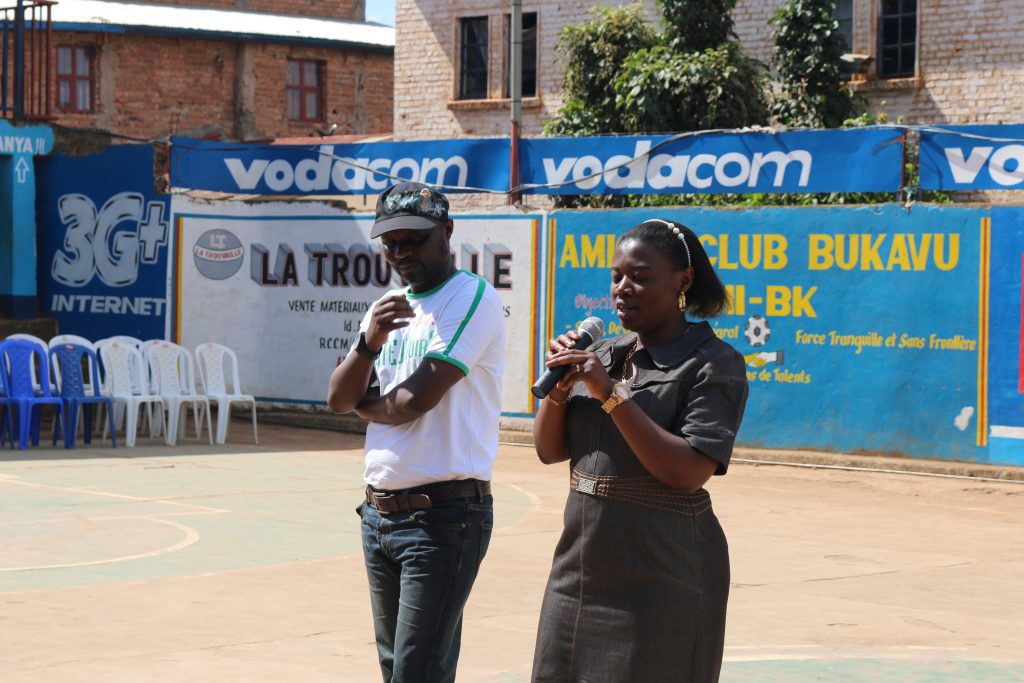
In 2017, we joined forces with Karibu Jeunesse Nouvelle (KJN) to campaign against sexual and gender-based violence in Bukavu, DRC and the role of young people and musicians and actors in this fight. This partnership is to further strengthen the capacity of women, youth, and the media to participate in the 2018 elections in the Democratic Republic of Congo. With funding from Global Fund for Women (
AFEM works for Congolese women’s advancement through available media outlets. On this foundation the organization establishes the vision of encouraging women’s freedom of expression, informing women of their rights and fighting for equal rights between men and women. It specializes in the production of rural and urban radio shows with a major focus on women, drawing on radio clubs and local activists as a base.
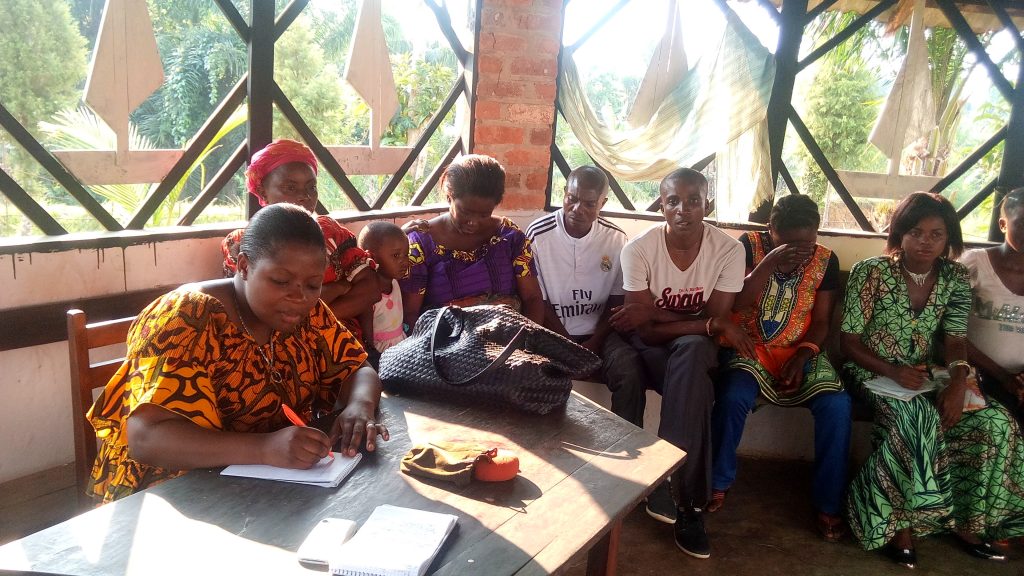
Grassroots Women Leaders Building Peace
The Women’s was a month full of exciting events with lots to learn from. This year’s 62nd session of the Commission on Status of Women (CSW) focused on the empowerment of women and girls in rural areas from 12th to 23rd of March. Our team had the chance to be part of the gathering in New York City, engaging in discussions to exchange knowledge and also host its own side event on Grassroots Women Leaders Building Peacebuilding.
In partnership with Cordaid Global Fund for Women, and Women’s Major Group we discussed Women’s Peace Building Initiatives; Experiences, Challenges and Opportunities in rural affected settings. Women and girls in rural areas are largely the primary survivors of armed conflict but their voices and representation are often excluded from formal peace processes or decision-making on peace and security.

Our
It is important for development actors to know that women and girls in rural areas have the capacity to articulate what they want. Existing gender inequalities, the absence of women at peace tables, and the nature of peace talks as negotiations between warring parties and formally educated technocrats often translate into the
Evaluation of Isis-Women’s International Cross-Cultural Exchange Strategic Plan (2013-2017)
Isis-Women’s International Cross-Cultural Exchange Strategic Plan, 2013 to 2017, was dedicated to visions and goals intended to transform the organisation into a powerful entity that works and co-creates with strategic partners in conflict and post-conflict environments in different parts of the world. The five-year plan emerged from an evaluation of the organisation in 2013; an external evaluation was commissioned in 2017. The specific objectives were to assess the contextual relevance of the Strategic Plan and its appropriateness to the needs of beneficiaries; the coherence of interventions in relation to the goals and results set therein; effectiveness, in terms achieving the intended results; efficiency in relation to use of available resources; impact with regard to benefits that have accrued, and the sustainability of the interventions.
31st Gender Is My Agenda Campaign
Our year begun with a number of exciting events and meetings from the 10th African Union Gender Pre-Summit (AU-GPS) to African Young Women and Girls Advocacy Training at the 31st GIMAC – AU Pre-Summit Meetings, and the Gender Is My Agenda Campaign.
The 31st Gender is My Agenda Campaign (GIMAC) Consultative Meeting on Mainstreaming Gender Equality in the African Union and Member States took place on the 20th-21st January, 2018 at the United Nations Economic Commission for Africa (UNECA) in Addis Ababa, Ethiopia under the theme: “Corruption and Governance: Impact and Way out for Women, Children and Youth”. The theme was aligned with the African Union (AU) dedication of the year 2018 as the year for anti-corruption under the theme: “Winning the Fight against Corruption: A Sustainable Path to Africa’s Transformation”.
African Young Women and Girls Advocacy Training was held under the theme: A Corrupt Free African: Unleashing potentials and Protecting Rights of Africa’s Young People Especially Girls and Young Women. The training aimed to build the capacity of youth to actively engage African leaders in designing solutions to the issue of corruption as well as prepare them to be frontiers of Africa Development and about 35 youth were trained. Our Executive Director, Helen Kezie-Nwoha facilitated the session on advocacy and lobbying and shared practical experience of how Isis-WICCE conducts advocacy and lobbying at the African Union using the GIMAC platform.
The 31st GIMAC brought together over 150 delegates from over 30 countries, including representatives of Diplomatic Missions, African Union and United Nations officials, leading Civil Society Organizations (CSOs) on Gender in Africa and other interested groups in advancing women’s rights in Africa. Drawing from the two-day discussions, participants outlined key recommendations. The meeting identified strategies and interventions that have continental implications in order to forestall the continued impact of corruption in governance, which hinder development, weaken the fabrics of sanity in the communities, promote violence and encourages avoidable negative consequences or marginalization and ethnocentrism.
Africa in Review 2016: Uganda Takes in Refugees
2016 was an eventful year for Africa and for the world, with important implications for U.S.-Africa relations. From continuing democratic consolidation and deepening trade ties in many countries to the shocking electoral defeat and standoff in the Gambia, to South Sudan’s escalating crisis, to the debates over the future of the ICC in Africa, the year was marked by progress, setbacks, and change.
The Wilson Center Africa Program asked experts, scholars, and policymakers to weigh in on the most important and impactful events on the continent in 2016. They responded with this collection of brief and insightful essays touching on issues of governance and democracy, conflict and security, trade, and the role of international partnerships across the African continent.
Isis-WICCE is a member of the Wilson Center Africa Program’s Southern Voices Network and the Executive Director, Helen Kezie-Nwoha contributed a piece on addressing the global challenge of migration and the specific case of Uganda taking in refugees.
DRC: Public Letter from Women on the Political Accord
Some 50 women’s organizations from the DRC, Africa and the rest of the world call on President Kabila and other political actors to swiftly implement the 31 December agreement. (Full list of signatories and recipients below)
Dear All Parties to the 31st December Political Accord,
We, the undersigned women of the Democratic Republic of Congo, Africa and across the world, welcome the Global and Inclusive Political Accord of the Centre Interdiocésain de Kinshasa, reached on the 31st of December 2016. We congratulate each of you as signatories for choosing peace over conflict. This agreement represents an important step towards ensuring a peaceful future for DRC, though to do so, it is vital that parties work together to translate the agreement into tangible progress on the ground.
In a previous letter addressed to President Kabila on December 15th 2016, we stressed two urgent demands: first, that President Kabila state publicly he will not run for a third term as Head of State; and second, that he not support any amendments to the Constitution. We are very pleased to see that that these two asks have been met and are specifically mentioned in the agreement of the 31st December.
We now ask for all parties to the agreement to ensure two things:
1) To fully implement the Accord, including by swiftly finalising an electoral schedule to ensure that elections are held before the end of 2017.
2) To ensure that civil society, in particular women, have a significant role in the follow-up mechanism for the peace agreement (‘Conseil national pour le suivi de l’accord.’)
We call upon our sisters and brothers across Africa and the international community to support your leadership and efforts towards a successful implementation of the agreement. We warmly welcome the response to the agreement by the Chairperson of the African Union Commission, and the United Nations Security Council Presidential Statement. However we believe it is ultimately Congolese leaders who can prioritize peace and bring stability to the nation.
We express our gratitude to CENCO for their role in this agreement being reached, and urge CENCO to continue working with all sides to ensure the accords’ full implementation.
As signatories to the political Accord, the world is watching you. We are watching you and remind you that the security of the Democratic Republic of Congo is in your hands. We urge you to use the political gains that you have secured with the global inclusive accord to achieve the first ever peaceful and democratic transition of power in the history of the DRC, and to pave the way for lasting peace.
Please accept the assurances of our highest consideration.
Signed:
Women’s Organisations from the Democratic Republic of Congo:
- Action des Femmes pour le Développement (AFD)
- Action pour la Paix et la Protection de l’Enfant (APPE)
- Action pour la Protection des Droits Humains et de Développement Communautaire (APDHUD)
- Agir pour la Reconstruction de notre espace et la convivialité (AGIREC)
- Association pour le Développement des Initiatives Paysannes (ASSODIP)
- Association de défense des Droits de la Femme (ADDF)
- Association des Femmes Juristes Congolaises Représentation du Maniema (AFEJUCO/MMA)
- Centre de Promotion Socio- Sanitaire (CEPROSSAN ASBL)
- Centre d’Observation des Droits de l’homme et d’Assistance Sociale
- Cercle internationale Pour la Défense des Droits de l’Homme, la paix et l’Environnement (CIDDHOPE)
- Convention Pour le Respect des Droits de l’Homme (CRDH)
- Femmes Agissons pour la Paix (FAP)
- Femmes Engagées pour la Promotion de la Santé Intégrale (FEPSI
- Femmes Juristes pour la défense des Droits de la Femme (FJDF)
- Femmes Solidaires pour la Paix et le Développement (FSPD)
- Great Lakes Human Right Program (GLHRP)
- Groupe d’Associations de Défense des Droits de l’Homme et de Paix (GADHOP)
- Mama Tupendane (MTP)
- Mama Tushirikiane (MATU)
- Maniema Libertés (MALI)
- Maniema Yuende Mbele (MTM)
- Mini Réseau de Plaidoyer de Protection/Butembo
- Observatoire de la Dépense Publique (ODEP)
- Pax Christi Butembo
- Réseau des Para-juristes du Maniema (REPAJUMA)
- Solidarité des Associations Féminines pour les Droits de Femmes et de l’Enfant (SAFDF)
- UCOOFADE
- Union des Femmes pour le Développement (UFD)
- Wanama Tusimame
International Organisations :
- Akina Mama wa Afrika, Uganda
- Eastern African Sub-Regional Support Initiative for the Advancement of Women (EASSI), Uganda
- Fahamu, Kenya
- Gender Empowerment for Sudan Organization (GESO), South Sudan
- Inspiring Africa, Zimbabwe
- Isis-Women’s International Cross-Cultural Exchange (ISIS-WICCE), Uganda
- Mouvement des Femmes Filles pour la Paix et la Sécurité au Burundi (MFFPS), Canada
- Never Again Coalition, United States of America
- People Opposing Women Abuse (POWA), South Africa
- People’s Empowerment Foundation (PEF), Thailand
- Regional Associates for Community Initiatives (RACI), Uganda
- Rural Women and Youth Fund, Uganda
- South Sudan Women’s Empowerment Network (SSWEN), South Sudan
- Strategic Initiative for women in the Horn of Africa Network (SIHA Network), Horn of Africa region
- Swaziland Rural Women’s Assembly, Swaziland
- Uganda Women Writers’ Association (FEMRITE), Uganda
- Women’s International League for Peace and Freedom (WILPF), United Kingdom of Great Britain
- Women and Girls for Peace and Security in Burundi, United States of America
_________________
Letter addressed to:
H.E. Joseph Kabila
President of the Democratic Republic of Congo
All parties to the Political Accord of the 31st December 2016:
Majorité présidentielle
Opposition républicaine
Opposition politique
Rassemblement des forces politiques et sociales
Front pour le Respect de la Constitution
Parti travailliste
Société civile
CC :
African Union Commissioner for Peace and Security;
Conférence Nationale Episcopale du Congo
European Union Managing Director for Africa
Southern Africa Development Community Executive Secretary
Head of United Nations Organization Stabilization Mission in the DR Congo (MONUSCO)
International Conference of the Great Lakes Region Executive Secretary representative
International Organization of the Francophonie Special Envoy
United Nations Special Envoy for the Great Lakes region

